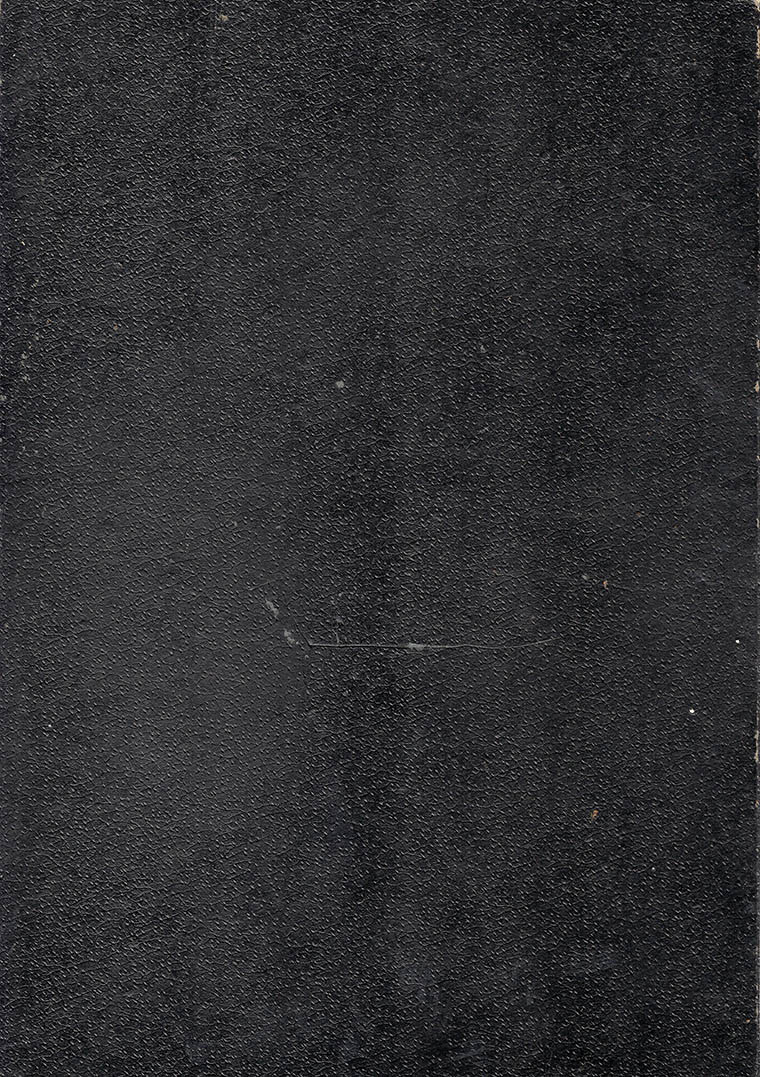Crew 39A Crew Book
| Normally the German Navy had one intake of officers each year known as a crew. Similar to a US Naval Academy class but instead of the year of graduation crews were designated by the year they began their naval service. When WWII began in 1939 the navy expanded rapidly and there were 3 officer intakes. Herbert Mumm was one of 633 cadets in Crew 39A. |
| Translation of the Crew Book was more difficult than a Kriegstagebuch due to the Fraktur script, unusual vocabulary and sentence structures, and the many abbreviations. Comments, suggestions and corrections are most welcome. Please contact me by e-mail at jerry@uboatarchive.net . |
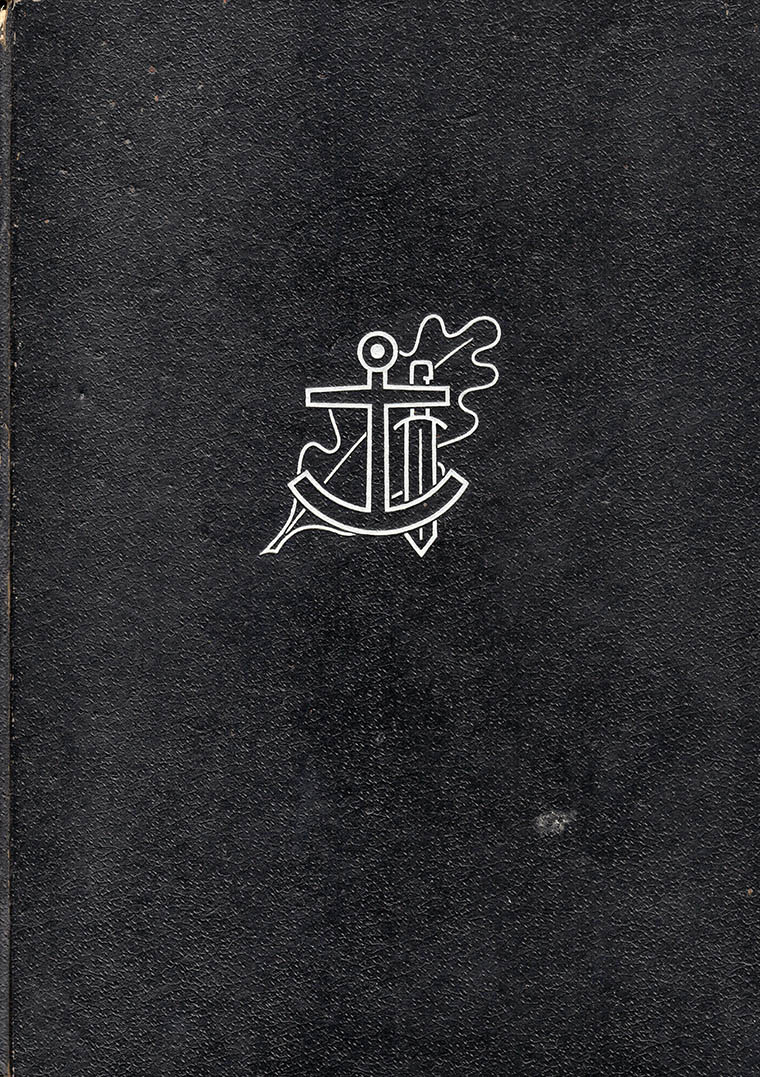
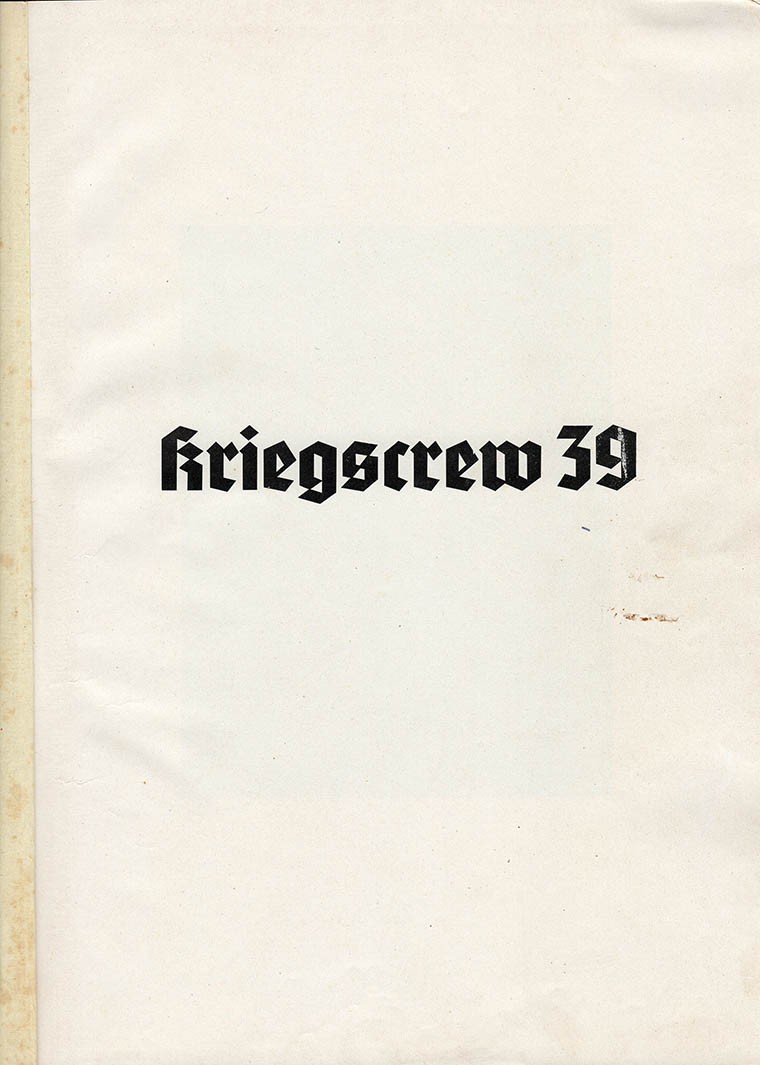
Kriegscrew 39 = War Crew 39 |
|||
So designated because WII began on 1 September 1939 just before they began their naval service. |
|||
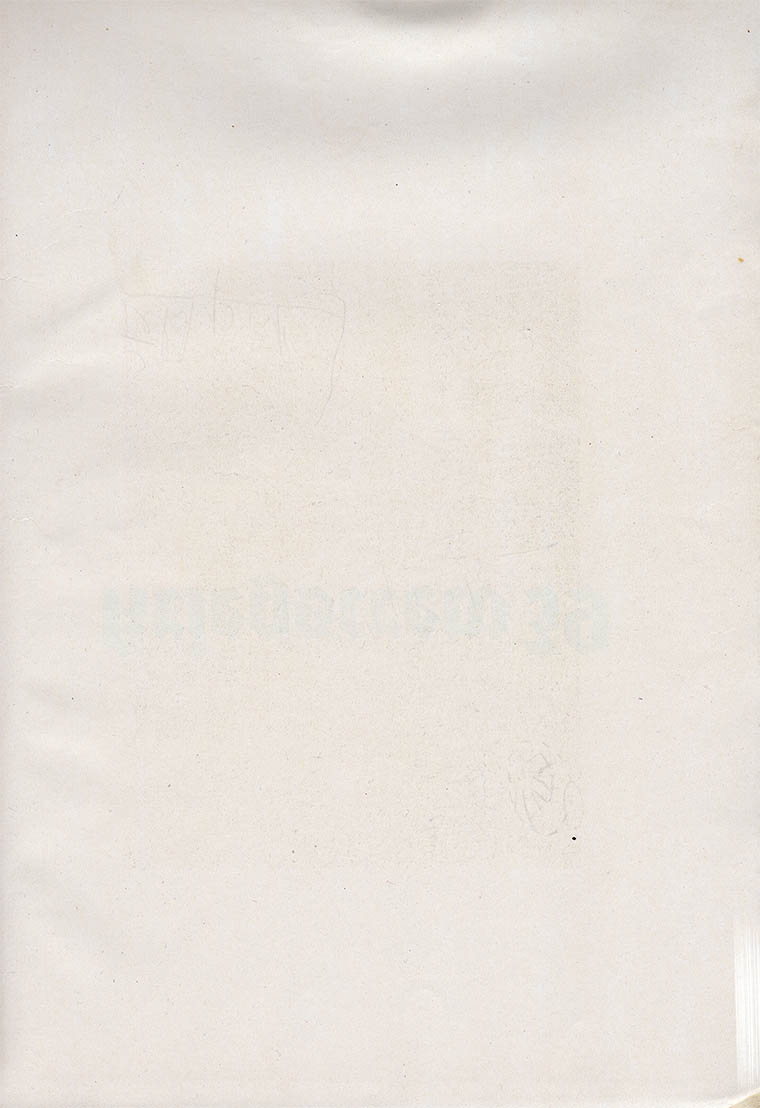
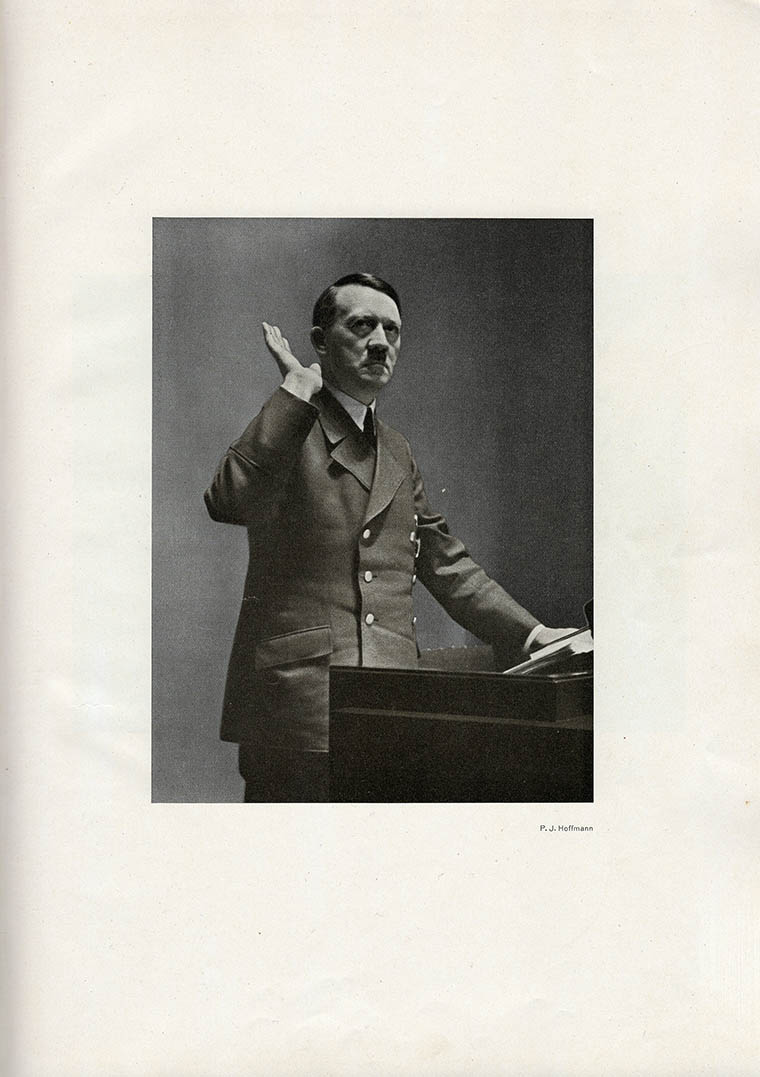
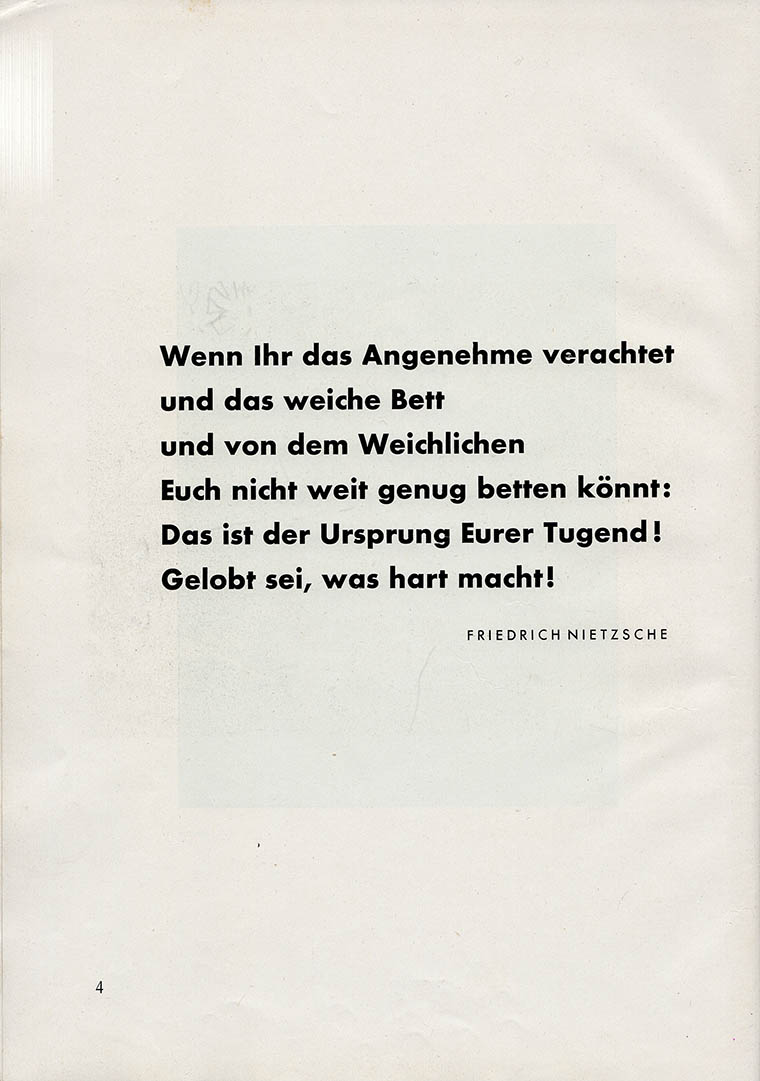
| When you despise the pleasant and the soft bed | ||
| and you cannot bed down far enough away from the soft hearted: | ||
| There lies the source of your virtue! | ||
| Praised be what makes you hard! | ||
| Friedrich Nietzsche | ||
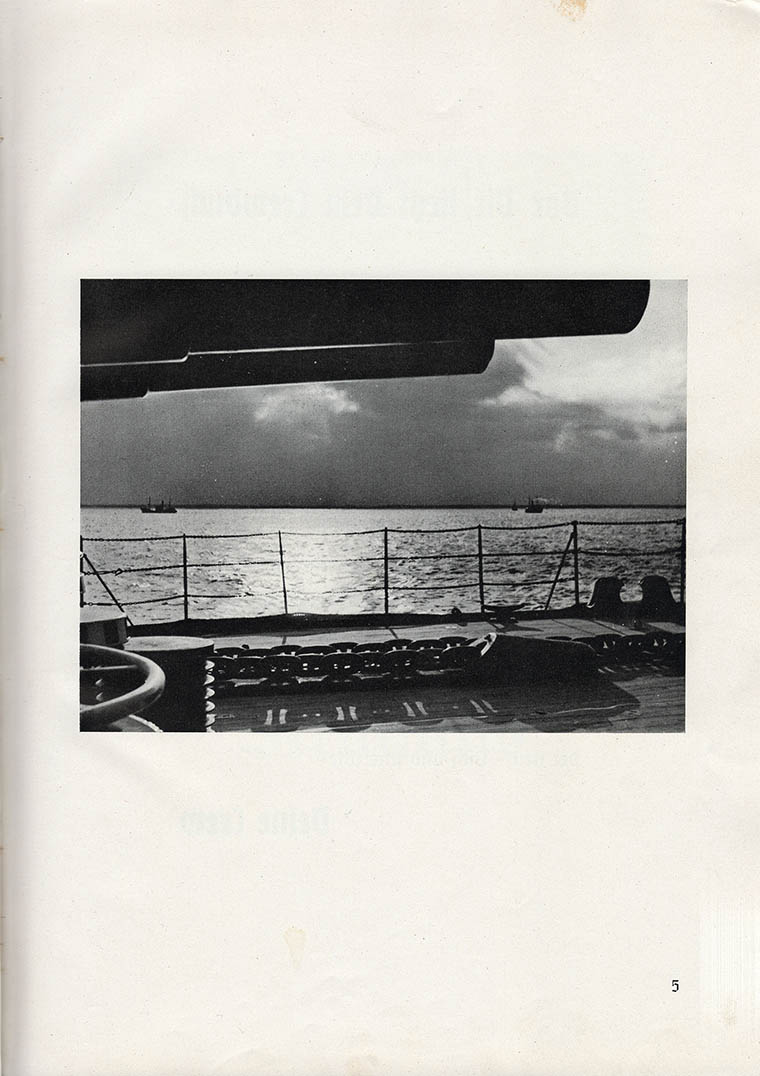
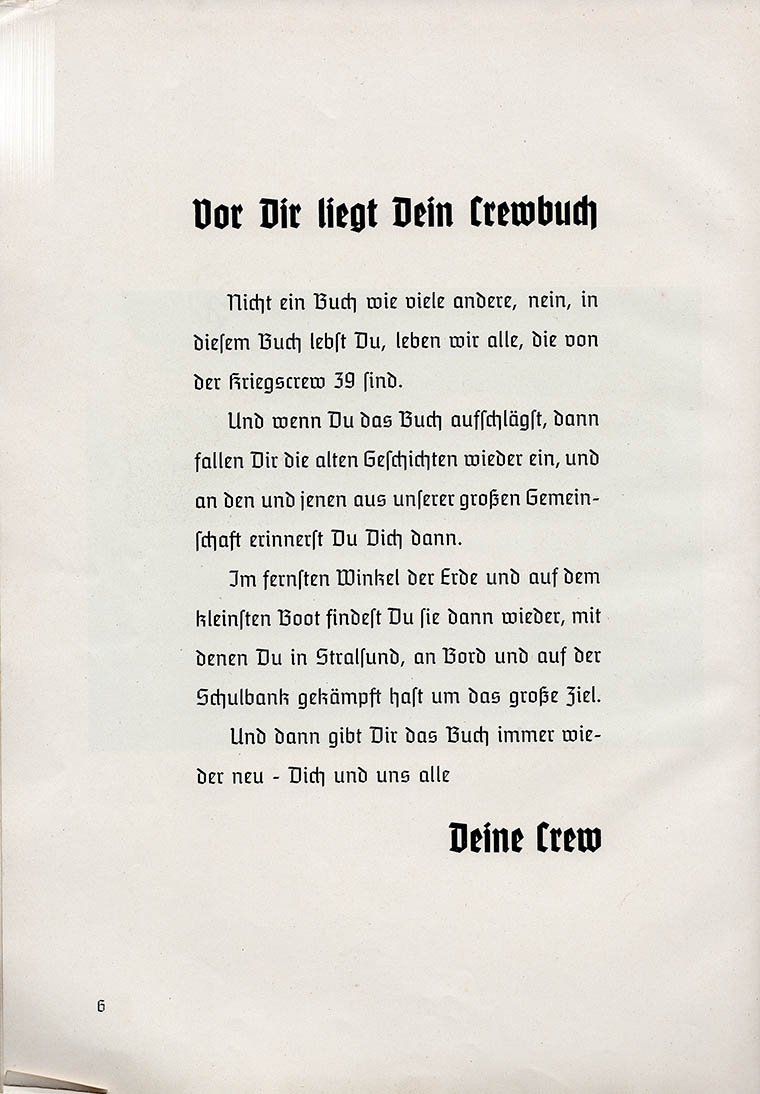
| Your crew book is before you | |||
| Not a book like many others, no, you live in this one, we all live in it, those who are part of the 39 War Crew. | |||
| And when you open the book, the old stories come back to you, and then you remember this and that from our large community. | |||
| In the furthest corner of the earth and on the smallest boat you will find them again, those with whom you fought in Stralsund, on board and on the school desk, to achieve the big objective. | |||
| And then the book gives you something new again and again - you, us, all of us. | |||
| Your Crew | |||
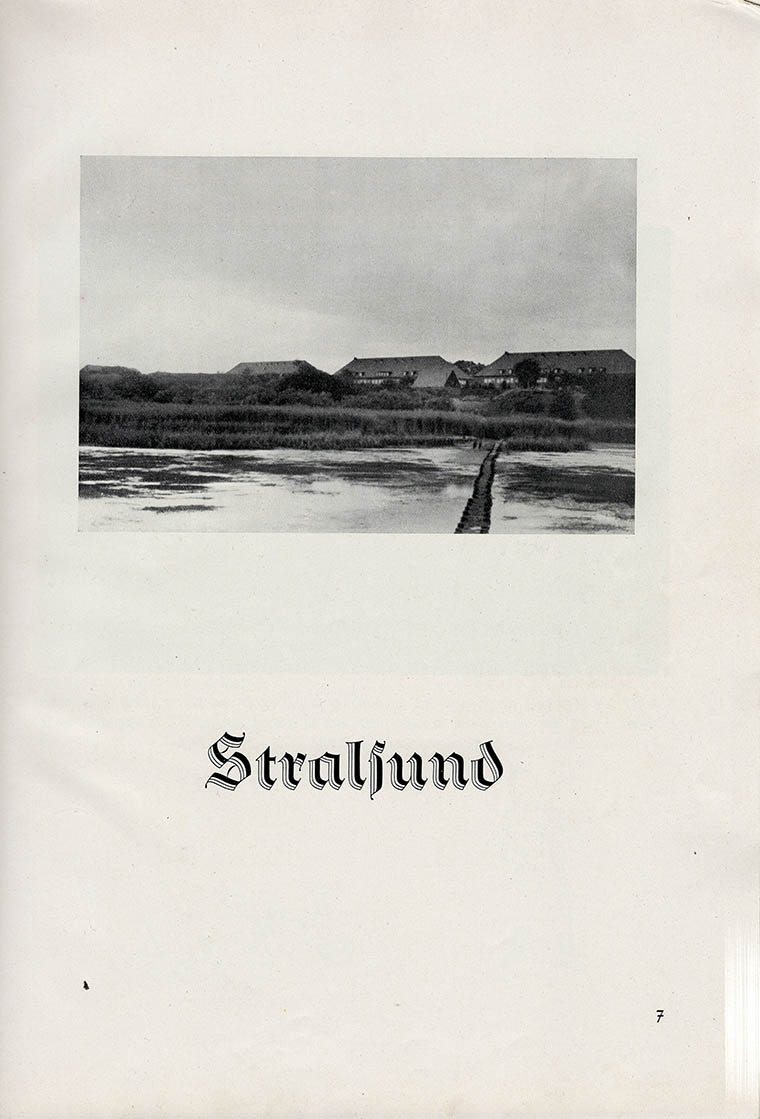
| Stralsund - a city located at the southern coast of the Stralsund, a sound of the Baltic Sea. Here naval cadets received general military training with the 7. Schiffsstammabteilung (Basic seamanship and infantry training) on Dänholm Island. | |||
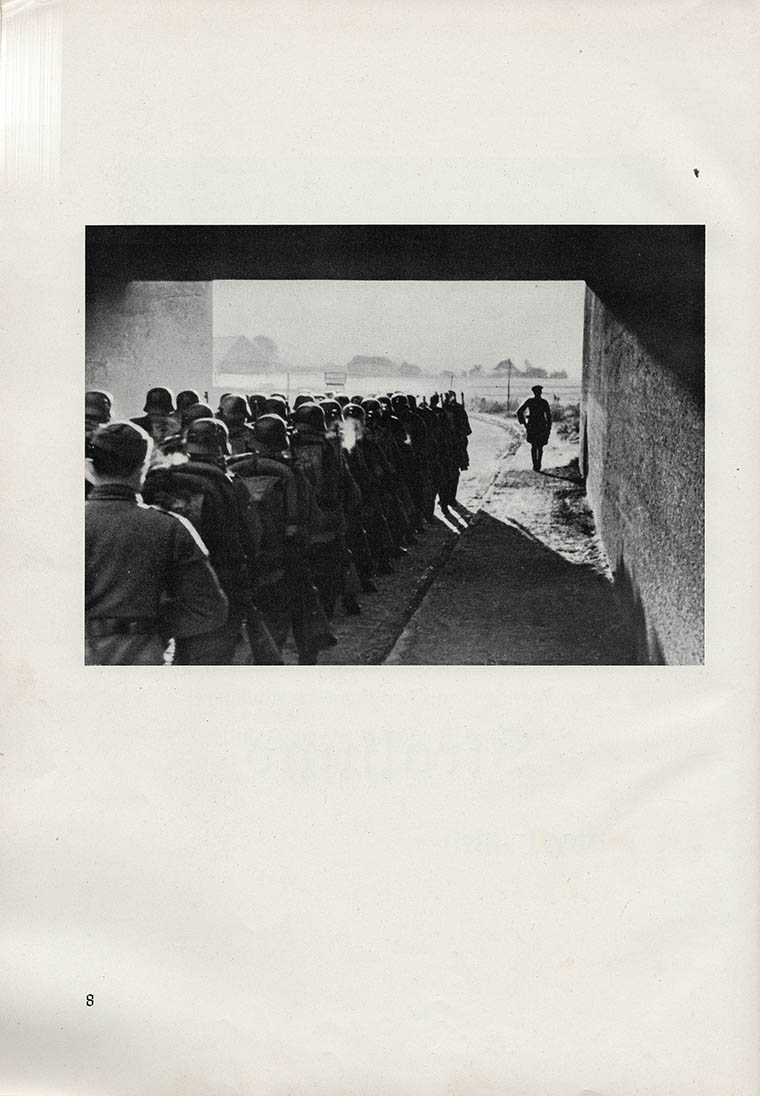
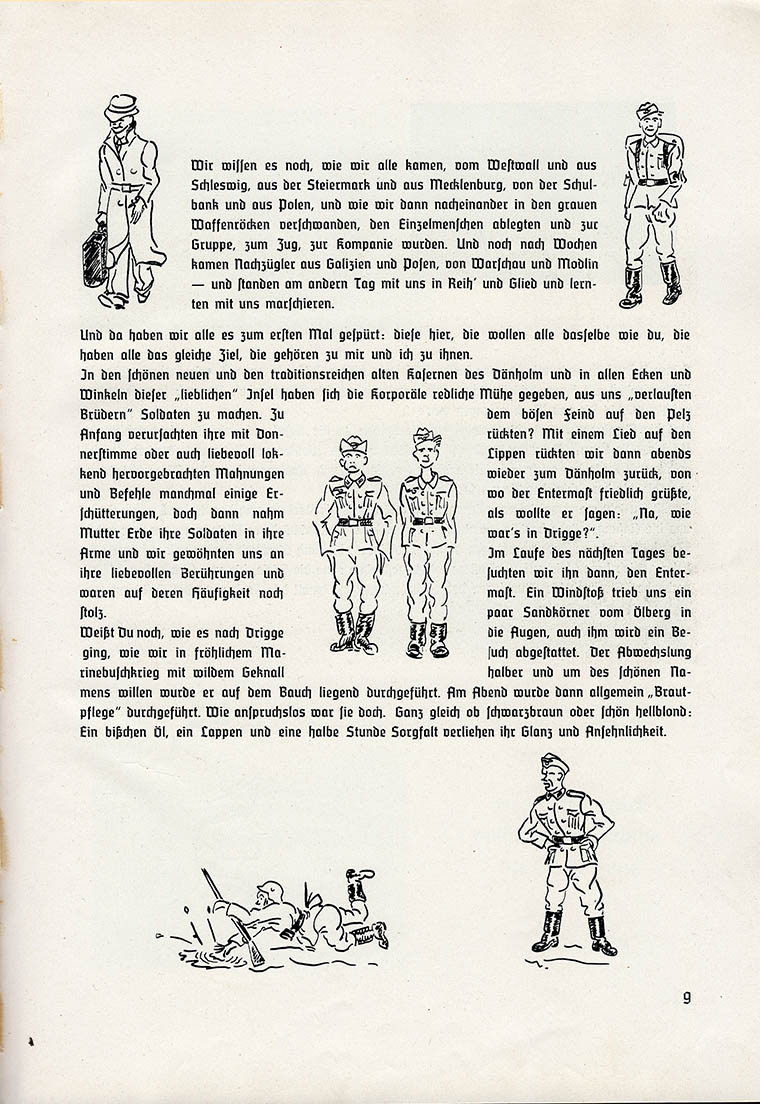
| We still want it, how we all came, from the West Wall and Schleswig, from Steiermark and Mecklenburg, from the school desk and from Poland, and how we then disappeared one after the other in our gray tunics, discarded the individual and joined the group, the platoon, our company. And weeks later, stragglers came from Galicia and Posen, from Warsaw and Modlin - and stood with us the next day in rank and file and learned to march with us. | |||
| And that's when we all felt it for the first time: those here, they all want the same thing as you, they all have the same goal, they belong to me and I to them. | |||
| In the beautiful new and the traditional old barracks of Dänholm and in every nook and cranny of this "lovely" island, the Corporals have made an honest effort to turn us "lost brothers" into soldiers. | |||
| At first, their thunderous or lovingly enticing warnings and commands sometimes caused some shocks, but then Mother Earth took her soldiers in her arms and we got used to their loving encounters and were still proud of the frequency of them. | |||
| Do you still remember how things went after Drigge, how in a happy naval bush war we stalked the evil enemy with wild bangs? With a song on our lips we then returned to Dänholm in the evening, from where the boarding mast greeted peacefully, as if to say: "Well, how was Drigge?". | |||
| In the course of the next days we attended the boarding mast. A gust of wind drove a few grains of sand from the Mount of Olives into our eyes, and a visit was also paid to it. For the sake of variety and for the sake of the nice name it was performed lying on the stomach. In the evening general "bridal care" [leather care] was carried out. It doesn't matter whether it's black-brown or a beautiful light blonde: A little oil, a cloth and half an hour's care will make it look glamorous and attractive. | |||
| [Dänholm is a small island between Stralsund and Rügen where general military training took place. Drigge is small peninsula across the water from Dänholm. The boarding mast was the mast of a sailing ship used for training on land] | |||
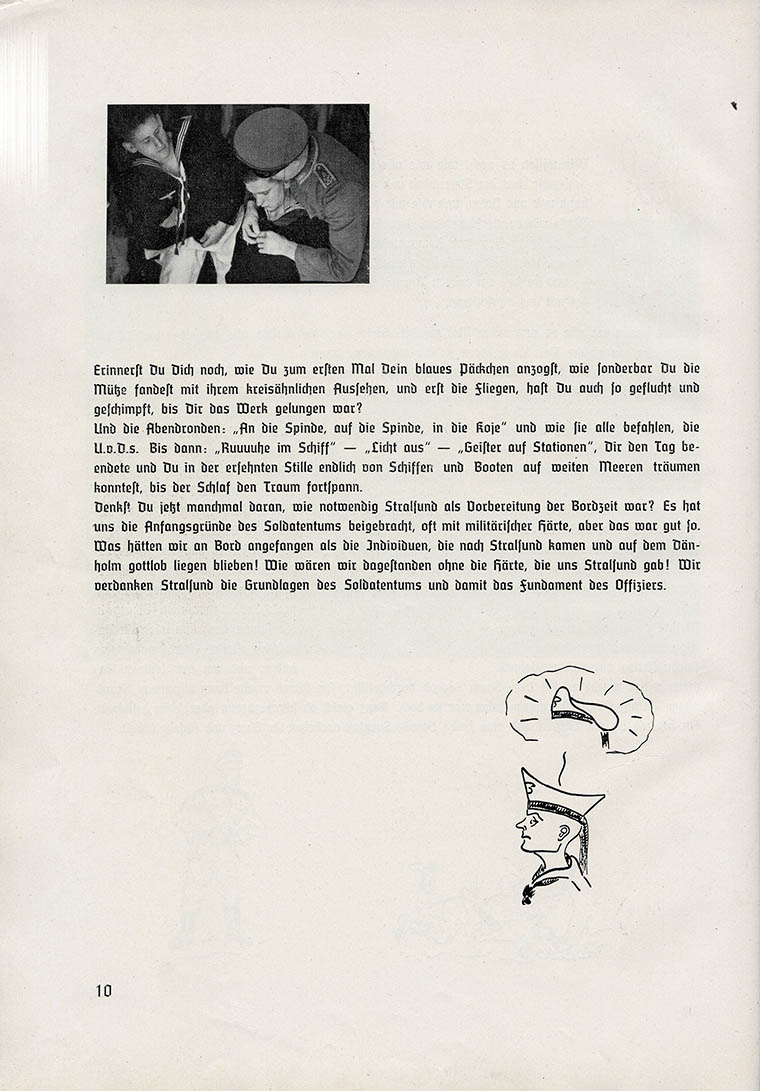
| Do you still remember how you put on your blue uniform set for the first time, how strange you found leisure with its war-like appearance, and then you cursed and scolded the tie until the work was done? |
|||
| And the evening rounds: "To the lockers, in the lockers, to the bunk" and how they all ordered, the U.o.D.s. until then: "Calm in the ship" - "Lights off" - "Ghosts at stations", you ended the day and in the longed for silence you could finally dream of ships and boats on open seas, until sleep continued the dream. | |||
| Think! Do you sometimes remember how necessary Stralsund was to prepare for shipboard time? It taught us the basics of soldiering, often with a military chart, but that was a good thing. What would we have done on board when the individuals who came to Stralsund and, thank God, got stranded on Dänholm! How would we have stood there without the chart that Stralsund gave us! We owe Stralsund the foundations of soldiery and thus the foundation of the officer. | |||
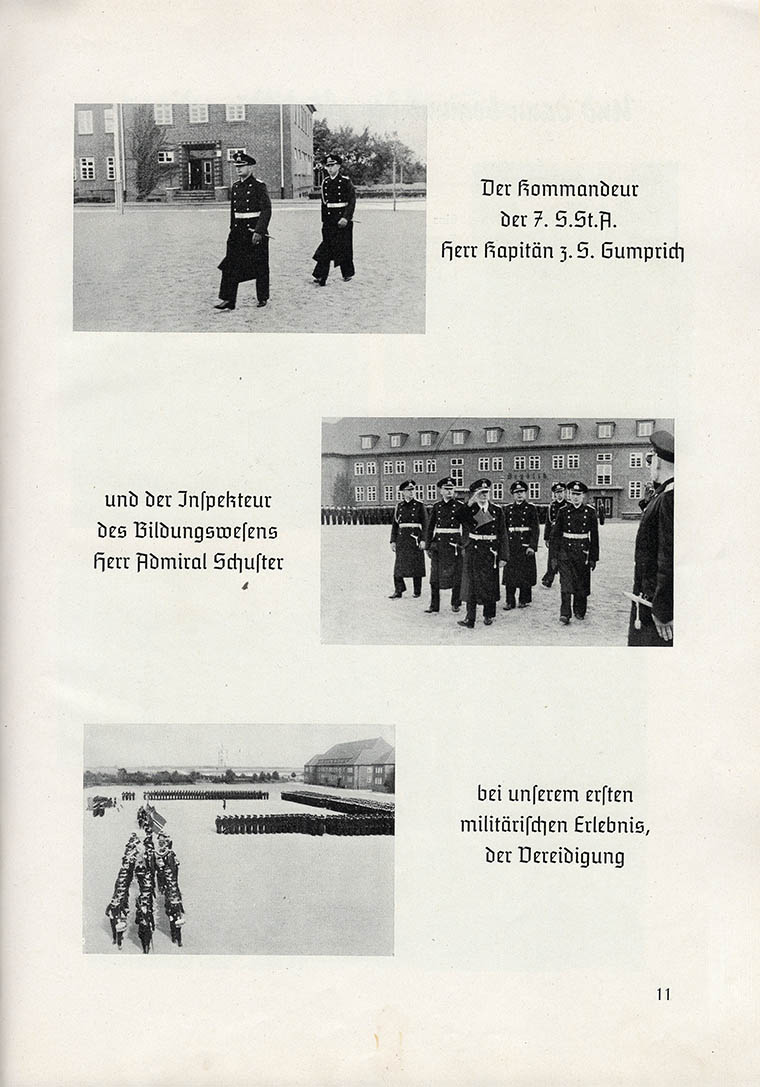
| The Commander of the 7. Schiffsstammabteilung Herr Kapitän z.S. Gumprich | |||
| and the Inspekteur des Bildungswesens (Inspector of the Education System) herr Admiral Schuster | |||
| at our first military experience, the swearing-in ceremony. | |||
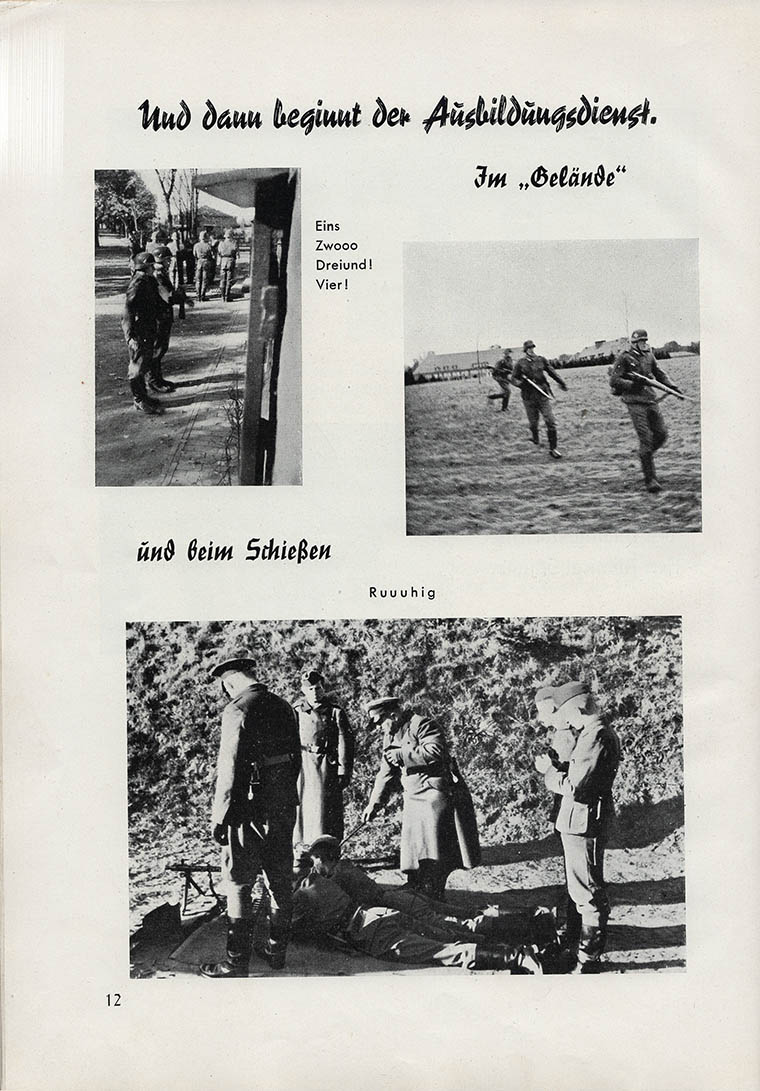
And then the training service began. |
|||
In the "Terrain" |
|||
One |
|||
Two |
|||
Three! |
|||
Four! |
|||
| and with shooting | |||
Calm |
|||
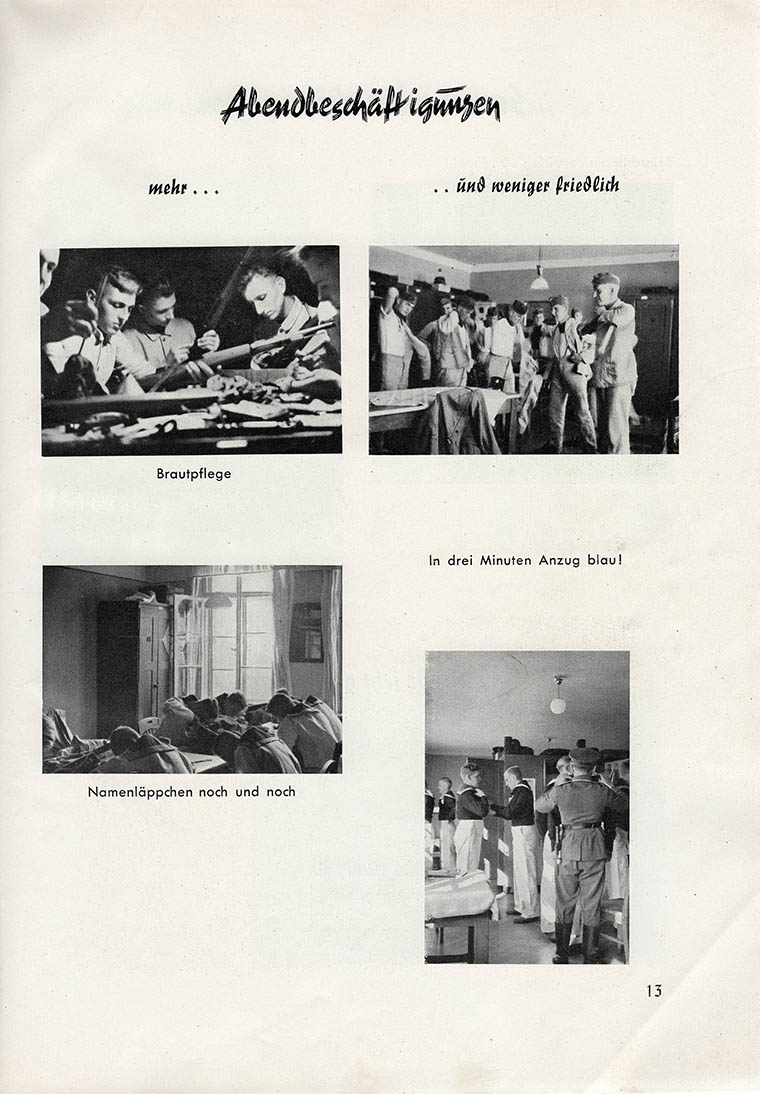
Evening Activities |
|||
more . . . . . . and less tranquil |
|||
| bridal care | |||
| In three minutes blue suit! | |||
| Name tags over and over again | |||
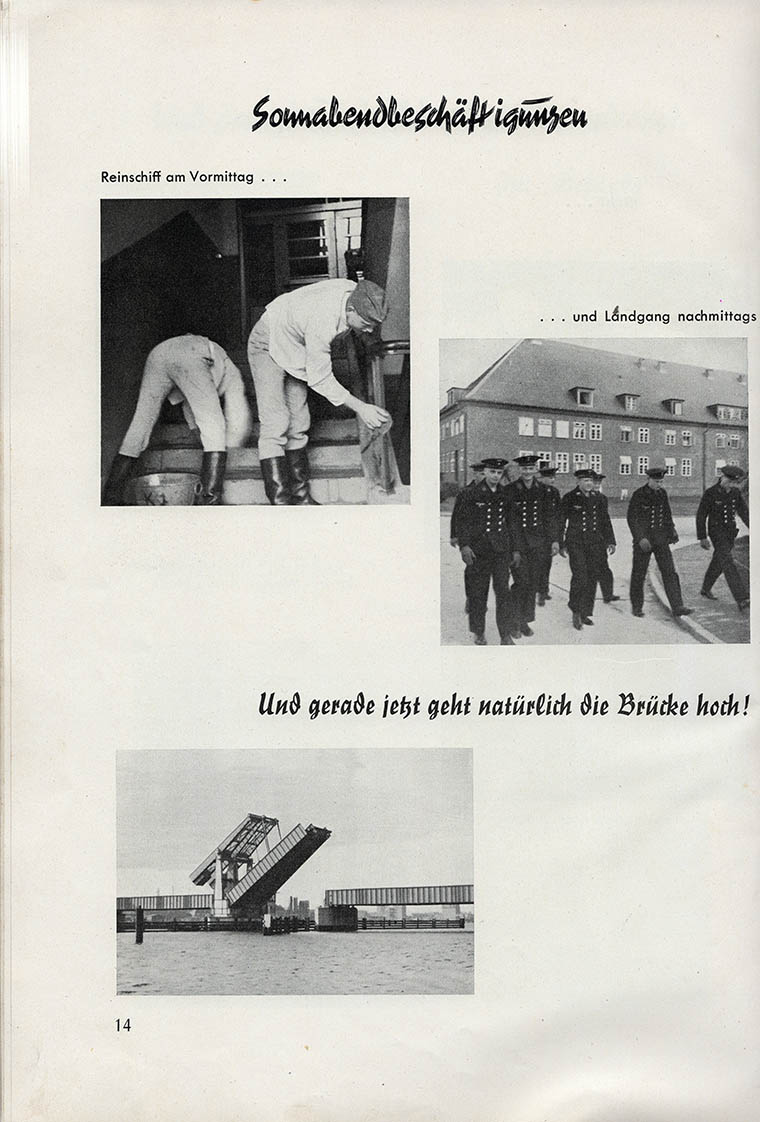
Saturday Activities |
|||
| Clean ship in the morning . . . | |||
| . . . and shore leave in the afternoon | |||
An now of course the bridge goes up! |
|||
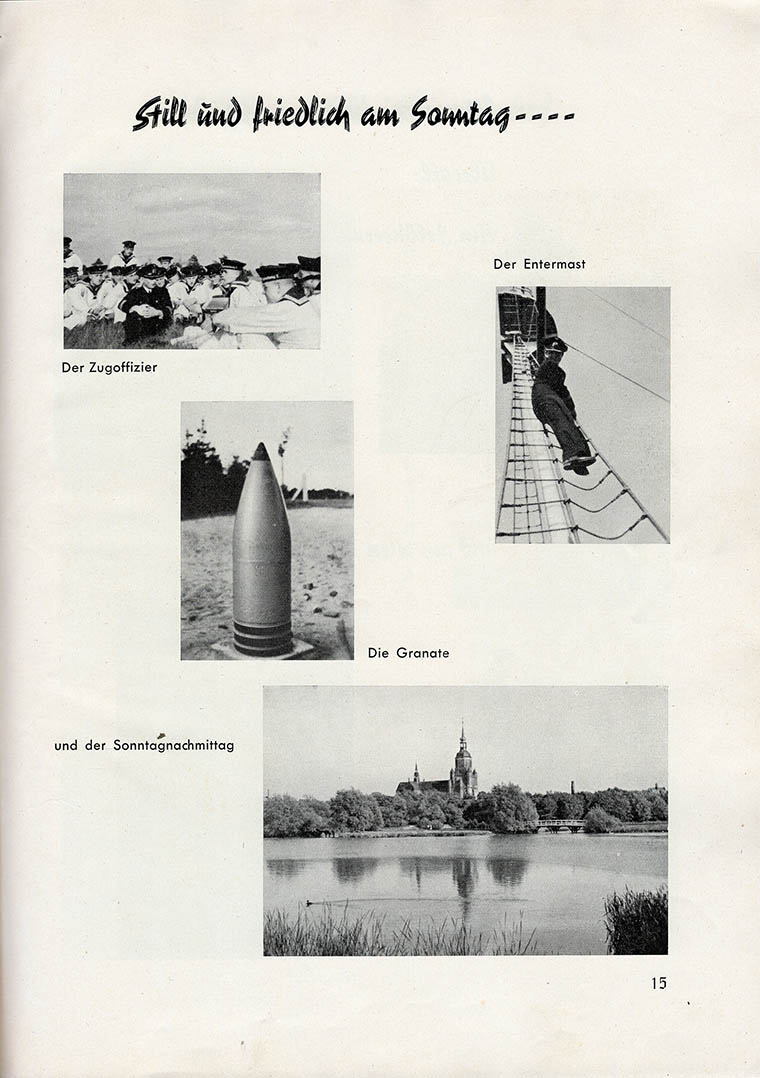
| Quiet and peaceful on Sunday . . . | |||
| The Entermast | |||
| The Platoon Officer | |||
The shell |
|||
| and the Sunday afternoon | |||
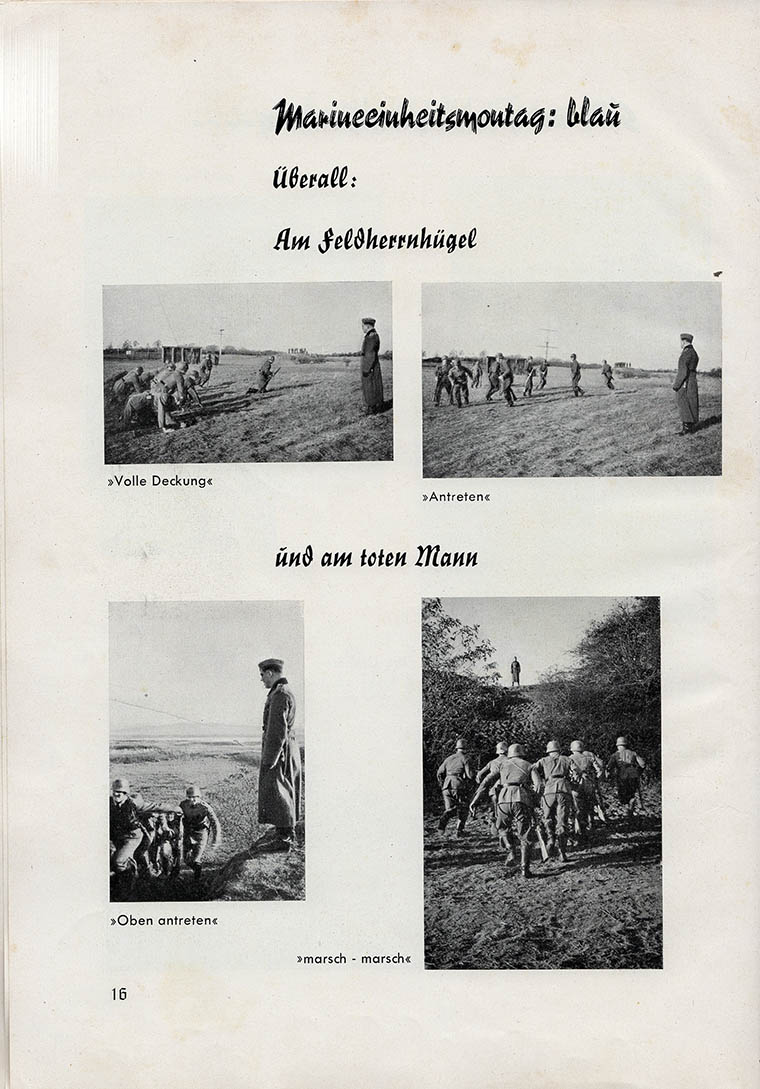
Naval Unit Monday: Blue |
|||
| Overall: | |||
| On commanding heights | |||
| Full cover Fall in | |||
and the dead man |
|||
| Fall in at the top March - March | |||
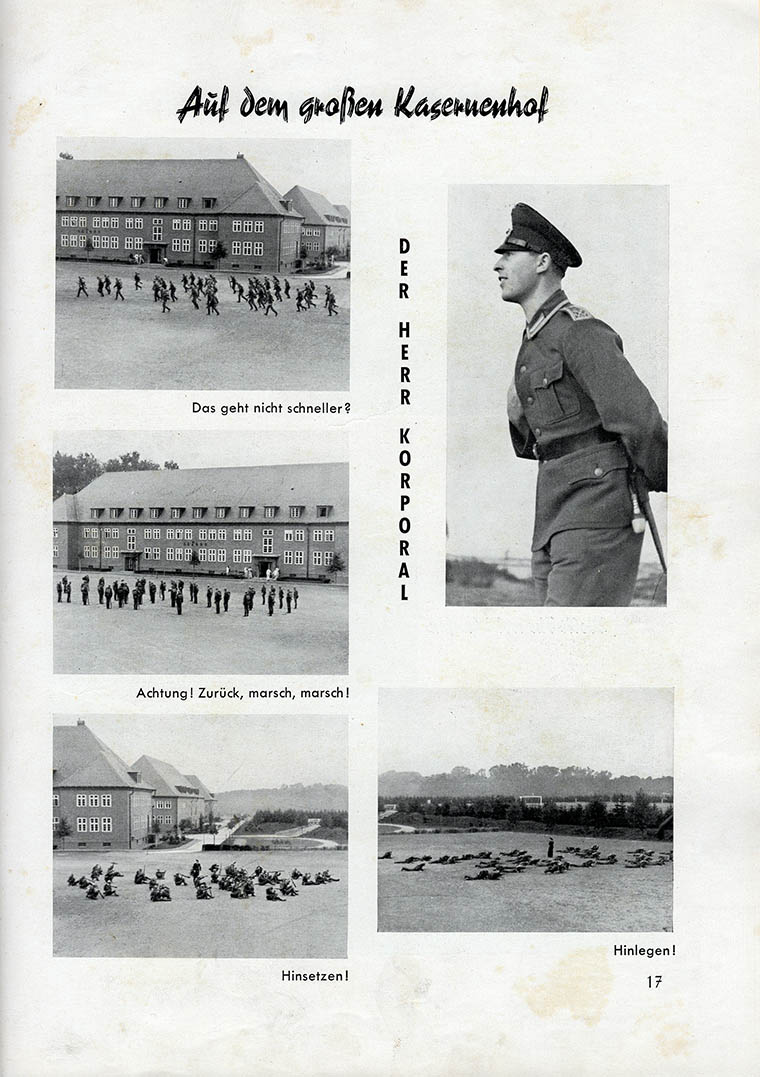
In the big barracks yard |
|||
| Can't it get faster? | |||
| The herr Corporal | |||
| Achtung! Back, march, march! | |||
| Sit down Lying down | |||
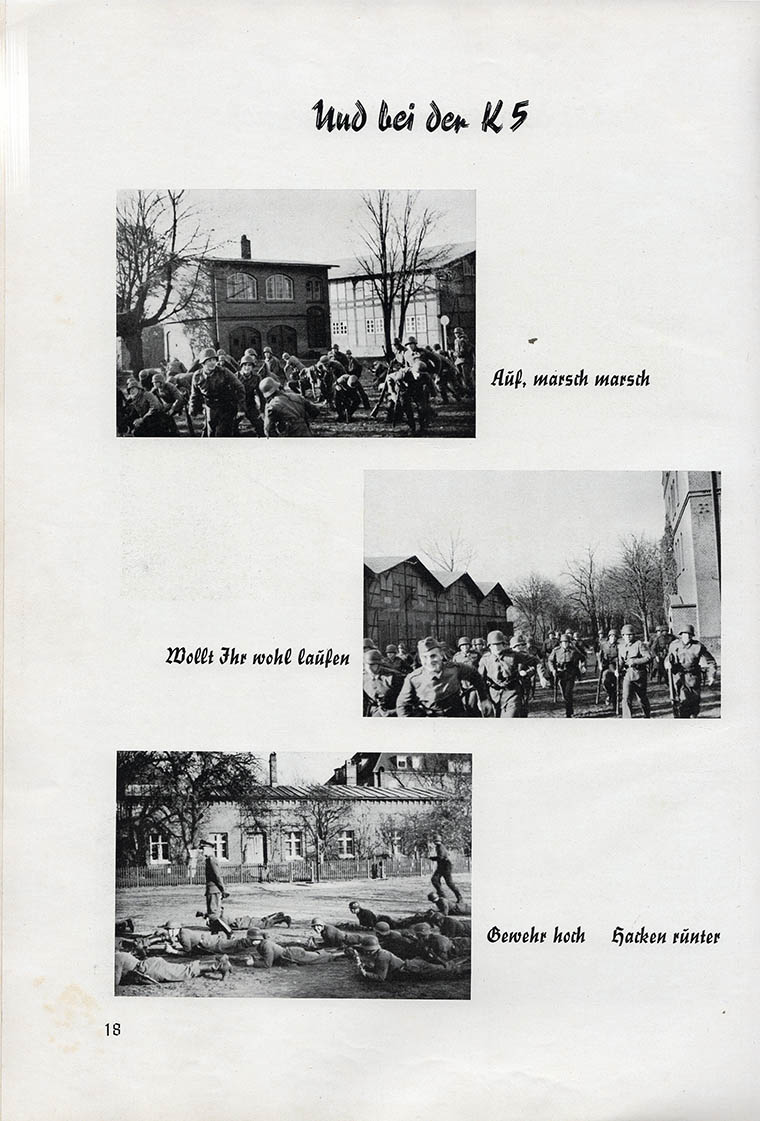
And with the K 5 |
|||
| Up, march, march | |||
| Do you want to walk | |||
| Gun high Heels down | |||
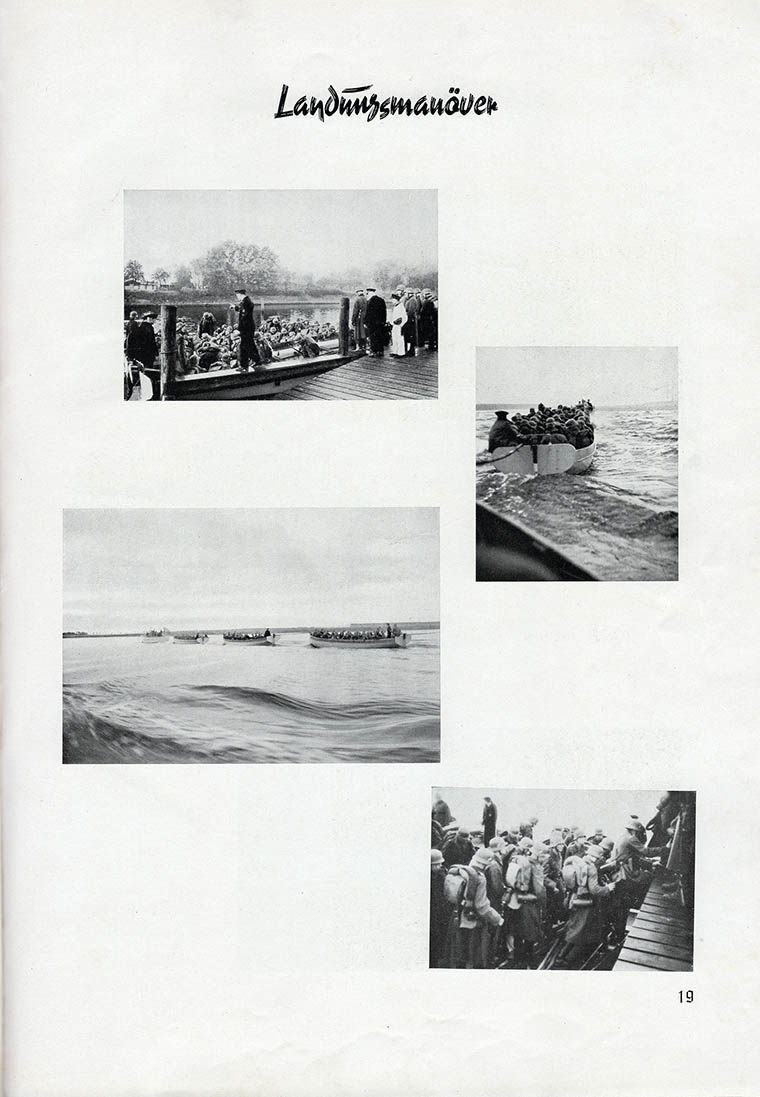
Landing maneuver |
|||
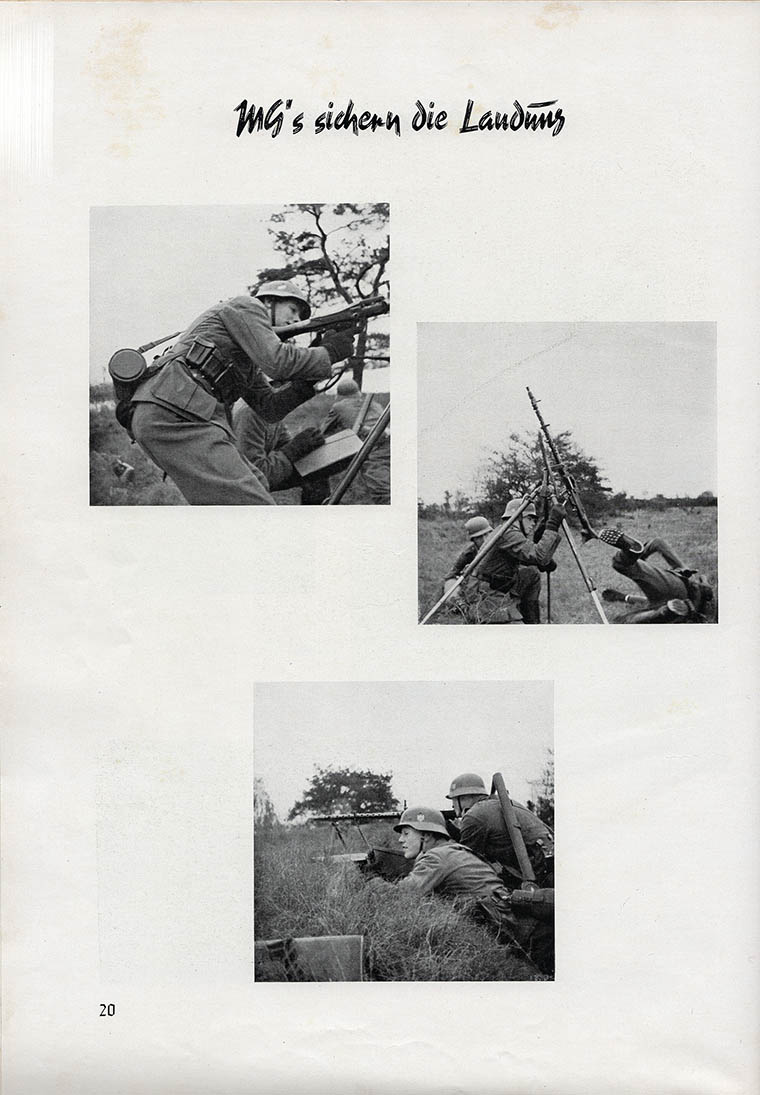
Machine Guns secure the landing |
|||
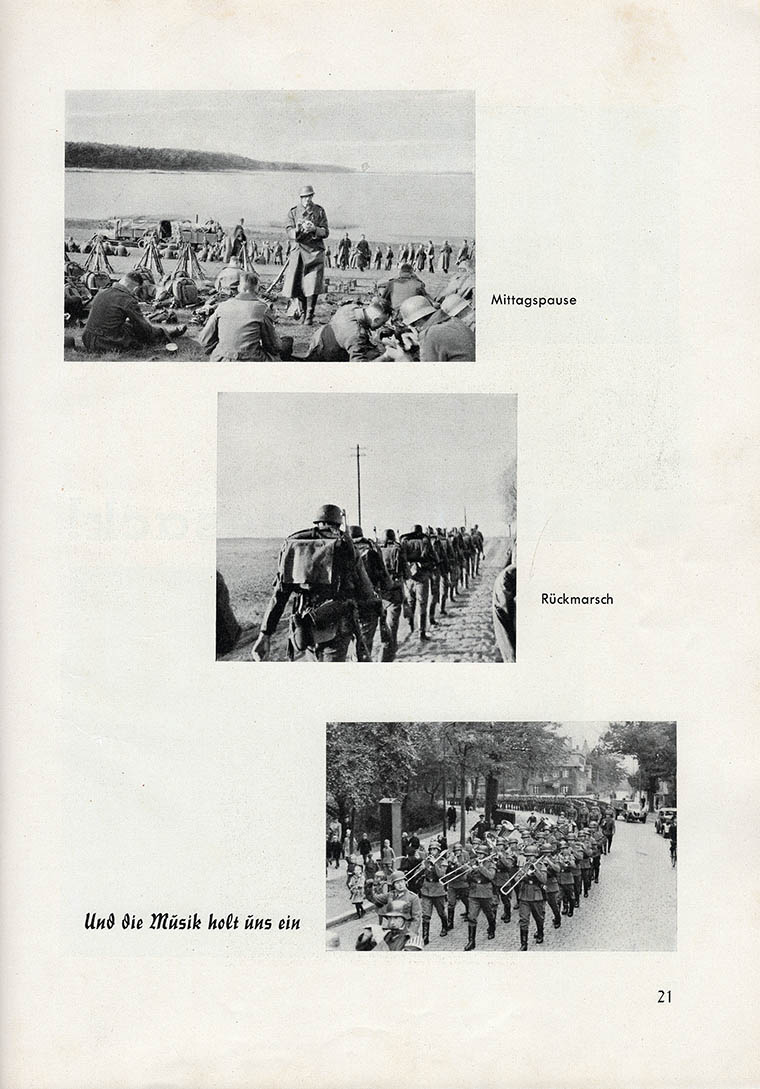
| Midday pause | |||
| March back | |||
| And the music catches up with us | |||
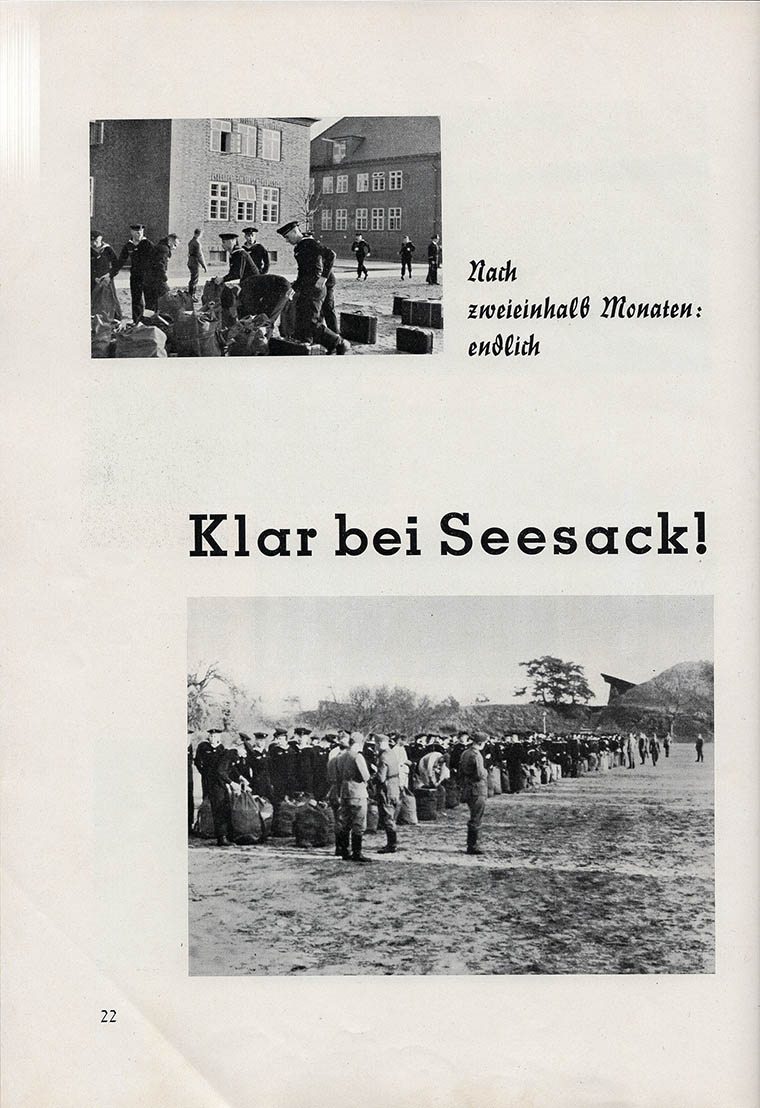
| After two and a half months: | |||
| Finally | |||
| Ready with Sea Bags! | |||
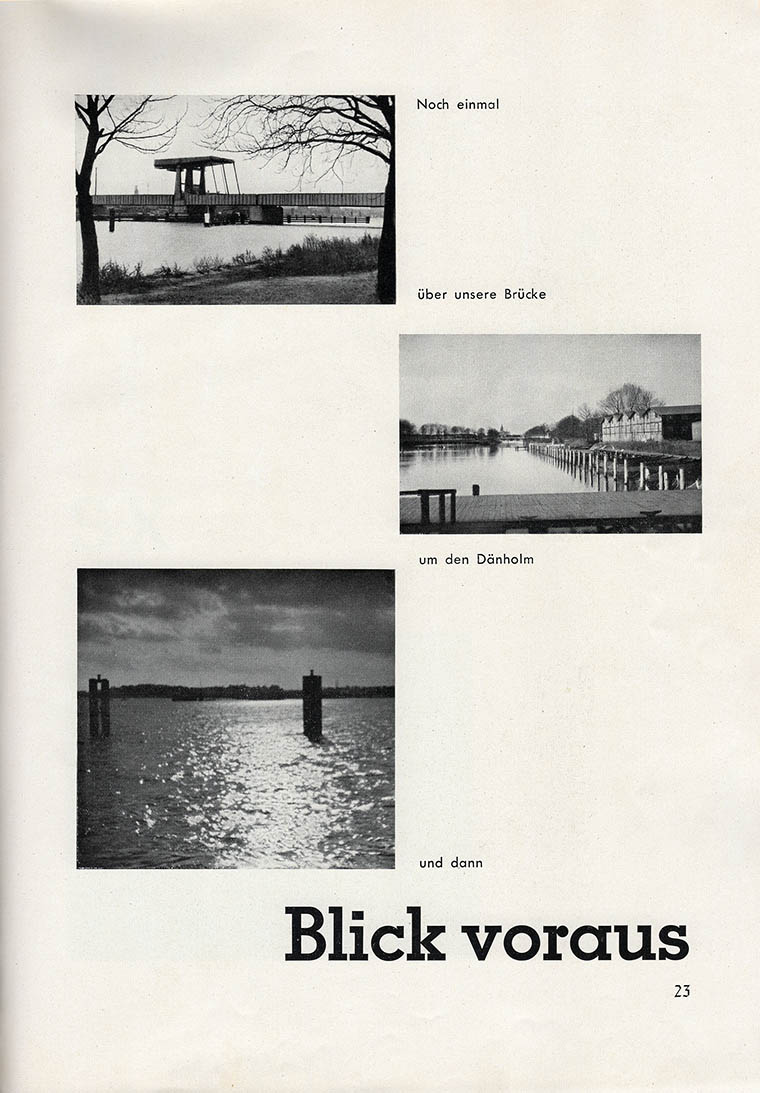
| Once again | |||
| Over our bridge | |||
| around Dänholm | |||
| and then | |||
| Look ahead | |||
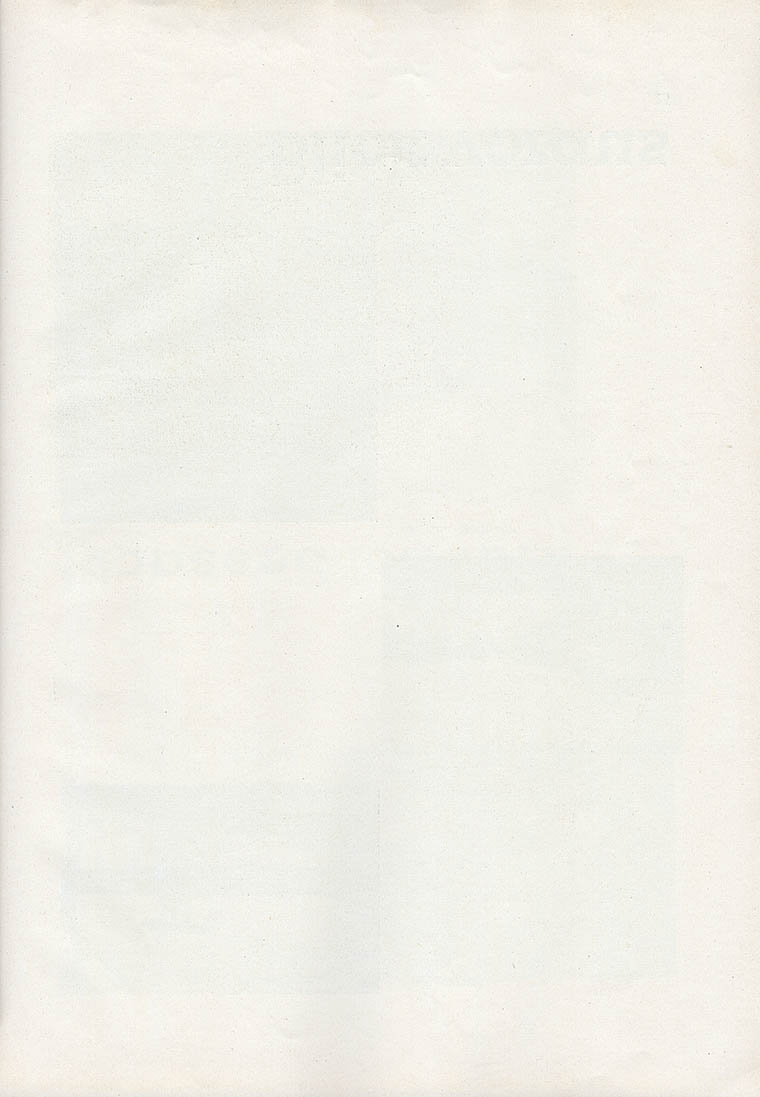
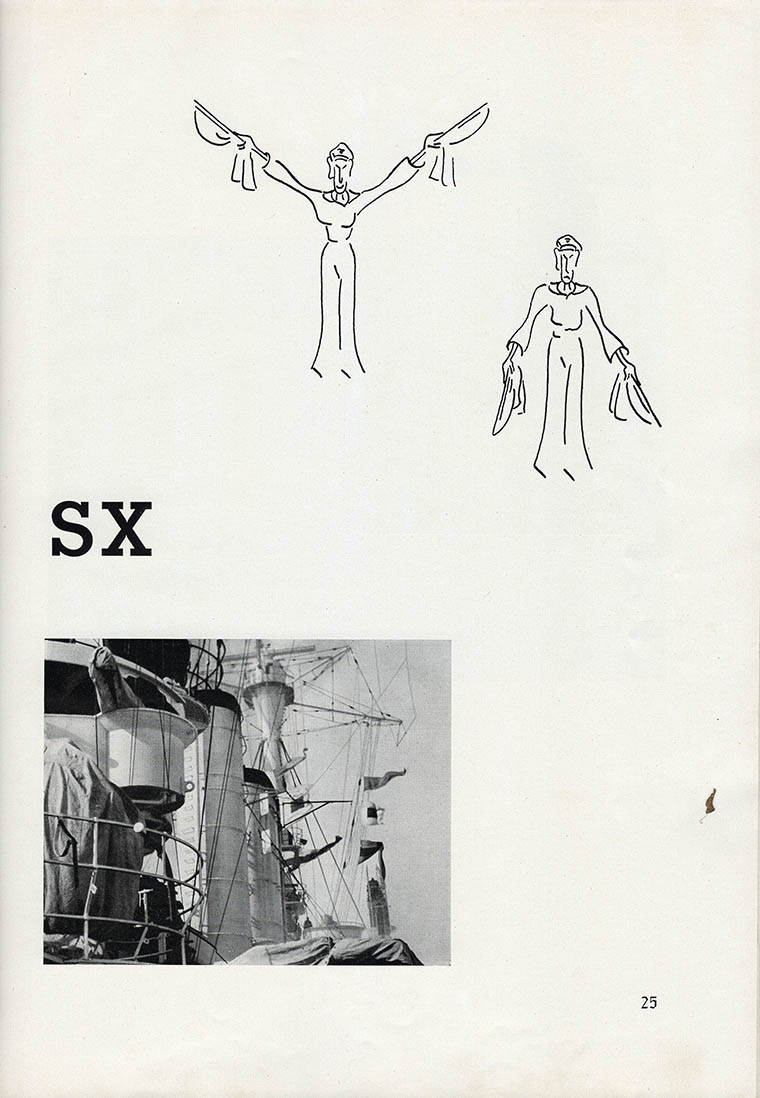
| SX = Battleship Schlesien call-letters. | |||
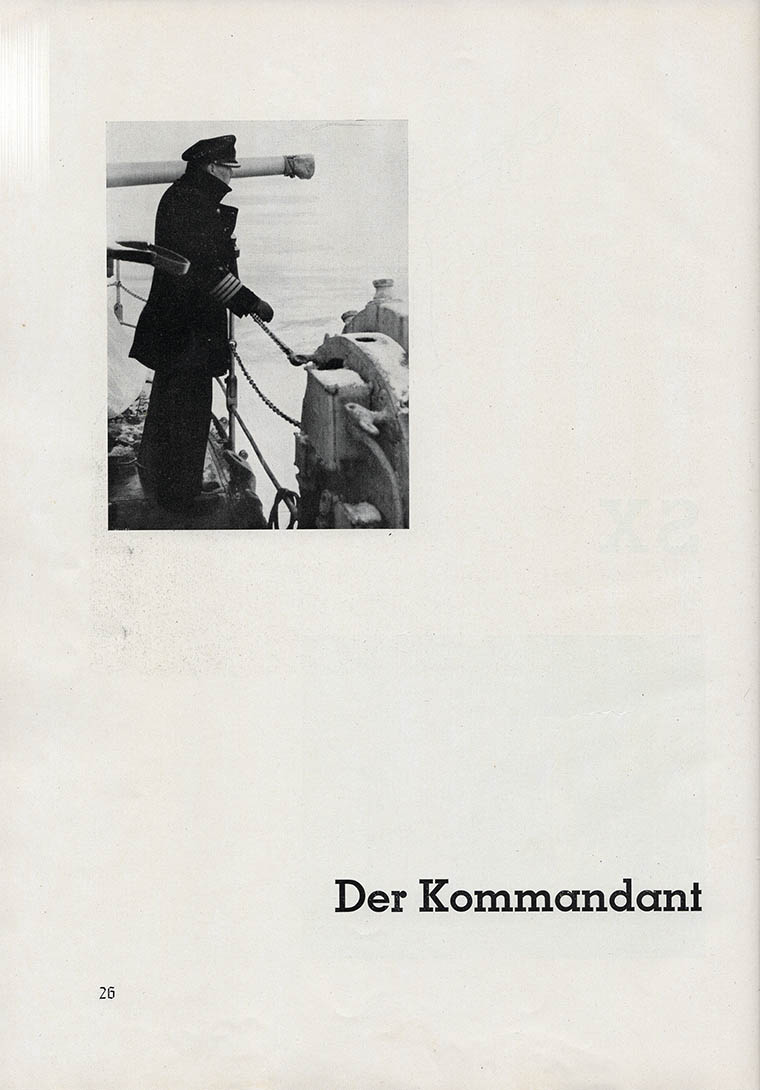
| The Kommandant | |||
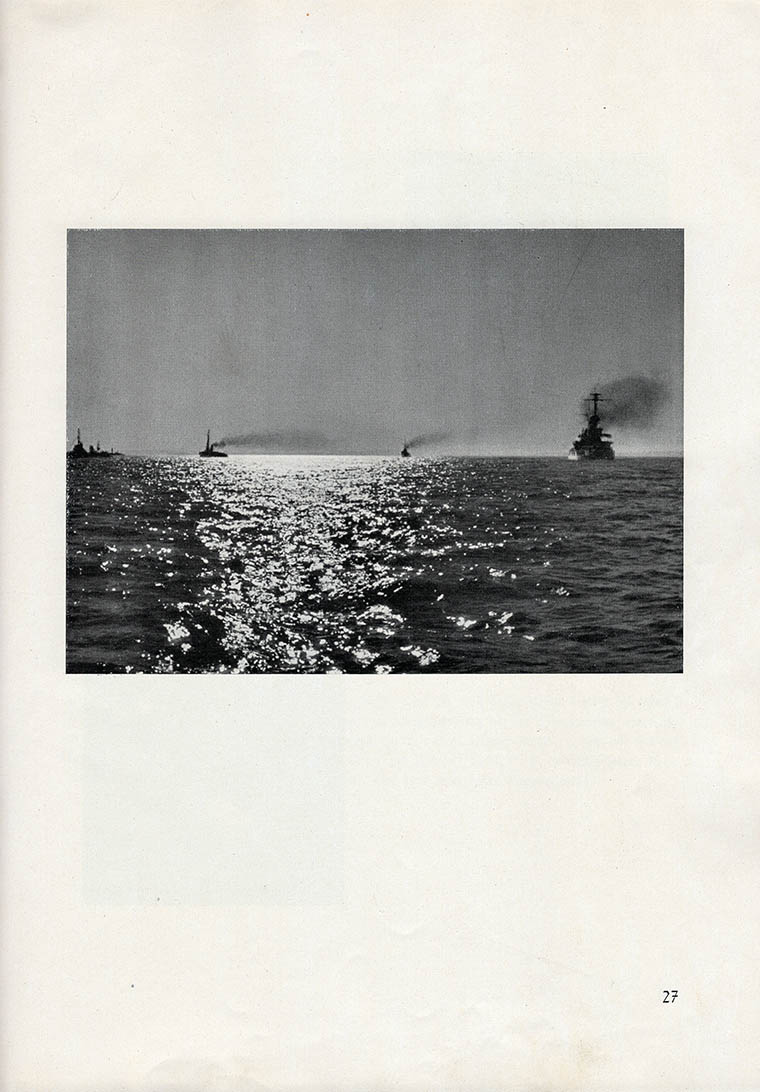
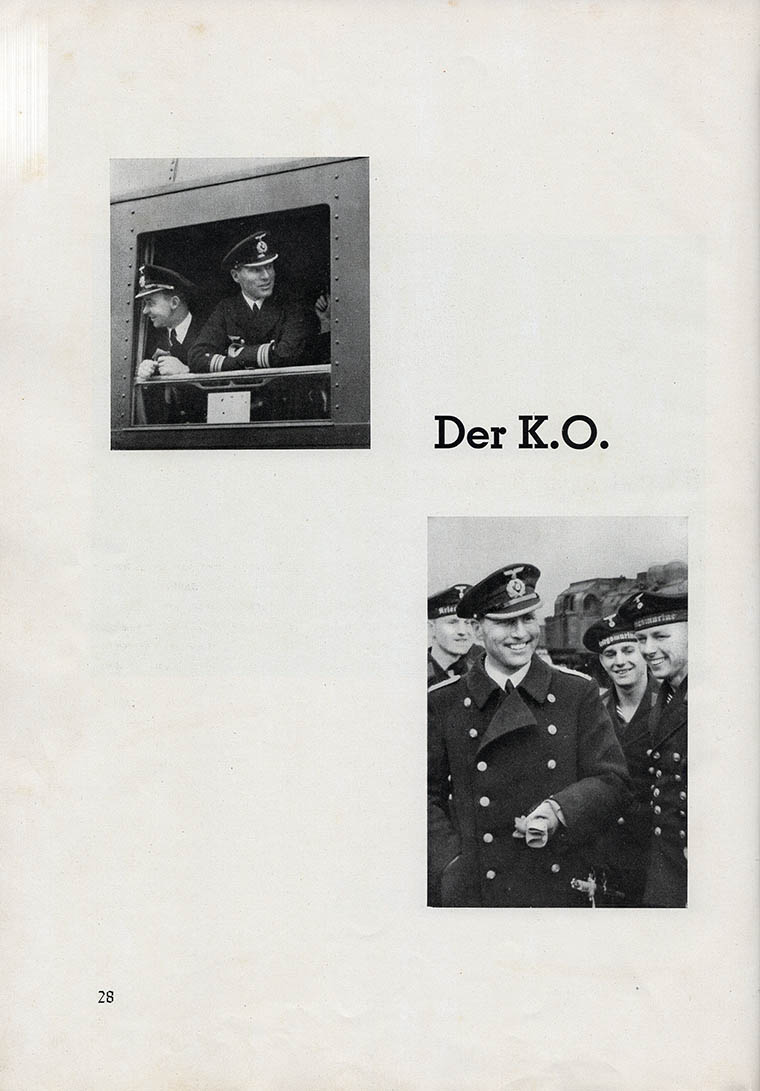
| The K.O. - Kadettenoffizier = Cadets Officer | |||
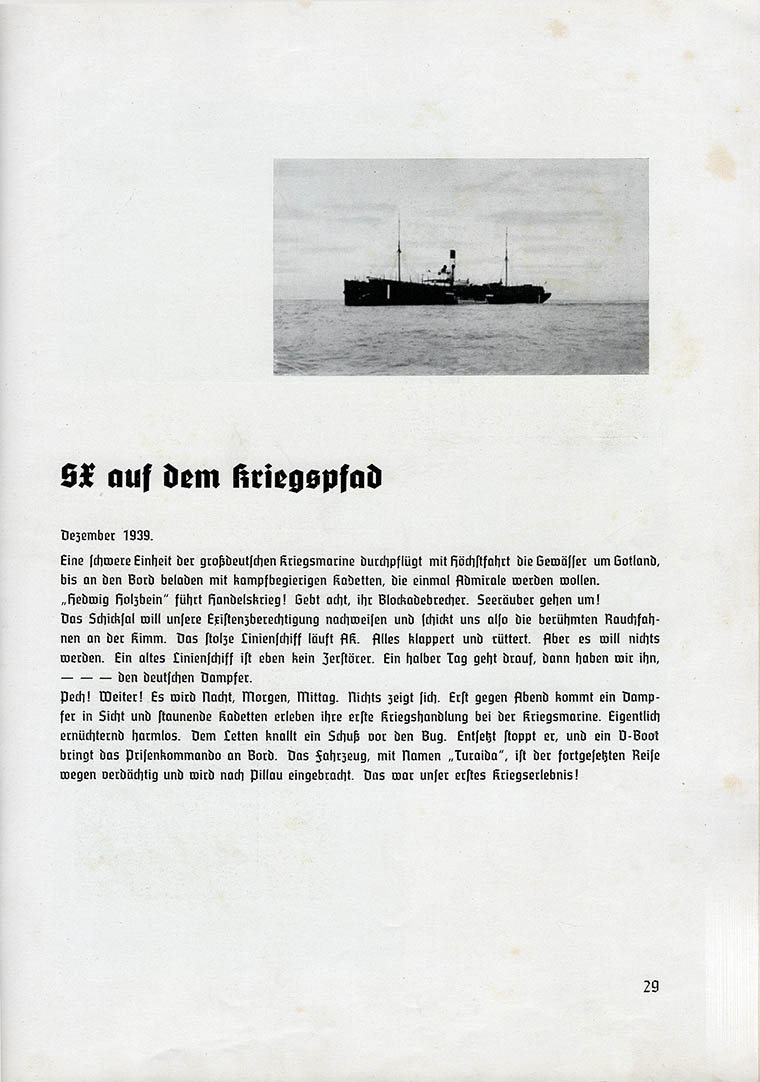
| SX on the warpath | |||
| December 1939. | |||
| A heavy unit of the Greater German Navy is plowing through the guns around Gotland at high speed, loaded on board with cadets eager to fight who want to become admirals one day. | |||
| "Hedwig Holzbein" wages a trade war! Be careful, blockade runners. Pirates go around! | |||
| Destiny wants to prove our right to exist and so sends us the famous plumes of smoke on the horizon. The proud ship of the line runs at AK. Everything rattles and shakes. But nothing will happen. An old battle ship is not a destroyer. Half a day goes by and then we have it - - - the German steamer. | |||
| Bad luck! Continues! It was night, morning, noon. Nothing showed. Towards evening a steamer comes in sight and amazed cadets experience their first action in the Navy. Actually disappointingly harmless. The Latvian gets a shot before the bow. Disgusted, he stops and a U-boat brings the prize crew on board. The vessel, with the name "TURAIDA", is suspect because of the continued journey and was brought to Pillau. That was our first war experience. | |||
| ["Hedwig Holzbein" a comical name for Schleswig-Holstein?] | |||
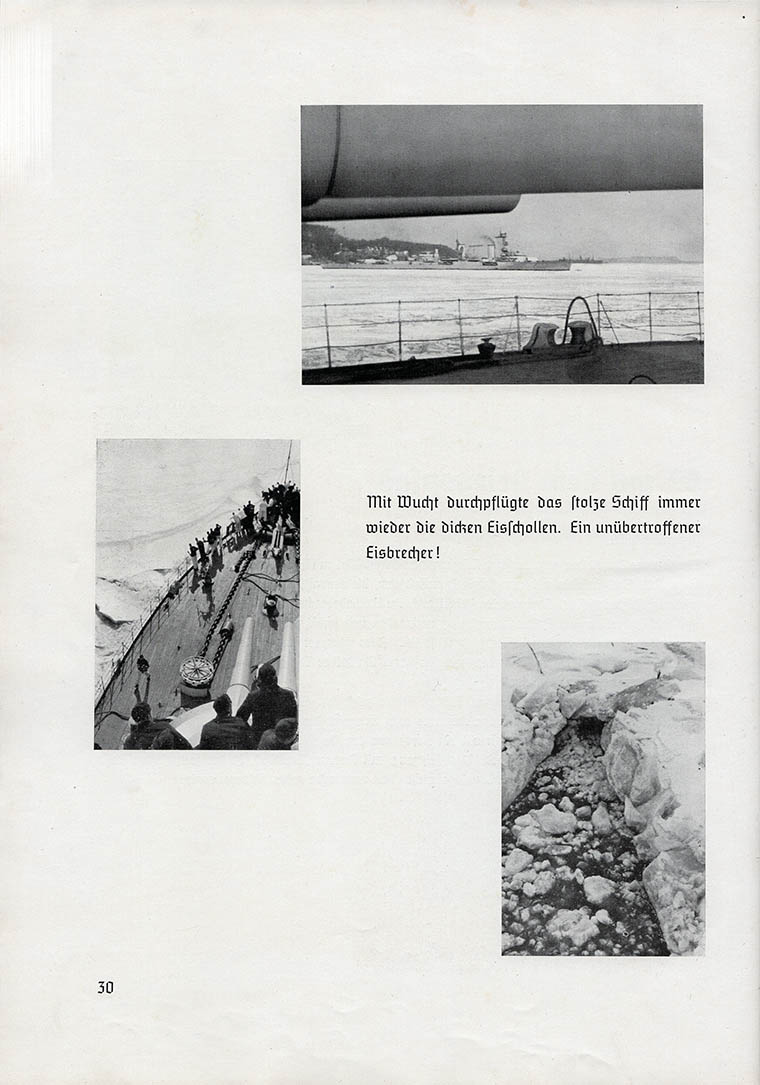
| With might and main, the proud ship plowed through the thick ice floes. An unsurpassed icebreaker! | |||
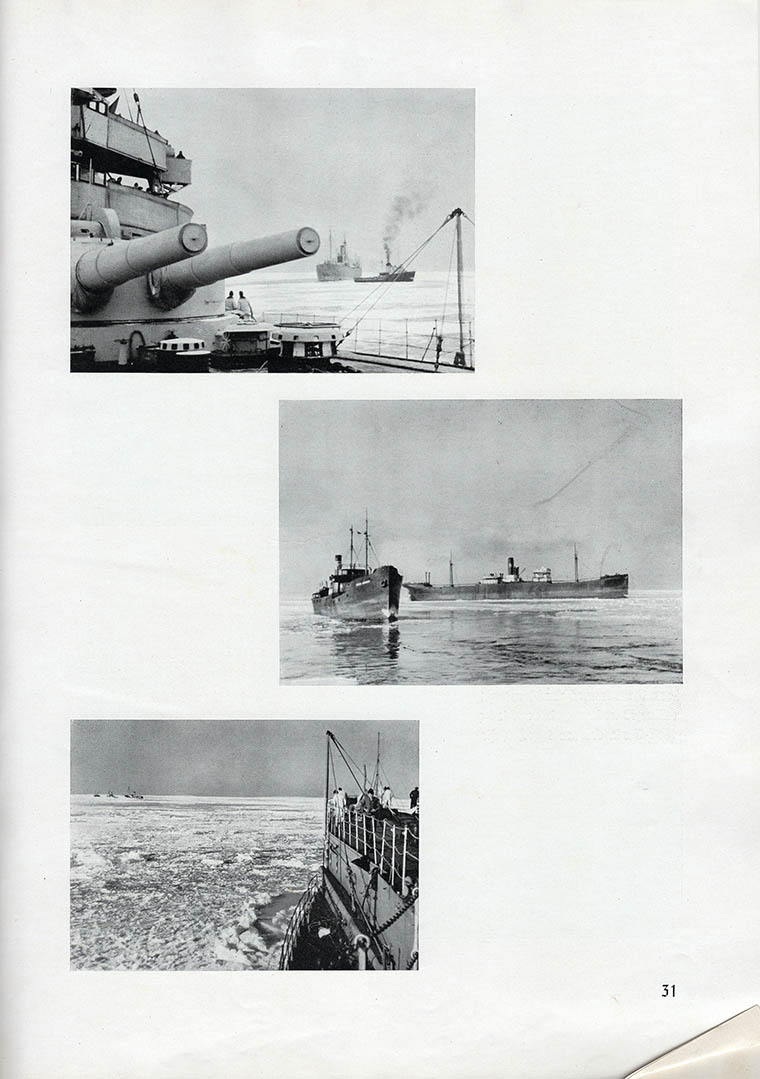
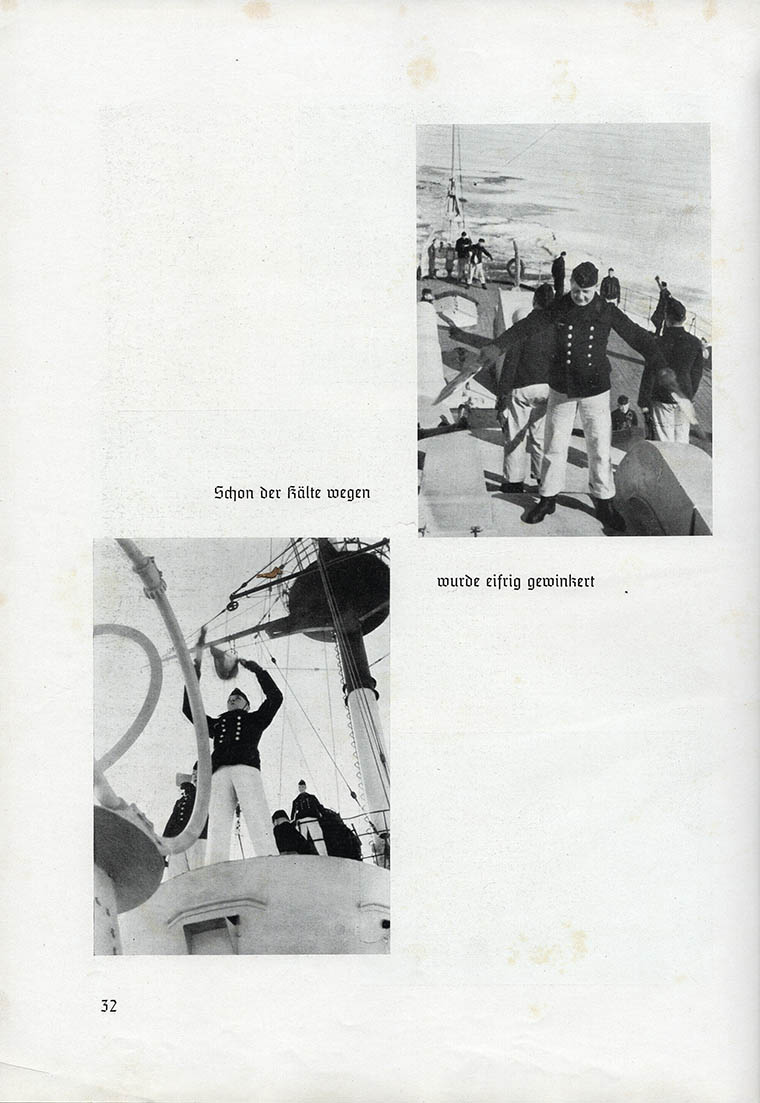
Just because of the cold |
|||
| they waved eagerly. | |||
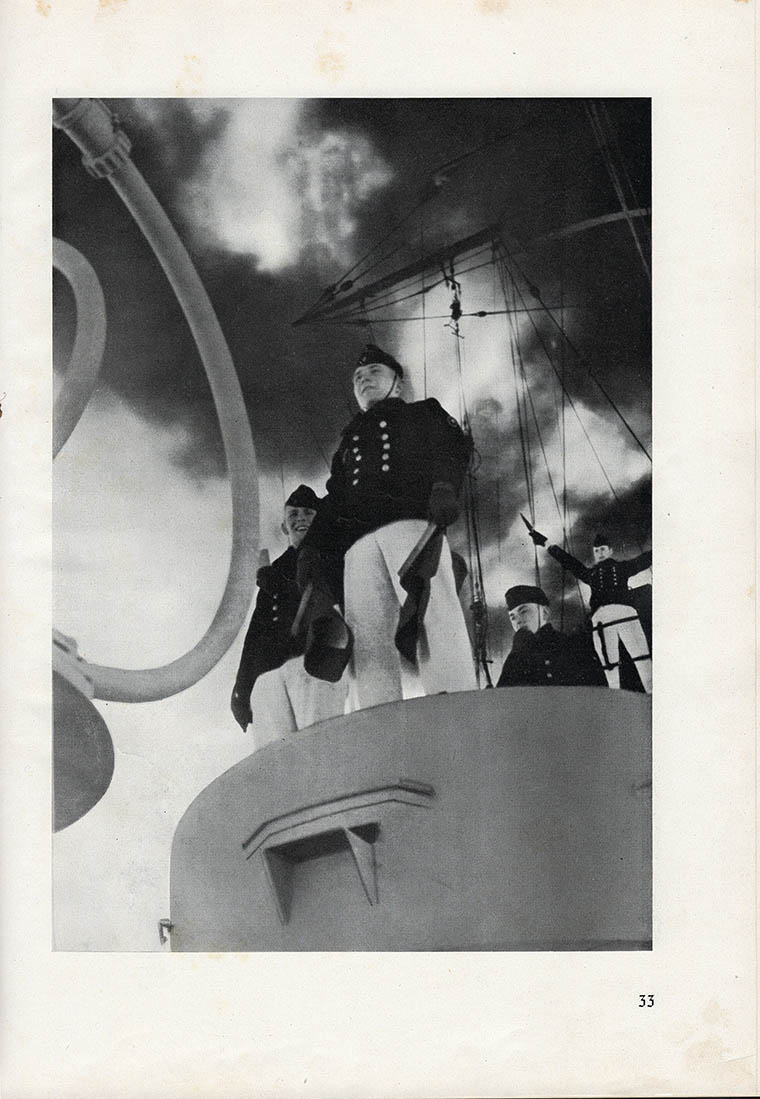
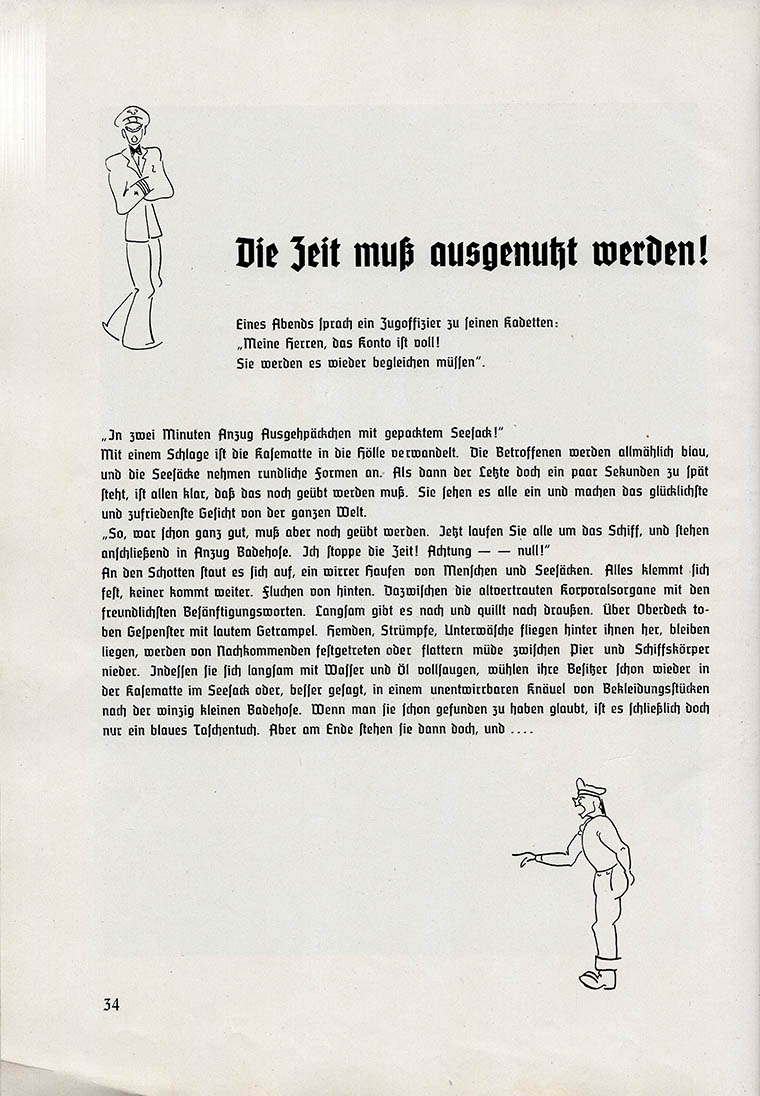
The time must be used! |
|||
| One evening a platoon officer said to his cadets: |
|||
| "Gentlemen, the account is full! | |||
| You will have to pay it back." | |||
| "In two minutes, a suit for going out with a packed sea bag!" | |||
| In one fell swoop the case mate is turned into hell. Those affected gradually turn blue and the duffel bags take on rounded shapes. When the lecture is a few seconds late, it is clear to everyone that this still has to be practiced. They all see it and make the happiest, happiest face in the whole world. | |||
| "So, it was pretty good, but still needs practice. Now you walk all on the ship, and then stand in suit bathing suits. I stop the time! Attention - - zero! | |||
| It's piling up on the bulkheads, a tangled heap of people and sea bags. Everything gets stuck, no one gets any further. Cursing from behind. In between the familiar Corporal organs with the friendliest places of employment. It is slowly giving way and swells outwards. Ghosts are raging across the upper deck with loud trampling. Shirts, stockings, underwear fly behind them, stay where they are, are trampled on by those who follow, or flap wearily down the pier and hull of the ship. While they slowly soak themselves with water and oil, their owners are already rummaging in the case mate in the duffel bag or, rather, in an inextricable tangle of clothing for the tiny little swimming trunks. If you think you've found it, it's just a blue handkerchief after all. But in the end they stand anyway, and . . . | |||
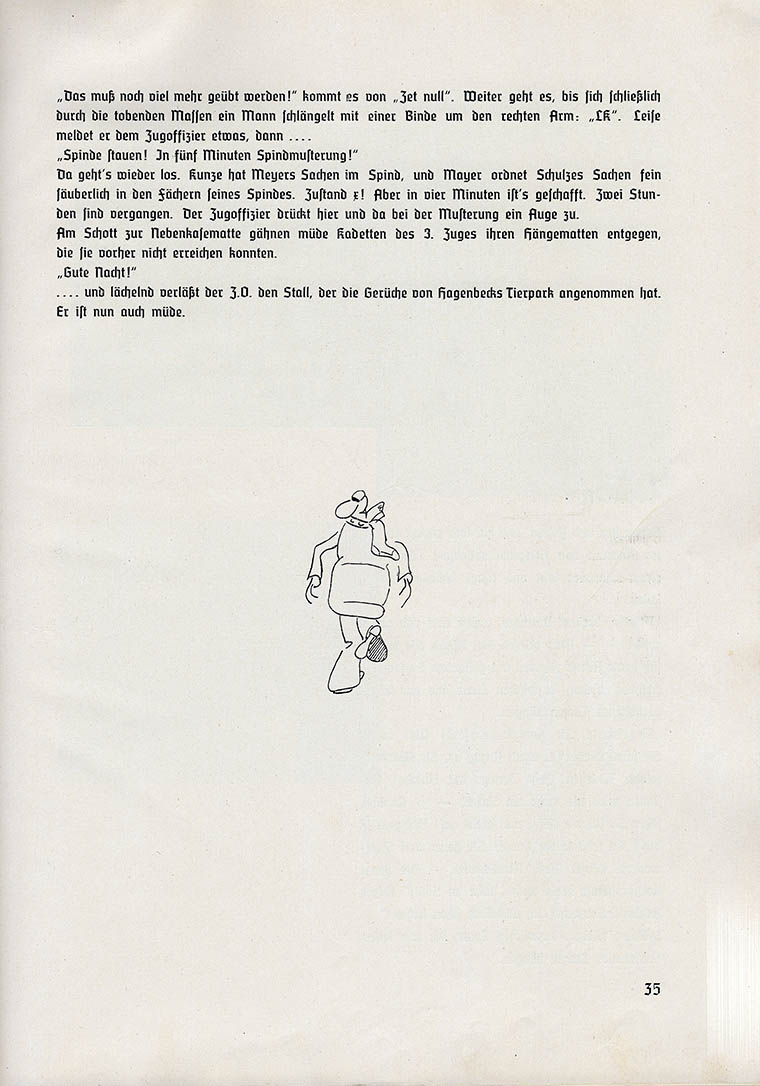
| "That needs a lot more practice!" does it come from "Still nothing". It goes on until finally a man winds his way through the raging malls with a bandage and his right arm: "LK". He quietly reports something to the platoon officer, then . . . | |||
| "Stow lockers! In five minutes locker muster!" Here we go again. Kunze has Meyer's things in his locker, and Mayer arranges Schulze's things neatly in the compartments of his locker. Condition X! But it's done in four minutes. Two hours have passed. The platoon officer turns a blind eye here and there during the muster. | |||
| At the bulkhead of the side case mate, tired cadets of the 3rd platoon yawn towards their hammocks, which they could not reach before. | |||
| "Good night!" | |||
| . . . and smiling leaves the platoon officer the barn that took on the smells of Hagenbeck's pack of animals. He's tired now too. | |||
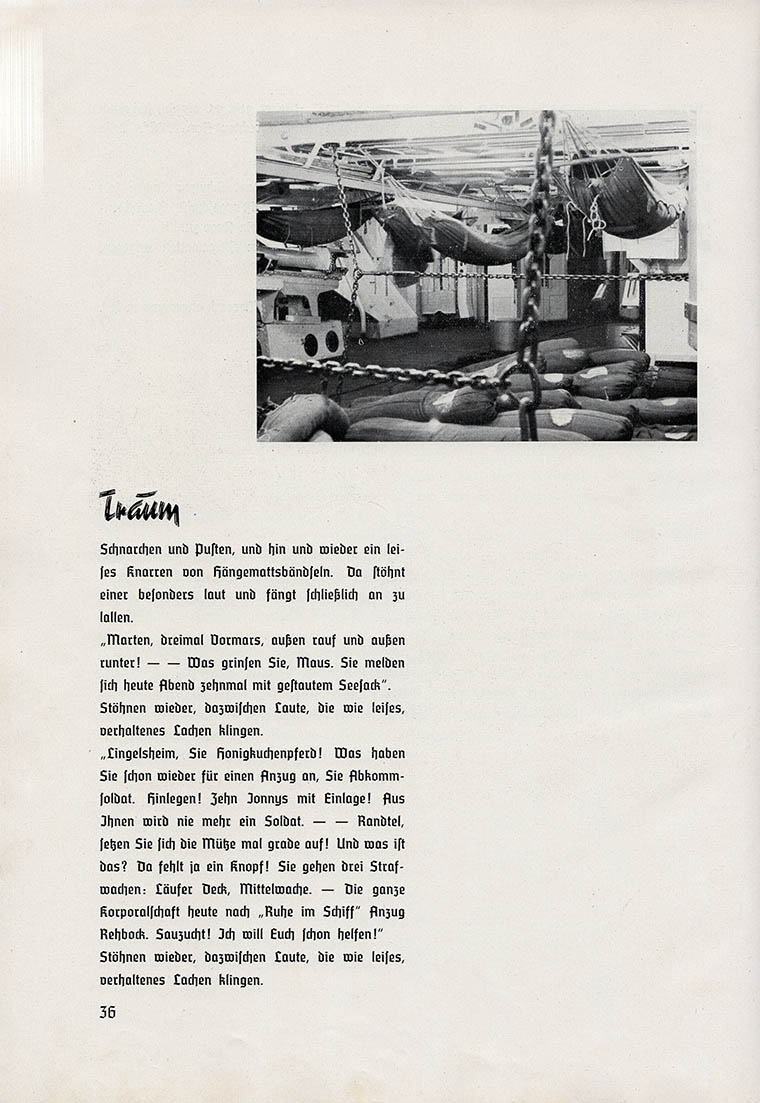
| Dream | |||
| Snoring and blowing, and every now and then a soft creaking of hammock cords. One moans particularly loudly and finally begins to babble. | |||
| "Marten, forward three times, up on the outside and down on the outside! - - Why are you grinning, Maus. They report ten times tonight with a stowed duffel bag." Moaning again, in between noises that sound like soft, restrained laughter. | |||
| "Lingelscheim, you honey cake horse! What kind of suit are you wearing again, you contract soldier. Lie down! Ten Jonny's with inserts! You'll never become a soldier again That? There's a button missing! You against three punishment watches: deck runner, mid-watch - the whole Corporal body today after "Calm in the ship" suit roebuck. Swine spawn! I want to help you!" Moaning again, in between noises that sound like soft, restrained laughter. | |||
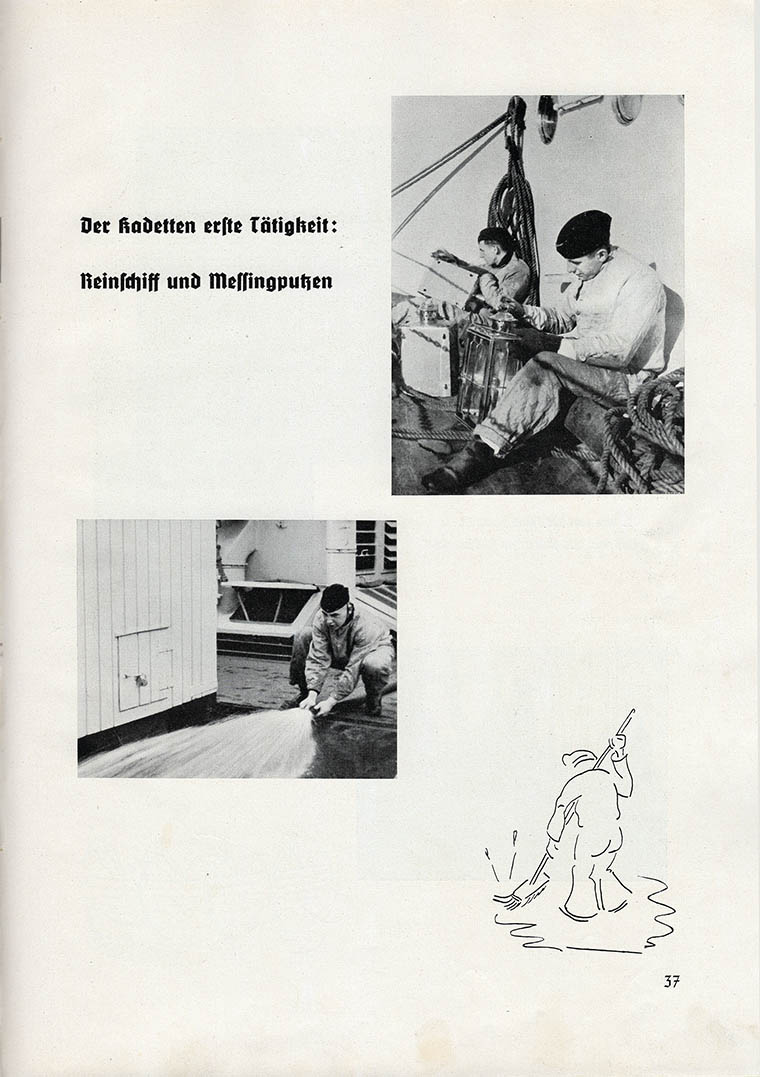
| The Cadets' first activity: | |||
| Cleaning ship and brass polishing. | |||
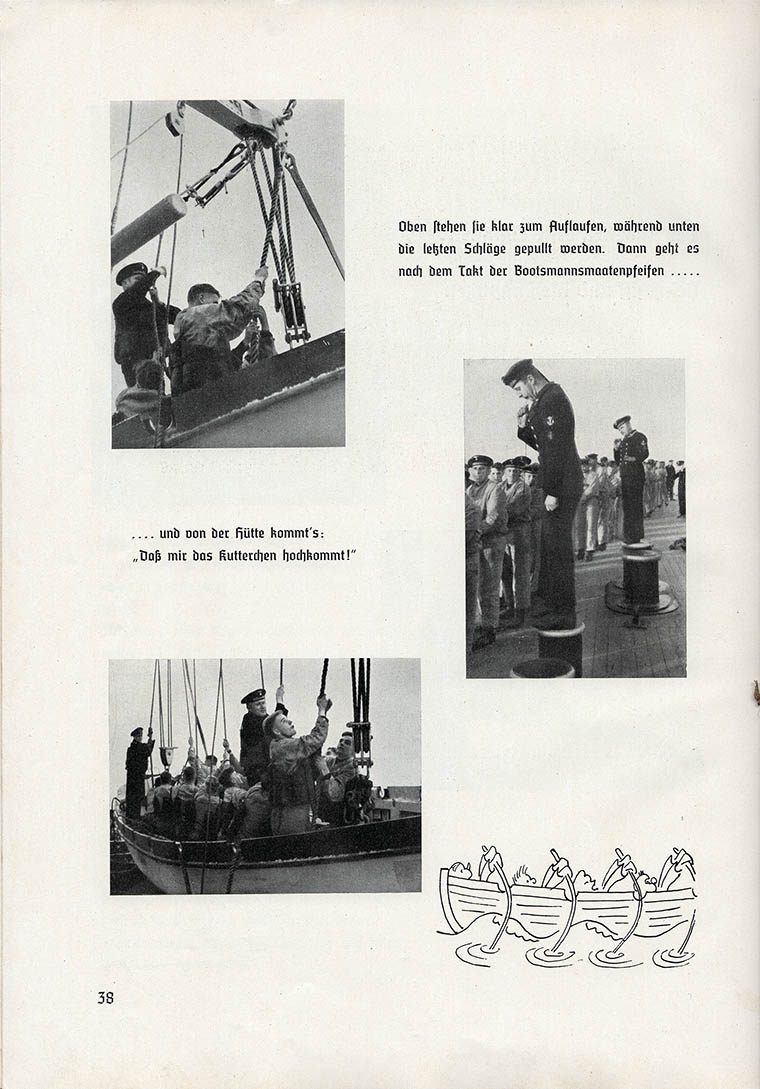
| Above they are ready to raise up, while below the last strokes are being pulled. Then it goes according to the beat of the bosun's mate's whistle. . . | |||
| . . . and from the boat it comes: "The little cutter is coming up!" | |||
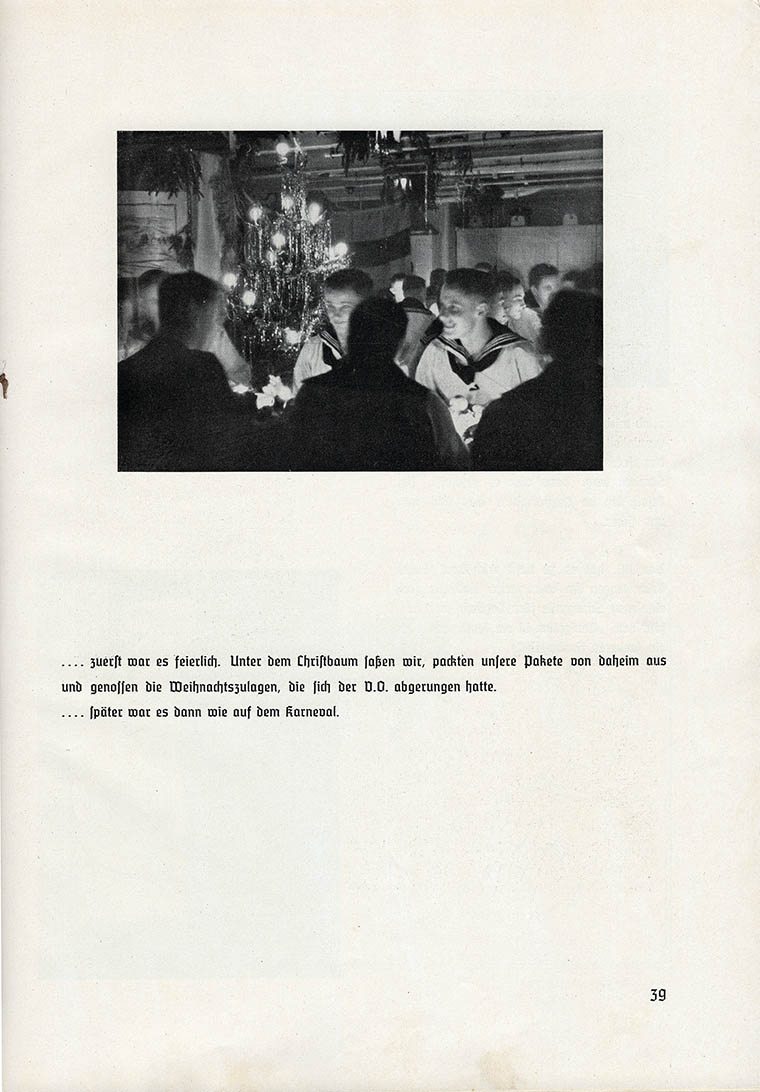
| . . . . at first it was solemn. We sat under the Christmas tree, unwraped our packages from home and enjoyed the Christmas bonuses that the D.O. had wrested. | |||
| . . . . later it was like a carnaval. | |||
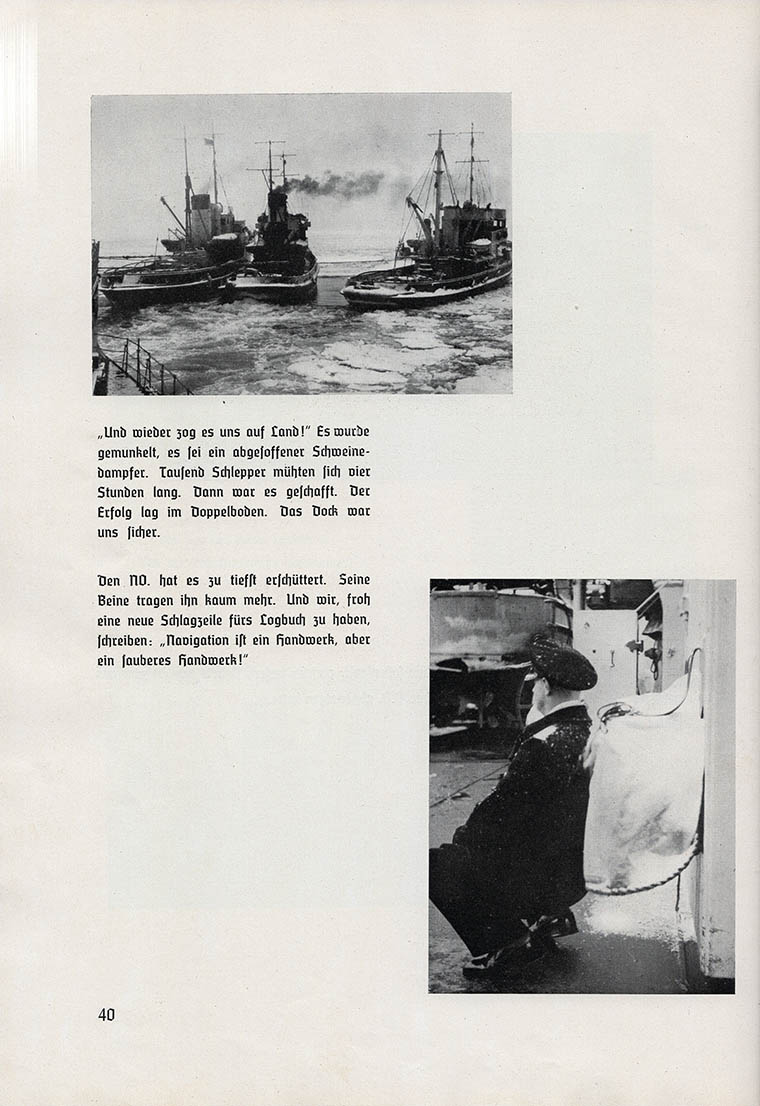
| "And again we were drawn to land!" It was rumored to be a flooded hog steamer. A thousand tugs struggled for four hours. Then it was done. Success lay in the double bottom. The dock made us safe. | |||
| the NO. [Navigation Officer] was shaken to the core. His legs could hardly carry him anymore. And we, happy to have a new headline for the logbook, write in: "Navigation is a craft, but a magical craft! | |||
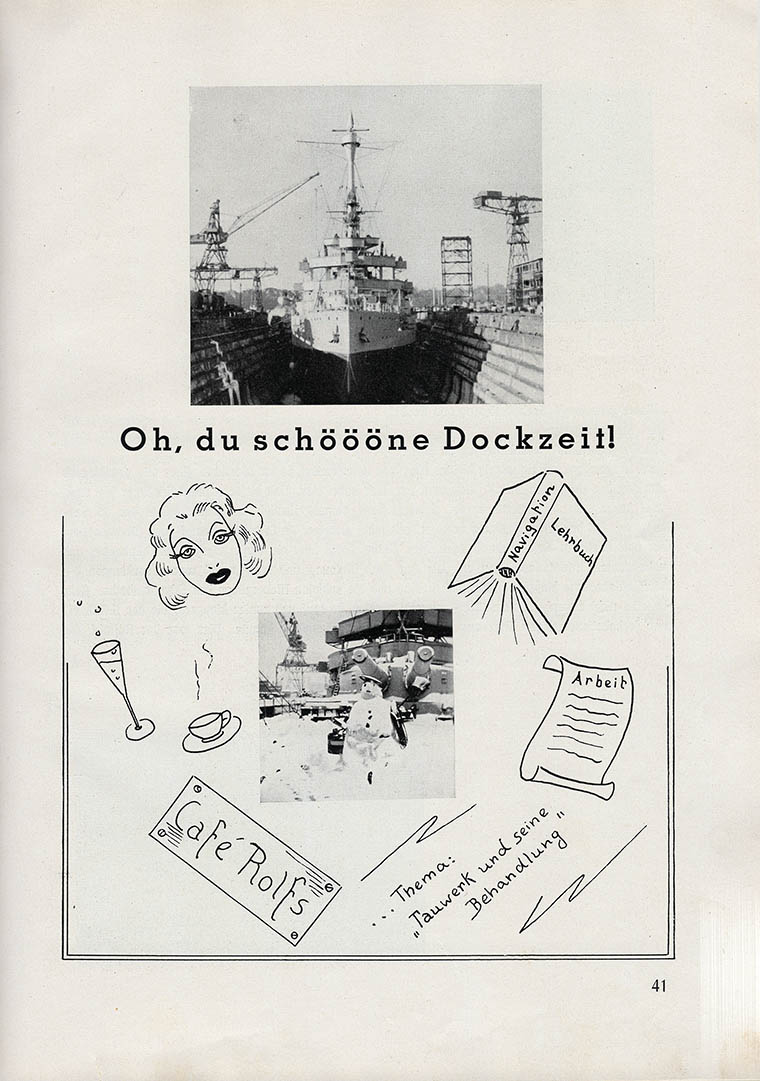
| Oh, you beeeeaaaauuuuuuuutiful dock time! | |||
| Navigation Textbook | |||
| Work | |||
| Theme: cordage and its treatment | |||
| Cafe Rolfs | |||
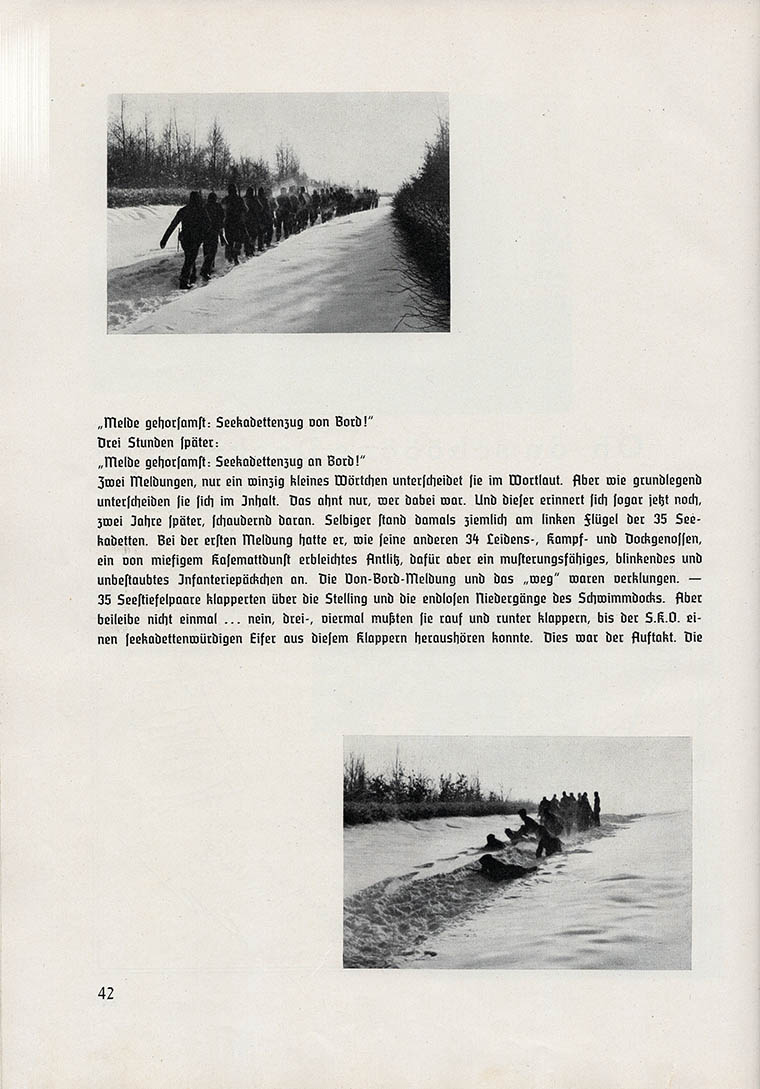
| "Report dutifully: See Cadets off board!" | |||
| Three hours later: | |||
| "Report dutifully: Sea Cadets on board!" | |||
| Two messages, only a tiny little word distinguishes them in the wording. But how fundamentally they differ in content. You only know who was there. And one still remembers it, two years later, with a shudder. At that time, the same was pretty much on the left wing of the 35 sea cadets. At the first report he had, like his other 34 fellow sufferers, fighting and docking comrades, an face pale from the lousy haze of coffee, however a musterable, flashing and undusted infantry uniform. The off board message and the "Away" had faded away. - 35 pairs of sea boots clattered over the station and the enclosed companionways of the floating dock. But by no means once . . . no, three or four times they had to rattle up and down until the S.k.O. [See Cadet Officer] could hear an eagerness worthy of a sea cadet in this rattling. This was the start. the | |||
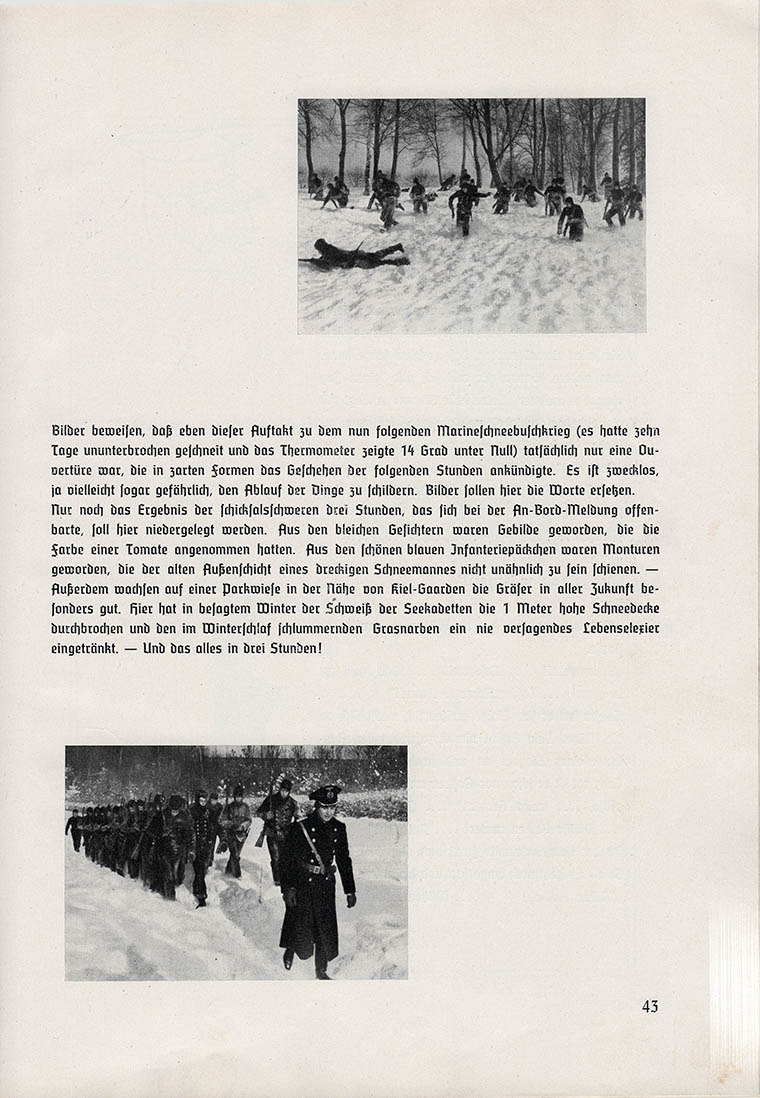
| pictures prove that this very beginning of the ensuing naval snowbush war (it had snowed non-stop for ten days and the thermometer was 14 degrees below zero) was actually just an overture that announced in delicate forms the events of the following hours. It is pointless, perhaps even dangerous, to describe the course of events. Pictures should replace the words here. Only the result of the fateful three hours, which was revealed in the on-board report, should be recorded here. The pale faces had become shapes the color of a tomato. The pretty blue infantry uniforms had become uniforms that seemed not dissimilar to the old outer skin of a threesome snowman. - In addition, the grasses will grow particularly well on a park meadow near Kiel-Gaarden in the future. Here, in that winter, the sweat of the sea cadets broke through the 1 meter high blanket of snow and impregnated the slumbering turf with a never fading element of life. - And all in three hours! | |||
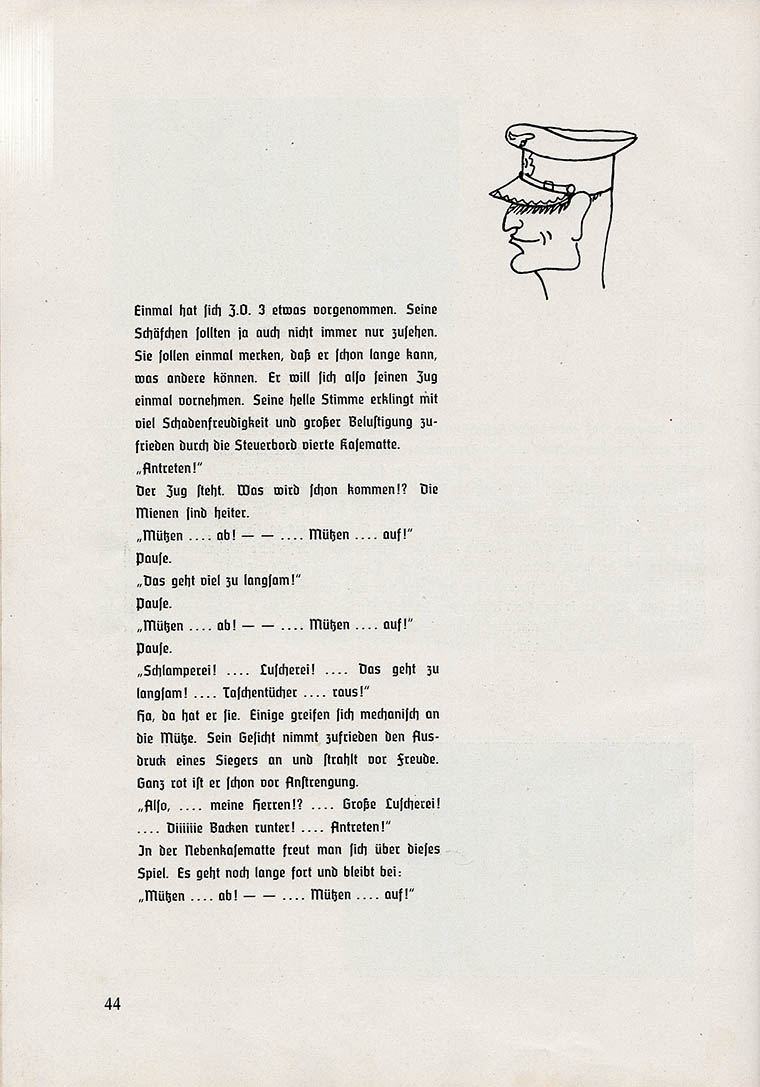
| Once Platoon Officer 3 carried something out. His followers shouldn't always just watch. You should realize that he can do what others can for a long time. So he wants to take his Platoon. His bright voice rings out through the starboard fourth case mate with a great deal of maliciousness and great relief. | |||
| "Fall in!" | |||
| The Platoon stops. Whats to come!? The faces are cheerful. | |||
| "Must . . . go! - - . . . Must . . come!" | |||
| "That goes much too slowly!" | |||
| Pause. | |||
| "Must . . . go! - - . . . Must . . come!" | |||
| Pause. | |||
| "Sloppiness! . . . Fooling around! . . . That goes too slowly! . . . Handkerchiefs . . . out!" | |||
| Ha, there he is. Some mechanically take their leisure. His face takes on the expression of a winner and beams with joy. He's already red from exertion. | |||
| "So, . . . Gentlemen!? . . . Great fooling around! . . . The jaws down! . . . Fall in!" | |||
| In the next case mate, everyone is happy about this game. It goes on for a long time and stays with: | |||
| "Must . . . go! - - . . . Must . . come!" | |||
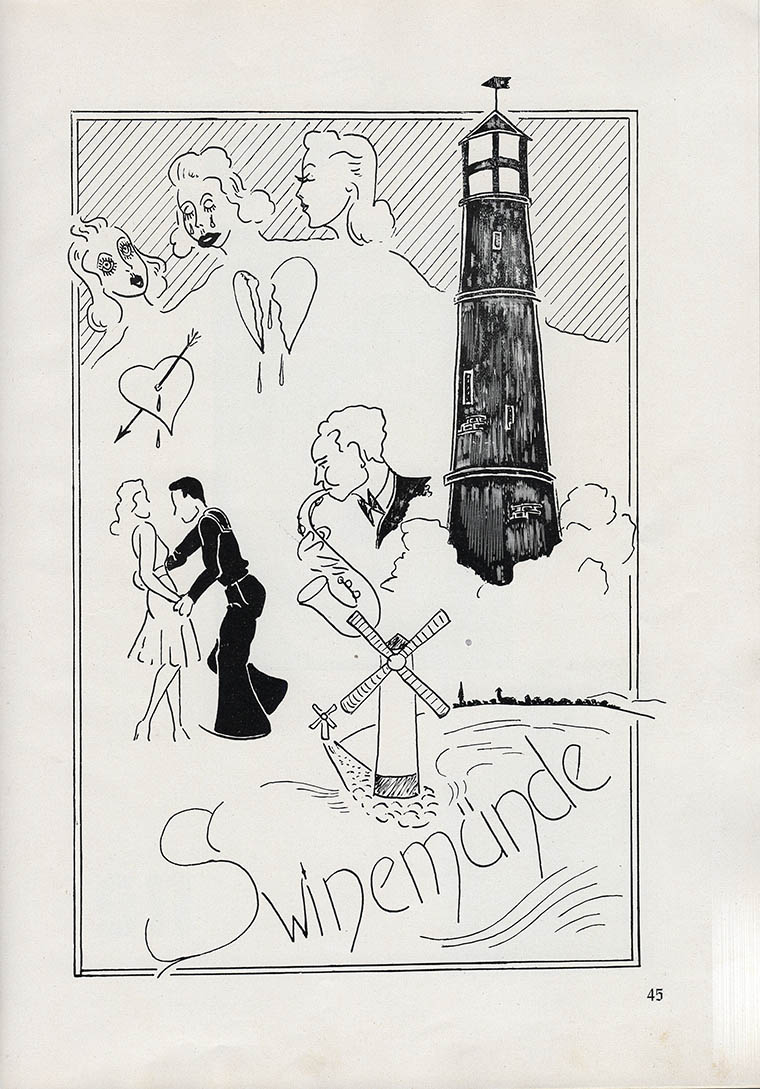
| [Swinemünde = Świnoujście a city is located in the extreme north-west of Poland on the Strait of Świna, which in its northern part connects with the Baltic Sea, and in the south with the Szczecin Lagoon.] | |||
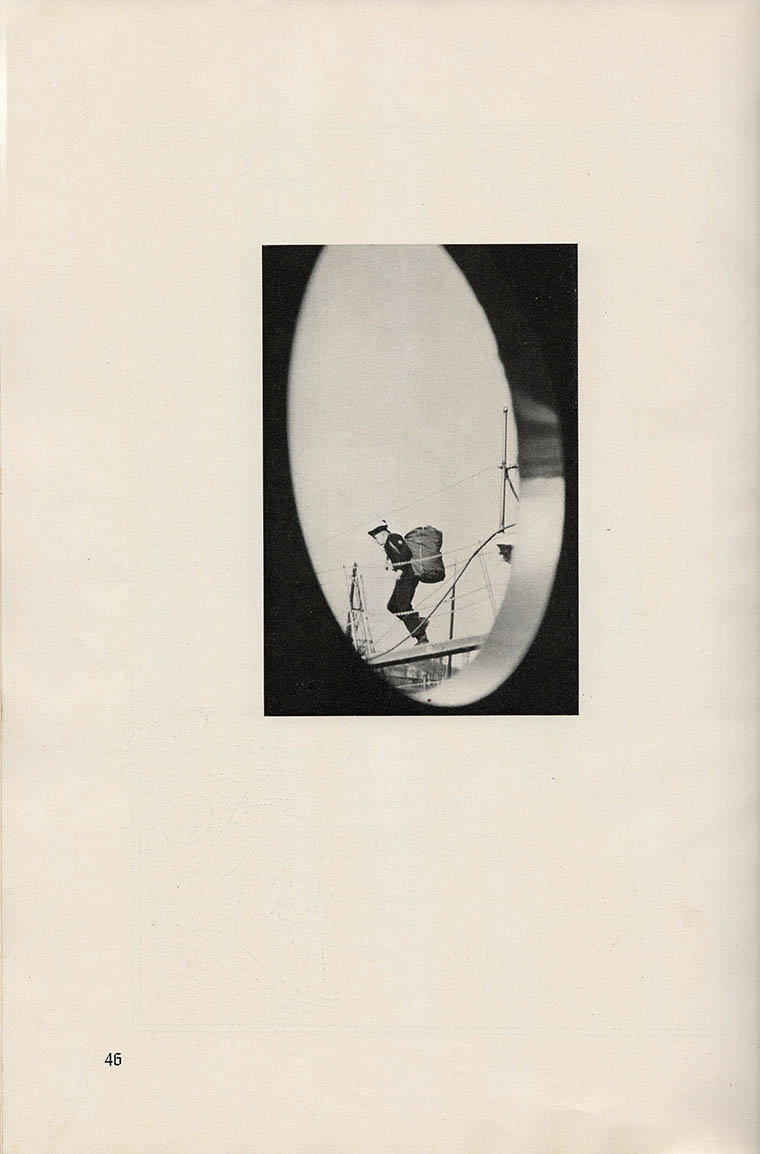
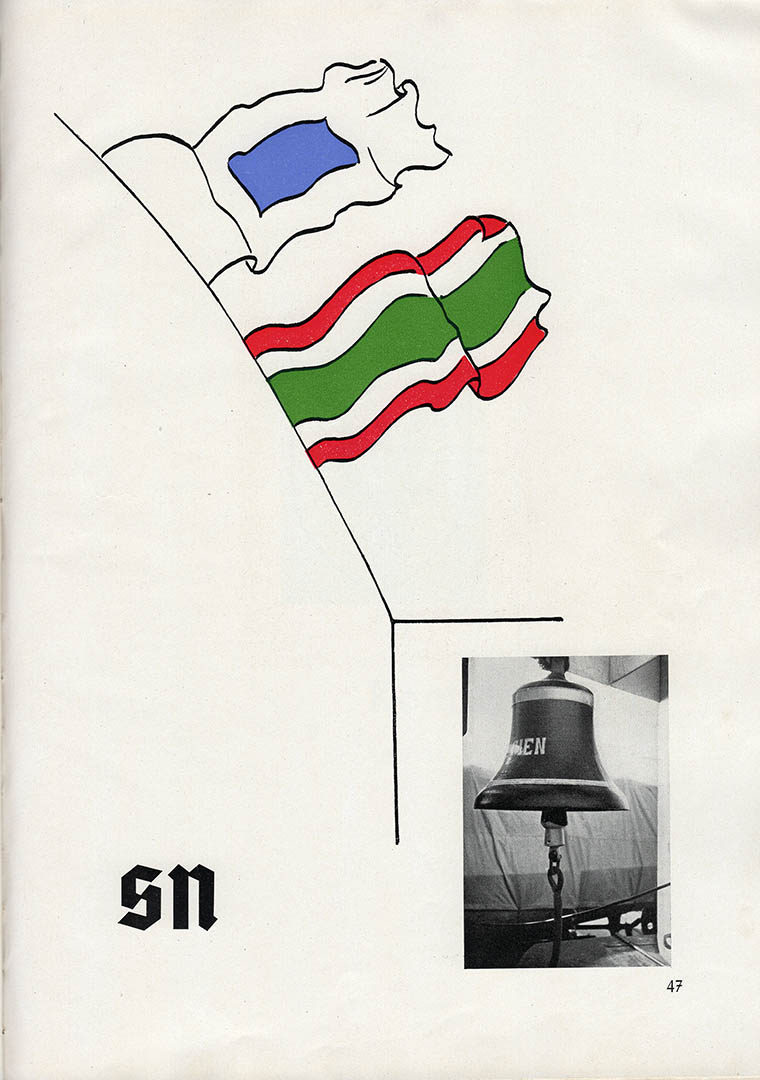
| SN - call-letters of the Battleship Schlesien | |||
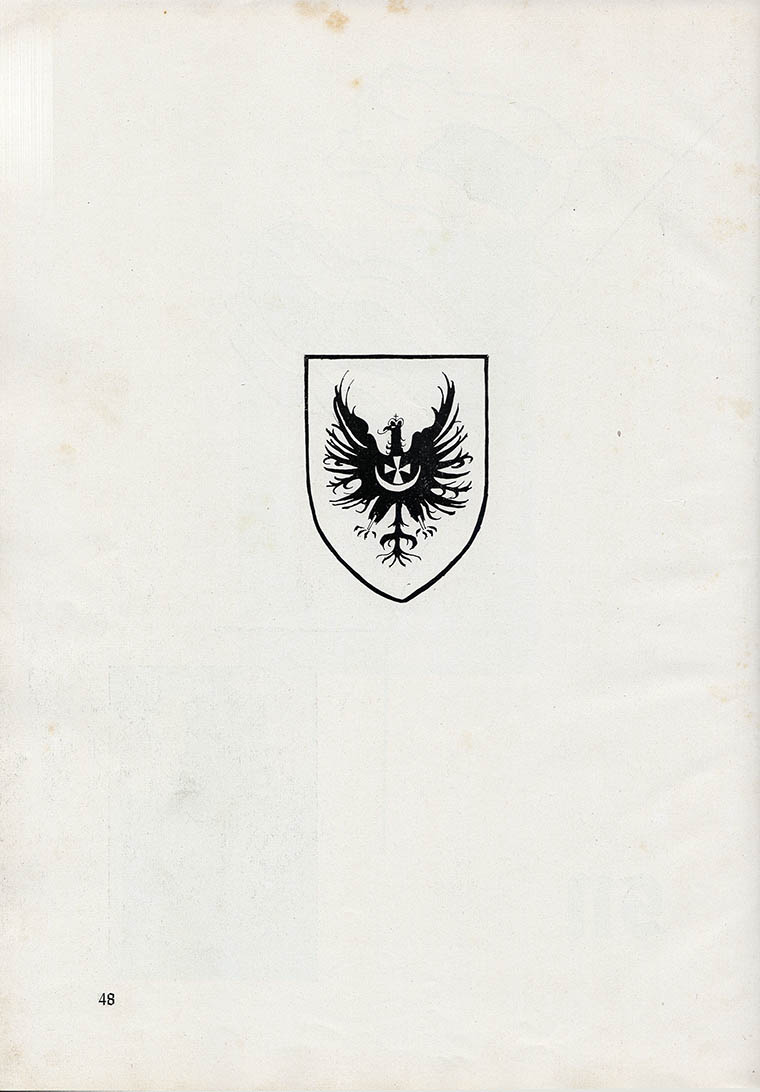
| [Schlesien was named after the German of Silesia - -hence the Silesia Shield.] | |||
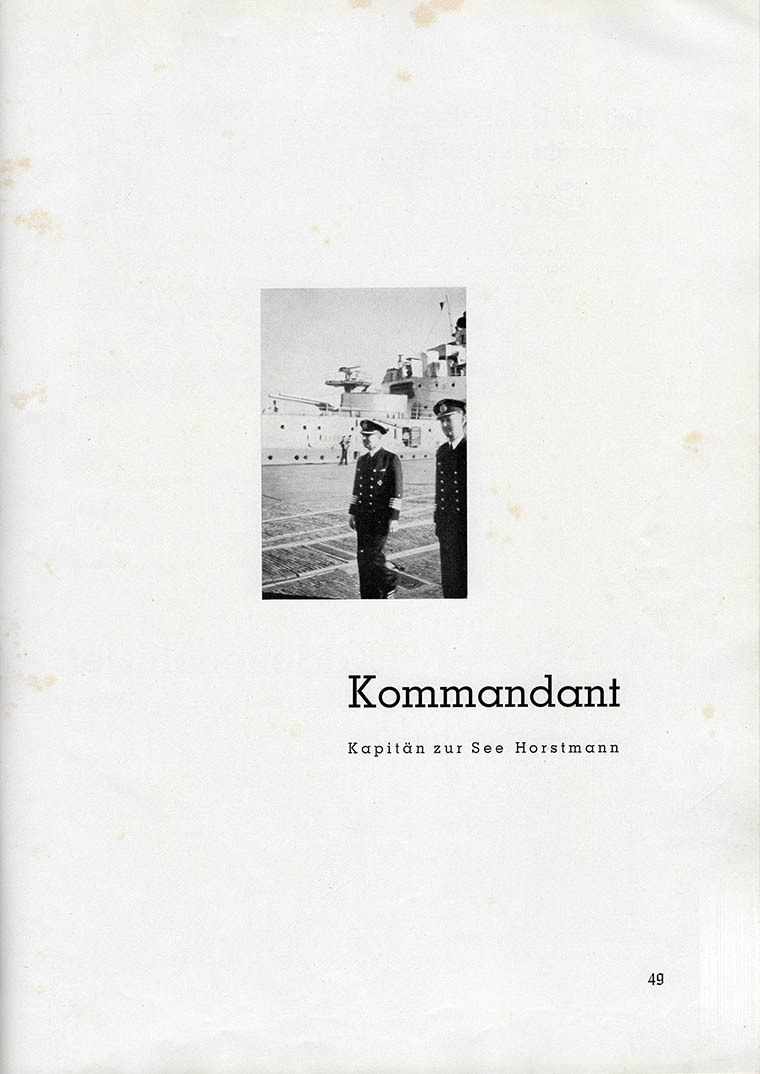
| Commander | |||
| Kapitän zur See Horstmann | |||
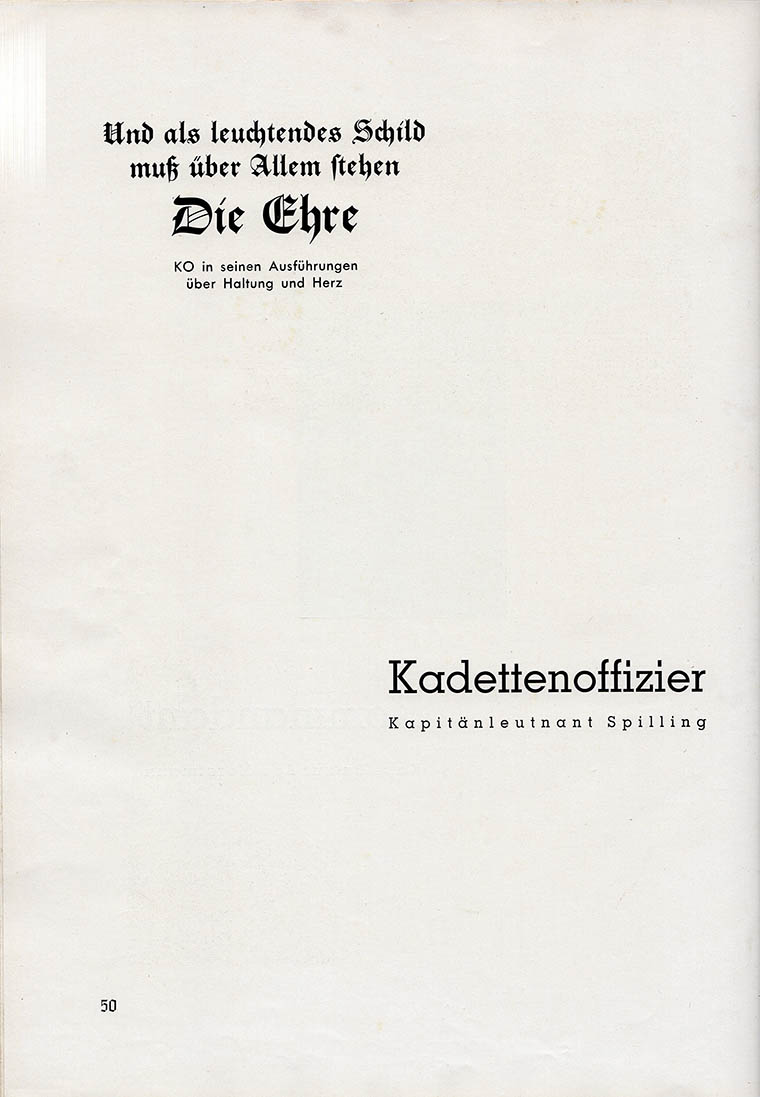
| And as a shining shield | |||
| must stand above all | |||
| The Honor | |||
| Cadet Officer in his comments on attitude and heart | |||
| Cadet Officer | |||
| Kapitänleutnant Spilling | |||
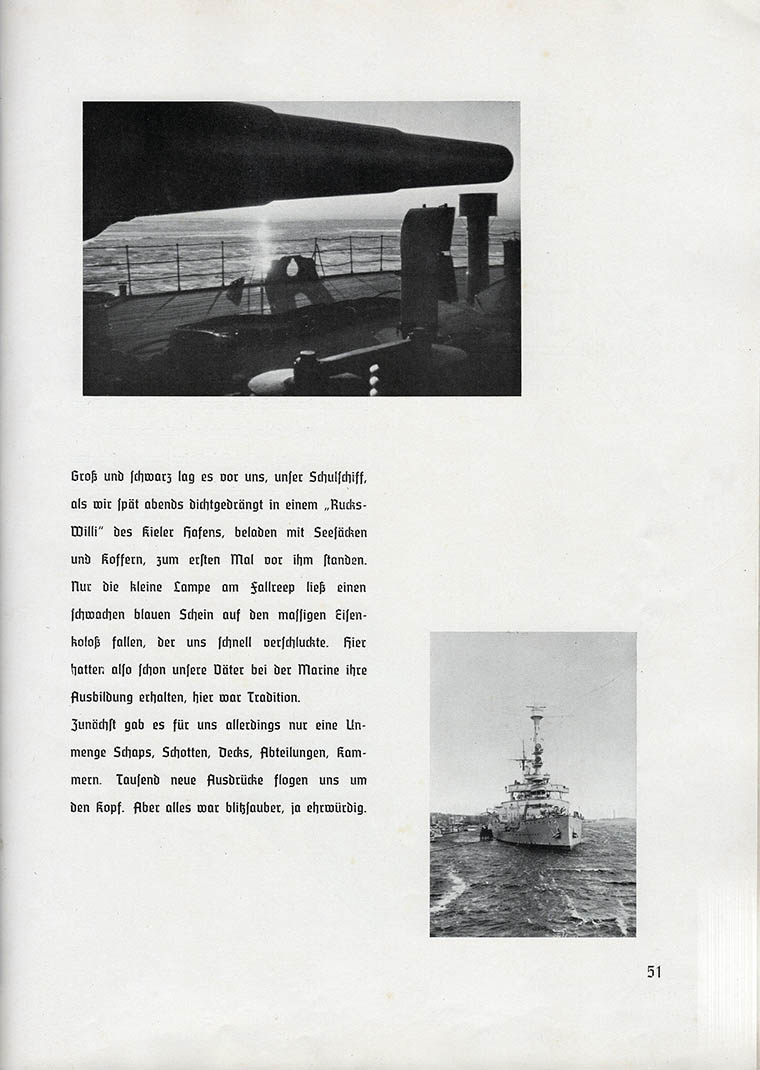
| It lay big and black before us, our training ship, when we stood before it for the first time late in the evening, crowded together in a "Rucks-Willi" from the port of Kiel, loaded with sea bags and suitcases. Only the small lamp on the gangway cast a weak blue glow on the massive iron colossus, which quickly swallowed us. This is where our fathers had received their training in the Navy, and there was a tradition here. | |||
| At first there were only a plethora of lockers, bulkheads, decks, compartments, and chambers. A thousand new expressions flew around our heads. But everything was sparkling clean, even decent. | |||
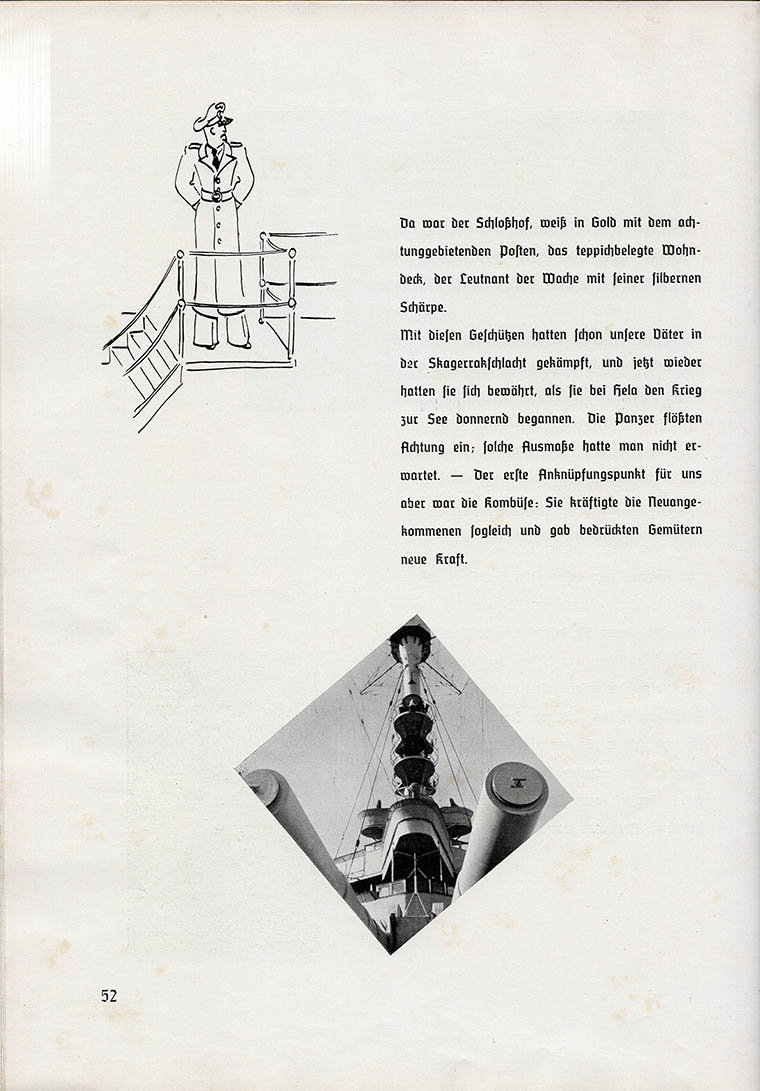
| There was the courtyard, white in gold with the sentry commanding respect, the carpeted living deck, the Lieutenant of the Watch with his silver sash. | |||
| Our fathers had fought with these guns in the Battle of the Skagerrak, and now they had proved their worth again when they thundered out at Hela in the naval war. The armor instilled respect; such proportions were not expected. - But the first point of contact for us was the galley: it immediately strengthened the newcomers and gave new strength to depressed spirits. | |||
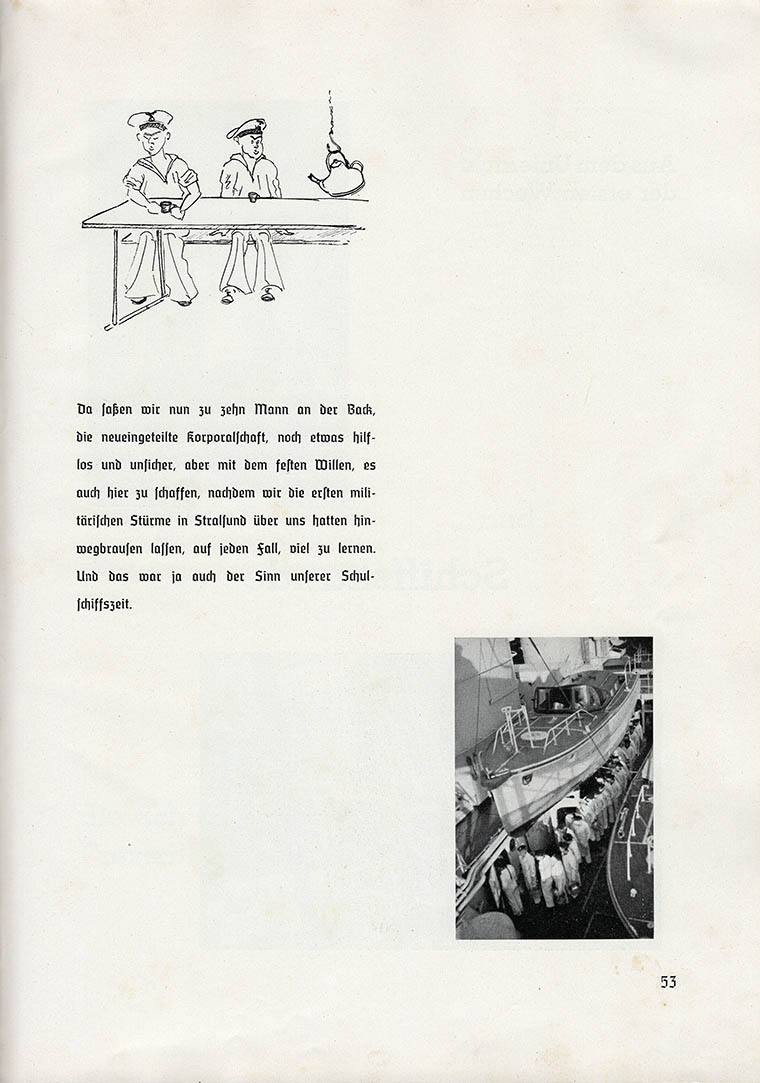
| There we sat to ten men at the back, the newly appointed corporal, still somewhat helpless and insecure, but with the gesture of wanting to make it here too, after we had let the first military storms in Stralsund blow over us, definitely, much to learn. And that was the point of our school ship time. | |||
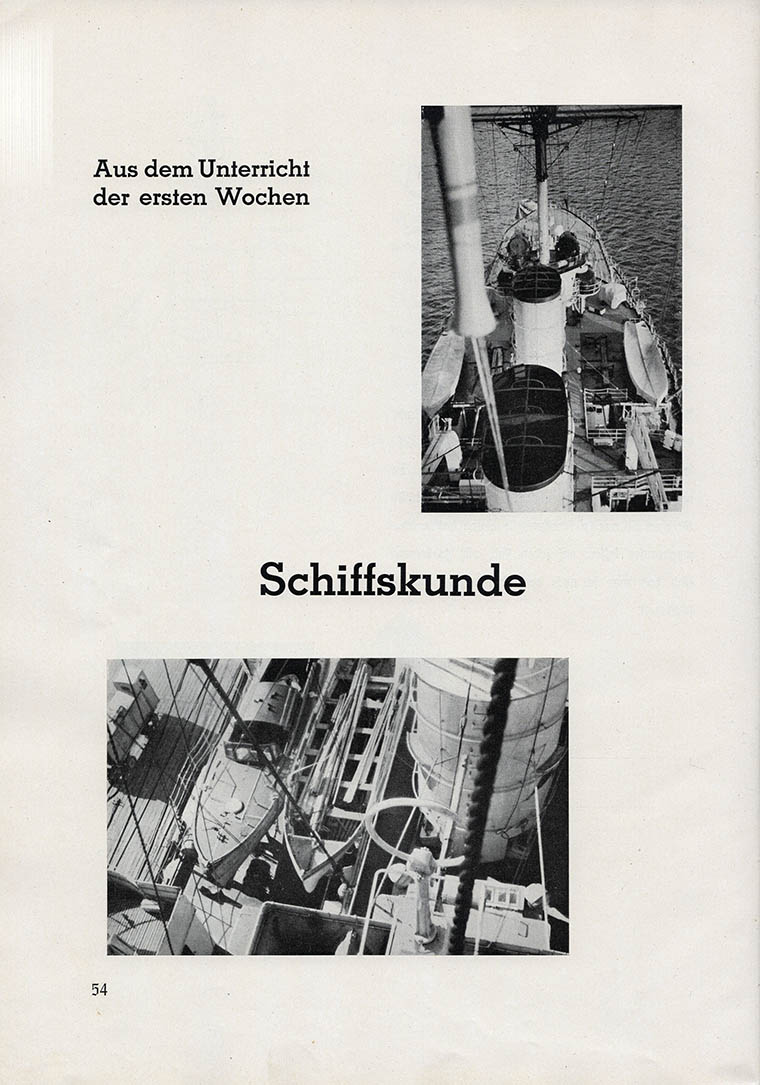
| From the lessons | |||
| of the first weeks | |||
| Ship Science | |||
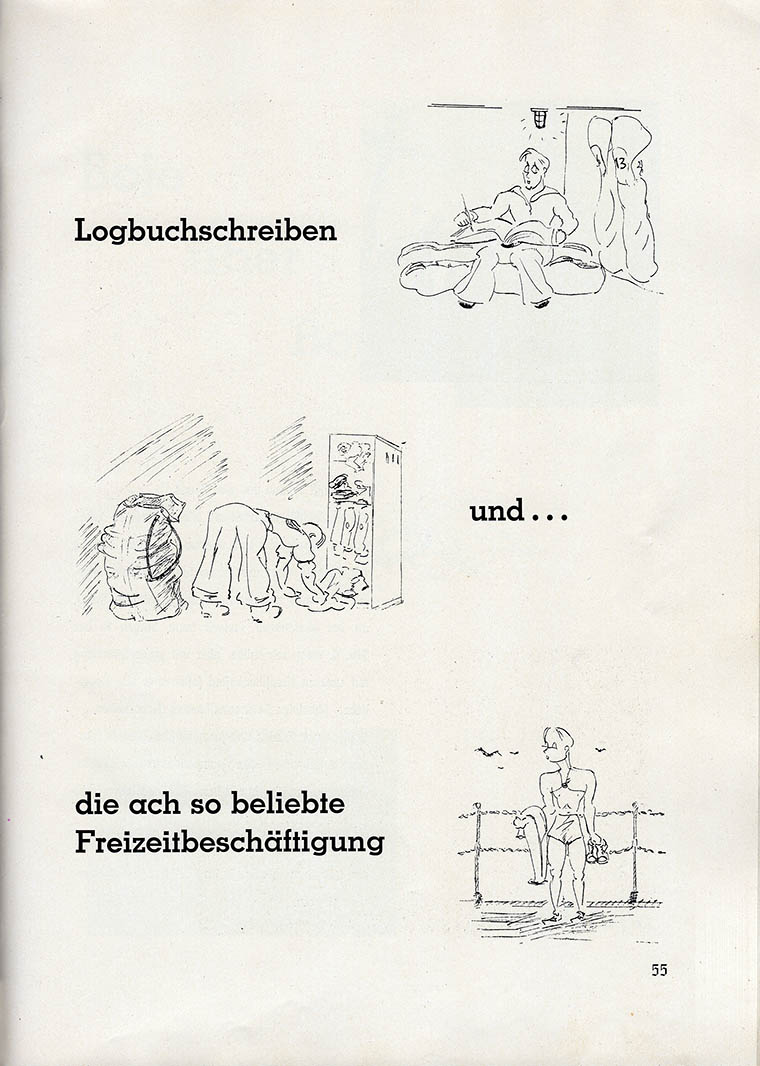
| Logbook writing | |||
| and . . . | |||
| the oh so popular leisure activity | |||
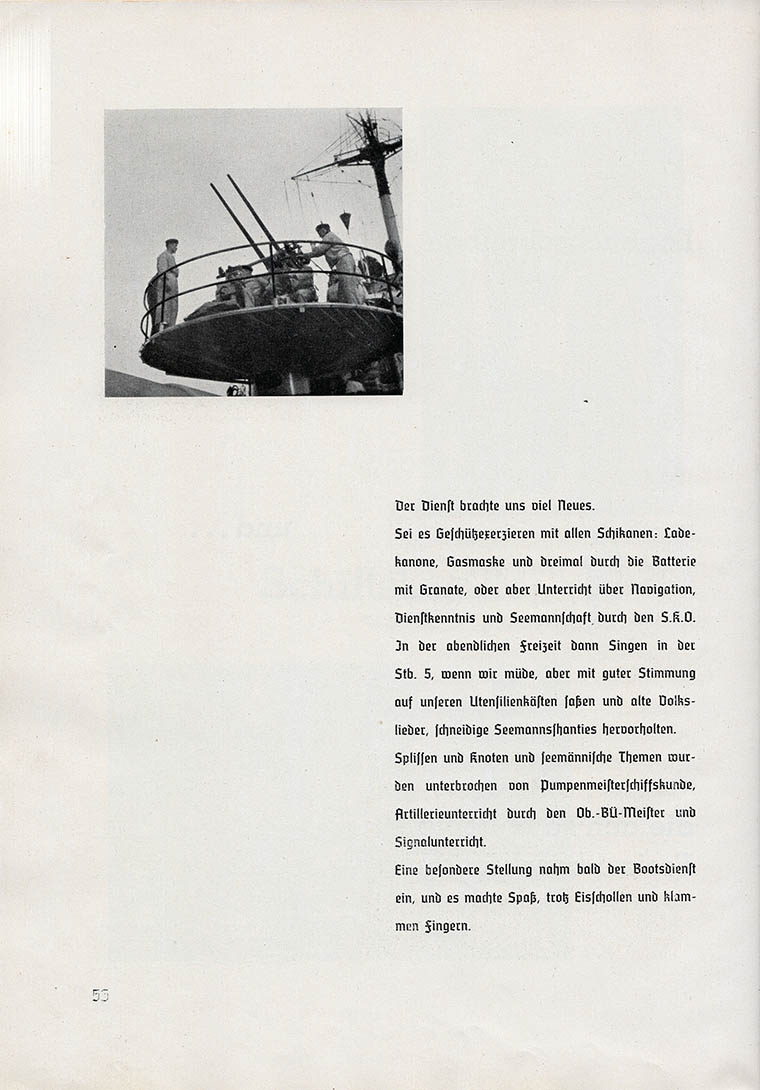
| The service brought us many new things. | |||
| Be it guns with all the bells and whistles: Loading cannon, gas mask and three times through the battery with shells, or lessons on navigation, service knowledge and seamanship by the S.K.O. In the evening free time we sing on Starboard 5, when we're tired but in a good mood sitting on our boxes of utensils and holding out old folks songs and dashing seaman's shanties. Splicing and knots and nautical topics were interrupted by Pump-Meister ship knowledge, artillery lessons by the Ob.BÜ-Meister and signal lessons. | |||
| Boat service soon took on a special position, and it was fun, tossing ice floes and numb fingers. | |||
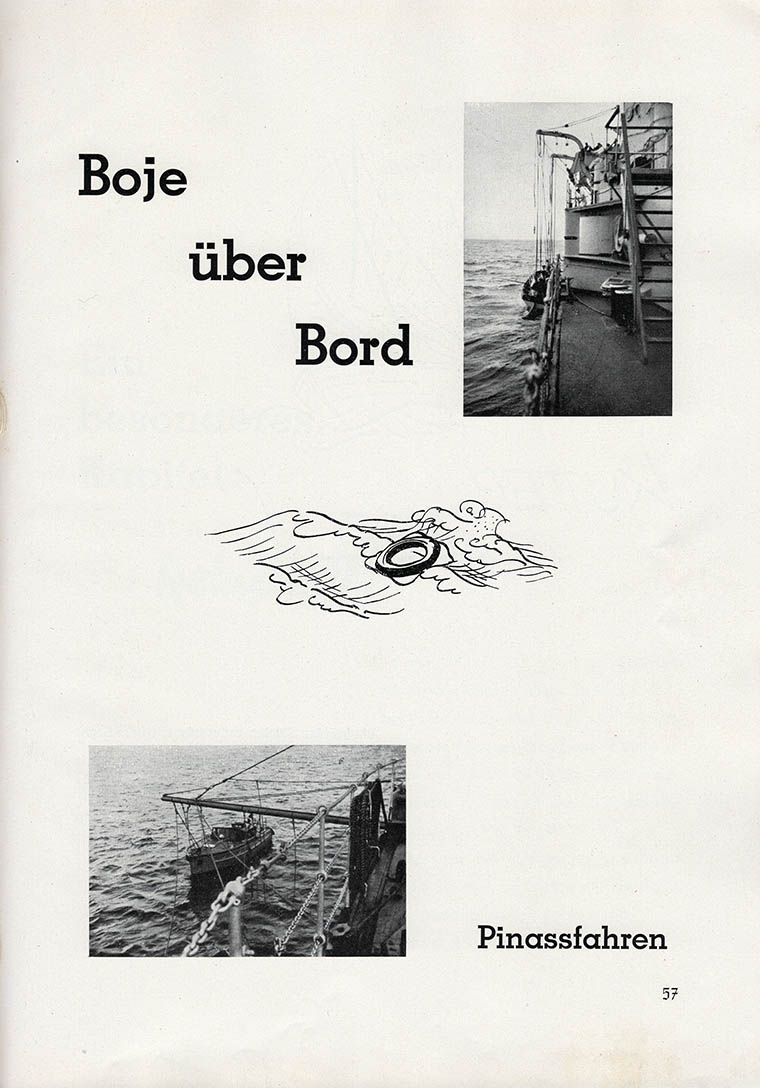
| Buoy | |||
| over | |||
| board | |||
| Ship's boat driving | |||
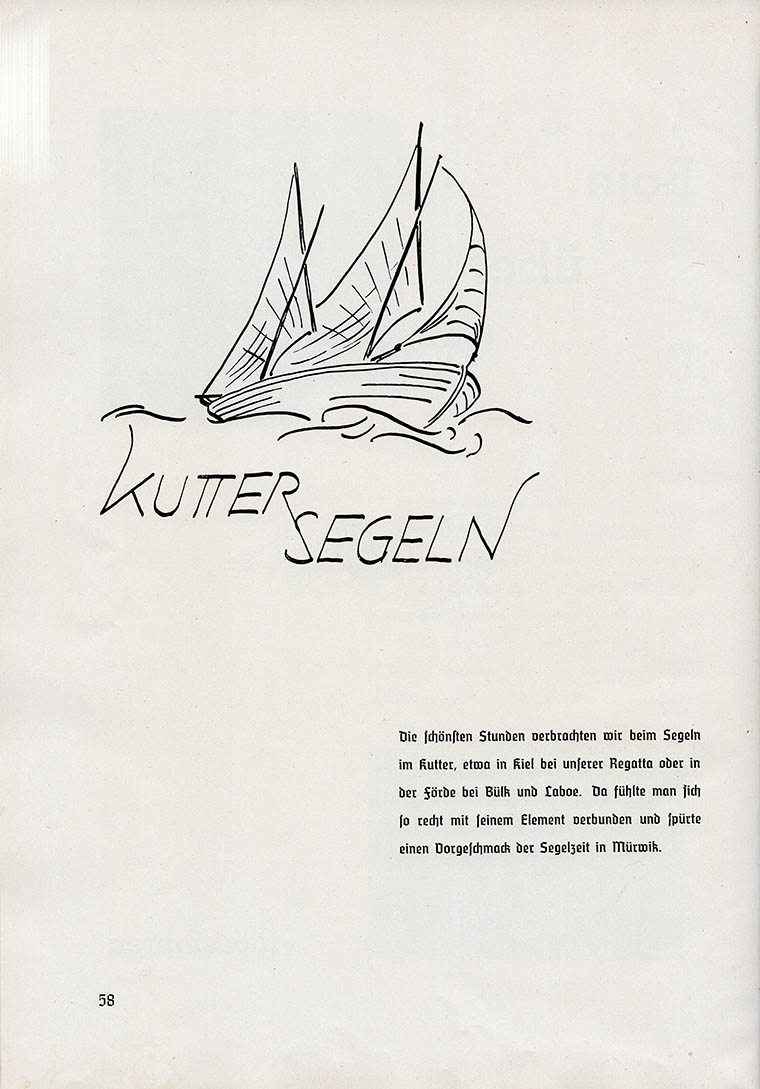
| Cutter sailing | |||
| We spent the most beautiful hours sailing in the cutter, for example in Kiel at our regatta or in the fjords of Bülk and Laboe. You really felt connected to your element and felt a foretaste of sailing in Mürwik. | |||
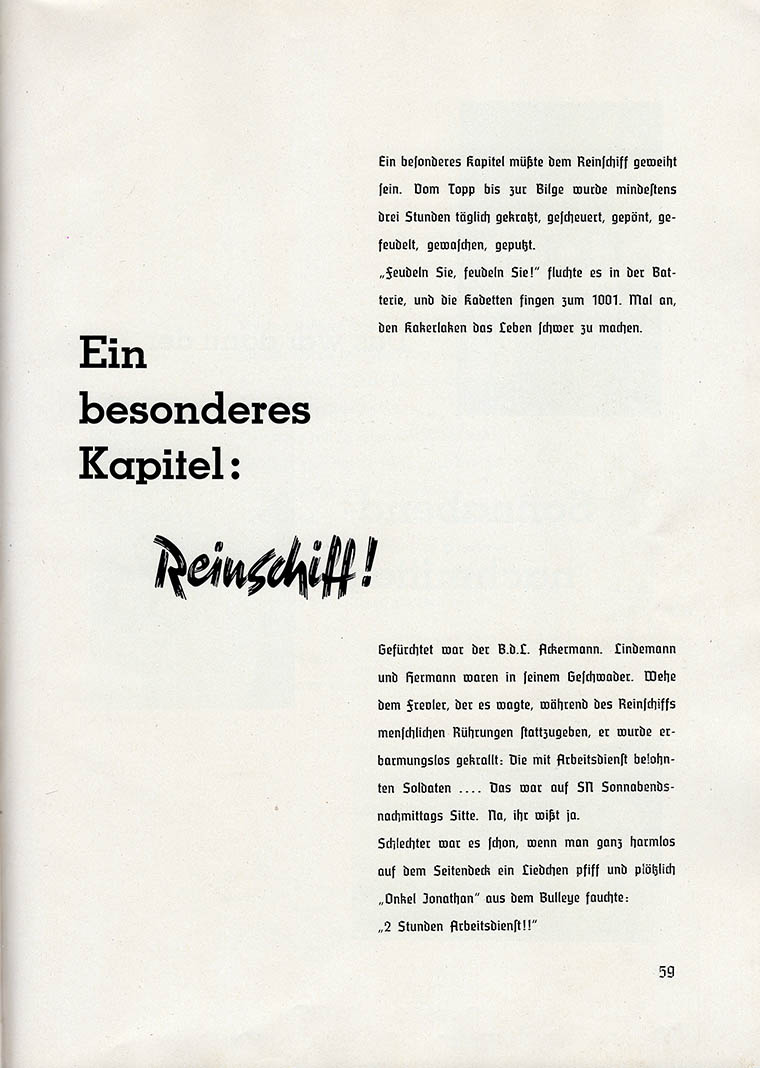
| A special chapter should be dedicated to cleaning ship. From the top to the bilge, at least three hours a day we scratched, scoured, brushed, fiddled, washed, and swept. | |||
| "Fiddle, fiddle!" they cursed in the battery and cadets started making life difficult for the cockroaches for the 1001st time. | |||
| A | |||
| Special | |||
| Chapter: | |||
| Clean ship! | |||
| The B.d.L. Ackerman. Lindemann and Hermann were in his squadron. Woe to the wicked who dared to allow human emotions during the clean ship, he was mercilessly clawed: the soldiers rewarded with labor service. . . . That was the custom on SN Saturday afternoons. Well, you know. | |||
| It was worse when you whistled a little song harmlessly on the side deck and suddenly "Uncle Jonathan" hissed out of the porthole: "2 hours work service!!" | |||
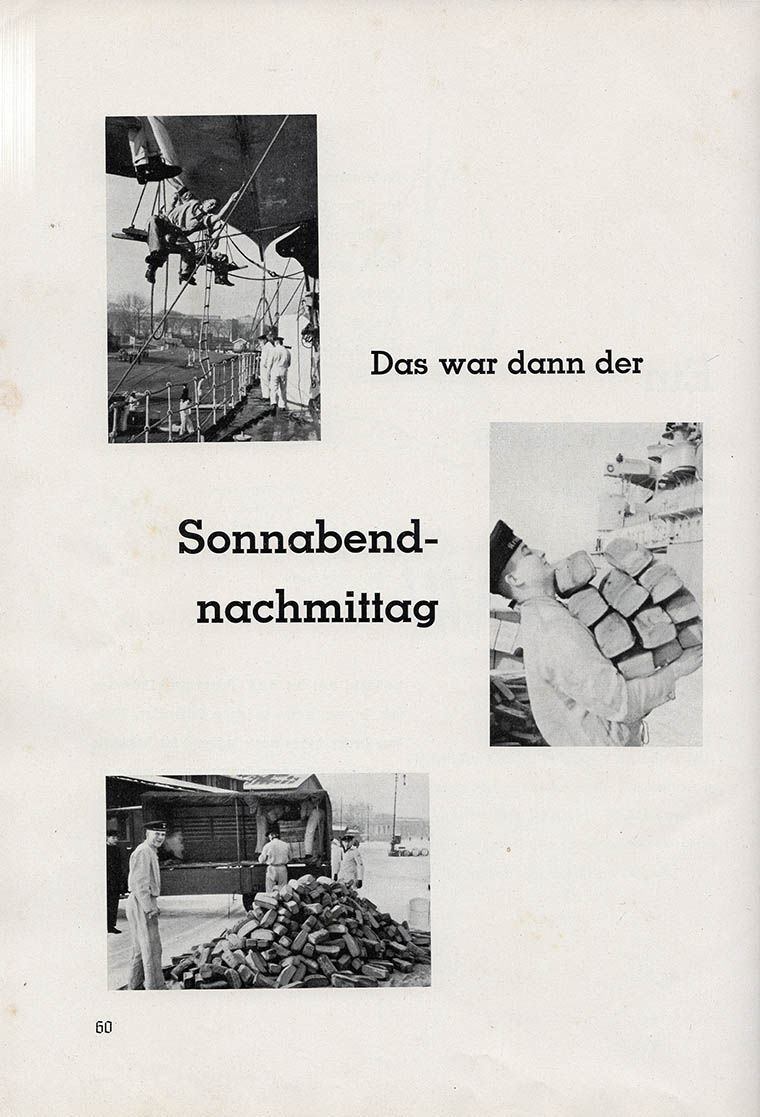
| That was Saturday afternoon | |||
| Saturday afternoon | |||
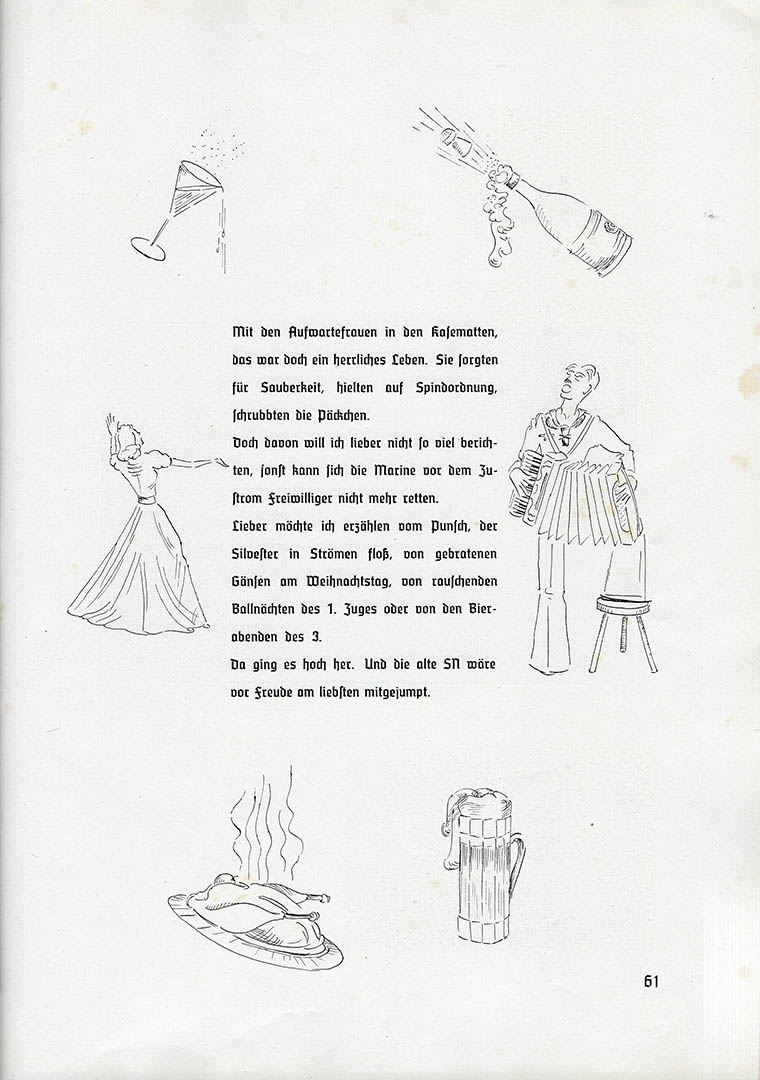
| With the maids in the case mates, that was a wonderful life. They kept things clean, kept the lockers in order, scrubbed the uniforms. | ||||
| But I don't want to report so much about that, otherwise the Navy will not be able to save itself from the influx of volunteers. | ||||
| I would rather talk about the punch that flowed freely on New Year's Eve, about roasted geese on Christmas Day, about lavish ball nights of the 1st Platoon or about the beer evenings of the 3rd. | ||||
| Then things got really hot. And the old SN would have liked to jump with her for joy. | ||||
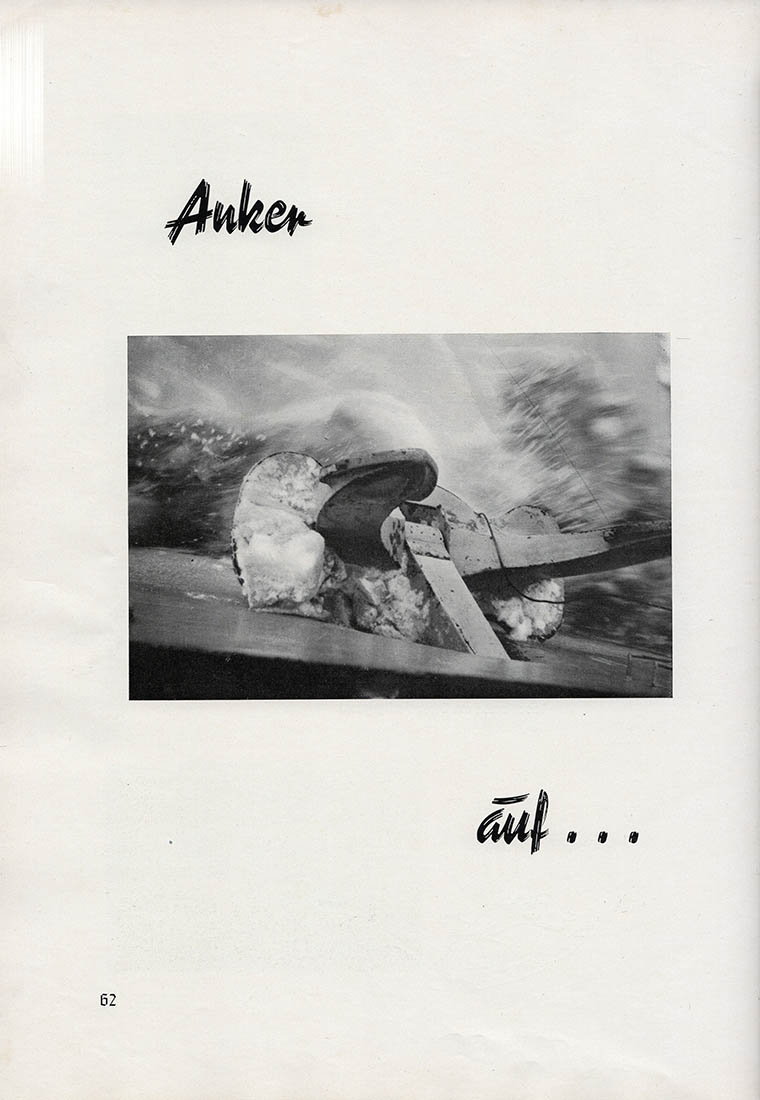
| Anchor | |||
| Up . . . | |||
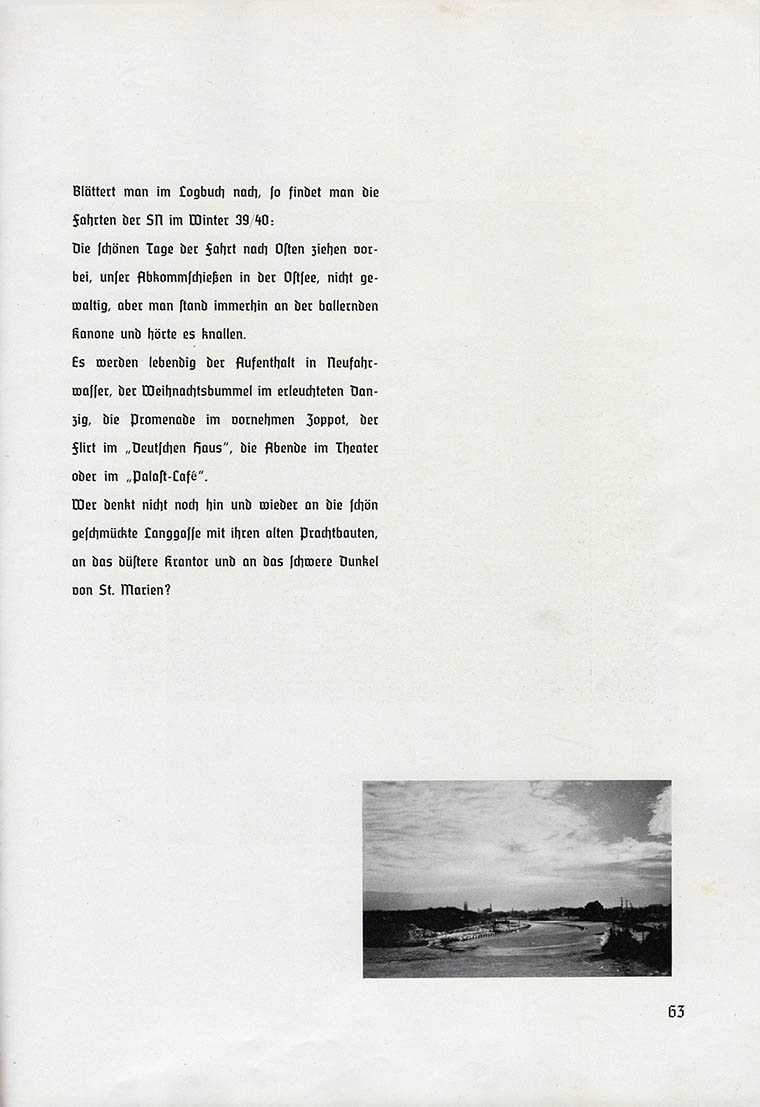
| If you leaf through the logbook, you will find the cruises of the SN in winter 39/40: | |||
| The beautiful days of the trip to the east are passing, our foray in the Baltic Sea, not real, but at least you stood by the banging cannon and heard it crack. | |||
| The stay in Neufahrwasser, the Christmas stroll in illuminated Danzig, the promenade in elegant Zopot, the flirt in "Deutschen Haus", the evenings in the theater or in the "Palast-Café". | |||
| Who doesn't still think about the beautifully decorated Langgasse with its magnificent old buildings, the gloomy Crane Gate and the heavy darkness of St. Marien? | |||
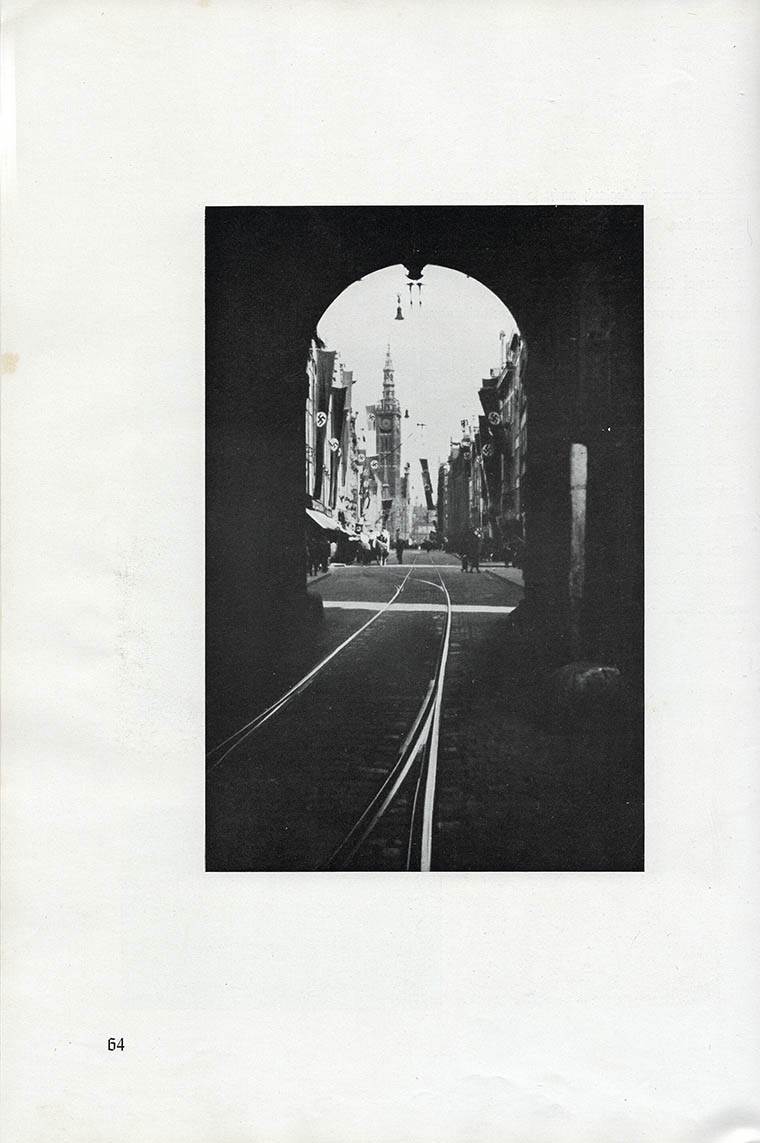
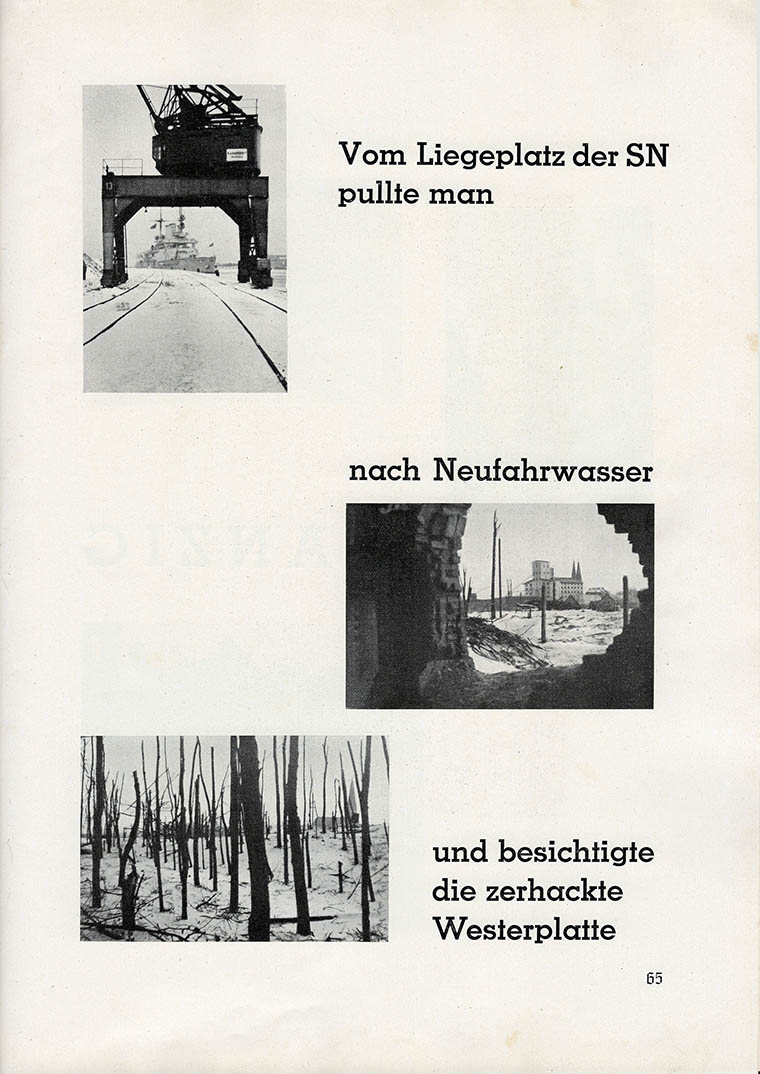
| One headed from the berth of the SN | |||
| towards Neufahrwasser | |||
| and inspected | |||
| the chopped up | |||
| Westerplatte | |||
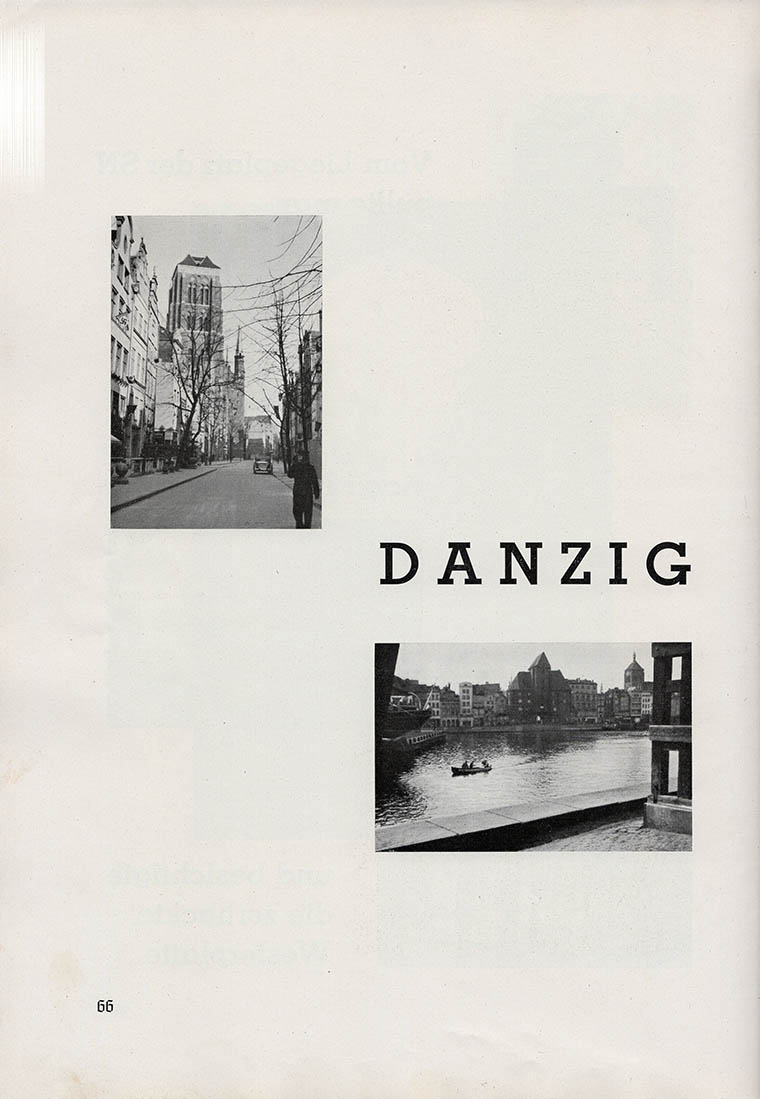
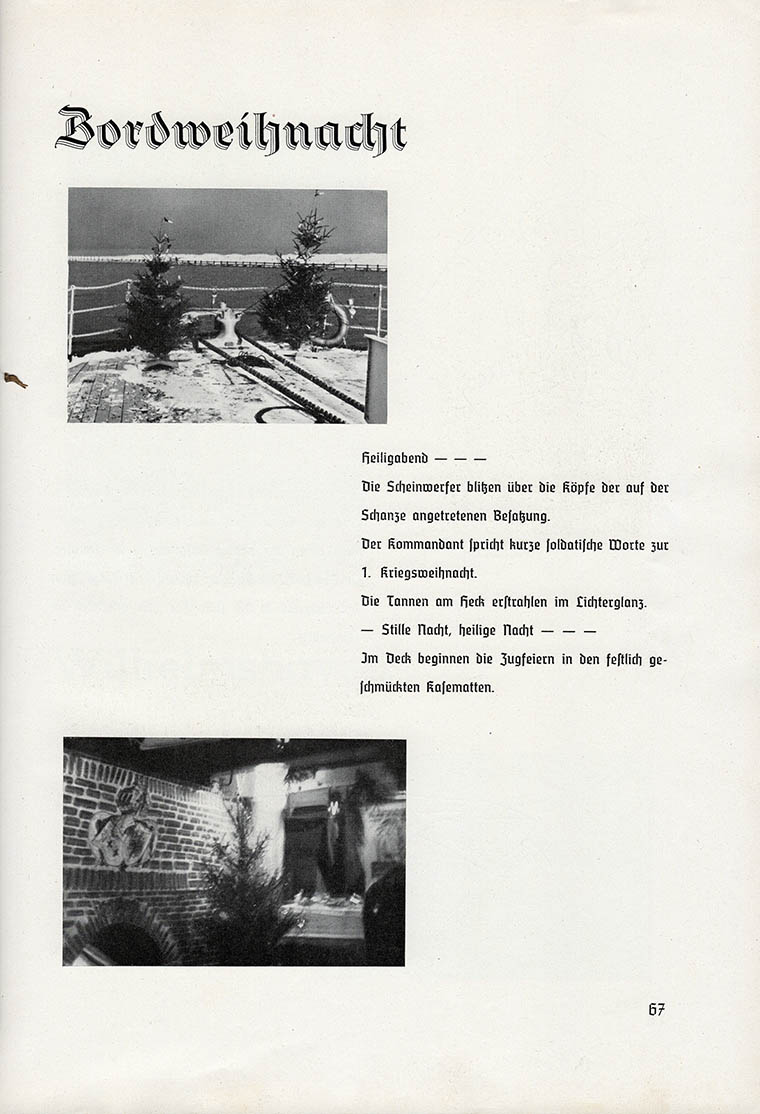
| Christmas on board | |||
| Christmas Eve - - - | |||
| The searchlights flash over the heads of the teams lined up on the hill | |||
| The Kommandant speaks briefly soldierly words on the 1st war Christmas. | |||
| The fir trees at the stern shine with lights | |||
| - Silent night, holy night - - - | |||
| On the deck, the Platoon celebrations begin in the festively decorated coffee mats. | |||
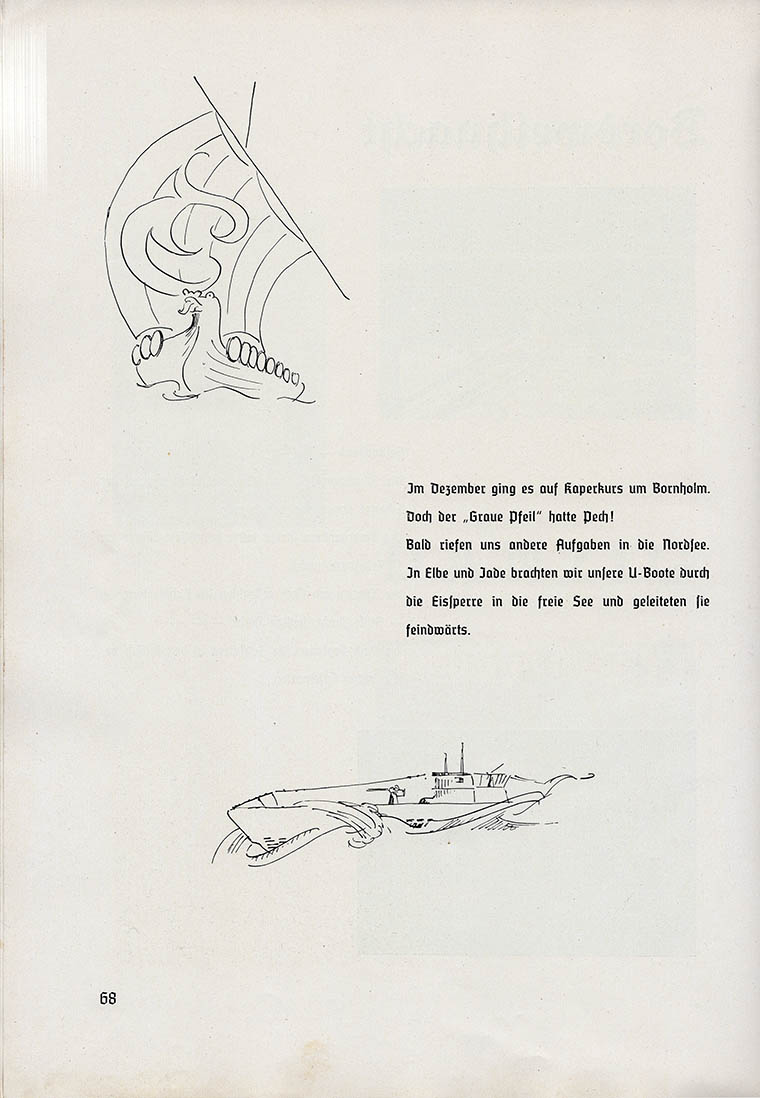
| In December we took a raider course around Bornholm. | |||
| But the "Gray Arrow" was unlucky | |||
| Soon Herculean and other tasks in the North Sea. In Elbe and Jade we brought our U-boats through the ice barrier into the open sea and escorted them towards the enemy. | |||
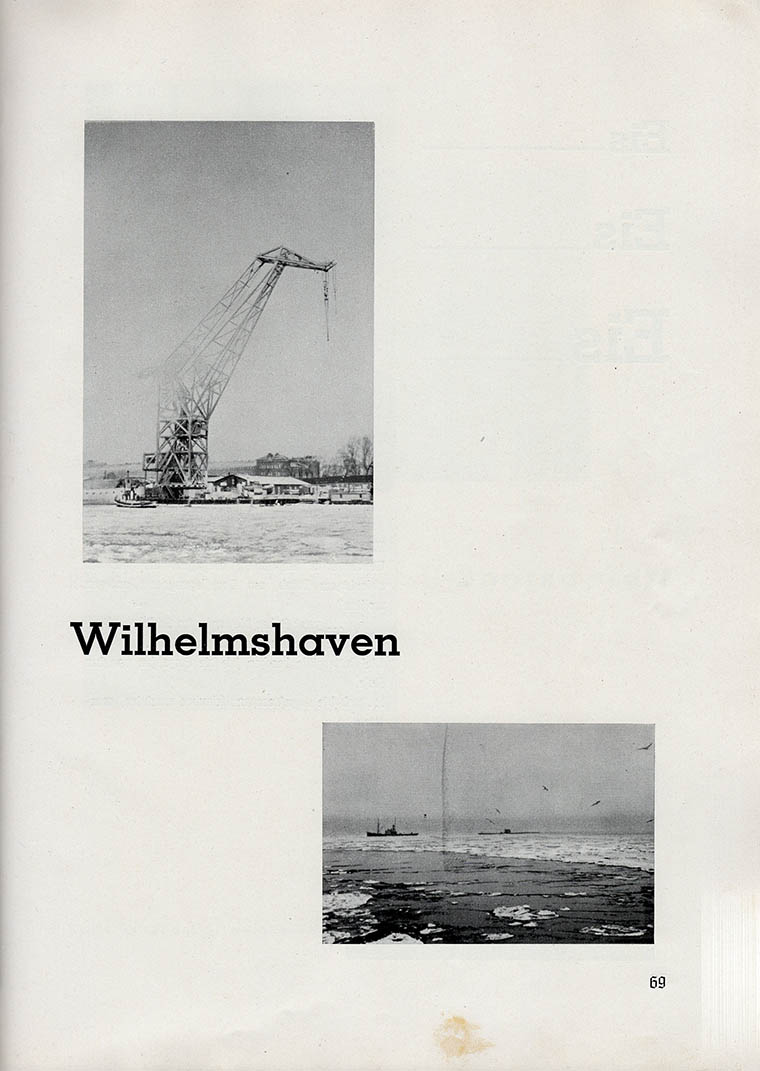
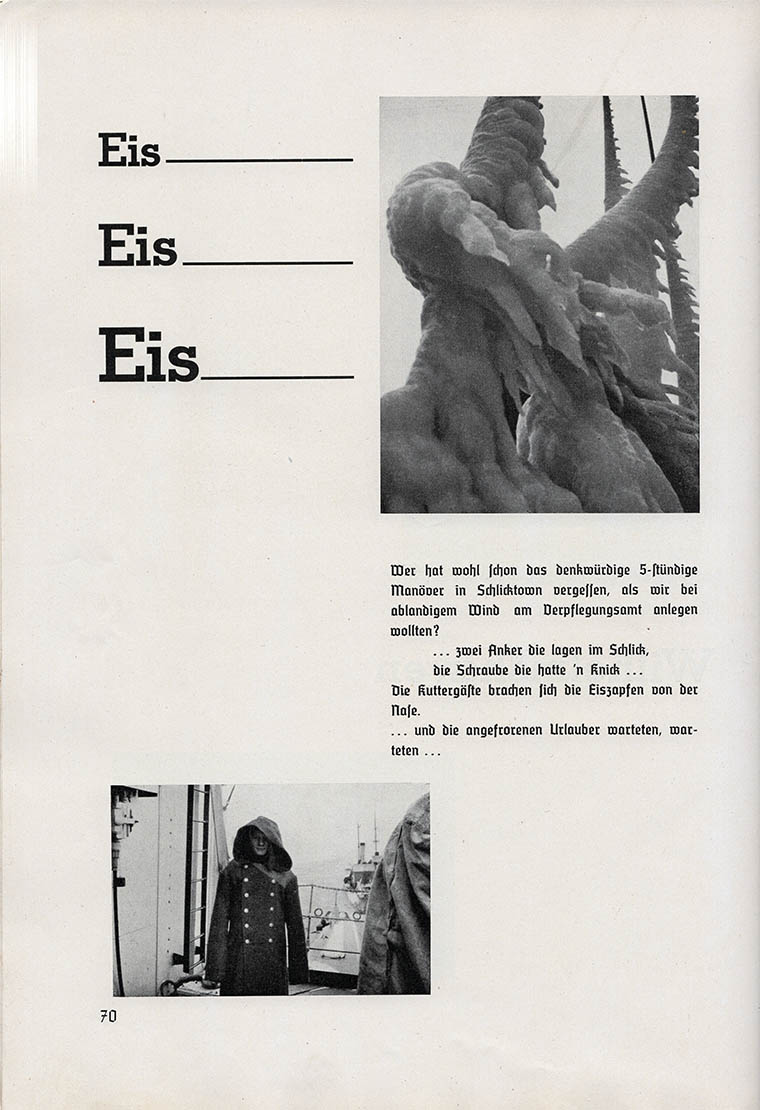
| Ice | |||
| Ice | |||
| Ice | |||
| Who has probably missed the memorable 5-hour maneuver in Schlicktown when we wanted to dock at the catering office in offshore winds? | |||
| . . . two anchors were lying in the mud, the propellers had a nick. . . | |||
| The cutter guests brought the icicles off their noses. | |||
| . . . and the frozen vacationers waited and waited. . . | |||
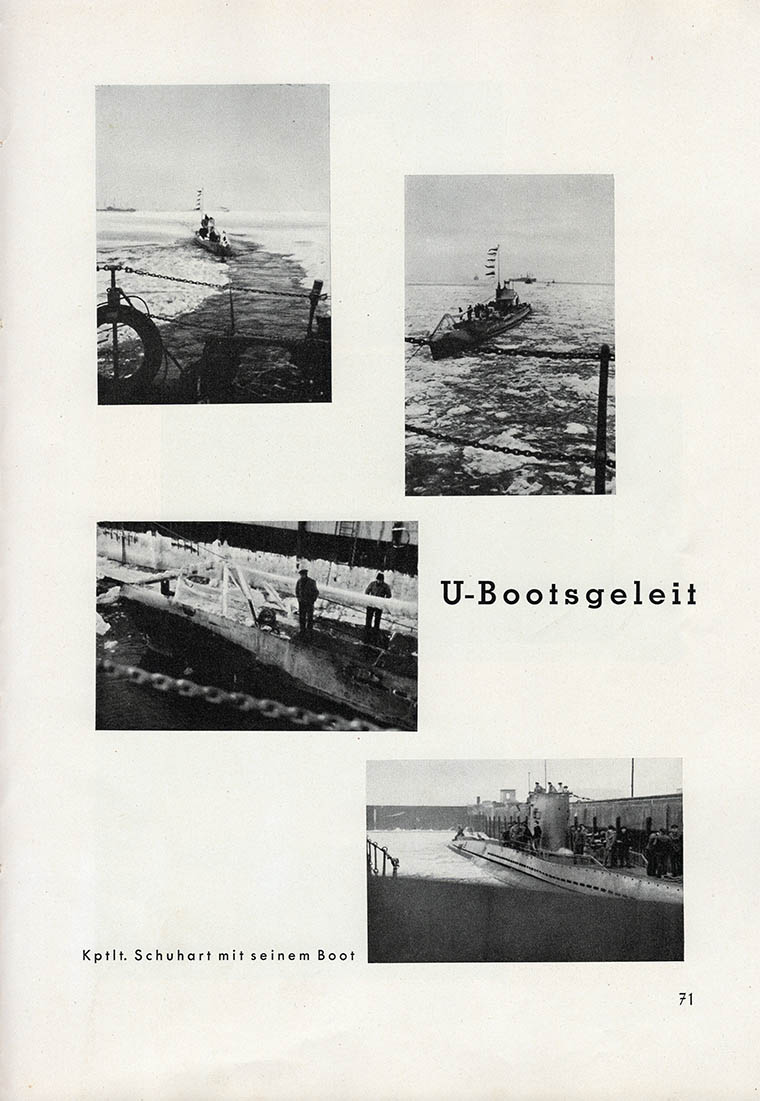
| U-boat escort | |||
| Kaptänleutnant Schuart with his boat | [U-29] | ||
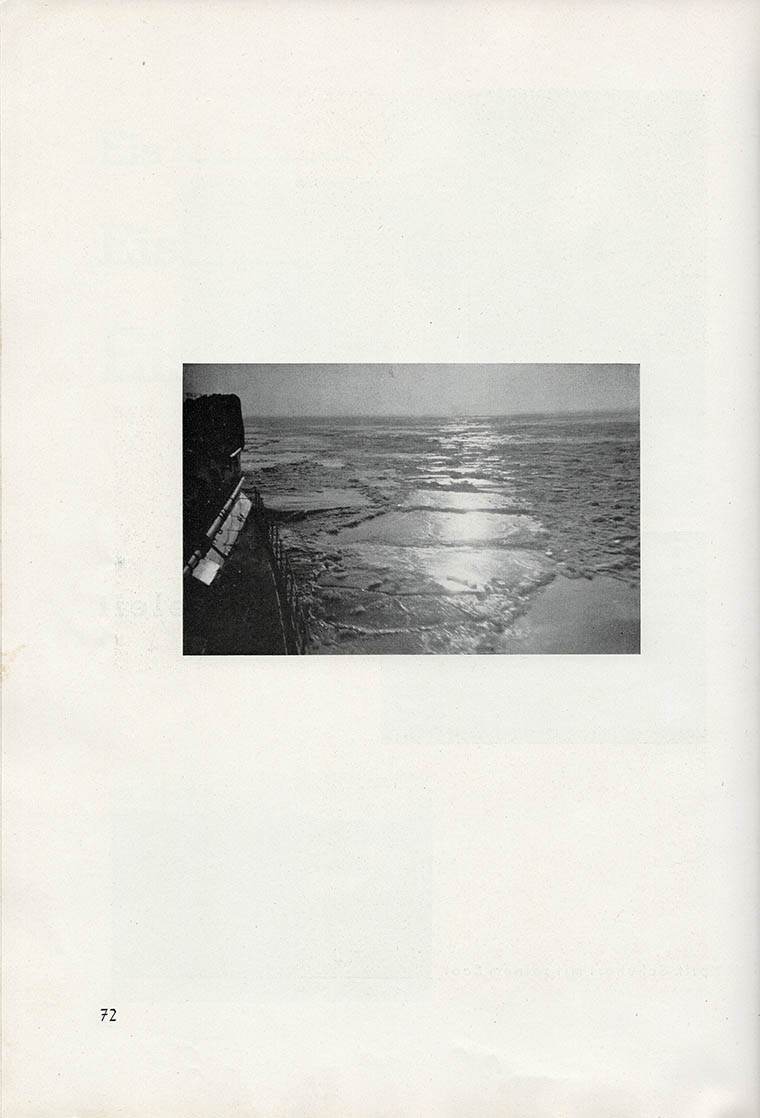
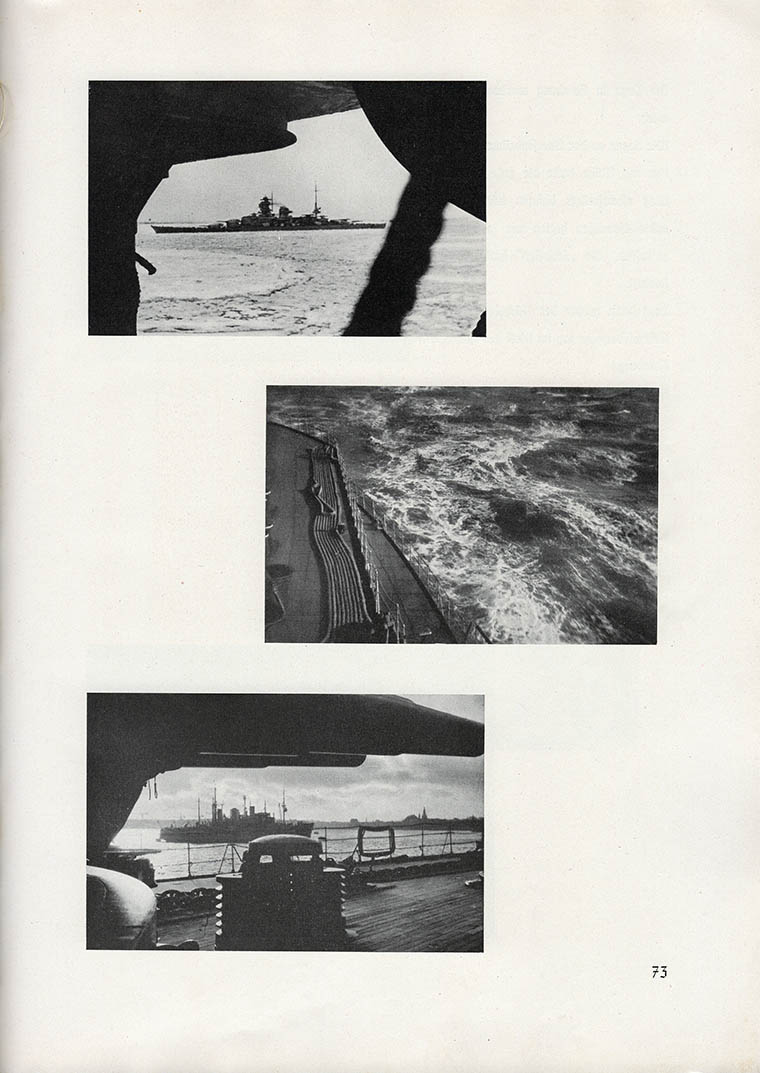
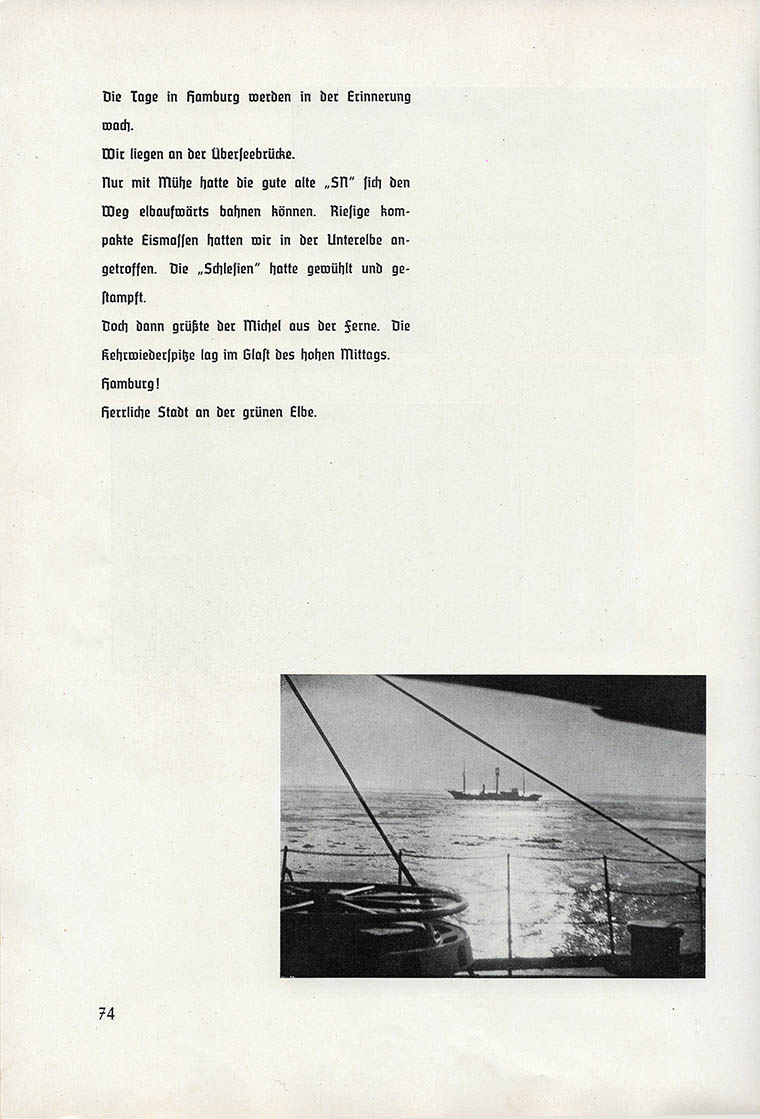
| The days in Hamburg are remembered. | |||
| We are on the Überseebrücke. [Overseas Pier] | |||
| The good old "SN" was only able to make its way up the Elbe with difficulty. We encountered huge masses of compact ice in the Lower Elbe. The "Silesia" had slogged and pounded. | |||
| But then Michel greeted me from afar. The KehrWiederSpitze lay in the binoculars at high noon. | |||
| Hamburg! | |||
| Magnificent city on the green Elbe. | |||
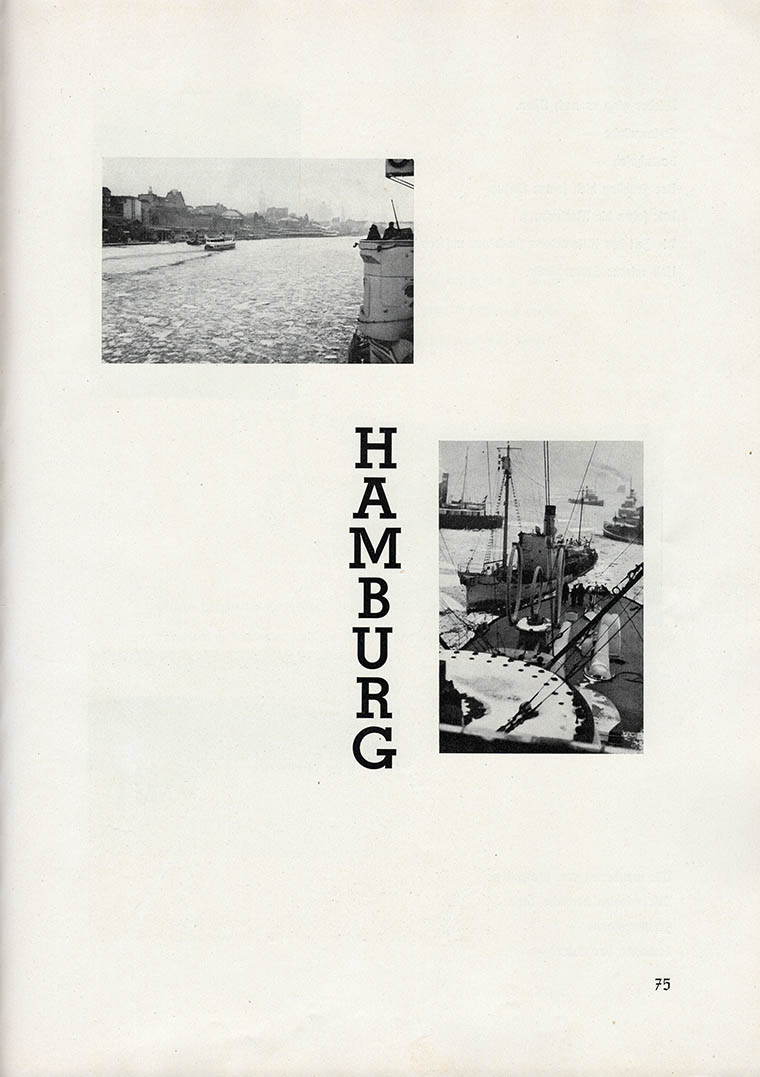
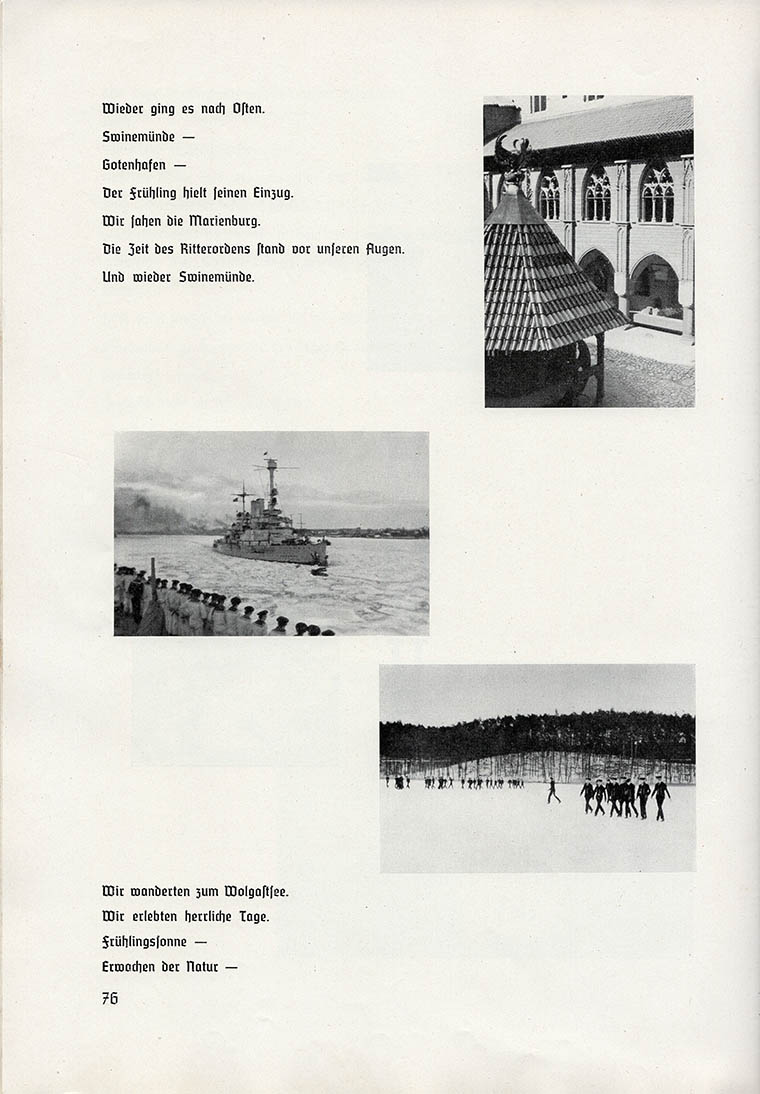
| Again going to the east. | |||
| Swinemünde - | |||
| Gotenhafen - | |||
| Spring is coming. | |||
| We saw the Marienburg. | |||
| The time of the knightly order stood before our eyes. | |||
| And again Swinemünde. | |||
| We hiked to the Wolgast Sea. | |||
We had wonderful days.
|
|||
| Spring sun - | |||
| Awakening of nature - | |||
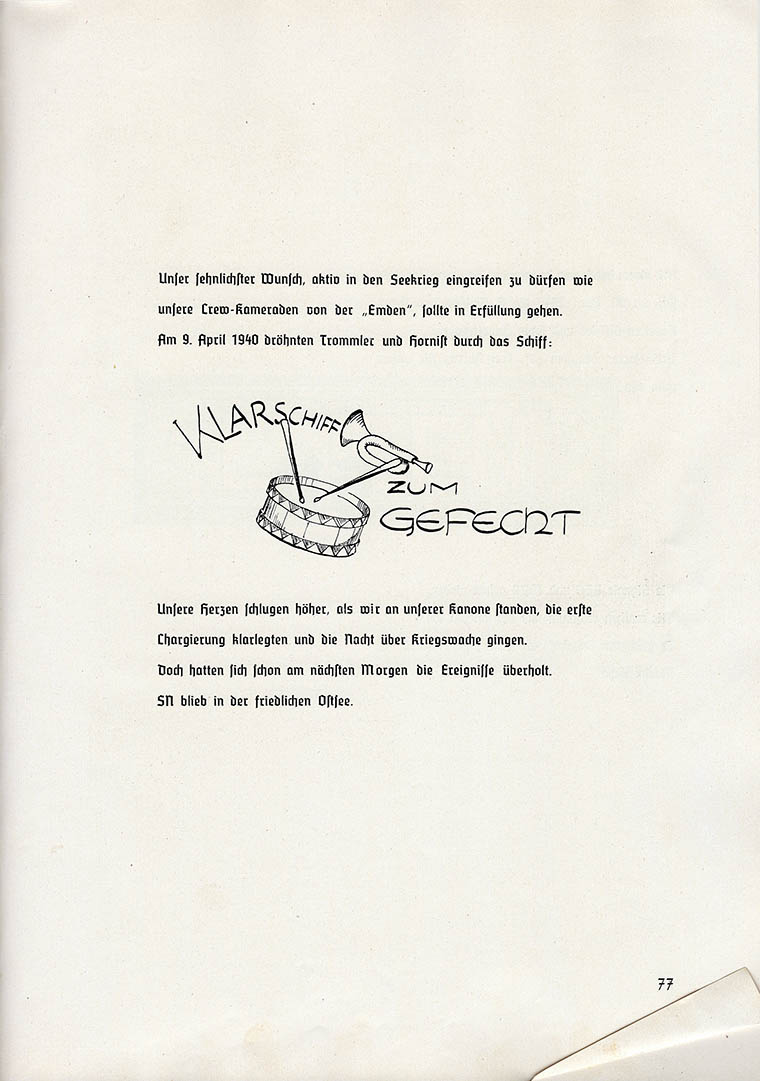
| Our dearest wish to be able to actively participate in the naval war like our crew mates from the "EMDEN" should come true. | |||
| On April 9, 1940, drummers and buglers boomed through the ship: | |||
| Prepare the ship for combat. | |||
| Our hearts beat faster as we stood by our cannon, readied the first charge and went on war watch throughout the night. | |||
| But by the next morning, events had already overtaken one another. SN remained in the peaceful Baltic Sea. | |||
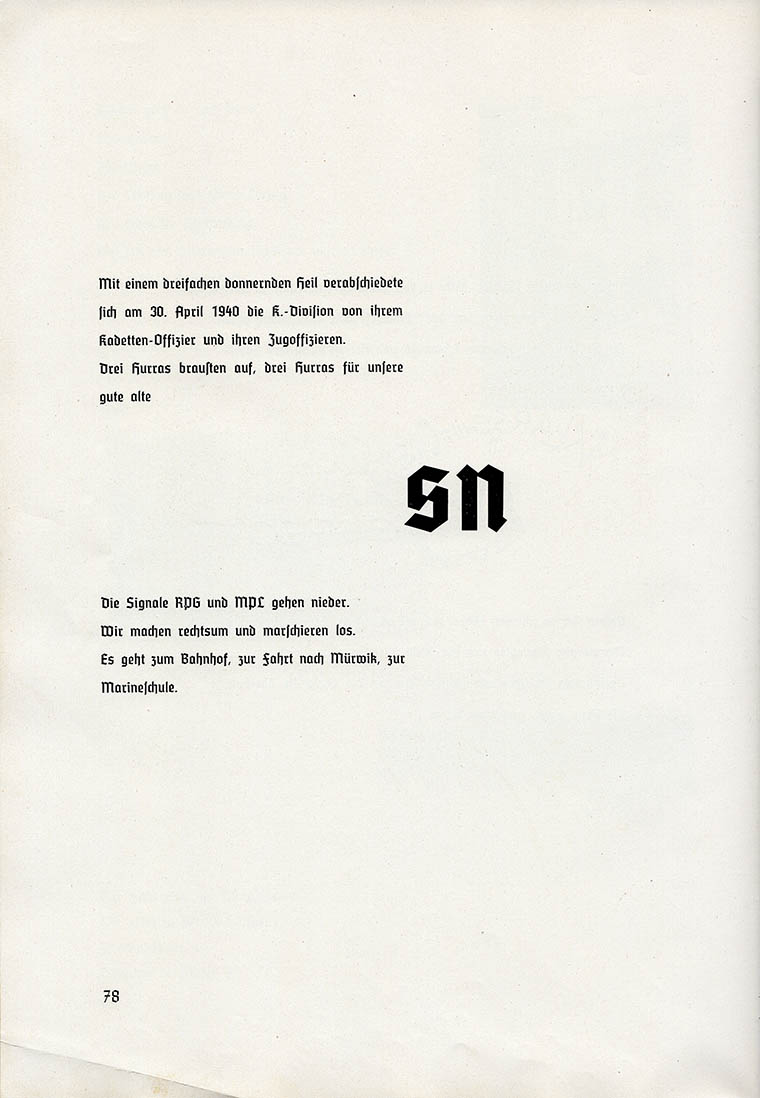
| On April 30, 1940, the Cadet. Division said goodbye to its Cadet Officer and its Platoon Officers with three thunderous salutes. | |||
| Three cheers went up, three cheers for our dear old lady. | |||
| SN | |||
| The signals RPG and MPL go down. | |||
| We turn right and start marching. | |||
| Goes to the train station, to the trip to Mürwik, to the Naval School. | |||
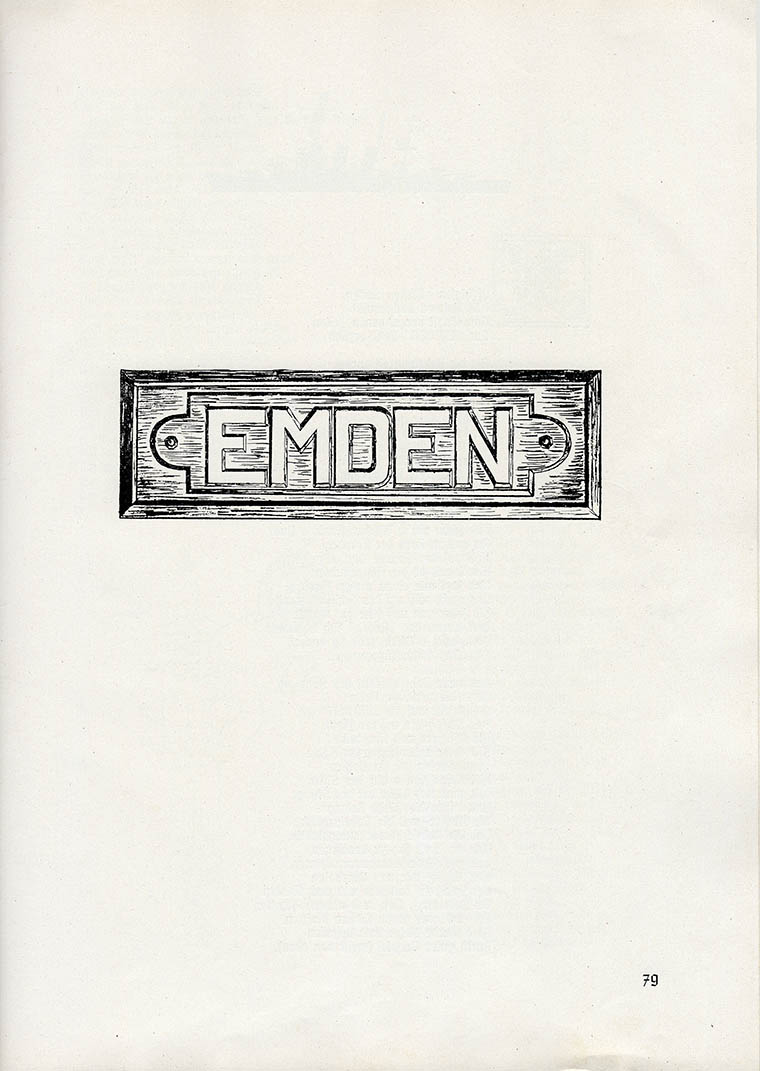
EMDEN |
|||
| [Cruiser EMDEN, launched 1925. Mainly used for training. Participated in the invasion of Norway in April 1940 as part of the force that captured Oslo.] | |||
| The next four pages are in the form of a poem. Many words are unusually spelled and contracted. Translation was extremely difficult and is very rough. To help the German Fraktur text is presented in modern German alongside the English text. If you can help with these pages lease contact me by e-mail at jerry@uboatarchive.net . |
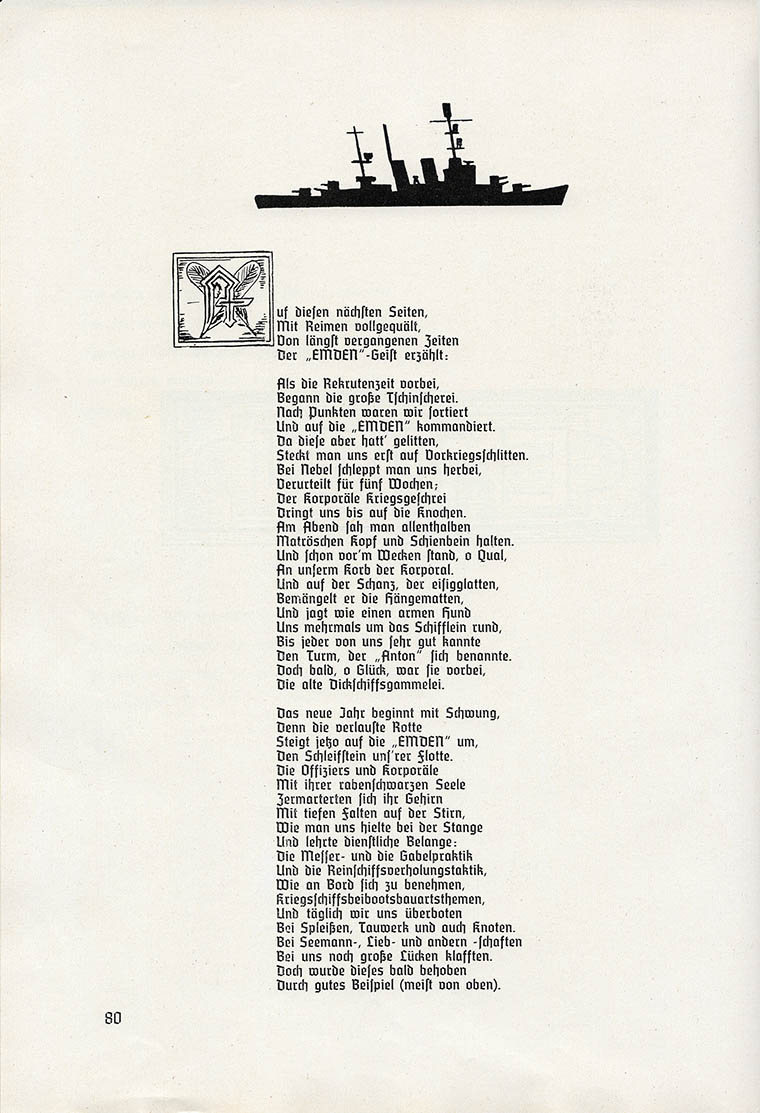
| Auf diesen nächsten Seiten, | On these next few pages, | ||
| Mit Reimen vollgequält, | Tormented by rhymes, | ||
| Von lägst vergangenen Zeiten | From times long past | ||
| der "EMDEN" Geist erzählt: | The "EMDEN" spirit tells a story: | ||
| Als die Rekrutenzeit vorbei, | When recruit time was over, | ||
| Begann die große Tschinscherei. | The great mess began. | ||
| Nach Punkten waren wir sortiert | We were sorted by points | ||
| Und auf die "EMDEN" kommandiert. | And ordered to the "EMDEN". | ||
| Da diese aber hatt' gelitten, | But since she was damaged, | ||
| Steckt man uns erst auf Vorkriegsschlitten. | They first put us on pre-war carriages. | ||
| Bei Nebel schleppt man uns herbei, | In the fog they draged us here, | ||
| Verurteilt für fünf Wochen; | Sentenced to five weeks; | ||
| Der Korporäle kriegsgeschrei | The Corporal's war cries | ||
| Dringt uns bis auf die knochen. | Penetrate us to the bones. | ||
| Am Abend sah man allenthalben | In the evening you could see sailors everywhere | ||
| Matröschen Kopf und Schienbein halten. | Holding their heads and shins. | ||
| Und schon vor'm Wecken stand, o Qual, | And even before the wake-up call, oh agony, |
||
| An unserm Korb der Korporal. | The Corporal stood by our roost. | ||
| Und auf der Schanz, der eisigglatten, | And on the quarter deck, the icy slippery one, | ||
| Bemängelt er die hängematten, | He criticizes the hammocks, | ||
| Und jagt wie einen armen Hund | And chases us like poor dogs | ||
| Uns mehrmals um das Schifflein rund, | Several times around the ship | ||
| Bis jeder von uns sehr gut kannte | Until each of us knew very well | ||
| Den Turm, der "Anton" sich benannte. | The turret named "Anton". | ||
| Doch bald, o Glück, war sie vorbei, | But soon, oh happiness, it was over, | ||
| Die alte Dickschiffsgammelei. | The old thick ship scrambeling. | ||
| Das neue Jahr beginnt mit Schwung, | The new year begins with momentum, | ||
| Denn die verlauste Rotte | Because the filthy gang | ||
| Steigt jetzo auf die "EMDEN" um, | Is now rising on the "EMDEN", | ||
| Den Schleifstein uns'rer Flotte. | The whetstone of our fleet. | ||
| Die Offiziers und Korporäle | The Officers and Corporals | ||
| Mit ihrer rabenschwarzen Seele | With their raven-black souls | ||
| Zermarterten sich ihr Gehirn | Racked their brains | ||
| Mit tiefen Falten auf der Stirn, | With deep wrinkles on their foreheads, | ||
| Wie man uns hielte bei der Stange | How to keep us going | ||
| Und lehrte dienstliche Belange: | And teach official matters: | ||
| die Messer- und die Gabelpraktik, | Knife and fork practice, | ||
| Und die Reinschiffsverholungstaktik, | And ship cleaning tactics, | ||
| Wie an Bord sich zu benehmen, | How to behave on board, | ||
| Kriegsschiffsbeibootsbauartsthemen, | Warship longboat design issues, | ||
| Und täglich wir uns überboten | And every day we outdo each other. | ||
| Bei Spleißen, Tauwerk und auch knoten. | In splices, cordage and knots. | ||
| Bei Seemann-, Lieb- und andern -schaften | In seamanship-, love- and other -relationships | ||
| Bei uns noch große Lücken klafften. | We still had big gaps. | ||
| Doch wurde dieses bald behoben | But this was soon remedied | ||
| Durch gutes Beispiel (meist von oben). | With good examples (usually from above). | ||
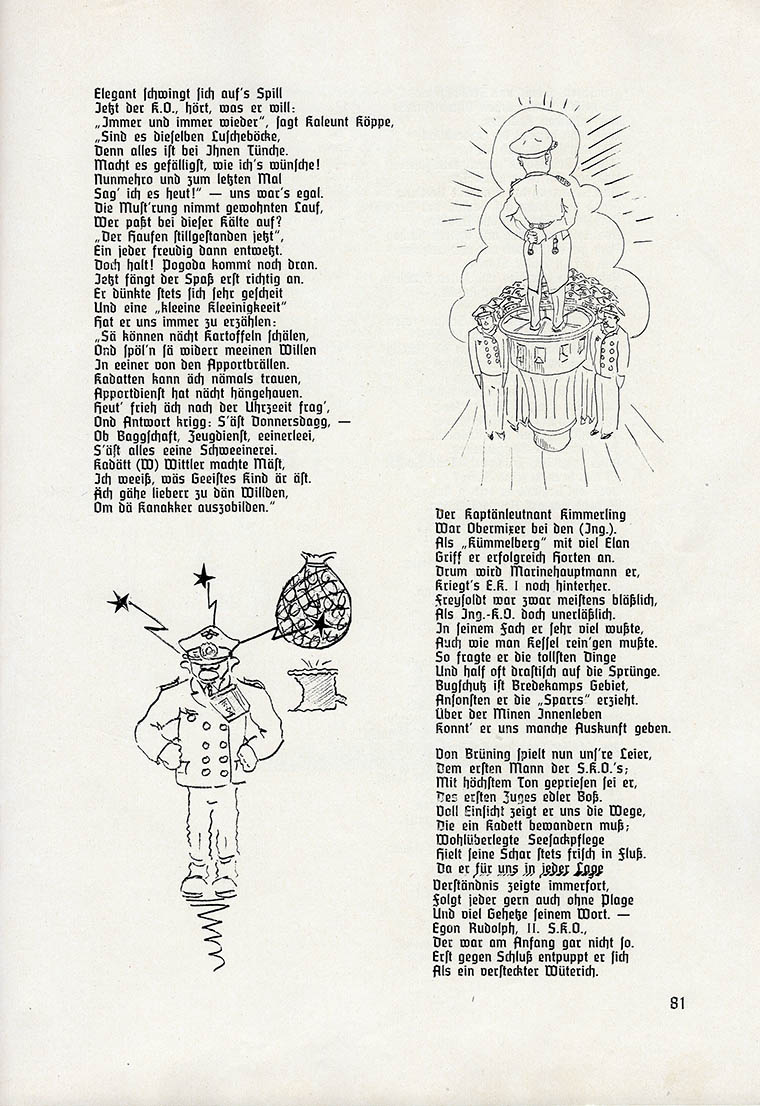
| Elegant schwingt sich auf's Spill | Elegantly he resonates on the capstan | ||
| Jetzt der K.O., hört, was er will: | Now the Cadete Officer, hears what he wants: | ||
| "Immer und immer wieder", jagt Kaleunt Köppe, | "Over and over again," hounds Kaleut Köppe, | ||
| "Sind es dieselben Luscheböcke, | "Are they the same slobs, | ||
| Denn alles ist bei Ihnen Tünche. | Because everything is veneer with you. | ||
| Macht es gefälligst, wie ich's wünsche! | Do as I wish! | ||
| Nunmehro und zum letzten Mal | Now and for the last time | ||
| Sag' ich es heut!" - uns war's egal. | I'll say it today!" - it didn't matter to us. | ||
| Die Must'rung nimmt gewohnten Lauf, | The Muster takes its usual course, | ||
| Wer paßt bei dieser Kälte auf? | Who pays attention in this cold? | ||
| "Der haufen stillgestanden jetzt", | "The crowd stood still now", | ||
| Ein jeder freudig dann entwetzt. | Each joyful then horrified. | ||
| Doch halt! Pogoda kommt noch dran. | But stop! Pagoda is yet to come. | ||
| Jetzt fängt der Spaß erst richtig an. | Now the fun really begins. | ||
| Er dünkte stets sich sehr gescheit | He always thought himself very clever | ||
| Und eine "kleeine kleeinigkeeit" | And a "small trifle" | ||
| Hat er uns immer zu erzählen: | He always had to tell us: | ||
| "Sä können nächt Kartoffeln schälen, | "You can peel potatoes at night, | ||
| Ond spöl'n sä widerr meeinen Willen | And wash them against my will | ||
| In eeiner von den Apportbrällen. | in one of the fetchers. | ||
| Kadatten kann äch nämals trauen, | I can never trust cadets. | ||
| Apportdienst hat nächt hängehauen. | The retrieval service gave up last night. | ||
| Heut' frieh äch nach der Uhrzeeit frag', | Today I'm happy to ask what time it is, | ||
| Und Antwort krigg: S'äst Donnersdagg, - | And the answer is clear: It's Thursday, - | ||
| Ob Baggschaft, Zeugdienst, eeinerleei, | Whether baggage, gear service, it doesn't matter | ||
| S'äst alles eeine Schweeinerei. | It's all a mess. | ||
| Kadätt (W) Witter machte Mäst, | Cadet (W) Wittler made measure, | ||
| Ich weeiß, wäs Geeistes Kind är äst. | I know what frozen child is. | ||
| Äch gähe lieberr zu dän Willden, | I'd rather go to the wild beasts, | ||
| Um dä kanakker auszobilden." | To train the non-white foreigners." | ||
| Kapitänleutnant Kimmerling | Kapitänleutnant Kimmerling | ||
| War Obermixer bei den (Ing.). | War Obermixer with the (Engineers). | ||
| Als "Kümmelberg" mit viel Elan | As "Kümmelberg" with a lot of pinache | ||
| Griff er erfolgreich Horten an. | he successfully attacked Horten. | ||
| Drum wird Marinehauptmann er, | That's why he became a Navy Captain, | ||
| Kriegt's E.K. I noch hinterher. | Will still get the Iron Cross 1st Class afterwards. | ||
| Freysoldt war zwar meistens bläßlich, | Freysoldt was mostly pale, | ||
| Als Ing.-K.O. doch unerläßlich. | As Engineering -Cadete Officer but essential. | ||
| In seinem Sach er sehr viel wußte, | In his subject area he knew very much | ||
| Auch wie man Kessel rein'gen mußte. | Also how to clean boilers. | ||
| So fragte er die tollsten Dinge | So he asked the funniest things | ||
| Und half oft drastisch auf die Sprünge. | And often helped immensely. | ||
| Bugschutz ist Bredekamps Gebiet, | Bow protection is Bredekamps area, | ||
| Ansonsten er die "Sparrs" erzieht. | Otherwise he trains the "Sparrs". | ||
| Über der Minen Innenleben | Concerning the mines inner workings | ||
| Konnt' er uns manche Auskunft geben. | He could give us some information. | ||
| Von Brüning spielt nun uns're Leier, | Our lyre now plays for Brüning, | ||
| Dem ersten Mann der S.K.O.'s; | The Senior Cadete Officer's first man; | ||
| Mit höchstem Ton gepriesen sei er, | He be praised with the highest tone, | ||
| Des ersten Zuges edler Boß. | The noble boss of the first paltoon. | ||
| Voll Einsicht zeigt er uns die Wege, | Full of insight he shows us the path, | ||
| Die ein Kadett bewandern muß; | Which a cadet must walk; | ||
| Wohlüberlegte Seesackpflege | Well-considered sea bag care | ||
| Hielt seine Schar stets frisch in Fluß. | Always kept his troop fresh in flow. | ||
| Da er für uns in jeder Lage | Because he is for us in every situation | ||
| Verständnis zeigte immerfort, | Always showed understanding, | ||
| Folgt jeder gern auch ohne Plage | Everyone likes to follow, even without a curse | ||
| Und viel Gehetze seinem Wort. - | And a lot of rushing his word. - | ||
| Egon Rudolph, II. S.K.O. | Egon Rudolph, 2nd Senior Cadette Officer. | ||
| Der war am Anfang gar nicht so. | It wasn't like that at first. | ||
| Erst gegen Schluß entpuppt er sich | Only towards the end does he reveal himself | ||
| Als ein versteckter Wüterich. | As a hidden ruffian. | ||
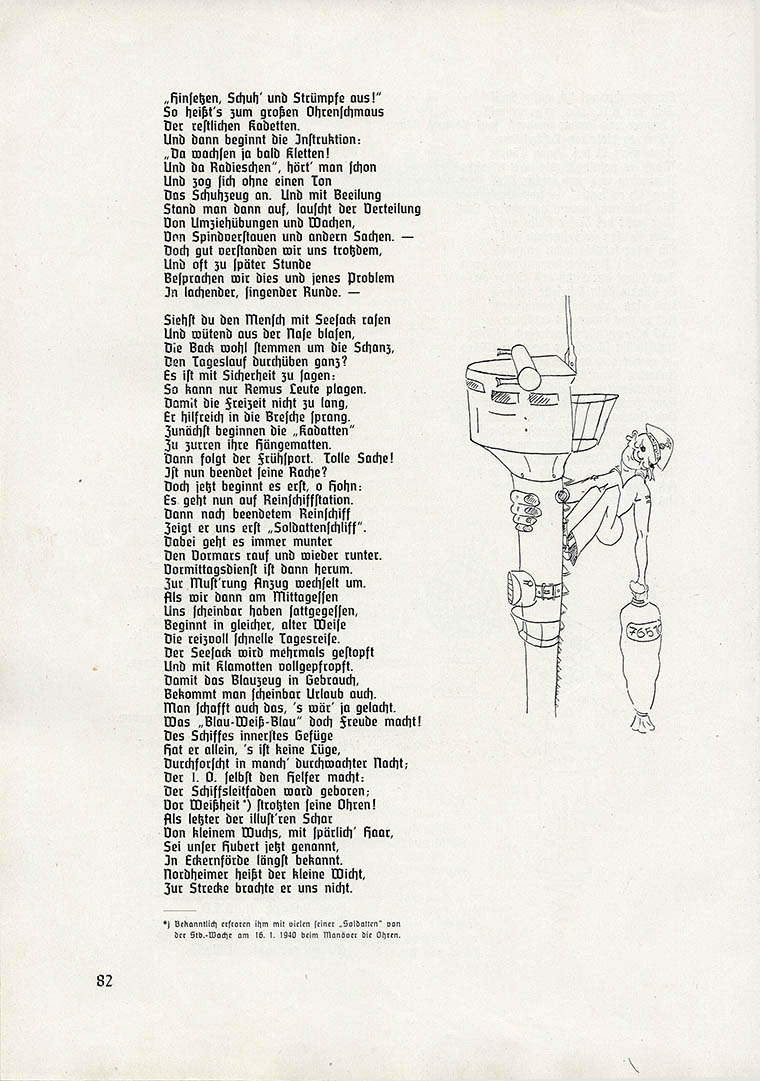
| "Hinsetzen, Schuh' und Strümpfe aus!" | "Sit down, shoes and stockings off!" | ||
| So heißt es zum großen Ohrenschmaus | That's the name of the big feast for the ears | ||
| Der restlichen Kadetten. | Of rest of the cadets. | ||
| Und dann beginnt die Instruktion: | And then the instruction begins: | ||
| "Da wachsen ja bald Kletten! | "There will soon be burs! | ||
| Und da Radieschen", hört man schon | And there are radishes," one hears | ||
| Und zog sich ohne einen Ton | And undressed without a sound | ||
| Das Schuhzeug an. Und mit Beeilung | The shoes on. And with haste | ||
| Stand man dann auf, lauscht der Verteilung | If you then stand up, listen to the deployment | ||
| Von Umziehübungen und Wachen, | Of changing drills and guards, | ||
| Von Spindverstauen und andern Sachen. - | Of locker storage and other things. - | ||
| Doch gut verstanden wir uns trotzdem, | But we got along well anyway, | ||
| Und oft zu später Stunde | And often late at night | ||
| Besprachen wir dies und jenes Problem | We discussed this and that problem | ||
| In lachender, singender Runde. - | In a laughing, singing group. - | ||
| Siehst du den Mensch mit Seesack rasen | Do you see the man racing with a sea bag. | ||
| Und wütend aus der Nase blasen, | And blowing angrily out of the nose, | ||
| Die Back wohl stemmen um die Schanz, | The forecastle possibly manage around the quarterdeck, | ||
| Den Tageslauf durchüben ganz? | Complete the daily routine? | ||
| Es ist mit Sucherheit zu sagen: | It is safe to say: | ||
| So kann nur Remus Leute plagen. | Only Renmus can plague people like that. | ||
| Damit die Freizeit nicht zu lang, | So that the free time is not too long, | ||
| Er hilfreich in die Bresche sprang. | He helpfully jumped into the breach. | ||
| Zunächst beginnen die "Kadatten" | First the "Cadets" begin | ||
| Zu zurren ihre hängematten. | to lash their ähammocks. | ||
| Dann folgt der Frühsport. Tolle Sache! | Then comes morning exercise. Great thing! | ||
| Ist nun beendet seine Rache? | Is his revenge over now? | ||
| Doch jetzt beginnt es erst, o Hohn: | But now it is only beginning, o mockery: | ||
| Es geht nun auf Reinschiffstation. | It is now going to clean ship station. | ||
| Dann nach beendetem Reinschiff | Then after the end of the clean ship | ||
| Zeigt er uns erst "Soldattenschiff". | First he shows us "soldier's ship". | ||
| Dabei geht es immer munter | It's always cheerful | ||
| Den Vormars rauf und wieder runter. | Up the foremast and down again. | ||
| Vormittagsdienst ist dann herum. | Morning service is around then. | ||
| Zur Must'rung Anzug wechselt um. | Changes into the mustering uniform. | ||
| Als wir dann am Mittagessen | Then when we went for lunch | ||
| Uns scheinbar haben sattgegessen, | We seem to have eaten our fill | ||
| Beginn in gleicher, alter Weise | Begin in the same old way | ||
| Die reizvoll schnelle Tagesreise. | The delightfully fast day trip. | ||
| Der Seesack wird mehrmals gestopft | The sea bag is stuffed several times | ||
| Und mit Klamotten vollgepfropft. | And stuffed with clothes. | ||
| Damit das Blauzeug in Gebrauch, | So that the blue stuff in use, | ||
| Bekommt man scheinbar Urlaub auch. | Apparently you get leave too. | ||
| Man schafft auch das, 's wär' ja gelacht. | You can do that too, it would be laughable. | ||
| Was "Blau-Waiß-Blau doch freude macht! | What joy "blue-white-blue" brings! | ||
| Des schiffes innerstes Gefüge | The ship's innermost structure | ||
| Hat er allein, 's ist keine Lüge, | He's alone, it's no lie | ||
| Durchforscht in manch' durchwachter Nacht; | Searched through in many a drunken night | ||
| Der I.O selbst den Helfer macht: | The First Officer himself makes the helper: | ||
| Der Schiffsleitfaden ward geboren; | The Ship's Guide was born; | ||
| Vor Weißheit*) strotzten seine Ohren! | His ears brimmed with wisdom*)! | ||
| Als letzter der illust'ren Schar | As the last of the illustrious crowd | ||
| Von kleinem Wuchs, mit spärlich' Haar, | Of short stature, with sparse hair, | ||
| Sei unser Hubert jetzt gennant, | Lets call our Hubert now, | ||
| In Eckernförde längst bekannt | Well known in Eckrenförde for a long time. | ||
| Nordheimer heißt der kleine Wicht, | Nordheimer is the name of the little wretch, | ||
| Zur Strecke brachte er uns nicht. | He didn't hunt us down. | ||
| *) Bekanntlich erfroren ihm mit vielen seiner "Soldaten" von der Stb.-Wache am 16.1.1940 beim Manöver die Ohren. | *) As is well known, his ears froze with many of his "soldiers" from the Starboard Watch on 16 January 1940 while maneuvering. | ||
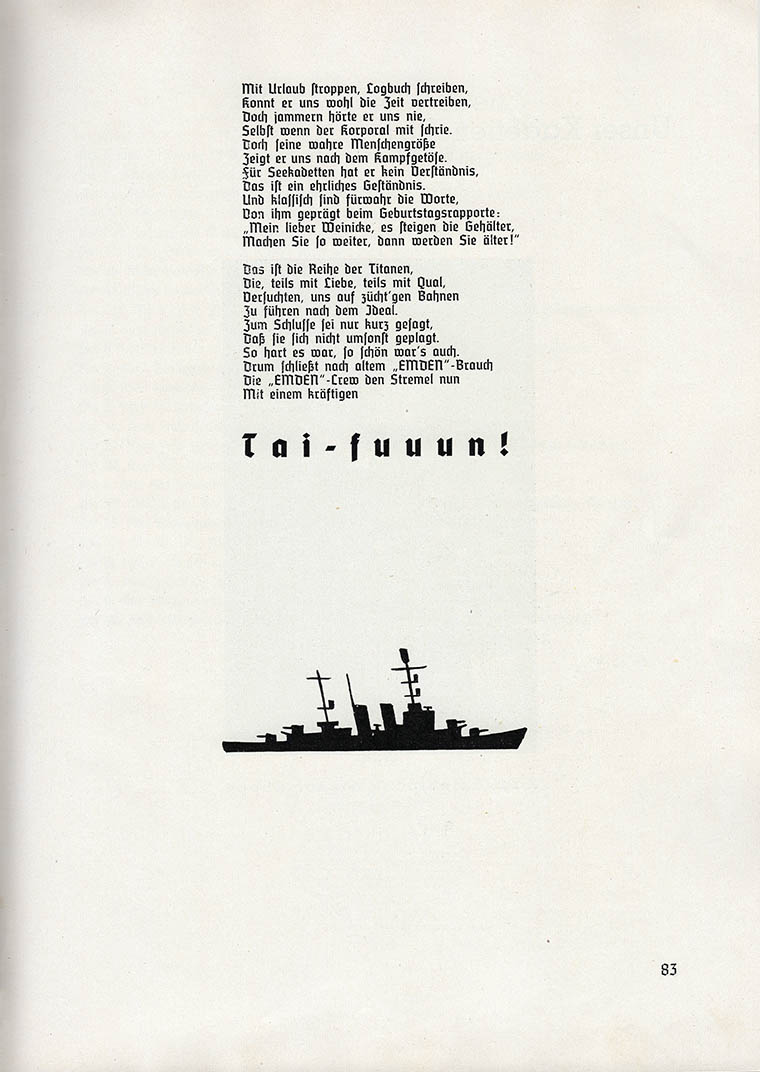
| Mit Urlaub stroppen, Logbuch schreiben, | Stanzas on leave, logbook writing, | ||
| Konnt er uns wohl die Zeit vertreiben, | He could certainly kill the time with us, | ||
| Doch jammern hörte er uns nie, | But he never heard us moan | ||
| Selbst wenn der Korporal mit schrie. | Even if the Corporal was screaming too. | ||
| Doch seine wahre Menschengröße | But his real human size | ||
| Zeigt er uns nach dem Kampfgetöse. | He pulls us after the roar of battle. | ||
| Für Seekadetten hat er kein Verständnis, | He has no sympathy for midshipmen, | ||
| Das ist ein erliches Geständnis. | That's an honest confession. | ||
| Und klassisch sind fürwahr die Worte, | And classic are indeed the words, | ||
| Von ihm geprägt beim Geburtstagsrapporte: | Stamped by him in the birthday reports: | ||
| "Mein lieber Weinicke, es steigen die Gehälter, | "My dear Weinicke, wages are rising, | ||
| Machen Sie so weiter, dann werden Sie älter!" | Keep it up and you'll get older!" | ||
| Das ist die Reihe der Titanen. | This is the series of Titans. | ||
| Die, teils mit Liebe, teils mit Qual, | Who, partly with love, partly with torment, | ||
| Versuchten, uns auf zücht'gen Bahnen | Tried to get us on chaste paths | ||
| Zu führen nach dem Ideal. | To lead according to the ideal. | ||
| Zum Schlusse sei nur kurz gesagt, | In conclusion, just briefly | ||
| Daß sie sich nicht umsonst geplagt. | That they hadn't toiled in vain. | ||
| So hart es war, so schön war's auch. | That it was hard for you, it was nice too. | ||
| Drum schließt nach alten "EMDEN" -Brauch | Drum closes according to the old "EMDEN" custom | ||
| Die "EMDEN" -Crew den Stremel nun | The "EMDEN" crew now do the Stremel | ||
| Mit einem kräftigen | With a strong | ||
| Ta i - f u u u n ! | Ty-phooon ! | ||
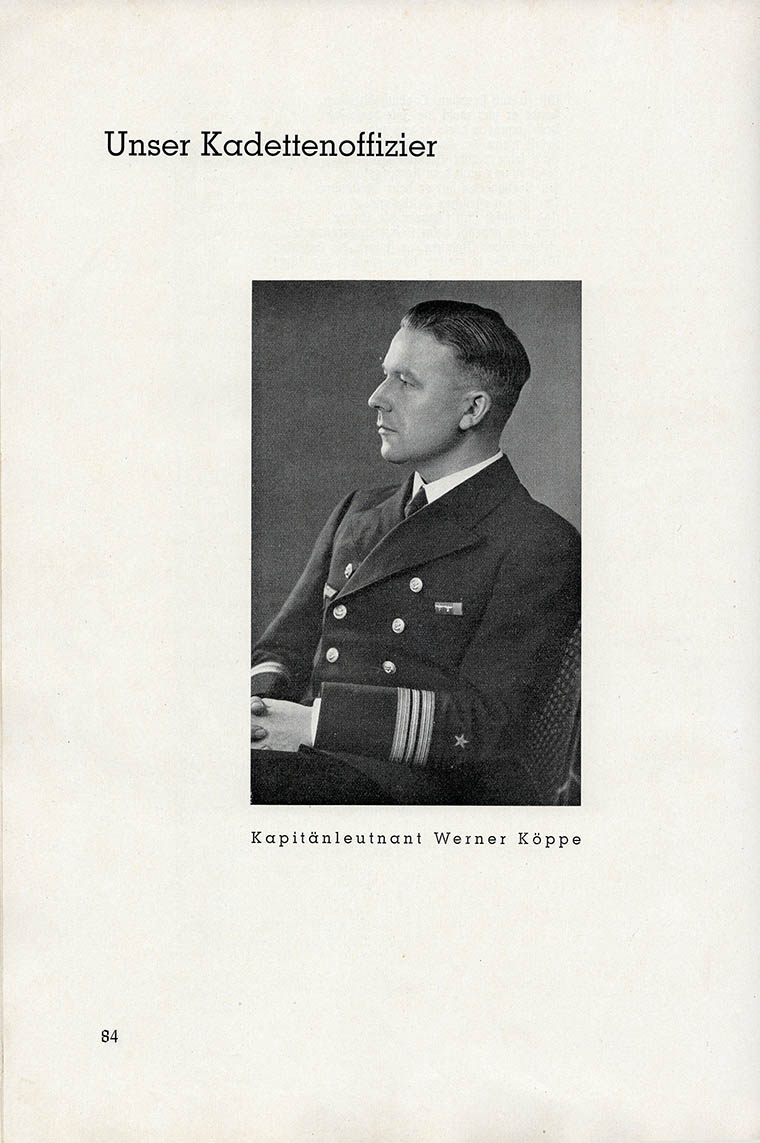
| Out Cadet Officer | |||
| Kapitänleutnant Werner Köppe | |||
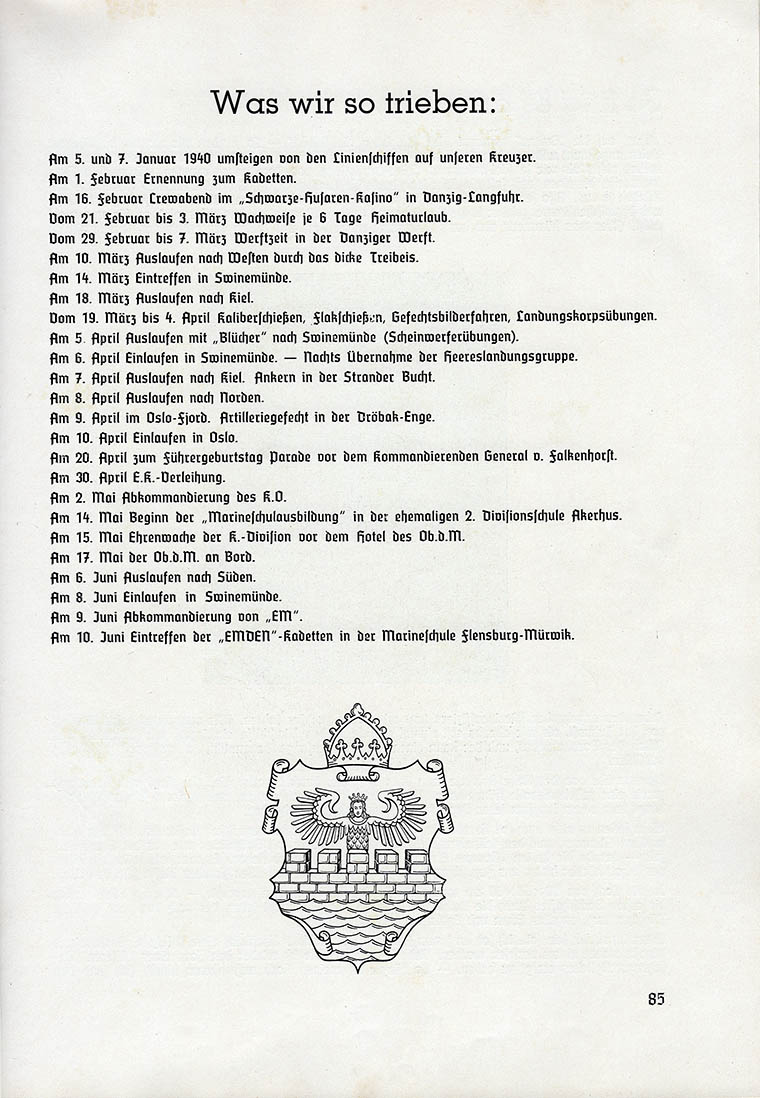
What we're up to |
|||
| On 5 and 7 January 1940 change from the ships of the line to our cruiser. | |||
| On 1 February appointment to Cadets. | |||
| On 16 February Crew Evening on "Schwarz-Husaren Casino" in Danzig-Langfuhr. | |||
| From 21 February to 3 March each watch 6 days home leave. | |||
| From 29 February to 7 March shipyard period in the Danziger Werft. | |||
| On 10 March put to sea for the west through the thick drift ice. | |||
| On 14 March arrival in Swinemünde. | |||
| On 18 March put to sea for Kiel. | |||
| From 19 March to 4 April caliber shooting, anti-aircraft gun shooting, combat image experience, landing corps training. | |||
| On 5 April put to sea with "BLÜCHER" for Swinemünde (Searchlight training). | |||
| On 6 April arrival in Swinemünde. - Nights took over the Army Landing Group. | |||
| On 7 April put to sea for Kiel. Anchored in Strander Bay. | |||
| On 8 April put to sea for the north. | |||
| On 9 April in Oslo Fjord. Artillery combat in the Dröbak Narrows. | |||
| On 10 April arrival in Oslo. | |||
| On 20 April for the Führer's birthday parade before the Commanding General v. Falkenhorst. | |||
| On 30 April award of the Iron Cross. | |||
| On 2 May detachment of the K.O. | |||
| On 14 May began "Naval School Training" in the former 2. Division School Akerhus. | |||
| On 15 May Honor Guard of the K.-Division before the hotel of the Ob.d.M. | |||
| On 17 May the Ob.d.M. on board. | |||
| On 6 June Put to sea for the south. | |||
| On 8 June arrival in Swinemünde. | |||
| On 9 June detachment from "EM". | |||
| On 10 June the "EMDEN"-Cadets in the Naval School Flensburg-Mürwik. | |||
City of Emden crest |
|||
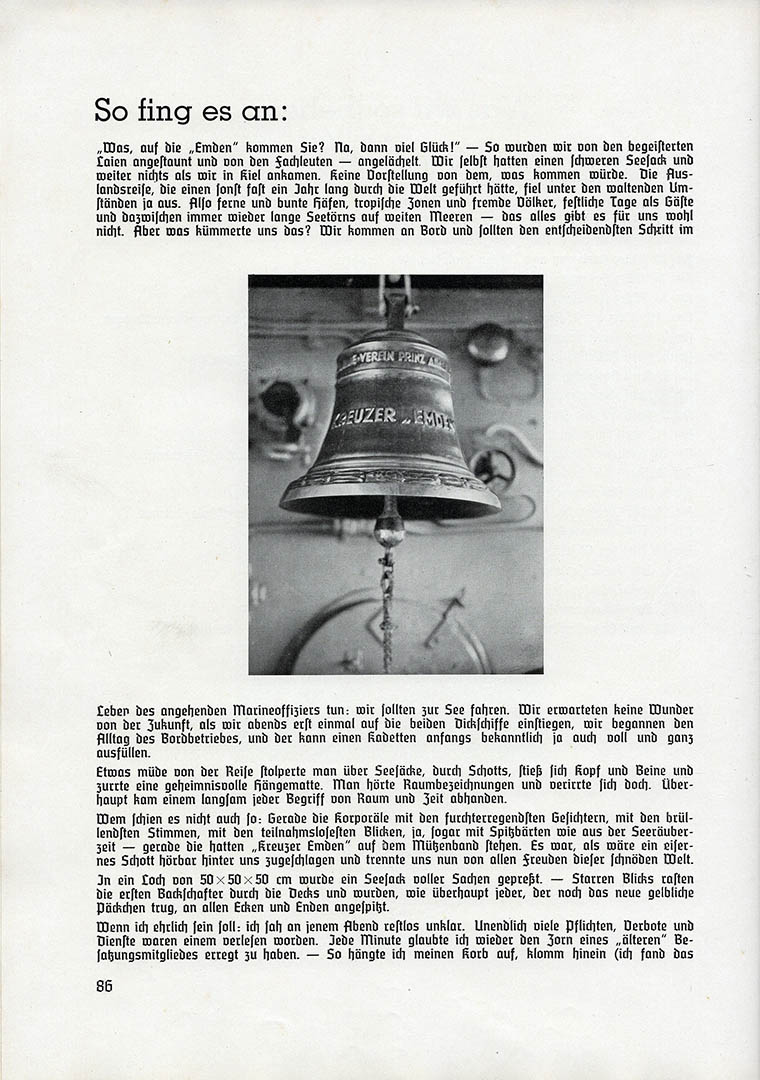
| This is how it started: | |||
| "What, on the 'EMDEN' you? Well, good luck then!" - That's how we were smiled upon by enthusiastic laypeople and the experts. We ourselves had a heavy sea bag and nothing else when we arrived in Kiel. No idea of what was to come. The trip abroad, which would otherwise have taken you around the world for almost a year, was canceled under the prevailing circumstances. So distant and colorful ports, tropical zones and foreign peoples, festive days as guests and in between long sea trips on wide seas - all that doesn't exist for us. But what did we care? We come aboard and we are to take the most crucial step in | |||
| the life of the prospective Naval Officer: we are to go to sea. We didn't expect any miracles from the future when we first boarded the two fat ships in the evening, we began the day-to-day operations on board, and as is well known, that can occupy a cadet completely at the beginning. | |||
| Somewhat tired from the journey, one stumbled over sea bags, through bulkheads, hit one's head and legs and lashed a mysterious hammock. One heard room designations and yet got lost. In general, one was slowly losing any notion of space and time. | |||
| Who didn't think so? Especially the Corporals with the scariest faces, with the roarsest voices, with the most listless looks, yes, even with goatees like from the days of pirates - they had "Cruiser EMDEN" written on the cap band. It was as if an iron bulkhead had audibly slammed shut behind us, severing us from all the joys of this despicable world. | |||
| A sea bag full of things was pressed into a hole measuring 50 x 50 x 50 cm. - Staring at the first mess steward raced through the decks and, like everyone else who was still carrying the new yellowish uniform, were flogged at every nook and cranny. | |||
| If I'm to be honest: that evening my vision was completely unclear. An infinite number of duties, prohibitions and services had been read out to you. Every minute I thought I had aroused the anger of an "senior" crew member. So I hung up my hammock, climbed in (I found it | |||
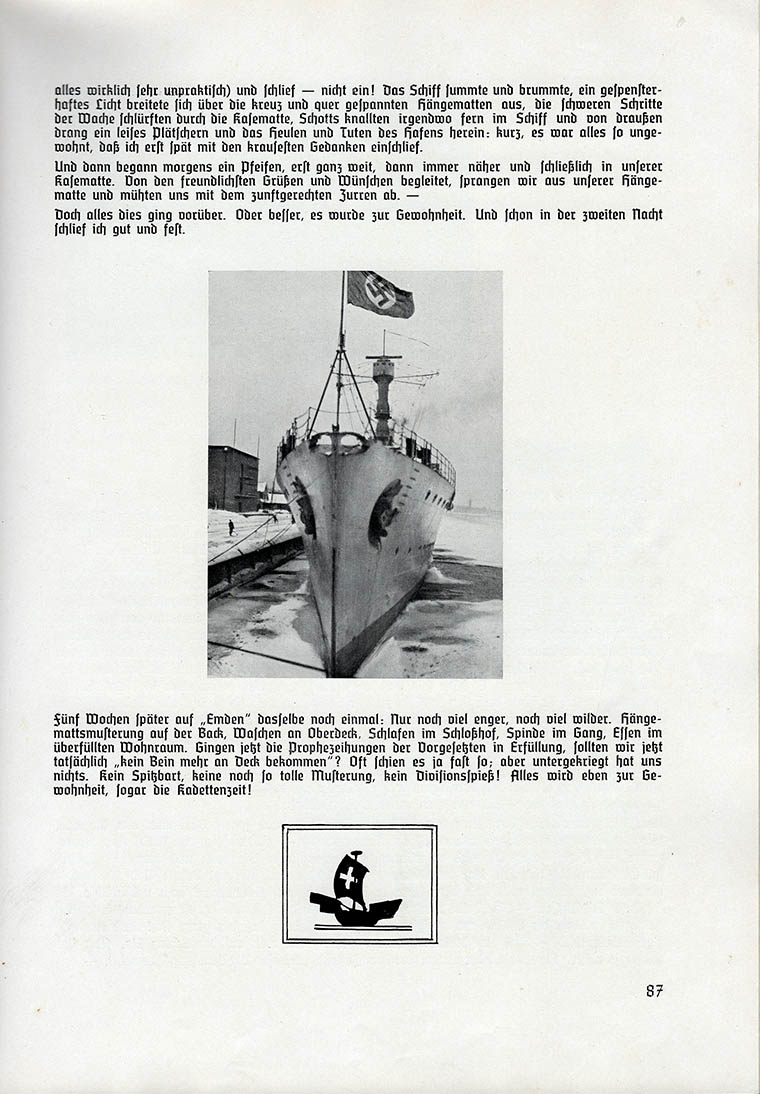
| all really very practical) and didn't fall asleep! The ship hummed and growled, a ghostly light spread across the criss-crossed hammocks, the heavy footsteps of the watch shuffled through the case mate, bulkheads slammed somewhere far in the ship, and from outside came a faint splashing and howling and hooting of the port. In: in short, everything was so unusual that I fell asleep late with the wildest thoughts. | |||
| And then in the morning a whistling started, first very far, then closer and closer and finally in our case mate. Accompanied by the friendliest greetings and wishes, we jumped out of our hammock and struggled down with the proper lashing. | |||
| But all that passed. Or rather, it became a habit, and by the second night I slept soundly. | |||
| Five weeks later on "EMDEN" the same thing again: just a lot tighter, a lot wilder. Hammock muster n on the forecastle, washing on the upper deck, sleeping in the courtyard, lockers in the corridor, eating in the crowded living room. If the prophecies of the superiors were now being fulfilled, should we actually "not get a leg on deck"? Often it almost seemed so; but nothing got us down. No goatee, no muster, no matter however great, no division Sergent Major! Everything just becomes a habit, even coffee time! | |||
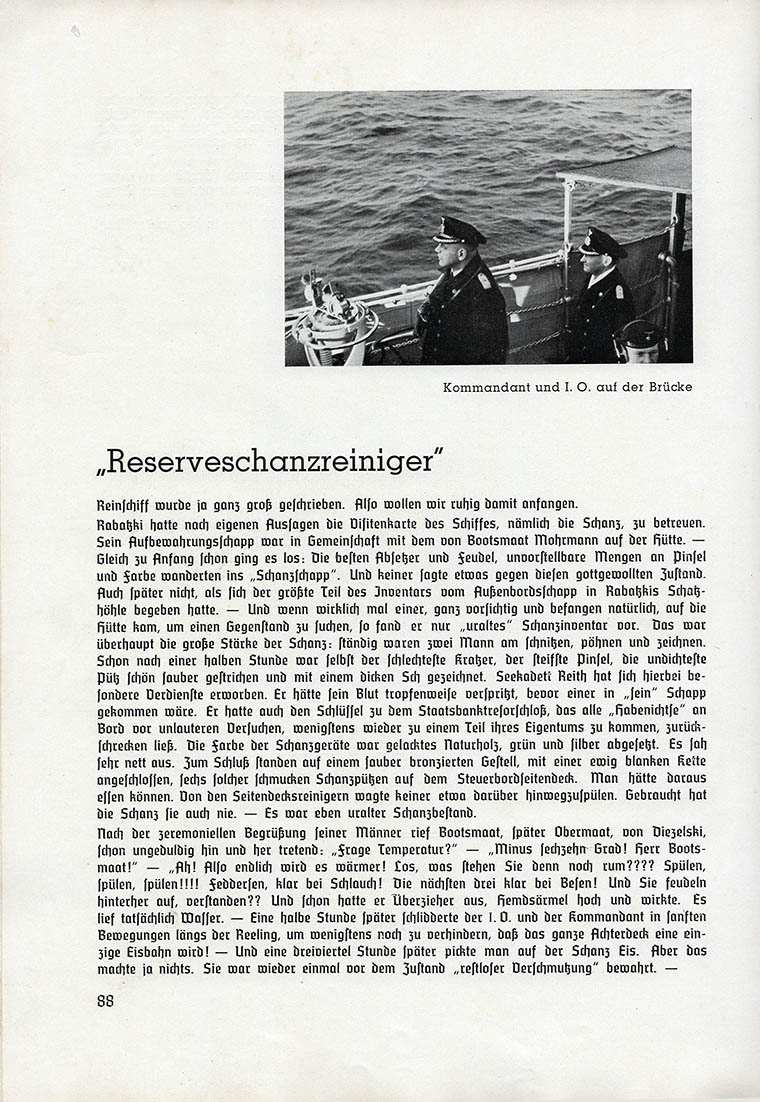
| Kommandant and First Officer on the bridge | |||
| "Back-up redoubt cleaner" | |||
| Cleaning ship was very important. So let's start with that. | |||
| Rabatzki, according to his own statements, had to take care of the ship's calling card, namely the redoubt. His stowage locker was shared with that of boatswain Mohrmann in the cabin. - It started right from the start: The best spreaders and rags, unimaginable amounts of brushes and paint went to the "Redoubt Locker". And no one said anything against this God-ordained state. Not even later, when most of the inventory from Outboard locker had gone to Rabatzki's treasure cave. And if someone really came to the cabin, very cautiously and self-consciously, of course, to look for an object, he only found "ancient" redoubt inventory. That was the great strength of the redoubt: two men were constantly whittling, polishing and marking. After half an hour, even the worst scratch, the stiff pinel, the leakiest bucket were painted clean and marked with a thick pencil. Sea Cadet Reith has achieved special merits in this regard. He had sprayed his blood in drops before anyone got into "his" locker. He also had the key to the State Bank vault lock that made all the "have-nots" on board shy away from dishonest attempts to get at least some of their belongings back. The color of the redoubt gear was varnished natural wood, green and silver tattered. It looked very nice. Finally, on a faint bronze frame, connected with an eternally bright chain, stood six such decorative bulwarks on the starboard side deck. You could have eaten from it. None of the side deck cleaners dared to wash over it. The redoubt never used them either. - It was just ancient redoubt inventory. | |||
| After the ceremonial greeting of his men, the Bootsmaat, later Oberbootsmatte, von Diezelski, stepping back and forth impatiently: "What is the temperature?" - "Minus sixteen degrees! Herr Bootsmaat!" - "Ah! It's finally getting warmer! Come on, why are you still standing there???? Rinse, rinse, rinse!!!! Feddersen, of course with the hose! The next three, of course with the broom! Do you understand?? It actually ran water. - Half an hour later the First Officer and the Kommandant making gentle movements along the railing to at least prevent the whole quarterdeck from becoming a single ice rink! - and three quarters of an hour later they were picking ice on the redoubt. But that didn't matter. Once again she was saved from the state of "complete contamination". - | |||
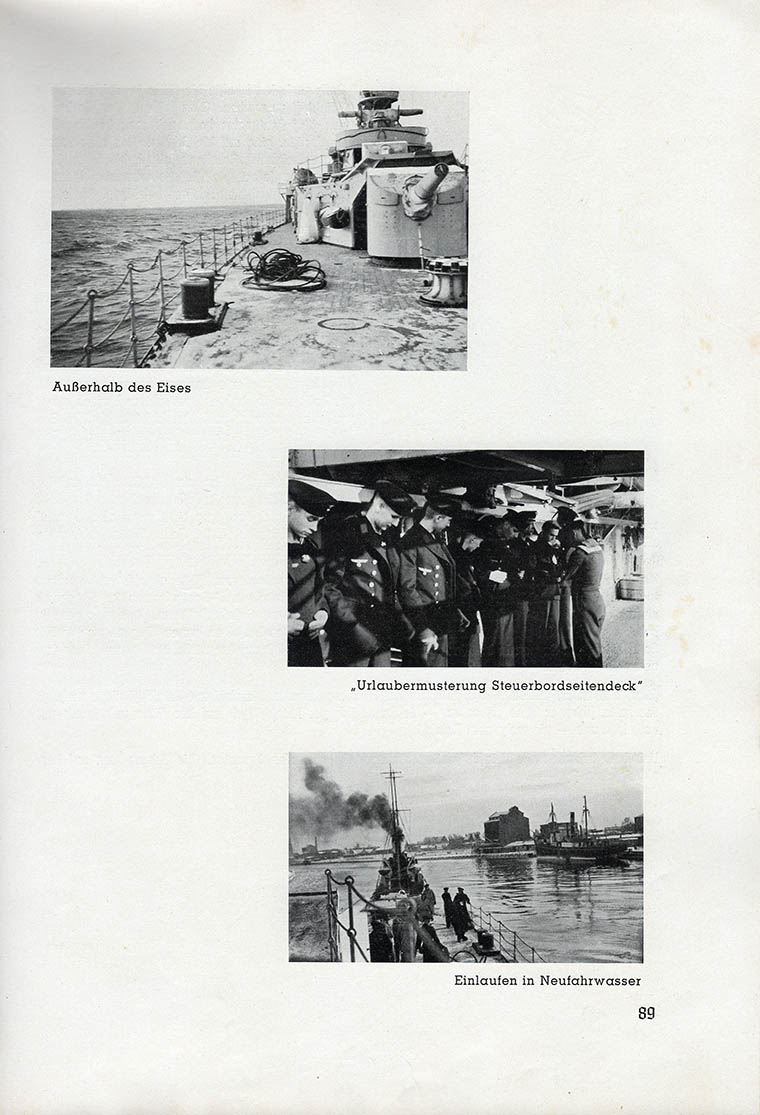
| Outside of the ice | |||
| "Leave muster on the starboard side deck" | |||
| Arrival in Neufahrwasser | |||
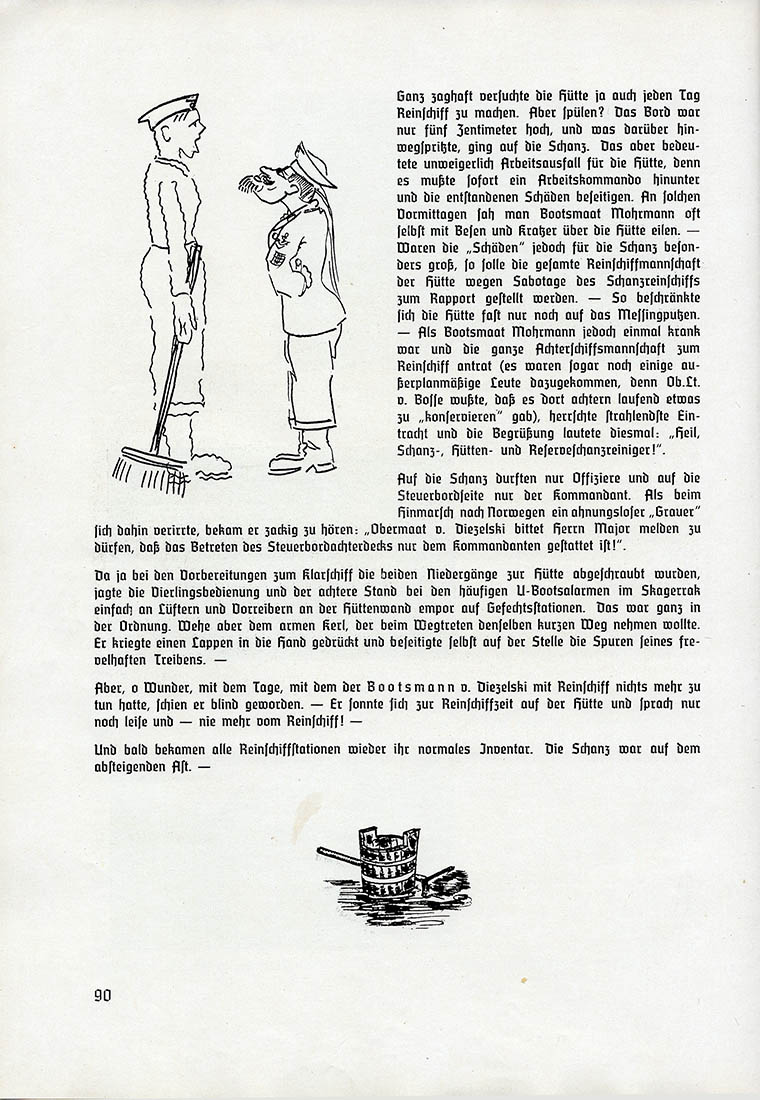
| The cabin tried very tentatively to carry out clean ship every day. But rinse? The edge was now five centimeters high, and what splashed over it went onto the redoubt. But that inevitably meant a loss of work for the cabin, because a work detail had to go down immediately and repair the damage that had occurred. On such mornings, Bootsmaat Mohrmann could often be seen hurrying about the hut himself with a broom and scraper. - However, if the "damage" was particularly great for the redoubt, the entire clean ship crew of the cabin should be put on report because of sabotage of the redoubt clean ship. - So the cabin limited itself almost exclusively to cleaning brass. - However, when boatswain Mohrmann was ill and the whole aft crew went to clean ship (there were even a few unscheduled people added, because Chief Lieutenant von Bosse knew that there was always something to be "conserved" aft), there was a radiant atmosphere Harmony and the greeting this time was: "Heil redoubt, Cabin and reserve redoubt cleaner!". | |||
| Only officers were allowed on the redoubt and only the Kommandant on the starboard side. When an unsuspecting "Grey" got lost on the way to Norway, he was told timidly: "Obermaat v. Diezelski asks the Major to report that only the Kommandant is permitted to enter the starboard after deck!". | |||
| Since the two companionways to the cabin were taken down during the preparations for making ship ready, the quadruple gun crew for the aft platform simply rushed up to the battle stations with the frequent U-boat alarms in the Skagerrak on ventilators and sash fasteners on the cabin wall. That was all right. But woe to the poor fellow who wanted to take the same short way when leaving. He got a rag pressed into his hand and immediately removed the traces of his outrageous activities himself. - | |||
| But, o wonder, on the day that the Bootsmann v. Diezelski had nothing more to do with clean ship, he seemed to have gone blind. - He sunned himself in the hut during the clean ship time and only spoke read and - never again of the clean ship! - | |||
| And soon all clean ship stations got their normal inventory back. The redoubt was on the decline. | |||
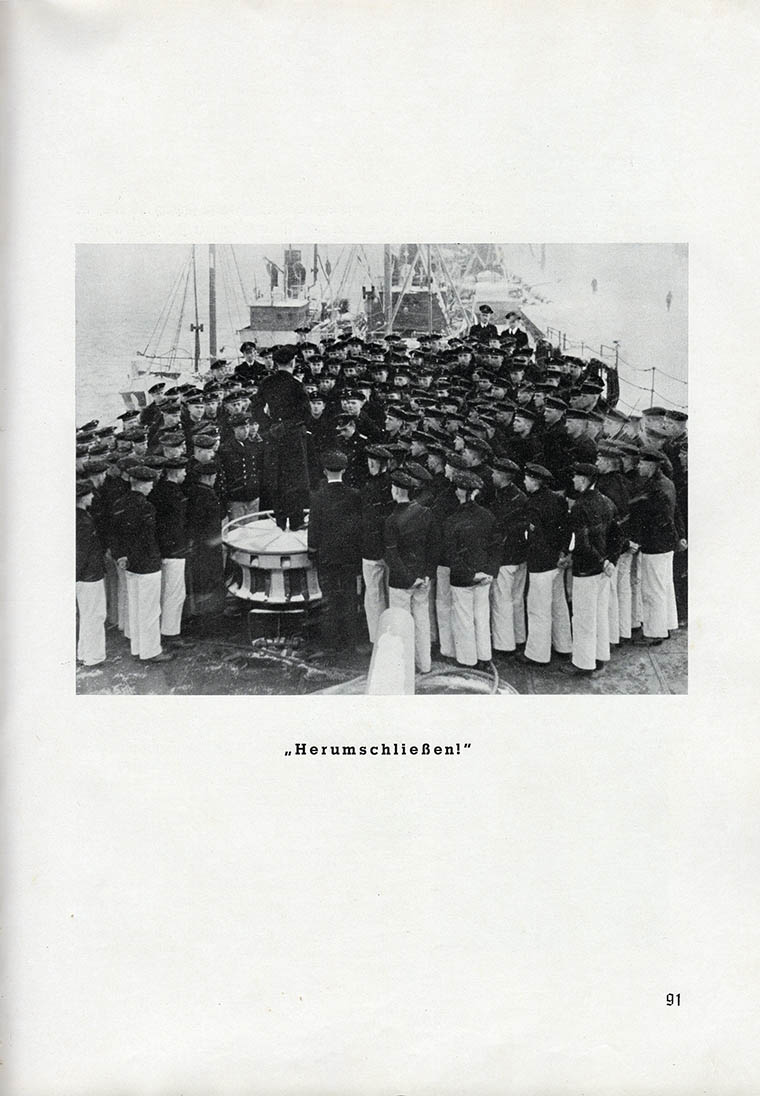
"Circle round" |
|||
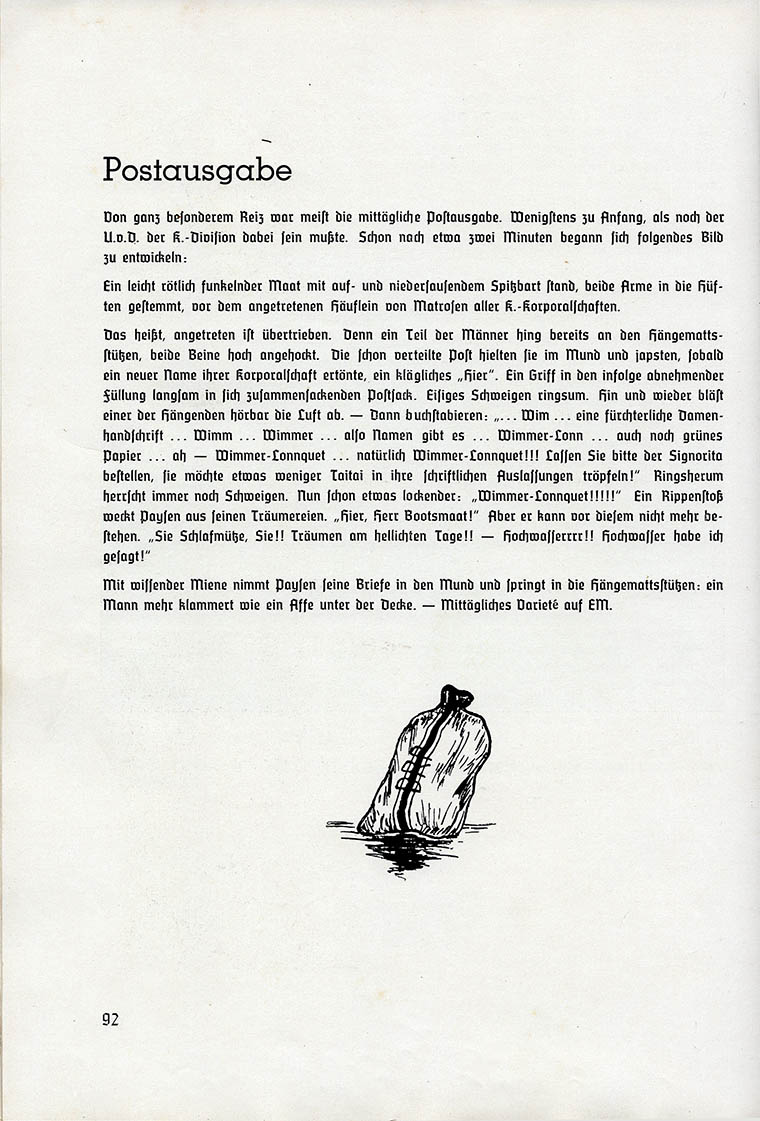
| Mail call | |||
| The midday mail call was usually particularly appealing. At least at the beginning, when the U.o.D. of the Cadet -Divsion had to be there. After about two minutes, the following picture began to form: | |||
| A slightly reddish shining Maat with a goatee that swept up and down stood, both arms on his hips, in front of the crowd of seamen from all the Cadet Corporal ranks that had lined up. | |||
| That means that muster is exaggerated. Because some of the men were already hanging from the hammock supports, both legs crouched high. They held the mail that had already been distributed in their mouths and gasped a pitiful "here" as soon as a new name from their Corporal ranks was heard. A hand in the mail bag, which is slowly collapsing as a result of the decreasing filling. Icy silence all around. Every now and then one of the hanging ones audibly blows off the air. - Then spell: ". . . Wim . . . a terrible lady's handwriting . . . Wimm . . . Wimmer . . . so there are names . . . Wimmer-Lonn . . . also green paper . . . ah - Wimmer- Lonnquet... of course Wimmer-Lonnquet!!! Let sis tell the signorita, Please have the Signorita dribble a little less Taitai into her written remarks!" There is still silence all around. Now a little more enticing: "Wimmer-Lonnquet!!!" A nudge in the ribs pulls Paysen out of his reverie. "Here, Herr Bootsmaat!" But he can no longer stand up to this, "You have to sleep, you!! Dreaming in broad daylight!! - High waterrrr!! High water I said!" | |||
| With a knowing expression, Paysen takes the letter into his mouth and jumps into the hammock. One man more clings clings to the ceiling like a monkey. - Lunch varieté on EM. | |||
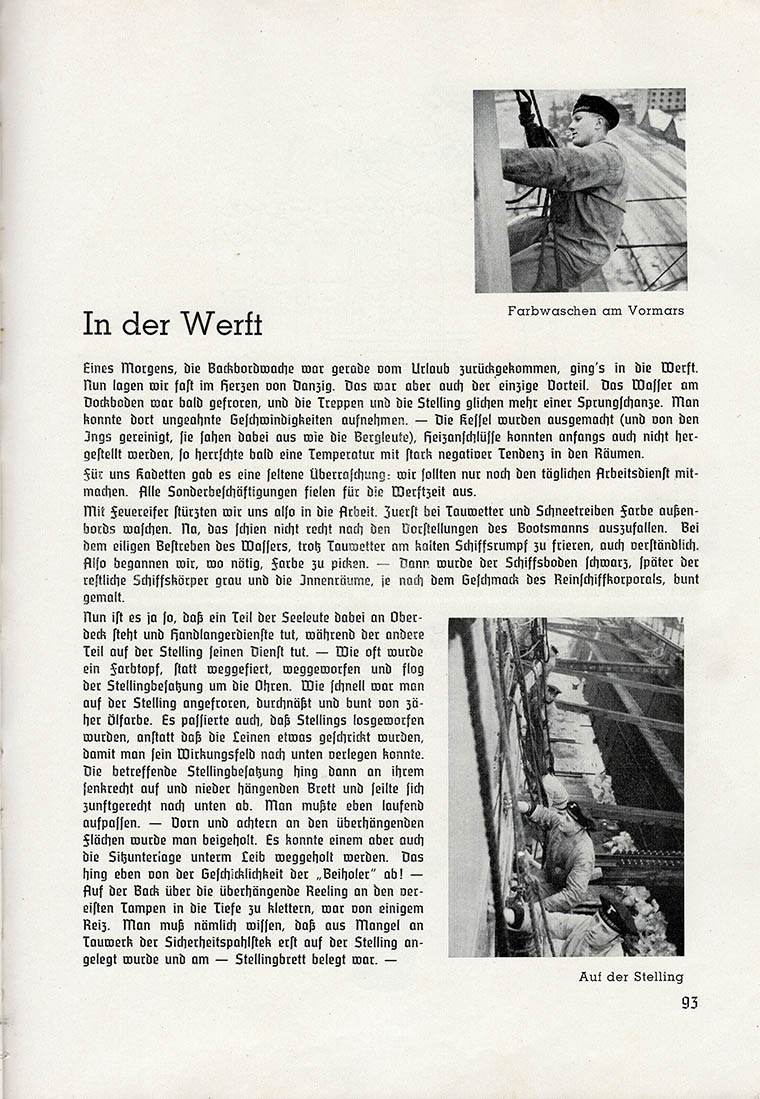
| Painting on the foretop | |||
| In the Shipyard | |||
| One morning, the port watch had just returned from vacation, we went to the shipyard. Now we were in the heart of Danzig. But that was the only advantage. The water on the dock floor soon froze, and the stairs and the gangway looked more like a ski jump. You could record unimagined speeds there. - The boilers were turned off (and cleaned by the Engineers, they looked like miners), heating connections could not be made at first either, so there was a temperature with a strongly negative tendency in the living spaces. | |||
| For us Cadets there was a rare surprise: we were only supposed to join the daily work service. All special jobs were canceled for the shipyard period. | |||
| So we threw ourselves into the work with fire iron. Wash paint outboard first during thaw and blowing snow. Well, that didn't seem to be going quite as the Bootsmanns had imagined. This is understandable given the water's hasty efforts to freeze on the cold hull despite the thaw. So we started to dab paint where necessary. - Then the bottom of the ship was painted black, later the rest of the hull was painted gray and the interior was colored according to the taste of the clean ship Corporal. | |||
| Now it was the case that some of the seafarers stood on the upper deck and do work, while the other part did their duty on staging. - How often was a paint pot, instead of being thrown away, thrown away and flew around the ears of the staging crew. How quickly one was frozen in one's position, soaked through and smeared with tough oil paint. It also happened that stagings were thrown loose instead of the lines being shrunk a bit so that one could move one's field of action down. The staging crew in question then hung on their board, which was hanging vertically up and down, and rappeled downwards in a manner appropriate to their condition. You just had to be careful while walking. - Forward and aft on the overhanging areas one was fetched. But the seat pad could also be taken away from under you. That just depended on the skill of the "minder"! - Climbing down over the overhanging railing on the icy ropes on the forecastle was quite appealing. You have to know that due to a lack of cordage, the safety bowline was only put on on the staging and - was donned on the staging board. - | |||
| On the staging | |||
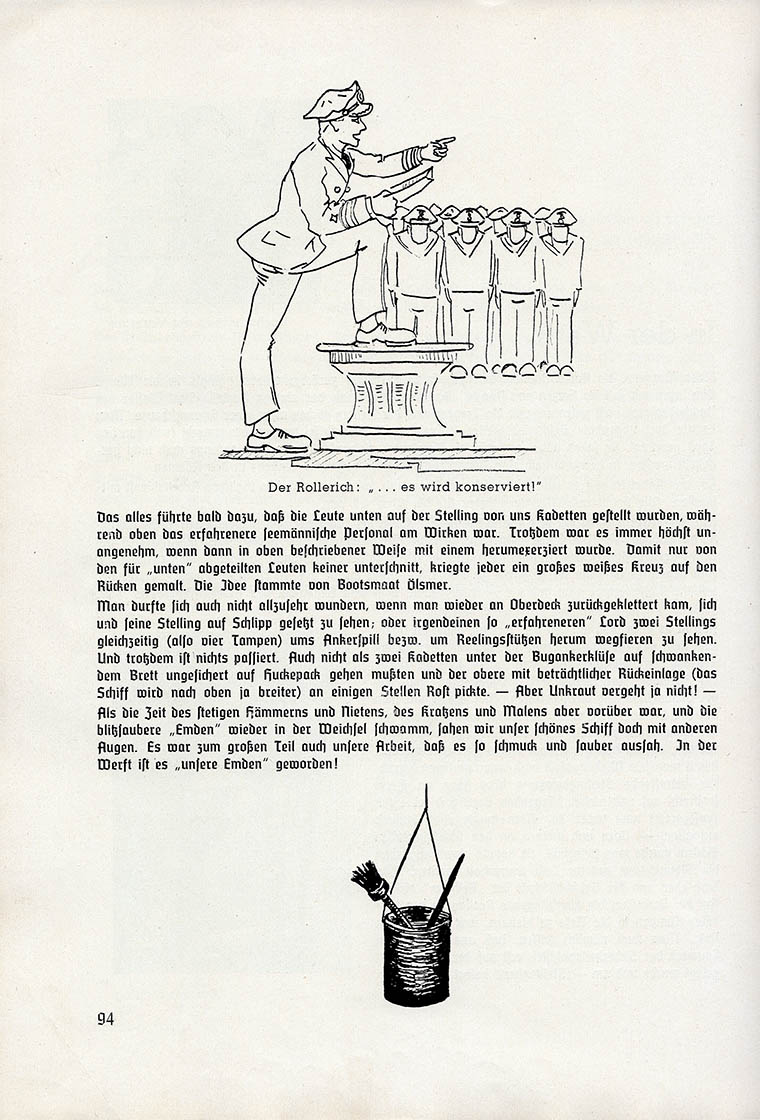
Der Rollerich: ". . . it is conserved!" |
|||
| All this soon led to the fact that the people were put down on the staging by us Cadets, while the more experienced seamanship personnel were at work upstairs. Nevertheless, it was always extremely unpleasant when one was then exercised in the manner described above. To ensure that none of the people assigned to "below" went under, everyone got a large white cross painted on their backs. The idea came from boatswain Ölsmer. | |||
| One shouldn't be too surprised when one came back to the upper deck to see oneself and one's gear put on slips; or any so "experienced" lord two stagings at the same time (ie four ropes) around the windlass or to see the stanchions drop away. | |||
| And yet nothing happened. Not even when two Cadets had to go piggybacking unsecured on a swaying board under the bow anchor cleat and the upper one with a considerable back insert (the ship gets wider upwards) picked rust in a few places. - But weeds don't die! - | |||
| But when the time of constant hammering and riveting, of scratching and painting was over, and the sparkling clean "EMDEN" was swimming in the Vistula, we saw our beautiful ship with different eyes. It was our job in large part to keep it looking so neat and clean. In the shipyard it has become "our EMDEN"! | |||
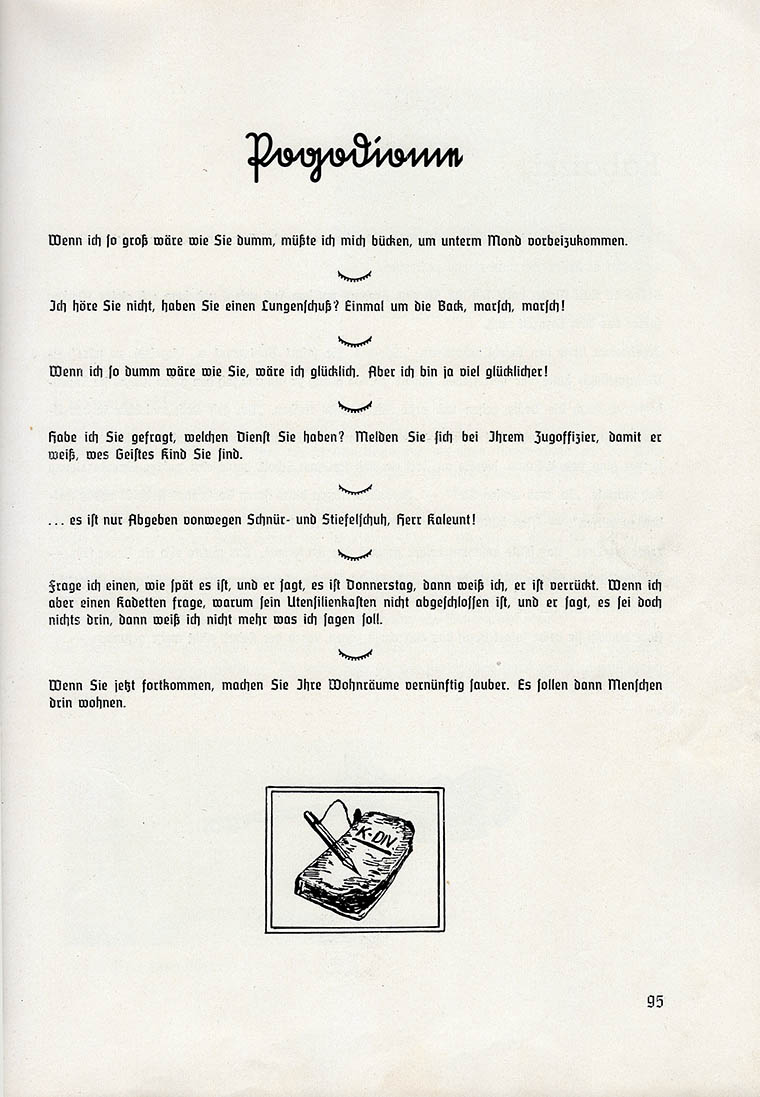
Pxxxxxxxxxxxxx? |
|||
| If I were as tall as you are stupid I'd have to bend down to get under the moon. | |||
| I can't hear you, shot in the lung? Once around the back, march, march! | |||
| If I were as stupid as you, I'd be happy. But I'm much happier! | |||
| Did I ask you what your duty is? Report to your Training Officer so he knows what kind of spirit you are. | |||
| . . . it's just giving way because of lace-up and boot shoes, Herr Kaleunt! | |||
| If I ask someone what time it is and they say it's Thursday, I know they're crazy. But if I ask a Cadet why his paraphernalia case hasn't been shut and he says there's nothing in it, I don't know what to say. | |||
| Now, when you leave, clean up your living quarters properly. Then people should be fine inside. | |||
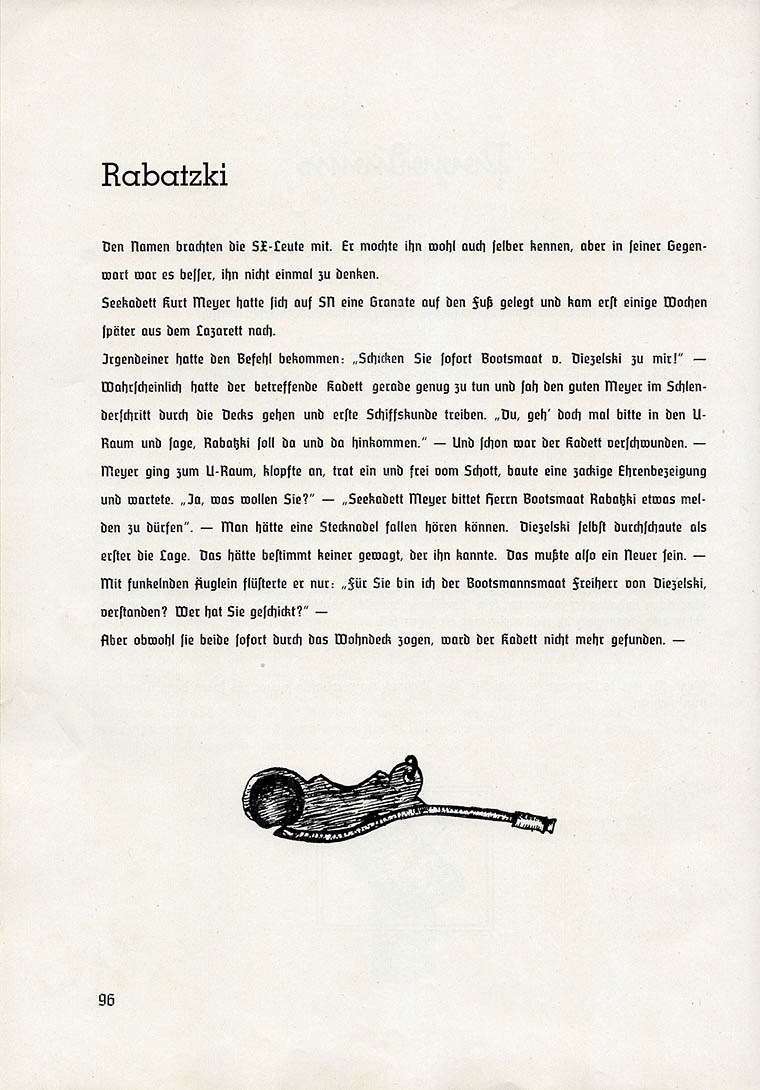
| Rabatzki | |||
| The SX-people brought the name with them. He might know him himself, but in his presence it was better not to even think about him. | |||
| Seekadet Kurt Meyer had put a shell on his foot on SN and only came back a few weeks later from the hospital. | |||
| Someone received the order: "Send Bootsmaat von Diezelski to me immediately!" - | |||
| The Cadet in question probably had just enough to do and saw good Meyer strolling through the decks and driving the first ship's knowledge. "Please go into the U-room and ask Rabatzki to come here and there." - And the Cadet was already gone - | |||
| Meyer went to the U-room, knocked, entered and cleared the bulkhead, made a smart salute and waited. "Yes, what are you supposed to do?" - "Sea Cadet Meyer asks Herr Bootsmaat Rabatzki to be allowed to report something". - You could have heard a pin drop. Diezelski himself was the first to see through the situation. No one who knew him would have dared to do that. So this had to be a new one. - With sparkling eyes he only whispered: "For you I am the Bootsmannsmaat Freiherr von Diezelski, understood? Who sent you? - | |||
| But although they immediately dragged legs through the living spaces deck, the Cadet was never found. - | |||
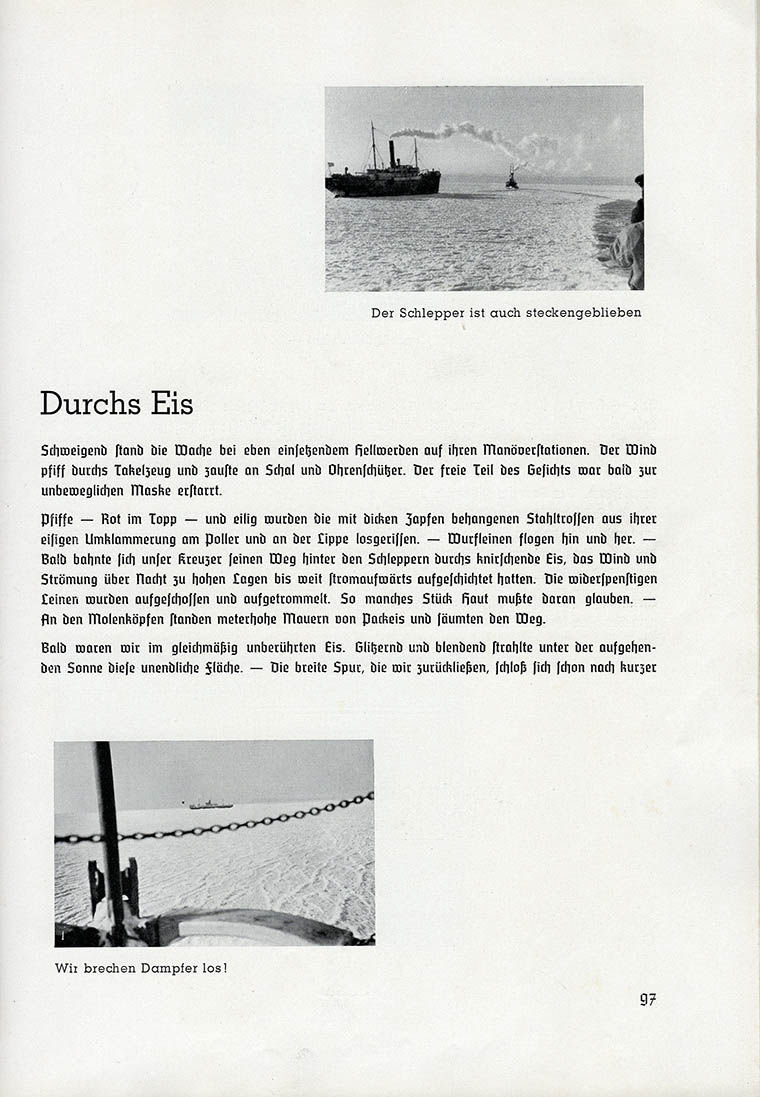
| The tug got stuck too | |||
| Through Ice | |||
| The watchstanders stood silently at their maneuvering stations as it was just beginning to get light. The wind whistled through the rigging and tousled the scarf and earmuffs. The free part of the face was soon frozen into an immobile mask. | |||
| Whistle - red in the top - and the steel cables, hung with thick cones, were hurriedly torn from their icy grip as a bollard and at the lip. - Throw lines flew back and forth. - | |||
| Soon our cruiser was making its way behind the tugs through crunching ice that wind and current had piled up too high overnight far upstream. The stubborn lines were unwound and reeled up. Many a piece of skin had to believe in it. - Meter-high walls of pack ice stood at the pier heads and lined the path. | |||
| Soon we were in the evenly untouched ice. This endless surface shone glistening and dazzling under the rising sun. - The wide track that we left behind closed after a short | |||
| We break the steamer out! | |||
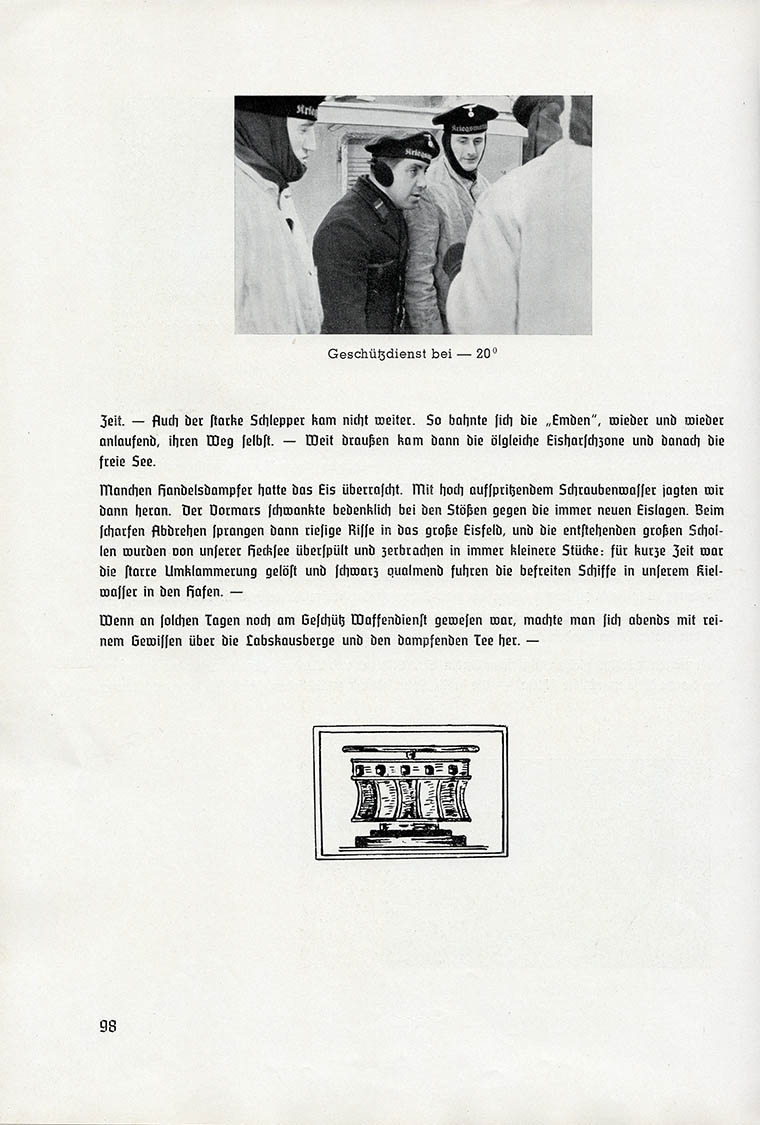
Gun duty be -20° |
|||
| time - Even the strong tug did not get any further. So the "EMDEN" made its own way, starting off again and again. - Far out there was the oily ice crust zone and then the open sea. | |||
| The ice surprised some merchant steamer. We then closed with high spraying propeller wash. The foretop wobbled alarmingly in terms of heights against the constantly changing layers of ice. When we turned sharply, cracks sprang into the large ice field, and the resulting large floes were swept over by our stern sea and broke into smaller and smaller pieces: for a short time there was water in the harbor. - | |||
| If on such days there was still weapon duty at the gun, in the evenings one would tackle the Labskaus mountains and the steaming tea with a clear conscience. | |||
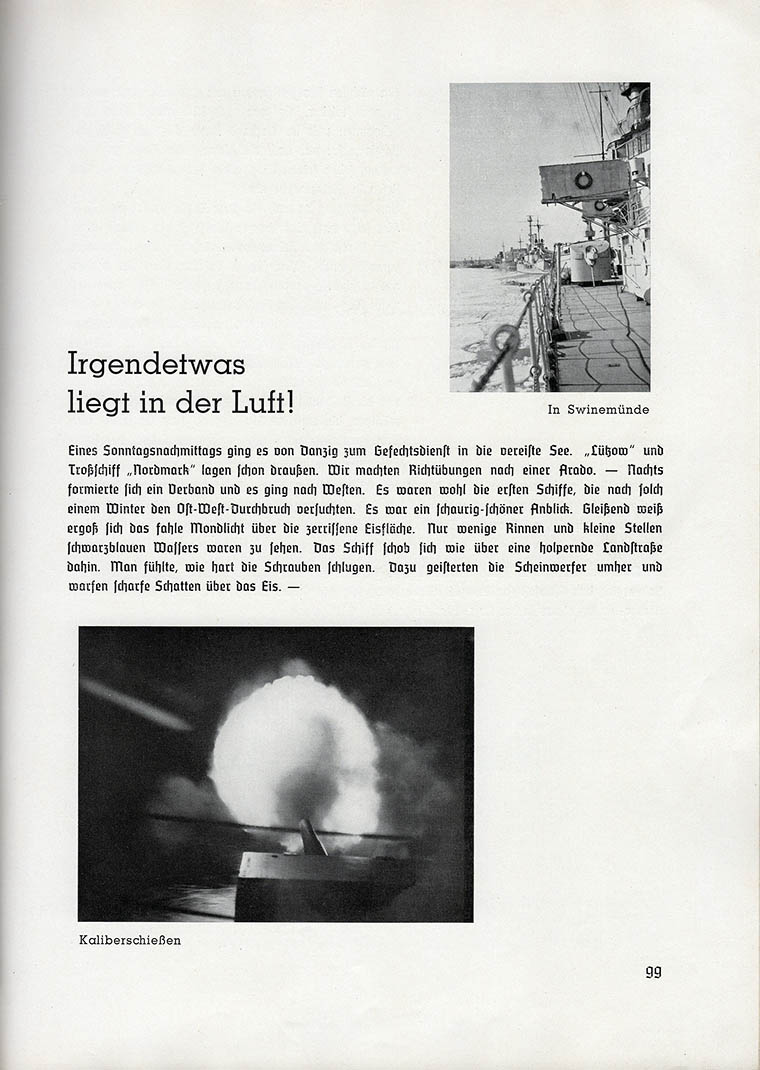
| In Swinemünde | |||
| Something is in the air! | |||
| One Sunday afternoon we left Danzig for combat duty in the icy sea. "LÜTZOW" and supply ship "NORDMARK" were already outside. We did alignment exercises for an Arado. - At night a group formed and we headed west. They were probably the first ships to attempt the break-through to the west after such a winter. It was an eerily beautiful sight. The pale moonlight spilled glistening white over the torn surface of ice. Only a few gullies and small patches of black-blue water could be seen. The ship pushed along as if on a bumpy country road. You could feel the screws beating hard. In addition, the searchlights ghosted around and threw sharp shadows across the ice. - | |||
| Caliber shooting | |||
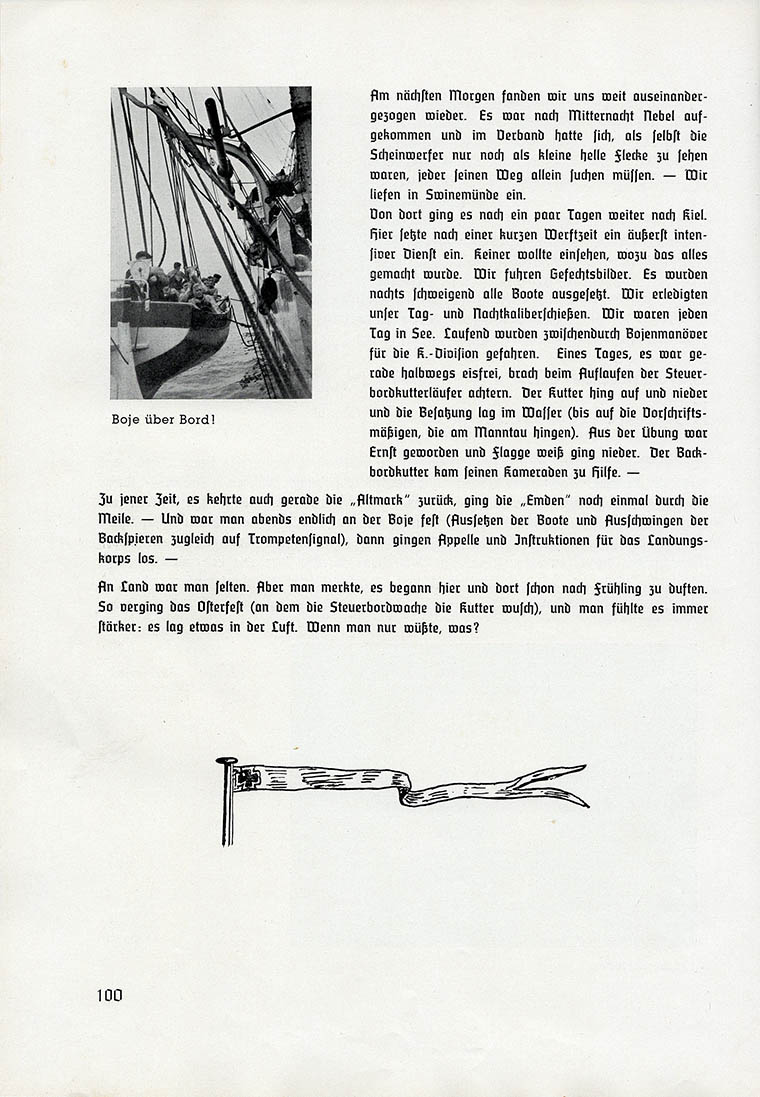
| The next morning we found ourselves far apart. Fog had come up after midnight and when even the searchlights were only visible as small bright spots, everyone in the group had to find their own way. - We checked in in Swinemünde. | |||
| From there we went on to Kiel after a few days. Here now after a short time in the shipyard an extremely intensive service. No one wanted to see why it was all done. We drove combat drills. All boats were silently launched at night. Day and night caliber shooting. We were at sea every day. In between, buoy maneuvers were constantly being carried out for the Cadet Division. One day, when it was halfway free of ice, the starboard cutter runners broke astern. The cutter hung up and down and the crew lay in the water (except for the regulation ones who were hanging on the maning rope). The exercise had become serious and flag white went down. The port cutter came to the aid of his comrades. - | |||
| At that time, when the "ALTMARK" was also returning, the "EMDEN" went through the mile again. - When in the evening one was finally made fast to the buoy (launching the boats and swinging out the spars at the same time to a trumpet call), then roll calls and instructions for the landing corps went off. | |||
| One was seldom on land. But you could tell that here and there it was already starting to look like spring. So Easter went by (when the starboard watch was washing the cutters) and it was getting stronger and stronger: something was in the air. If you only knew what? | |||
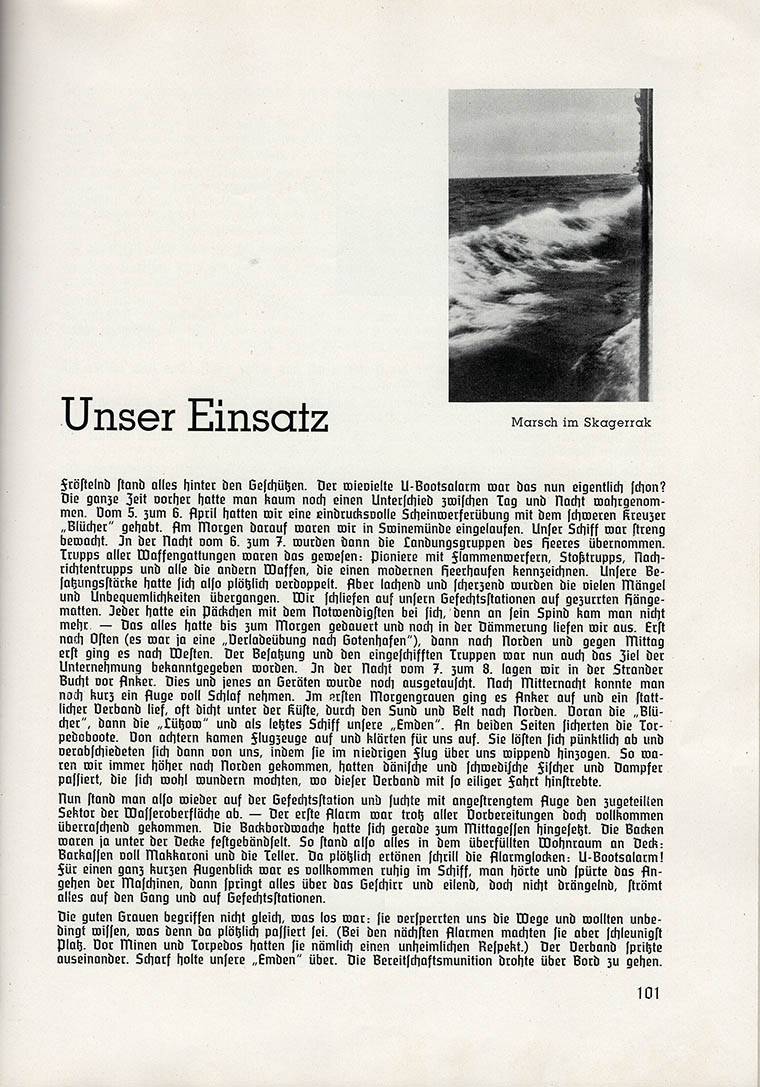
| Transit in the Skagerrak | |||
| Our Operation | |||
| Shivering, everyone stood behind the guns. Was that actually the wisest U-boat alarm? The whole time before you had hardly noticed a difference between day and night. From April 5th to 6th we had an impressive searchlight exercise with the heavy cruiser "BLÜCHER". The next morning we entered Swinemünde. Our ship was heavily guarded. In the night of July 6th, the landing groups of the Army were taken over, squads of all branches of service: Engineers with flamethrowers, shock troops, signal squads and all other weapons that characterize a modern army troop. So our crew size had suddenly doubled. The many shortcomings and inconveniences were ignored, laughing and joking silly. We slept at our battle stations on lashed hammocks. Everyone had a pack with the essentials, because you couldn't get to your locker anymore. - All this lasted until morning and we left at dusk. First to the east (it was a "loading exercise to Gotenhafen") then to the north and only around noon did it come to the west. The crew and the embarked troops had now also been informed of the objective of the operation. During the night of the 7th and 8th, we anchored in Strander Bay. This and that of gear were exchanged. After midnight you could get an eyeful of sleep after a short while. At first light of day weighed anchor and a large convoy ran north through the Sound and Belt, often close to shore. First the "BLÜCHER", then the "LÜTZOW" and as the last ship our "EMDEN". Torpedo boats screened on both sided. Aircraft came up from behind and cleared the way for us. They took turns punctually and then said goodbye to us by bobbing over us in the low flight. So we had come ever further north, had passed Danish and Swedish fishermen and steamers, who might well have wondered where this convoy was headed in such a hurry. | |||
| So now you were back at the battle station and with strained eyes searched the assigned sector of the water surface. Despite all the preparations, the first alarm came as a complete surprise. The port watch had just sat down to lunch. The cheeks were tied under the blanket. So that's how it all stood in the crowded living spare on deck: launches full of macaroni and the plates. Suddenly the alarm bells sound shrilly: U-boat alert! For a very short moment it was completely quiet in the ship, you could hear and feel the engines starting up, then everyone jumped over the dishes and hurriedly, but not jostling, everyone streamed into the corridor and to the battle stations. | |||
| The Grays didn't understand what was going on right away: they were blocking our paths and desperately wanted to know what had suddenly happened. (They gave way as quickly as possible when the next alarm sounded. They had an uncanny respect for mines and torpedoes.) The formation splattered apart. Our "EMDEN" overtook sharply. The ready ammunition threatened to go overboard. | |||
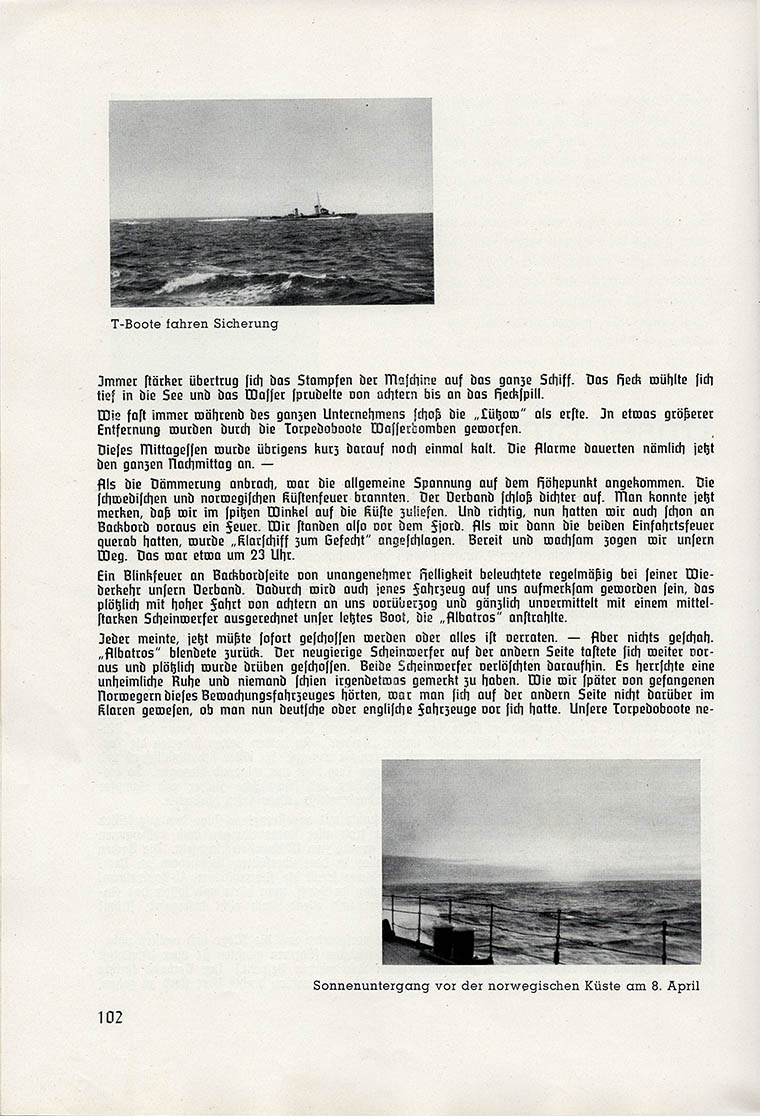
| Torpedo boats screen | |||
| The pounding of the engines were transmitted more and more to the whole ship. The stern dug deep into the sea and the water gushed from aft to the stern capstan. | |||
| As almost always during the whole operation, "LÜTZOW" was the first to shoot. At a slightly greater distance, the torpedo boats threw depth charges. | |||
| By the way, this lunch got cold again shortly afterwards. The alarms lasted all afternoon. - | |||
| As dusk fell, general tension was at its peak. The Swedish and Norwegian coast fires were burning. The formation closed tighter. One could now see that we were approaching the coast at an acute angle. And properly, now we already had a fire ahead to port. So we were standing off the fjord. When we then had the two entrance lights abeam, "Clear ship for battle" was announced. Ready and alert we made our way. That was around 23.00 hours. | |||
| A flashing light on the port side of unpleasant brightness regularly illuminated our formation by its recurrence. As a result, the vessel that suddenly passed us at high speed from astern and suddenly illuminated our last boat, the "ALBATROS", with a medium-powered searchlight must have noticed us. | |||
| Everyone said they had to be shot immediately or everything would be betrayed. - But nothing happened. "ALBATROS" faded back. The curious searchlight on the other side felt its way further ahead and suddenly there was a shot from the other side. Both searchlights then went out. There was an eerie calm and nobody seemed to have noticed anything. As we later heard from captured Norwegians in this patrol vessel, it was not clear on the other side whether German or English vehicles were before them. Our torpedo boats | |||
| Sunset off the Norwegian coast on 8 April | |||
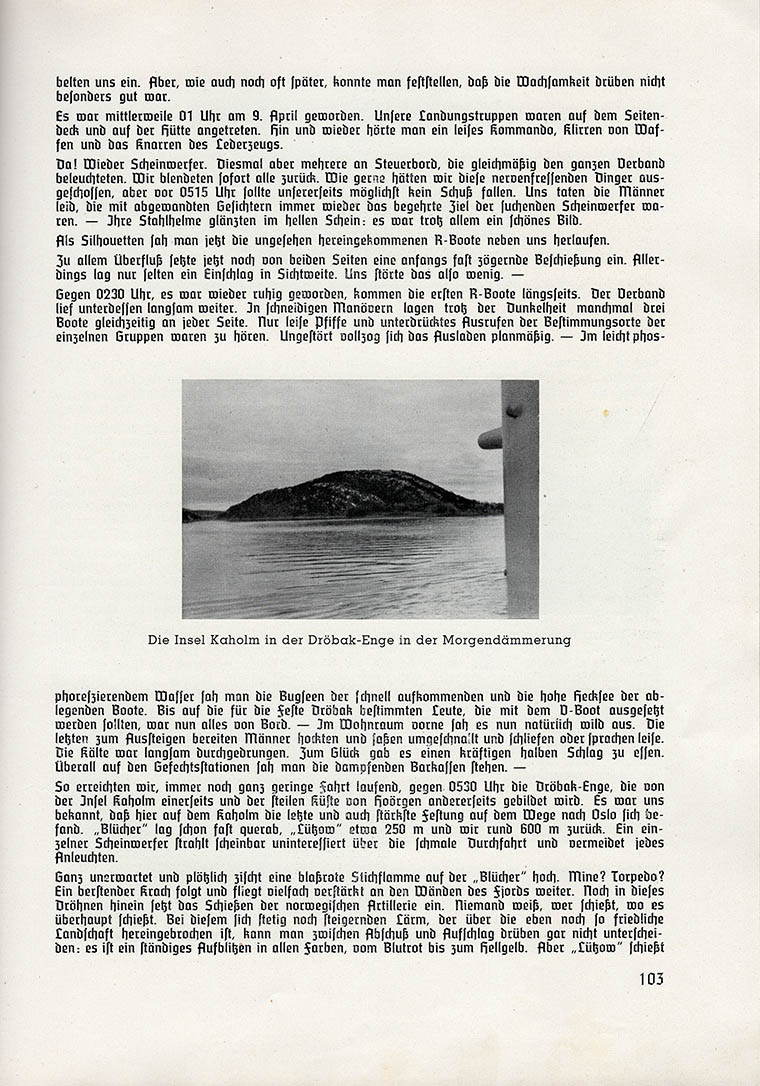
| smoke screened us in. But, as was often the case later, one could tell that the vigilance over there was not particularly good. | |||
| It was now 1:00 hours on April 9th. Our landing troops were lined up on the side deck and in the cabin. Now and then you could hear a faint order, the clink of weapons and the creaking of leather gear. | |||
| There! Searchlights again. But this time there were several to starboard, which evenly illuminated the whole formation. We all flashed back immediately. We would have loved to have shot these nerve-wracking things, but before 5.15 a.m. we were not to fire a shot. We felt sorry for the men who, with their faces averted, were always the desired target of the searching headlights. - Their steel helmets shone in the bright light: it was a beautiful picture in spite of everything. | |||
| The silhouettes of the mine sweepers, which had come in unseen, were now seen running alongside us. | |||
| To top it all off, there was now an initially almost hesitant bombardment from both sides. However, there was rarely an impact in sight. So that didn't bother us much. - | |||
| At about 02.30 hours, after it had become quiet again, the first mine sweeper came alongside. The formation, meanwhile, slowly went on. In spite of the darkness, sometimes three boats were lying on each side at the same time in dashing maneuvers All that could be heard was whistles and suppressed shouts of the destinations of the individual groups. Unloading proceeded according to plan, undisturbed. - In the slightly phosphorescent water | |||
| Kaholm Island in the Dröbak narrows in the morning twilight | |||
| you could see the bow seas of the fast approaching boats and the high stern sea of the departing boats. Except for the people destined for the Dröbak Fortress, who were to be deployed by U-boat, everything was now on board. - In the living space forward it now looked wild, of course. The last men ready to go out crouched and sat buckled in their belts, sleeping or talking softly. The cold was slowly getting through. Luckily, there was a hearty half-batch meal. Everywhere at battle stations you could see the steaming launches. | |||
| So, still running very low speed we reached the Dröbak narrows around 05.30 hours, which is flanked by the island of Kaholm on one side and the steep coast of Hoörgen on the other side. We knew that here on Kaholm was the last and also the strongest fortress on the way to Oslo. "BLÜCHER" was almost abeam, "LÜTZOW" about 250 meters and we about 600 meters behind. A single search light shined seemingly uninterested across the narrow passage and avoids any illumination. | |||
| A bursting crash follows and echoes on the walls of the fjord, often amplified. The firing of the Norwegian artillery rang in even with this roar. Nobody knows who is shooting, where it is shooting at all. With this ever-increasing noise, which has broken through the just so peaceful landscape, one cannot distinguish between the shot and the impact over there: it is a constant flashing of all colors, from blood red to bright yellow. But "LÜTZOW" is | |||
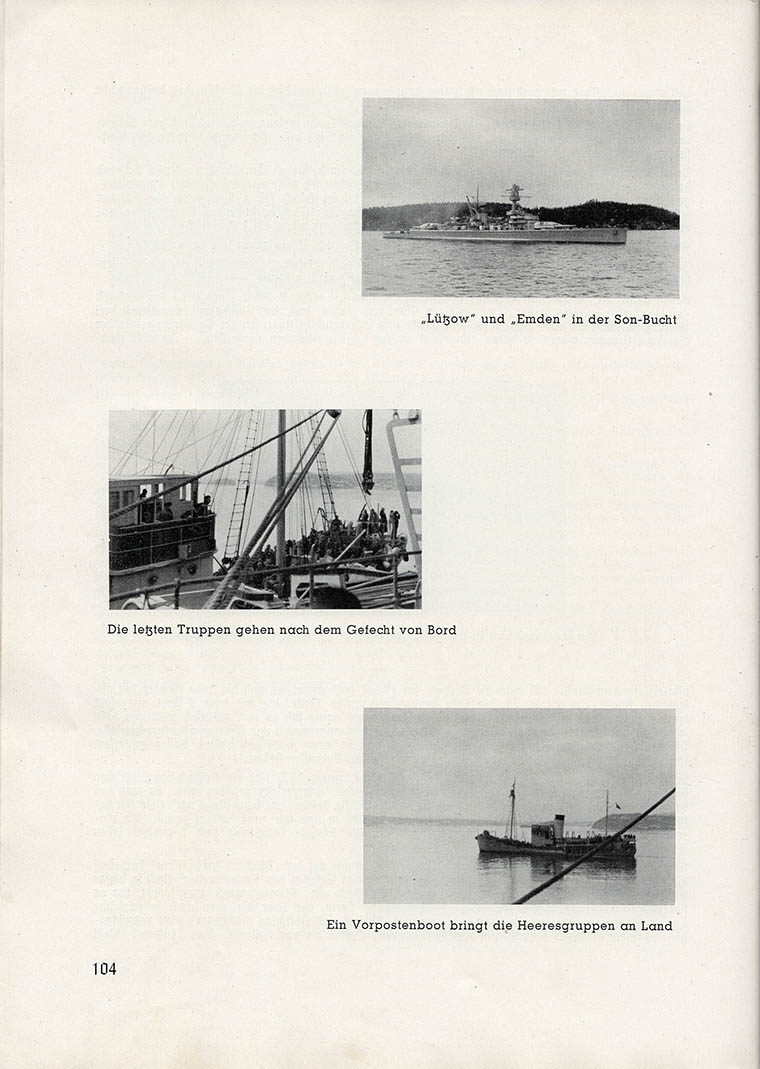
| "LÜTZOW" and "EMDEN" in Son Bay | |||
| The last troops disembark after the combat. | |||
| A Vorpostenboot brings the Army Group to land. | |||
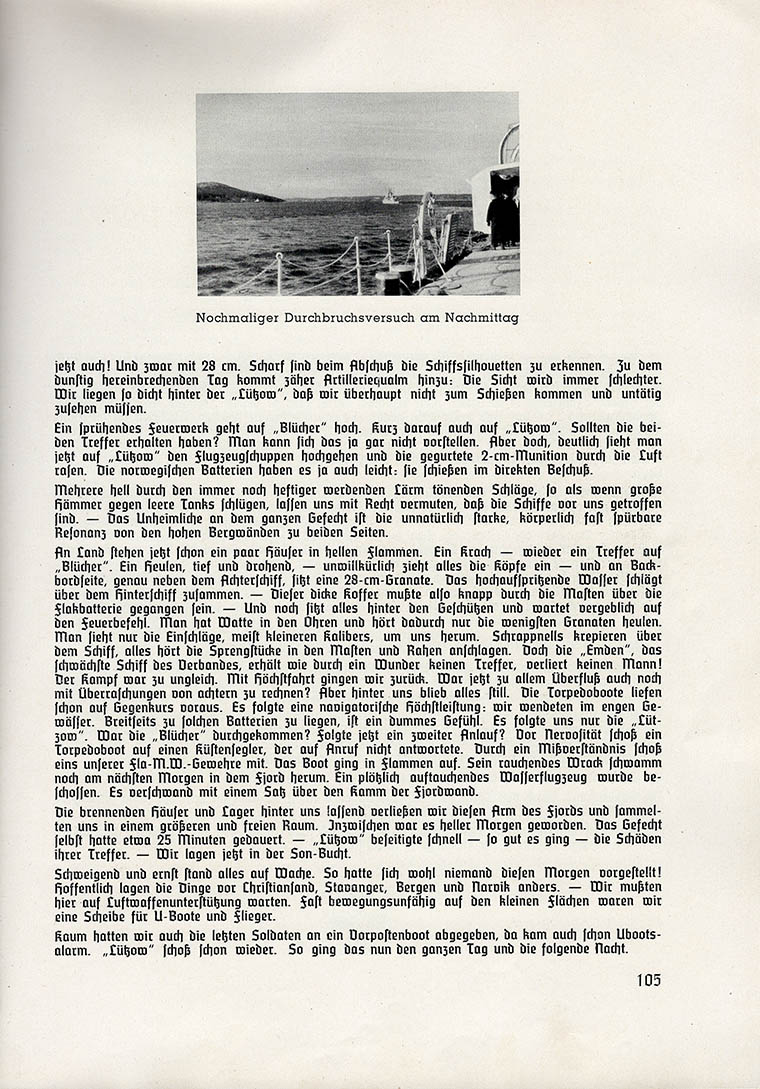
Another breakthrough attempt in the afternoon. |
|||
| now shooting too! And with 28 cm. The silhouettes of the ships can be seen clearly when they fire. In addition, we are so close behind the "LÜTZOW" that we don't even have to shoot and watch idly. | |||
| A sparkling firework goes up on "BLÜCHER". Shortly thereafter also on "LÜTZOW". Could the two have received hits? You can't even imagine that. But yes, you can clearly see "LÜTZOW" going up the aircraft hangar and the belted 2 cm ammunition racing through the air. The Norwegian batteries have it easy too: they fire directly. | |||
| Several bangs, sounding brightly through the still increasing noise, as if great hammers were banging against empty tanks, lead us to assume with good reason that the ships in front of us have been hit. - The uncanny thing about the whole battle is the unnaturally strong, almost physically palpable resonance from the high mountain walls on both sides. | |||
| A few houses are already ablaze on land. A crash - another hit on "BLÜCHER". A howl, deep and menacing - everyone involuntarily ducked their heads - and on the port side, right next to the stern, there was a 28 cm shell. The high splashing water crashes over the stern. - So this fat case must have just passed through the masts over the anti-aircraft battery. And everyone still sits behind the protection and waits in vain for the order to fire. You had cotton in your ears and you only hear a few shells howling. You only see the impacts, mostly smaller caliber, around us. Shrapnel shattered over the ship, everyone heard the explosives hitting the masts and yards. However, the "EMDEN", the weakest ship in the formation, miraculously doesn't receive a hit and doesn't lose a man! The fight was too unequal. We went back at high speed. To top it all off, were there any surprises to be expected from behind? But behind us everything stays calm. The torpedo boats were already heading in the opposite direction. A high level of navigational performance followed: we turned in narrow waters. Lying alongside such batteries is a foolish feeling. Only the "LÜTZOW" followed us. Was the "BLÜCHER" coming through? Will there be a second attempt now? Out of nervousness, a torpedo boat fired at a coastal sailing vessel who didn't answer the call. Due to a misunderstanding, one of our anti-aircraft M.W. guns also fired. The boat caught fire. Its smoking wreck was still floating around in the fjord the next morning. A suddenly appearing seaplane was shot at. It disappeared with a bound over the crest of the fjord wall. | |||
| Leaving behind the burning houses and camps we left this arm of the fjord and gathered in a larger and clearer space. In the meantime it had become brighter in the morning. The battle itself had lasted about 20 minutes. - "LÜTZOW" quickly eliminated - as well as possible - the damage caused by their hits. - We were now in Son Bay. | |||
| Everyone stood guard, silent and serious. Nobody had imagined this morning like this! Hopefully things were different ahead of Kristiansand, Stavanger, Bergen and Narvik. - We had to wait here for Luftwaffe support. Almost unable to maneuver in the small area, we were a target for U-boats and planes. | |||
| We had hardly handed over the last soldiers to an outpost boat when the U-boat alarm sounded. "LÜTZOW" fired again. This went on all day and the following night. | |||
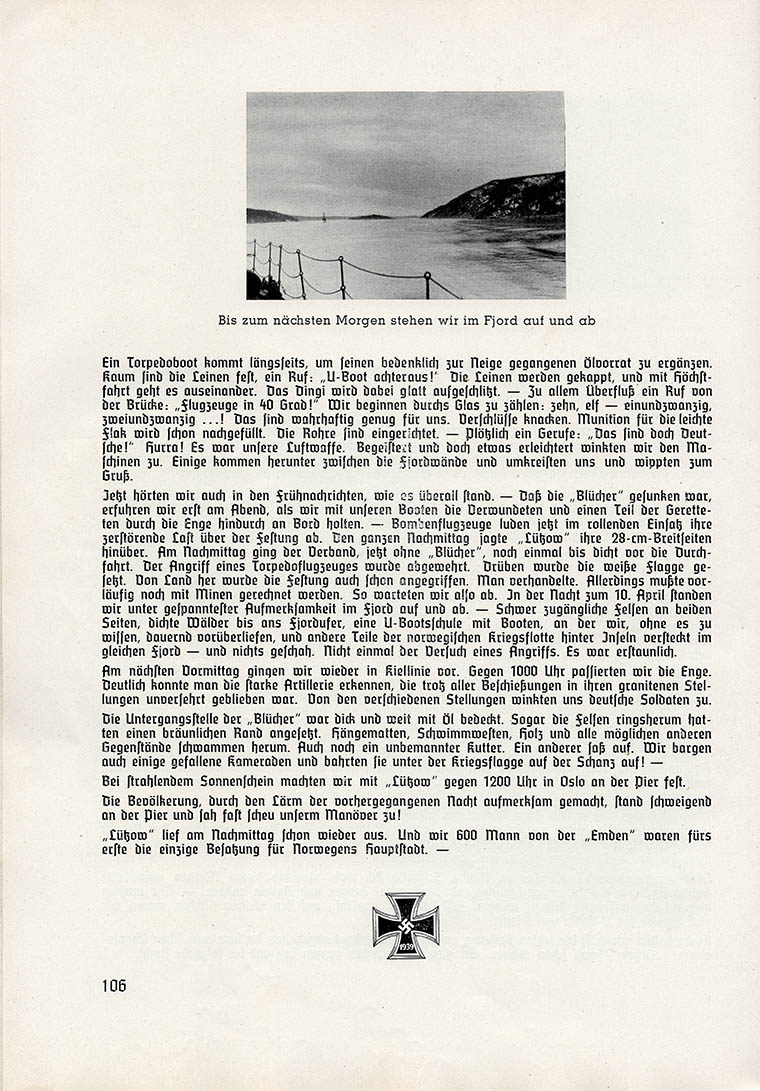
We moved back and forth in the fjord until the next morning |
|||
| A torpedo boat comes alongside to replenish its critically depleted oil supply. The lines are harbor tied, a call: "U-boat astern!" The lines are cut, and at full speed it separates. The dinghy was calmly cut loose. - To cap it all, a call from the bridge: "Planes in 40°!" We start counting through glass: ten, eleven - twenty-one, twenty-two . . . ! That is truly enough for barrels are aimed. - Suddenly a shout: "They're Germans!" Hooray! It was our Luftwaffe. Enthusiastic and yet a little relieved, we waved to the aircraft. Some come between the fjord walls and circled us, bobbing in greeting. | |||
| Now we also heard on the morning news what was going on everywhere. - We only found out that the "BLÜCHER" had sunk in the evening, when we got the wounded and some of the rescued through the strait on board with our boats. - Bombing planes now dumped their destructive load over the fortress while rolling. All afternoon "LÜTZOW" threw her 28-cm broadsides across. In the afternoon, the formation, now without "BLÜCHER", went close to the passage again. An attack by a torpedo plane was repelled. Over there the white flag was raised. The fortress has also been attacked from land. Negotiations were being made. However, mines had to be expected for the time being. So we waited. During the night of April 10th we moved up and down the fjord with the most rapt attention. - Hard-to-reach rocks on both sides, dense forests up to the Fjord bank, a U-boat school with boats that we kept passing by without knowing it, and other parts of the Norwegian war fleet hidden behind islands in the same fjord - and nothing happened. Not even attempting an attack. It was amazing. | |||
| The next morning we went back to line ahead. Around 10.00 hours we passed the narrows. The powerful artillery, which had remained intact in its granite positions in spite of all the bombardments, could be clearly seen. German soldiers waved at us from various positions. | |||
| The place where the "BLÜCHER" sank was thick and covered with oil. Even the coat around it had a brownish edge. Hammocks, life jackets, wood and all sorts of other items were floating around. Also an unmanned cutter. Another set on. We also recover some fallen comrades and laid them out on the redoubt under the war flag! - | |||
| In bright sunshine we moored "LÜTZOW" at the pier in Oslo around 12.00 hours. | |||
| The population, alerted by the noise of the previous night, stood silently on the pier and watched our maneuvers almost shyly! | |||
| "LÜTZOW" left again in the afternoon. And we 600 men from the "EMDEN" were the only crew for Norway's capital for the time being. - | |||
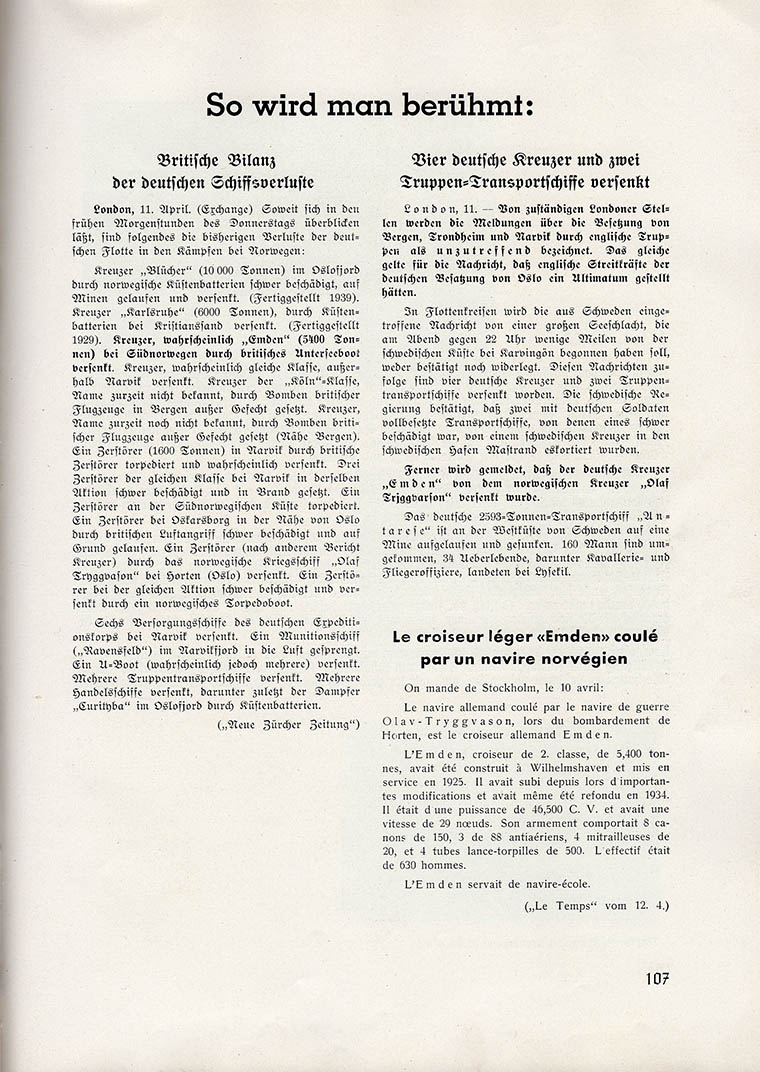
How to become famous: |
|||||||||||||||||||||||||||
British tally |
Four German cruisers and two |
||||||||||||||||||||||||||
of German ship losses |
troop transport ships sunk |
||||||||||||||||||||||||||
|
|
||||||||||||||||||||||||||
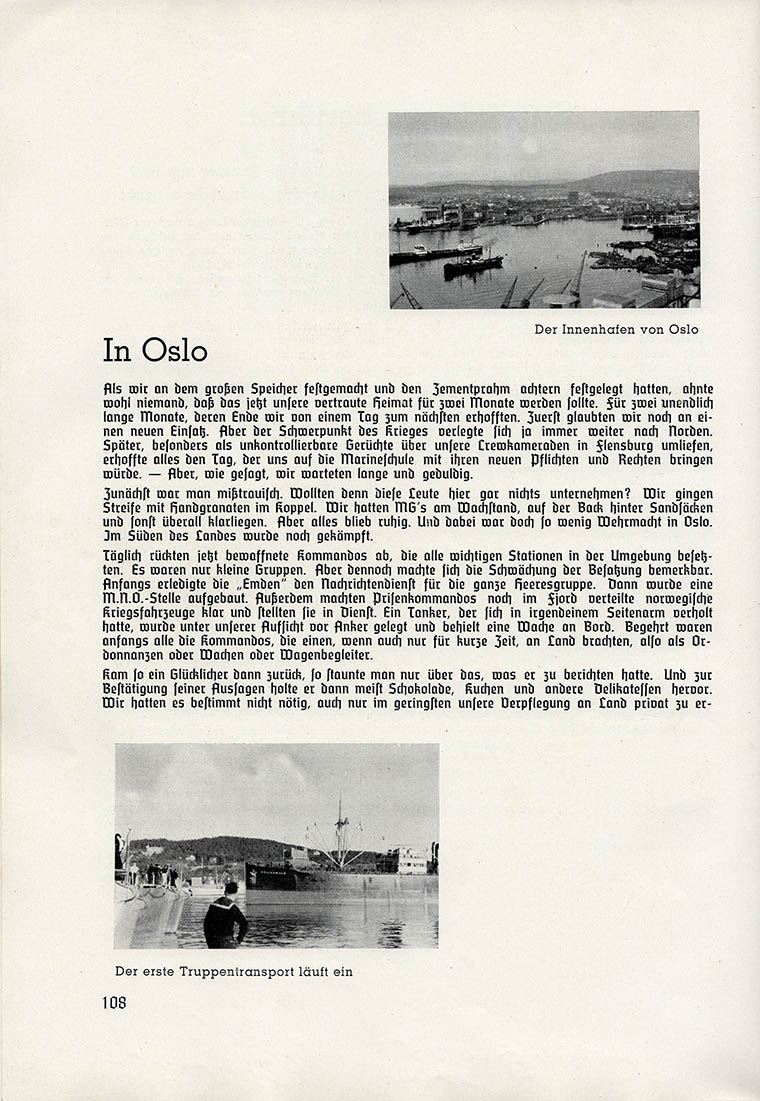
| In Oslo | |||
| When we tied up at the big granary and secured the cement barge aft, no one suspected that this was to be our familiar home for two months. For two endlessly long months, which we hoped would end from one day to the next. At first we still believed in a new mission. But the focus of the war shifted further and further north. Later, especially when uncontrollable rumors circulated about our crew mates in Flensburg, everyone hoped for the day that would bring us to the Naval School with new duties and rights. - But, as I said, we waited long and patiently. | |||
| At first one was suspicious. Didn't these people want to do anything here? We went on patrol with hand grenades on the belt. We had M.G.'s at the watch post, behind sandbags on the forecastle and ready everywhere else. However all was calm. And yet there was so little Whermacht in Oslo. Fighting is still going on in the south of the country. | |||
| Armed commandos moved off daily and occupied all the important positions in the area. There were only small groups. But by this the weakening of the crew was noticeable. Initially, the "EMDEN" provided the Intelligence Service for the entire Army Group. Then a signal position was set up. In addition, prize crews cleared and commissioned Norwegian warships that were still scattered around the fjord. A tanker who had become lost in some branch was anchored under our view and a watch kept on board. At first, all the commandos brought ashore, even if only for a short time, were in demand, i.e. as orderlies or guards or truck attendants. | |||
| When such a happy person came back, one was amazed at what he had to report. And to confirm his expenses, he usually brought out chocolate, cakes and other delicacies. We certainly didn't need to supplement our catering on land privately, even in the slightest. | |||
| The first troop transport arrives. | |||
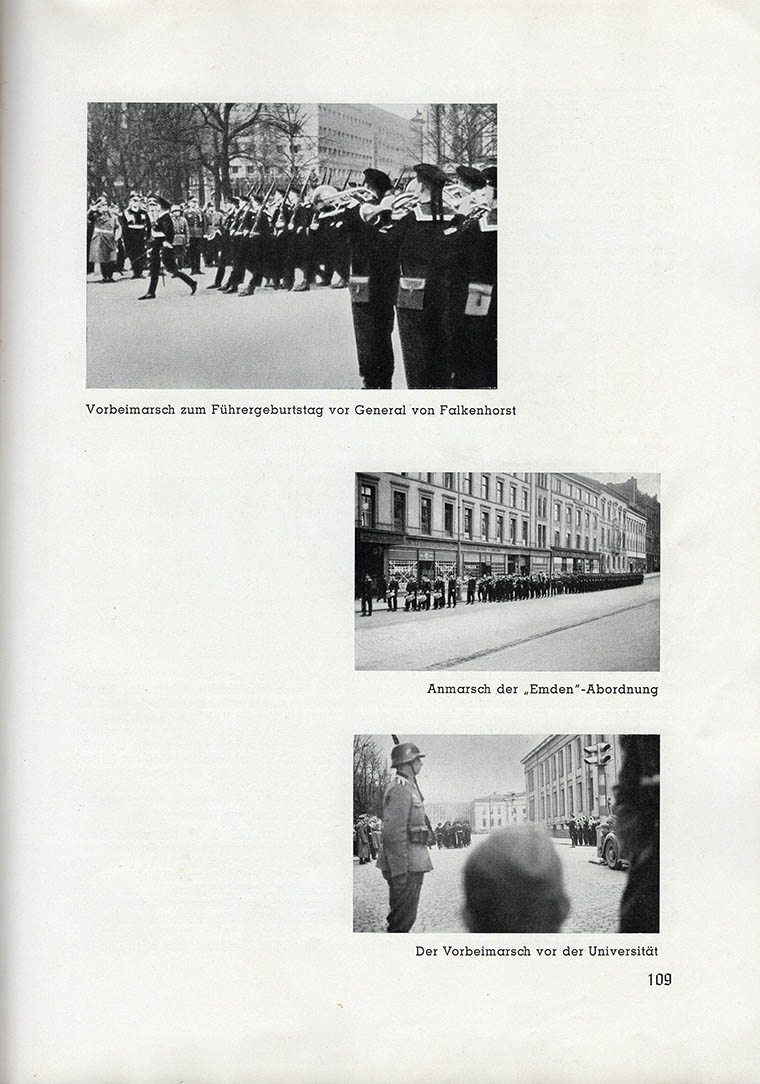
| The Führer's birthday parade before the Commanding General v. Falkenhorst. | |||
| Arrival of the "EMDEN" delegation. | |||
| The parade before the University | |||
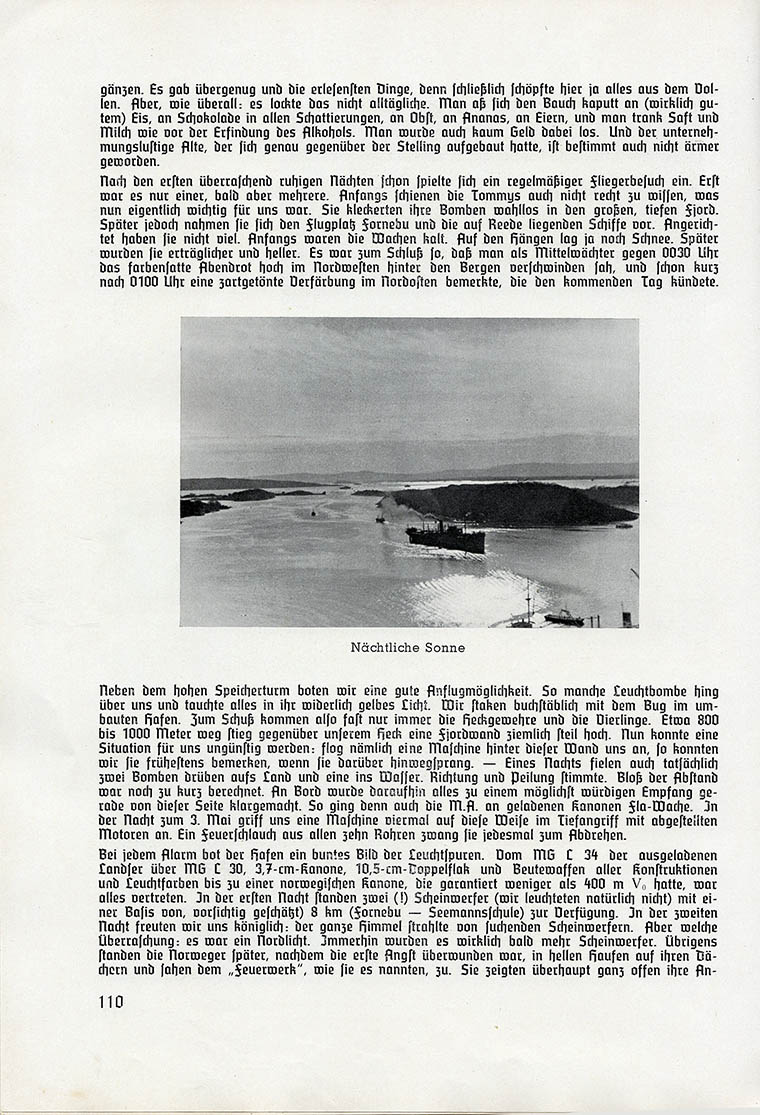
| in the slightest. There was more than enough and the most exquisite things, because after all, everything was created from the abundance here. But, as everywhere, it was the non-everyday things that attracted one. People ate their fill of (really good) ice cream, all kinds of chocolate, fruit, pineapple, and eggs, and they drank juice and milk as before the invention of alcohol. You hardly got rid of any money. And the enterprising old man who had set up his place exactly opposite the staging must not have gotten any poorer either. | |||
| After the first surprisingly quiet nights, a regular flight visit was established. At first there was only one, but soon there were several. At first the Tommys didn't seem to want to, which was actually important for us. They dropped their bombs indiscriminately into the big, deep fjord. Later, however, they took on the Fornebu airfield and the ships lying in the Roadstead. They haven't done much. At first the watches were cold. There was still snow on the slopes. Later they became more bearable and brighter. In the end, as a midnight watch, around 00.30 hours you saw the richly colored sunset disappear behind the mountains high in the north-west, and shortly after 01.00 hours you noticed a faded discoloration in the north-east, which heralded the coming day. | |||
Nocturnal sun |
|||
| Next to the high storage tower, we offered a good approach opportunity. So many flares hung over us and bathed everything in their disgusting yellow light. We literally stuck our bows in the converted harbor. The rear guns and the quadruplets almost always got a shot. About 800 to 1000 meters away, opposite our stern, a fjord wall climbs quite steeply. Now a situation could become unfavorable for us: if an aircraft flew at us behind this wall, we could only notice it when it jumped over it. - One night two bombs actually fell over there on land and one in the water. Direction and bearing correct. Only the distance was calculated too short. On board, everything was then made ready for a reception that was as dignified as possible, especially from this side. So the M.A. went to anti-aircraft Watch with loaded guns. During the night of 3 May, a plane attacked us four times in this way with the engines switched off. A fire hose from all ten tubes forced them to turn away every time. | |||
| With every alarm, the port offered a colorful picture of the tracers, from the MG C 34 of the disembarked soldiers to the MG C 30, 3.7 cm gun, which was guaranteed to have less than 400 meters Vo, everything was represented. On the first night there were two (!) searchlights (of course we didn't illuminate) with a base of, conservatively estimated 8 km (Fornebu - Seaman's School) available. On the second night we were royally happy: the whole sky shone with searching spotlights. But what a surprise: it was Northern Lights. After all, it really soon became more searchlights. Incidentally, the Norwegians stood later, after the initial fear had been overcome, in bright groups on their roofs and watched the "fireworks", as they called it. They even openly expressed their view: | |||
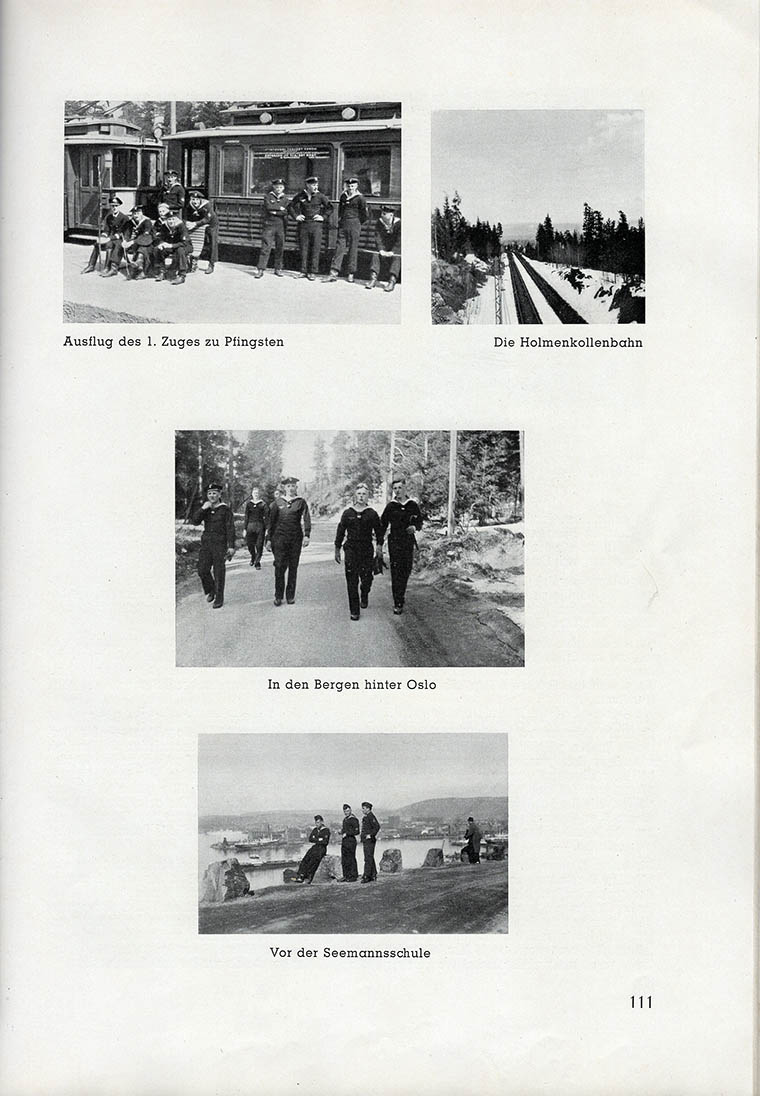
| Excursion of the 1st train on Pentecost. The Holmenkollen Railway | |||
On the mountain behind Oslo |
|||
In front of the Seaman's School |
|||
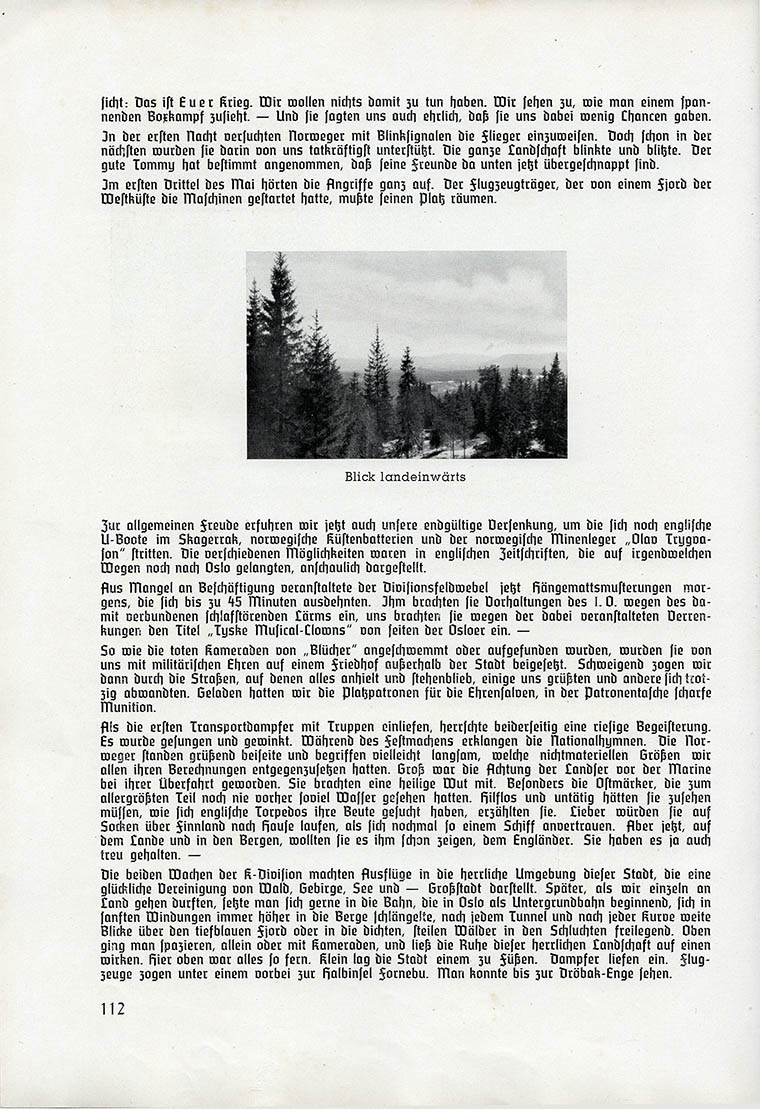
| That is your war. We don't want anything to do with it. We watch as you watch an exciting boxing match. - And they said, and also honestly, that they gave us few chances. | |||
| During the first night, Norwegians tried to instruct the planes with flashing signals. But already in the next one they were actively supported by us. The whole landscape twinkled and flashed. Good Tommy must have figured his friends down there had gone mad. | |||
| In the first third of the time, the attacks stopped altogether. The aircraft carrier, whose aircraft had taken off from a west coast fjord, had to vacate its place. | |||
View landwards |
|||
| To everyone's delight, we now also learned of our final sinking, that English submarines in the Skagerrak, Norwegian coastal batteries and the Norwegian minelayer "OLAF TRYGGVASON" were still fighting. | |||
| For want of work, the Division Sergeant now organized hammock reviews in the mornings, which lasted up to 45 minutes. They broke reproaches of the First Officer because of the sleep-disturbing noise associated with it, they brought us the title "Tzske Musical-Clowns"on the part of the Osloers because of the contortions that were caused. - | |||
| As the dead comrades of "BLÜCHER" were washed ashore or found, they were buried by us military honors in a cemetery outside the city. We then walked in silence through the streets, where everything stopped and came to a stand still, some greeting us and others defiantly turning away. We had loaded the blank cartridges for the honorary salvo, and there was live ammunition in the cartridge pouch. | |||
When the first transport steamers with troops rolled in, there was enormous enthusiasm on both sides. There was singing and waving. The National Anthems were played during the mooring. The Norwegians stood aside and greeted us, perhaps slowly realizing what immaterial quantities we had as opposed to all their calculations. The respect of the soldiers for the Navy had grown during their crossing. They brought some holy anger with them. Especially the Ostmarkers [Austrians], who for the most part had never seen so much water before. They said they had to watch helplessly and inactively as English torpedoes sought their prey. They would sooner walk home in their socks than face another one like that again, the Englishman. You have also kept it true. [?] |
|||
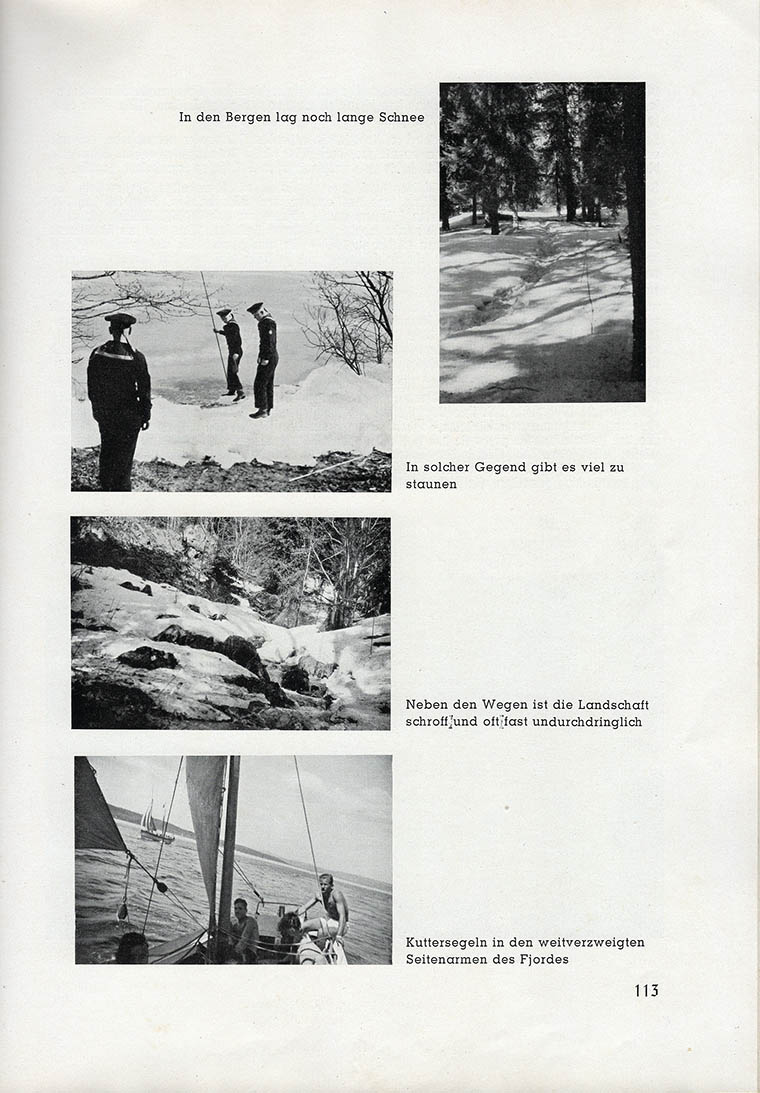
| In Bergen there was still snow for a long time. | |||
| There is much to marvel at in such a region. | |||
| Next to the paths, the landscape is | |||
| rugged and often almost impenetrable | |||
| Cutter sailing in the widely branched | |||
| side arms of the fjord. | |||
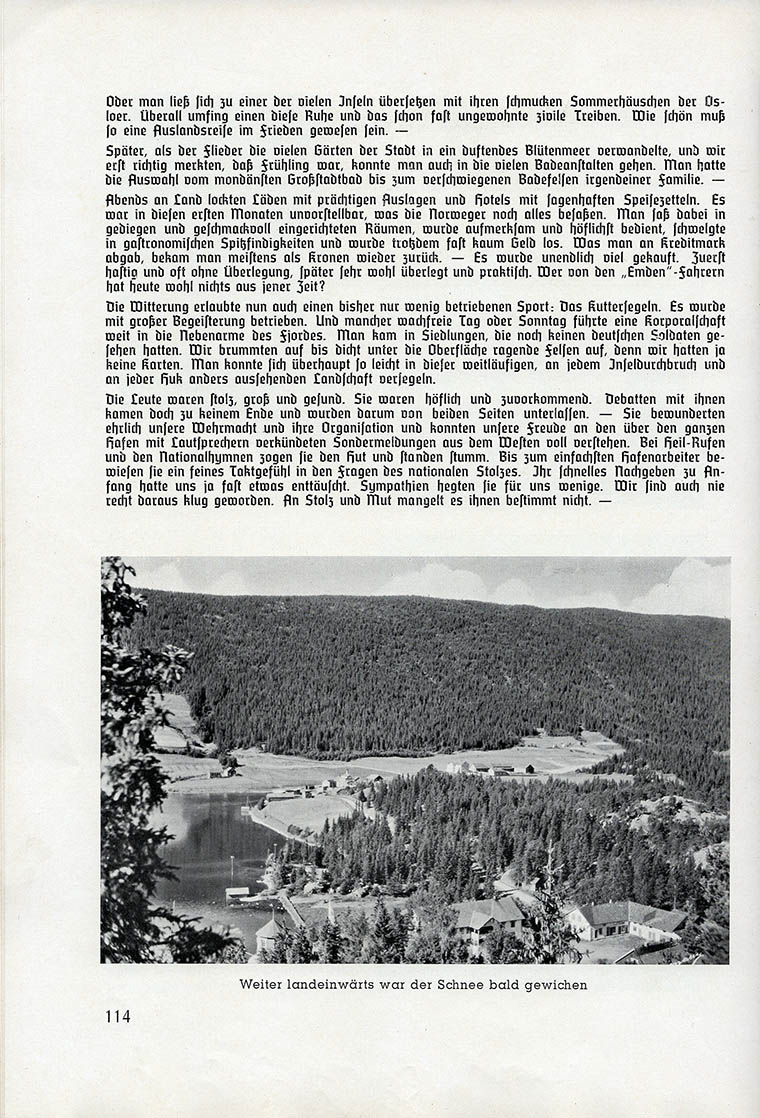
| Or you could be taken to one of the many islands with their pretty summer houses of the Osloers. Everywhere you were surrounded by this calm and the almost unfamiliar civil activity. How nice must have been such a trip abroad in the open air. | |||
| Later, when the aircraft turned the city's many gardens into a sea of dusty blossoms and we really noticed that it was spring, we could also go to the many bathing institutions. You could choose from the most fashionable big city pool to the secluded bathing rock of some family. - | |||
| In the evenings ashore, shops lured with magnificent displays and hotels with fabulous menus. In those first few months it was unimaginable what the Norwegians still owned. You sat in dignified and tastefully furnished rooms, were served attentively and politely, indulged in gastronomic subtleties and still got rid of almost no money. What you gave in Credit Marks, you usually got back in the form of Kroner. - An infinite amount was bought. At first vigorously and often without thought, later very well thought out and practical. Which of the "EMDEN" riders has nothing from that time today? | |||
| The weather now also allowed for a sport that had only been rarely practiced up to then: cutter sailing. It was run with great enthusiasm. And many a watch-free day or Sunday led a Corporal's Command far into the tributaries of the fjord. One came to settlements that had not yet seen a German soldier. We bumped onto rocks that rose just below the surface, for we had no charts. It was actually so easy to sail in this vast landscape, which looked different at every island breakthrough and at every headland. | |||
| The people were proud, tall and healthy. They were polite and accommodating. Debates with them never came to an end and are therefore omitted from both sides. - They honestly admired our Wehrmacht and their organization and could fully understand our joy at the special reports from the West announced over loudspeakers throughout the port. With calls for salvation and the national anthems, they took off their hats and stood silent. Down to the humblest docker, they demonstrated his tact in matters of national pride. We were almost a bit disappointed by their quick yielding at the beginning. They had sympathy for the few of us. We never really made any sense of it either. They certainly do not lack pride and courage. | |||
Further inland the snow was soon gone. |
|||
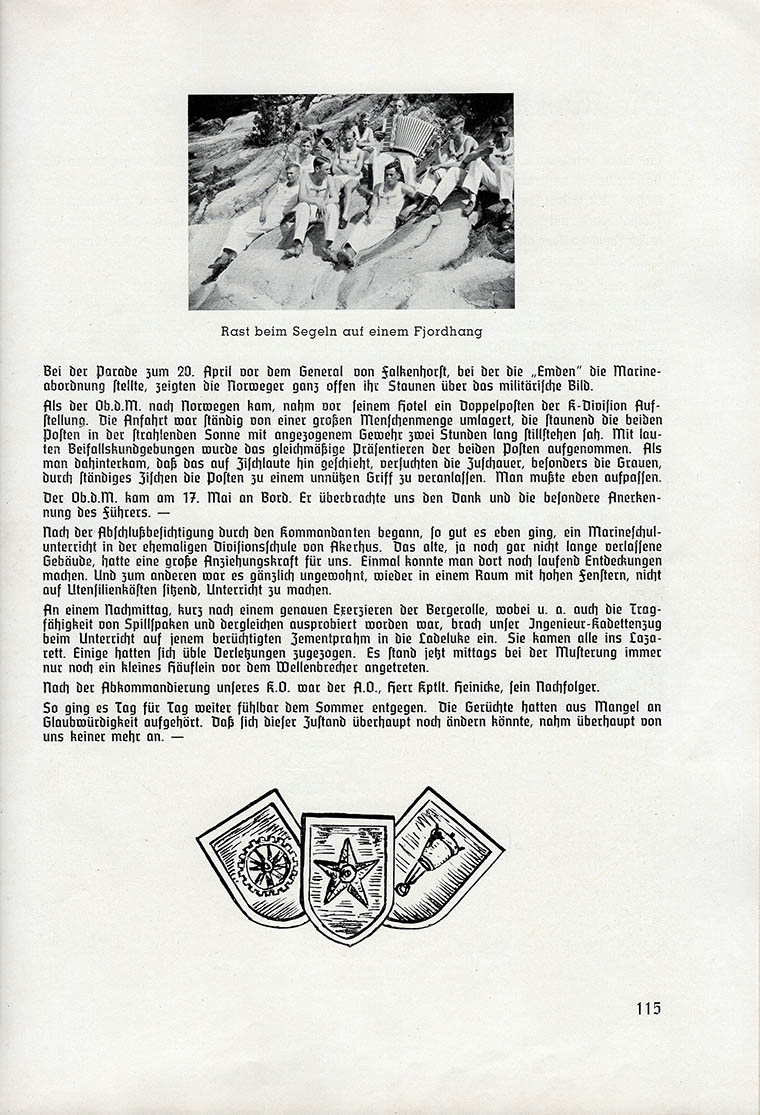
Rest while sailing on a fjord hillside. |
|||
| During the 20 April parade before General v. Falkenhorst, where the "EMDEN" provided the naval delegation, the Norwegians openly showed their astonishment at the military picture. | |||
| When the Ob.d.M. came to Norway, a double post of the Cadet-Division lined up in front of his hotel. The approach was constantly surrounded by a large crowd of people, who were amazed to see the two guards standing still for two hours in the bright sun with their rifles drawn. The uniform presentation of the two posts was greeted with loud applause. When it was found out that this happens in response to hissing sounds, the spectators, especially the grays, tried. by constant hissing to induce the posts to useless grabs. You just had to be careful. | |||
| The Ob.d.M. came on board on 17 May. He brought us the thanks and the special appreciation of the Führers | |||
| After the final inspection by the Kommandanten, a Naval School course began as well as possible in the former Division School in Akerhus. The old building, not long abandoned, had a great attraction for us. On the one hand, you could still make discoveries there, and on the other hand, it was completely unusual to be doing lessons in a room with high windows, not sitting on utensil cases. | |||
| One afternoon, shortly after a detailed exercise of the load pulley, where among others after the carrying capacity of handspikes and the like had also been tested, our Engineering Cadet Platoon broke through the hatch of that notorious cement barge while teaching. They all went to the hospital. Some had sustained serious injuries. At noon, there was always only a small group standing in front of the breakwater for the inspection. | |||
| After the ordering away of our Cadet Officer, the Artillery Officer, Herr Kptlt. Heinicke, was his successor. | |||
| Day after day, we felt the arrival of summer. The rumors had stopped for lack of credibility. None of us assumed that this state of affairs would change at all. - | |||
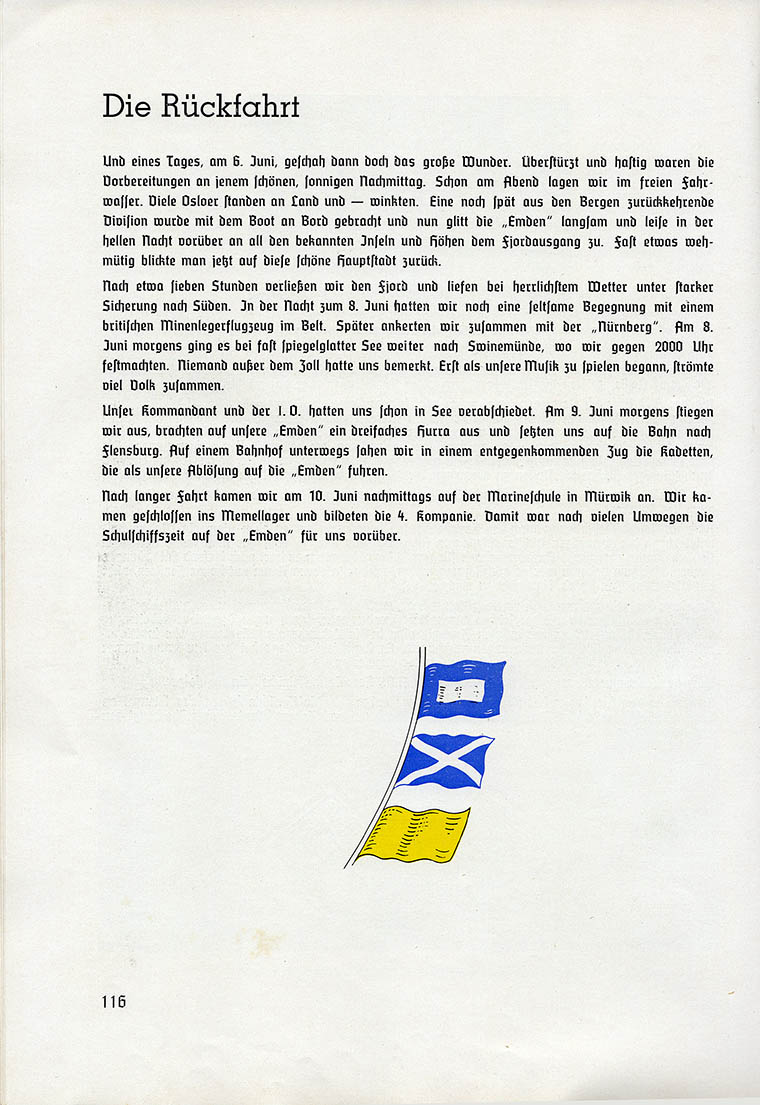
| The Journey Back | |||
| And one day, on June 6th, the great miracle happened. The preparations on that beautiful sunny afternoon were rushed and hasty. Already in the evening we were in the free channel. Many Osloers stood ashore and waved. A Division returning late from the mountains was brought on board by boat and now the "EMDEN" glided slowly and quietly in the bright night past all the well-known islands and up to the fjord exit. Almost wistfully one looked back on this beautiful capital. | |||
| After about seven hours we left the fjord and headed south in glorious weather with strong protection. On the night of 8 June we had another strange encounter with a British minelaying plane in the Belt. Later we anchored together with the "NÜRNBERG". On the morning of 8 June, the sea was almost as smooth as glass and we continued to Swinemünde, where we moored at around 20.00 hours. Nobody but customs had noticed us. Only when our music began to play did many people flock together. | |||
We had already said goodbye to our Kommandant and the First Watch Officer at sea. We disembarked on 9 June in the morning, gave our "EMDEN" a triple cheer and sat down on the train to Flensburg. At a station on the way, we saw the Cadets in an oncoming train, who drove to the "EMDEN" as our relief. |
|||
| After a long journey we arrived at the naval school in Mürwik on the afternoon of 10 June. We came together to the Memel camp and formed the 4th Company. After many detours, the training ship time on the "EMDEN" was over for us. | |||
Papa Mike Quebec signal flags |
|||
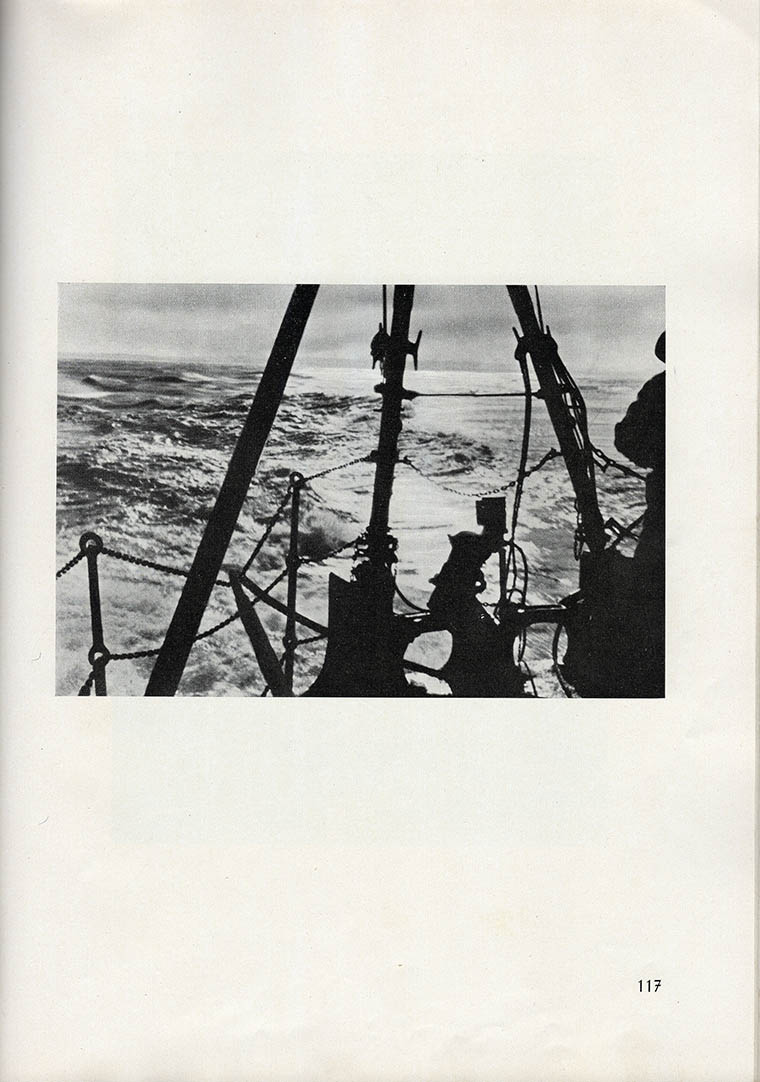

Blank page |
|||
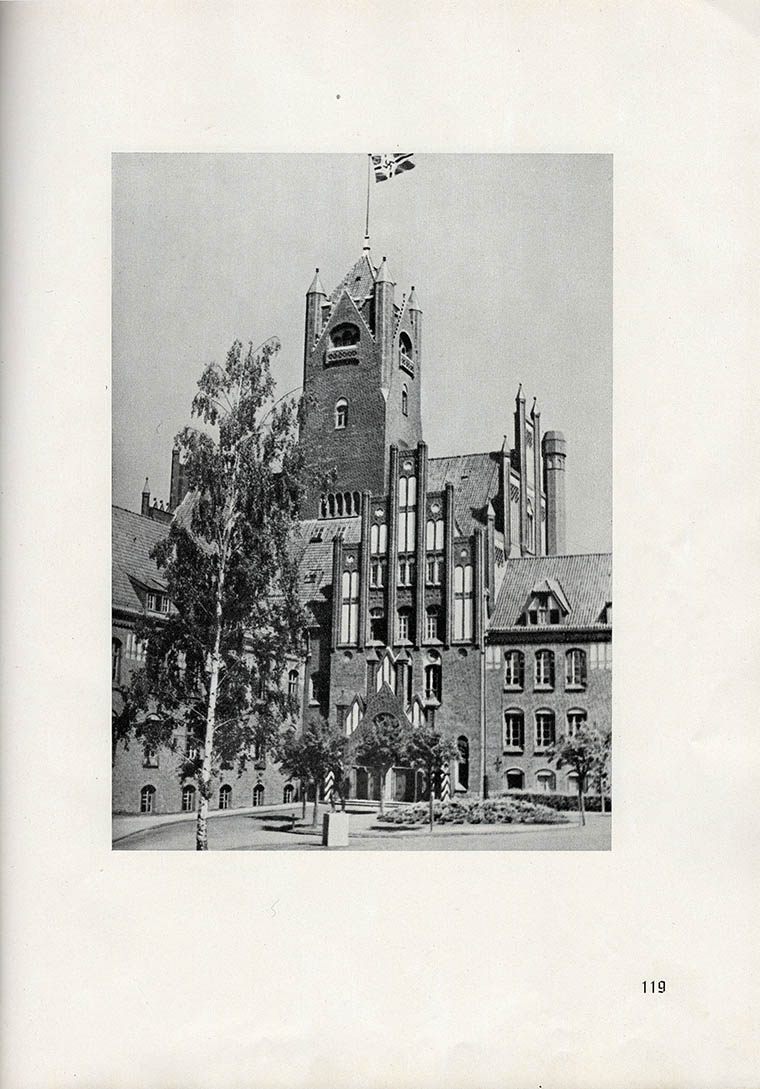
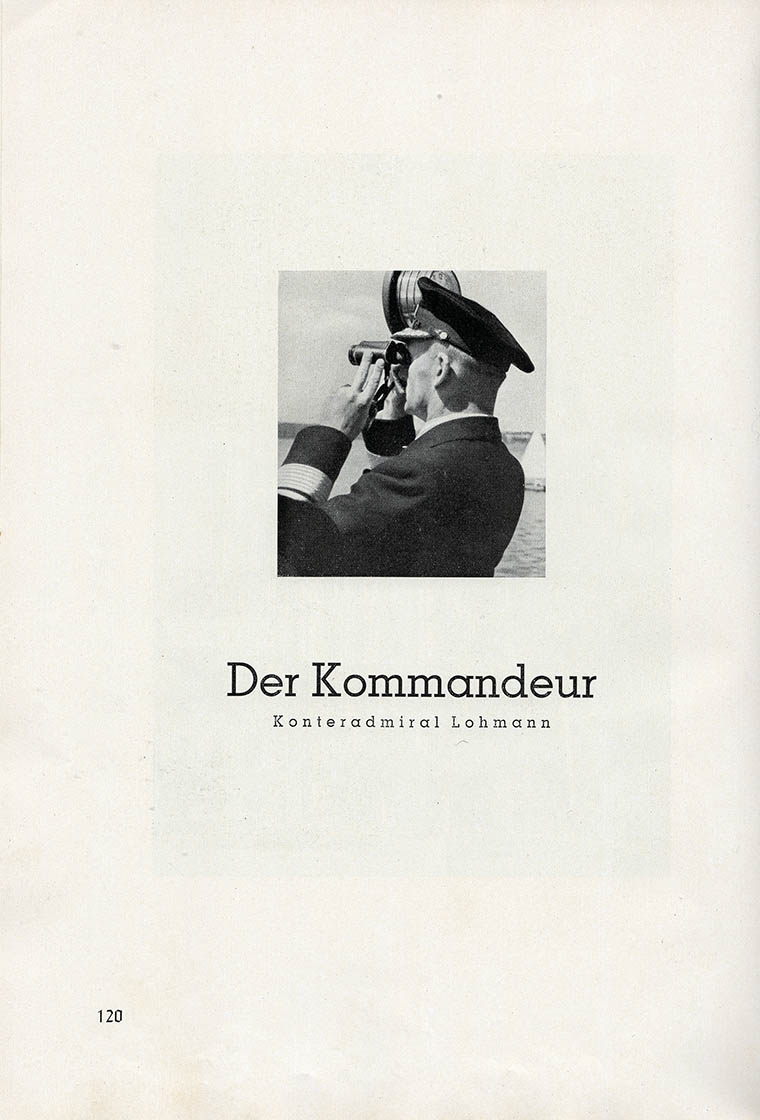
The Commander |
|||
Konteradmiral Lohmann |
|||
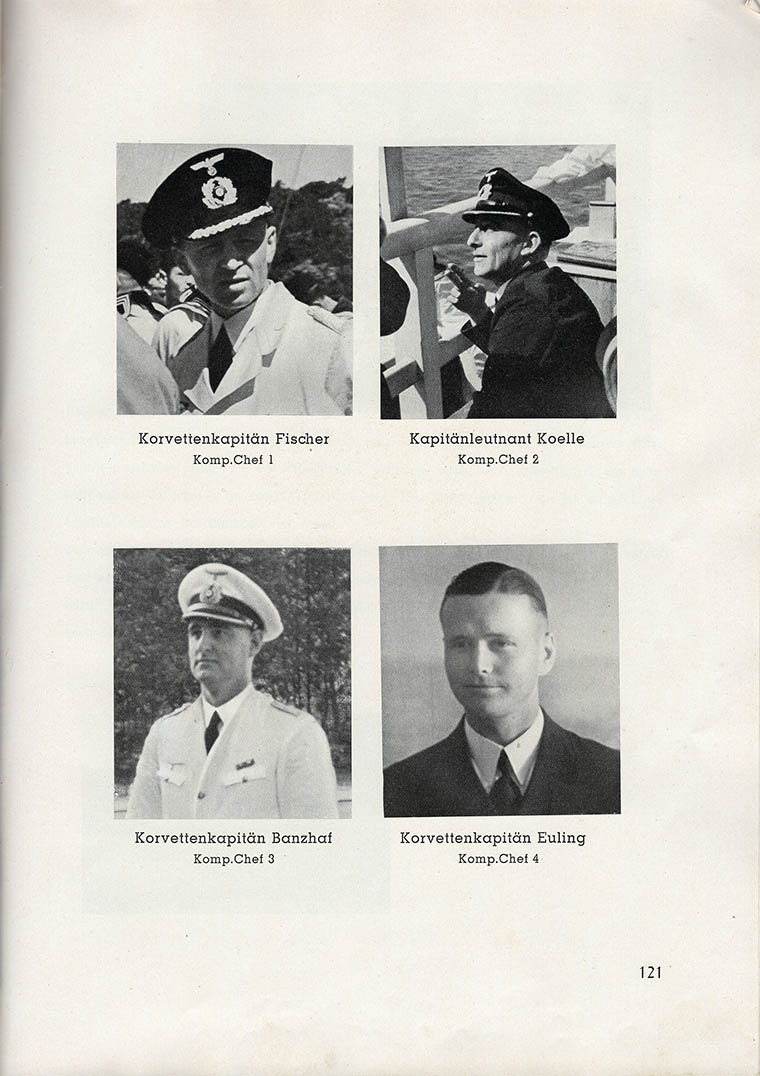
| Korvettenkapitän | Kapitänleutnant | |||
| Company Commander 1 | Company Commander 2 | |||
| Korvettenkapitän | Korvettenkapitän | |||
| Company Commander 3 | Company Commander 4 | |||
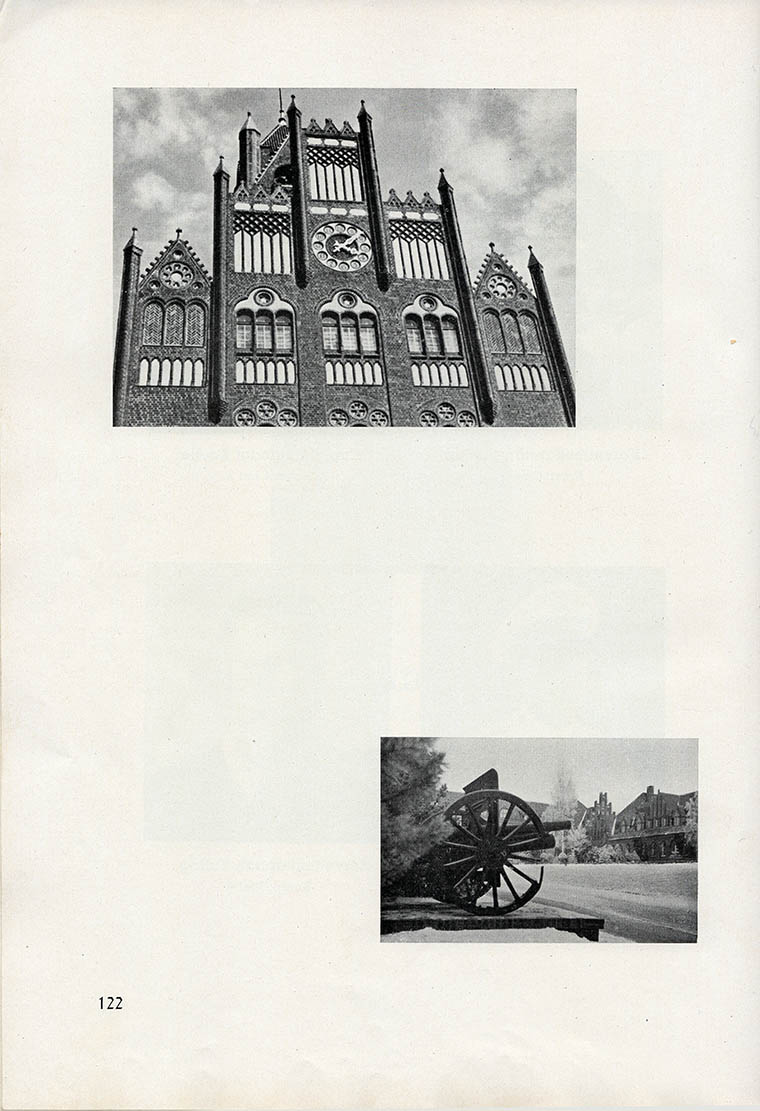
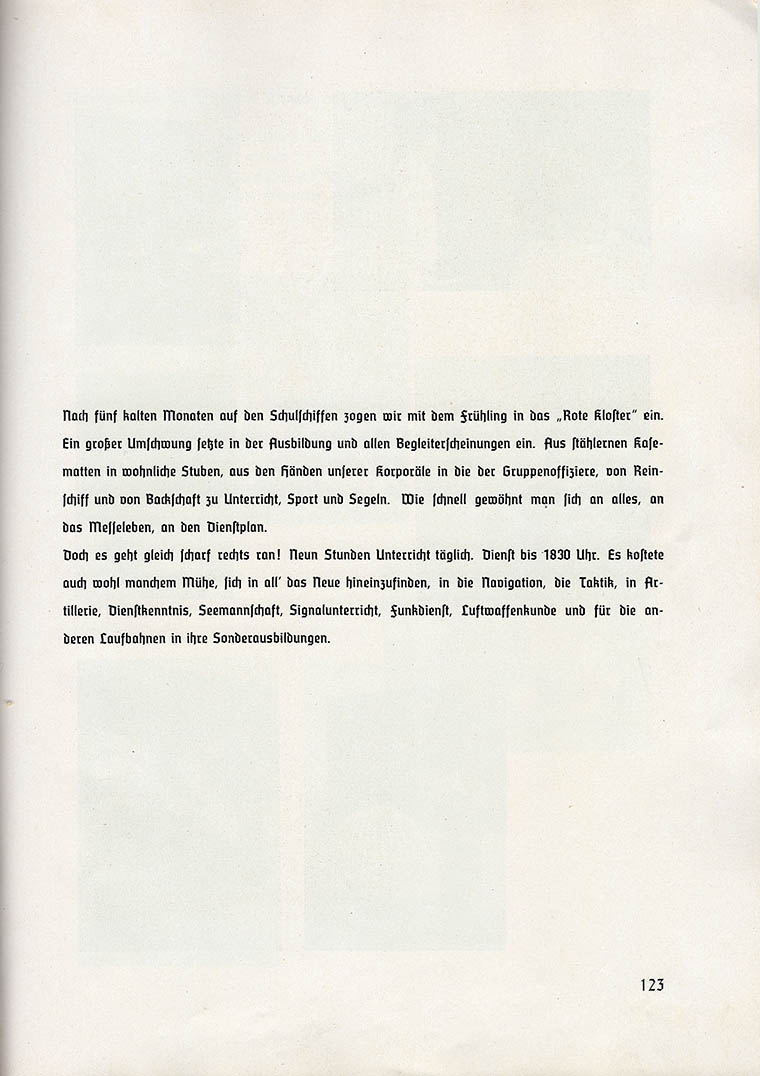
| After five cold months on the school ships, we moved into the "Red Monastery" with Spring. A major change began in the training and all the accompanying effects. From steel case mates to cozy living rooms, from the hands of our Corporals to those of the Group Officers, from clean ship and table manners, sports and sailing. How quickly do you get used to everything, to wardroom life, to the duty roster. | |||
| But it's just a sharp turn to the right! Nine hours of lessons a day. Tuesday until 18.30 hours. It also cost a lot of effort to get used to all the new things, to navigation, tactics, artillery, service knowledge, seamanship, signals instruction, radio service, Luftwaffe science and for the other careers in their special training. | |||
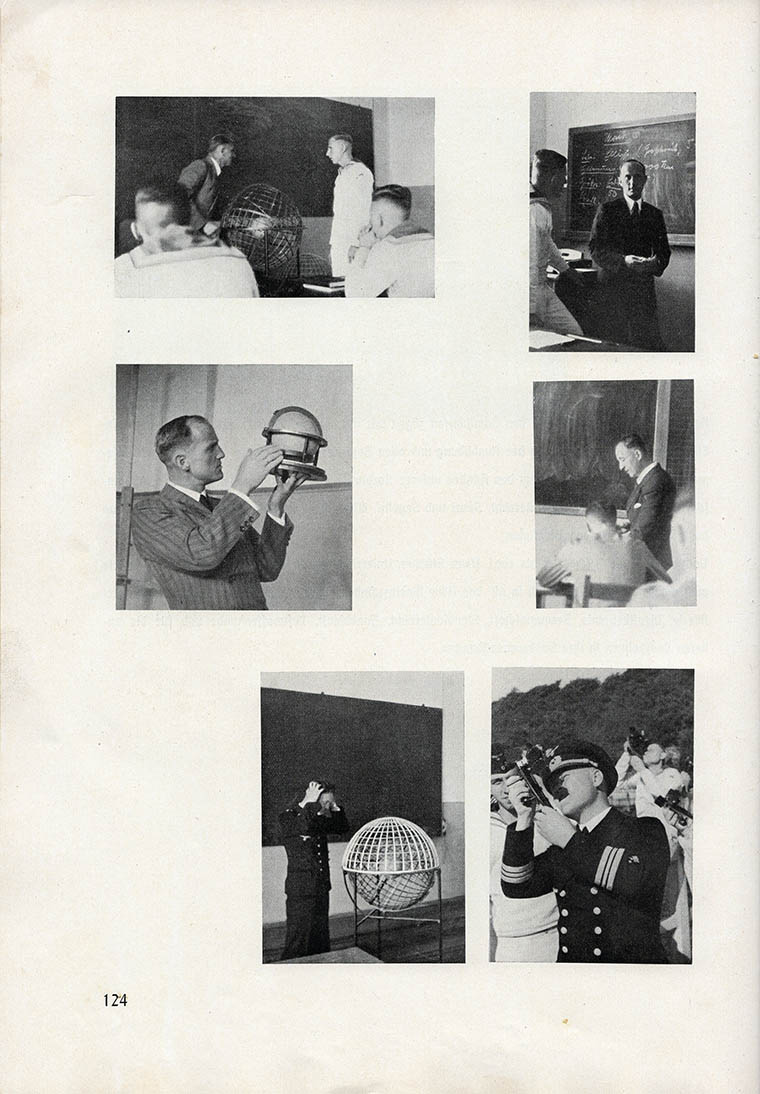
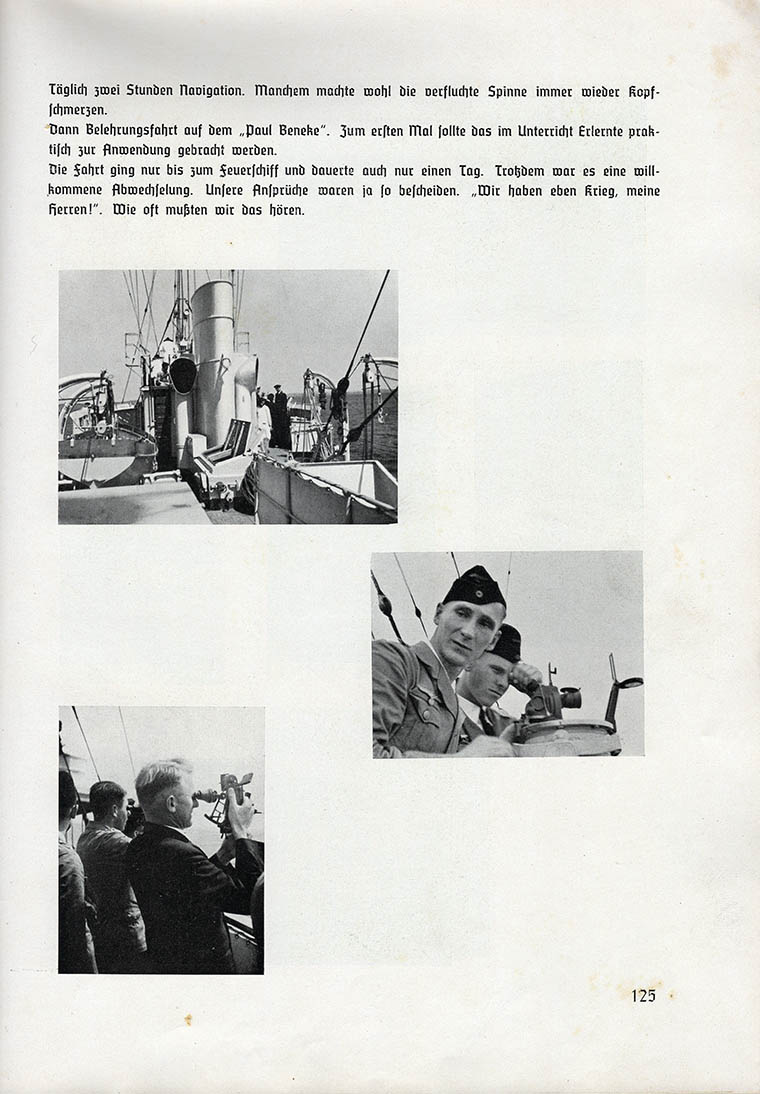
| Two hours of navigation daily. The cursed spider [sextant] always gave some people a headache. | |||
| Then instruction ride on the "PAUL BENEKE". For the first time, what was learned in class was to be put into practice. | |||
| The cruise only went as far as the lightship and lasted only one day. Still, it was a welcome change. Our demands were so modest. "We're at war, gentlemen!" How often have we had to hear that. | |||
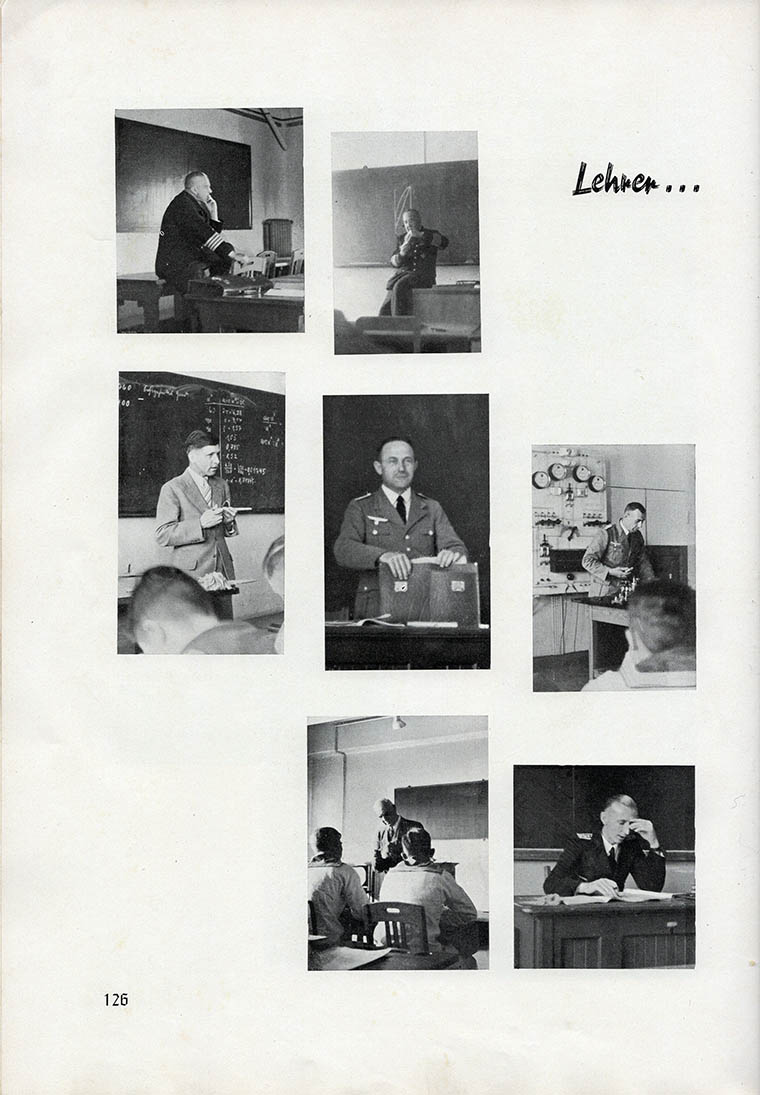
| Teacher . . | |||
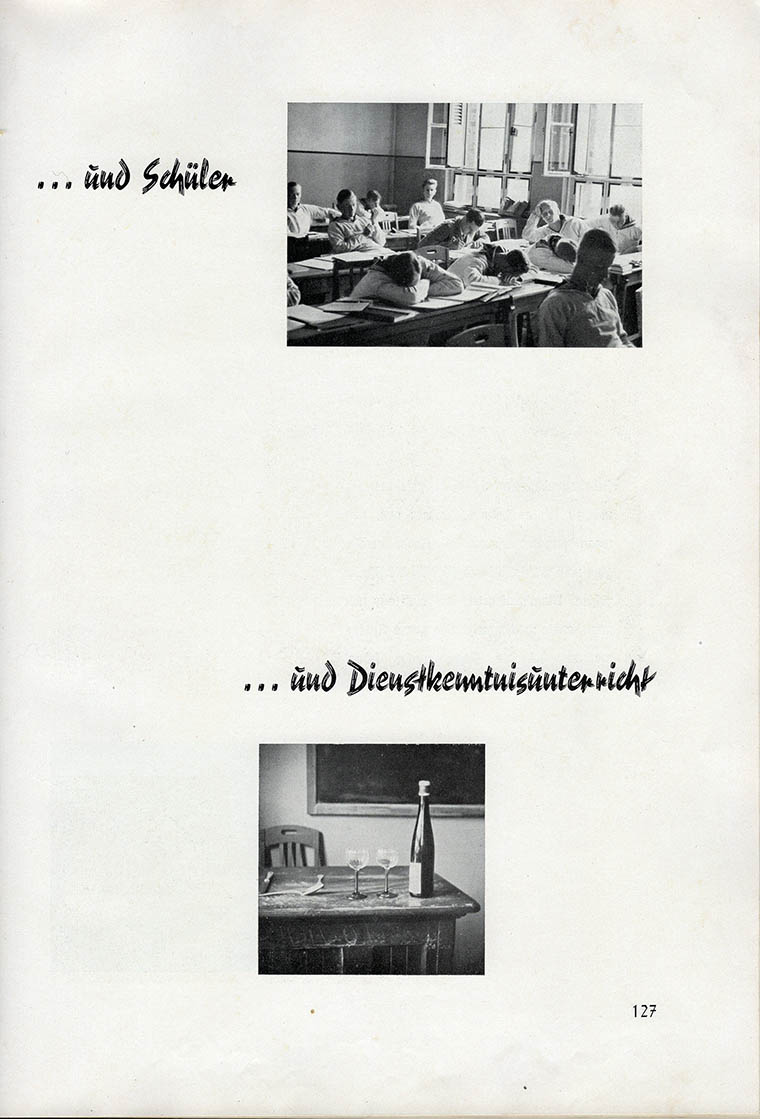
| . . . and Students | |||
| . . . and service knowledge classes | |||
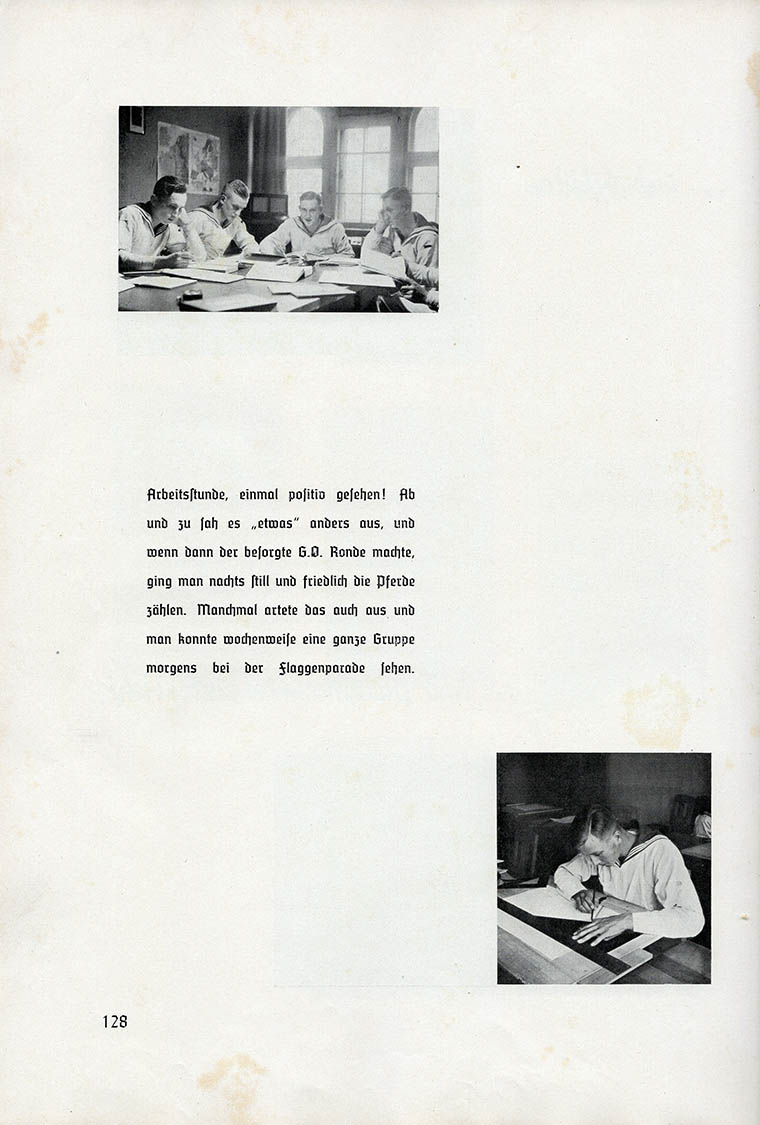
| Hours of work, once seen positively! From time to time it looked "a bit" different, and when the worried G.O. made rounds, they went quietly and peacefully counting the horses at night. Sometimes that was the case and every week you could see a whole group at the flag parade in the morning. | |||
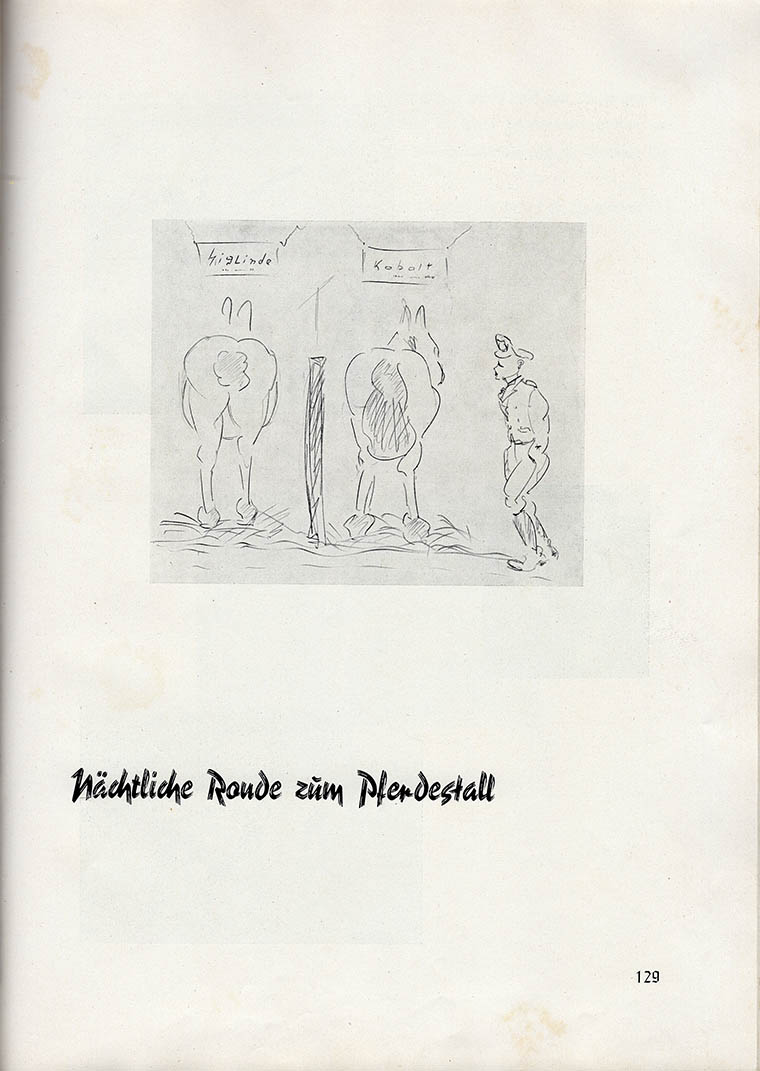
| Nightly tour of the stables | |||
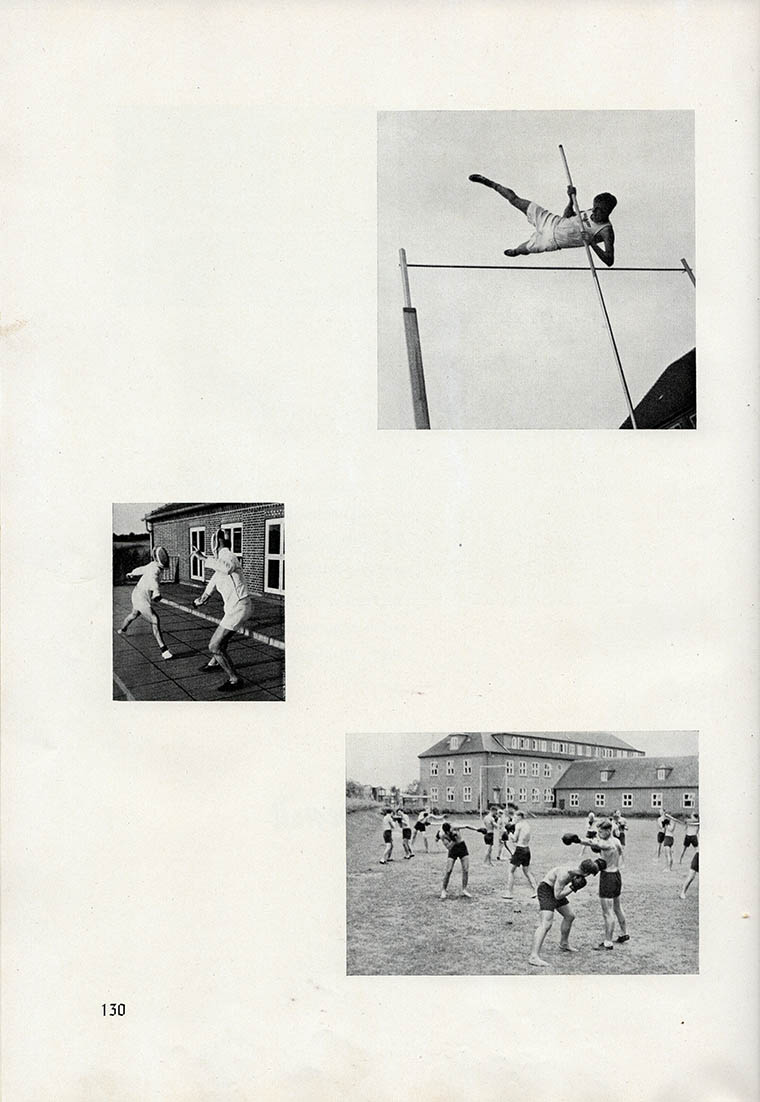
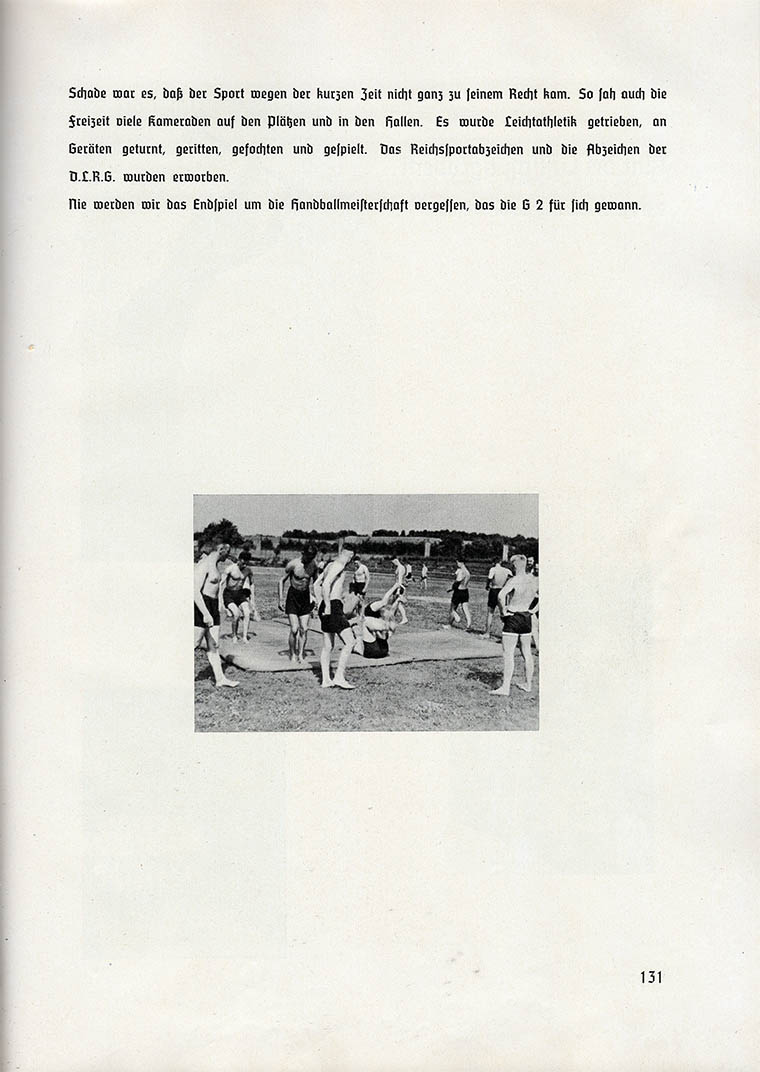
| It was a pity that sports didn't quite get their due because of the short time. Free time also saw many comrades on the squares and in the halls. Athletics was practiced, gymnastics, kicking, fencing and games were performed on apparatus. The Reich Sports Badge and the badges of the D.L.R.G. were acquired. | |||
| We will never forget the final and the handball championship, which the G 2 won. | |||
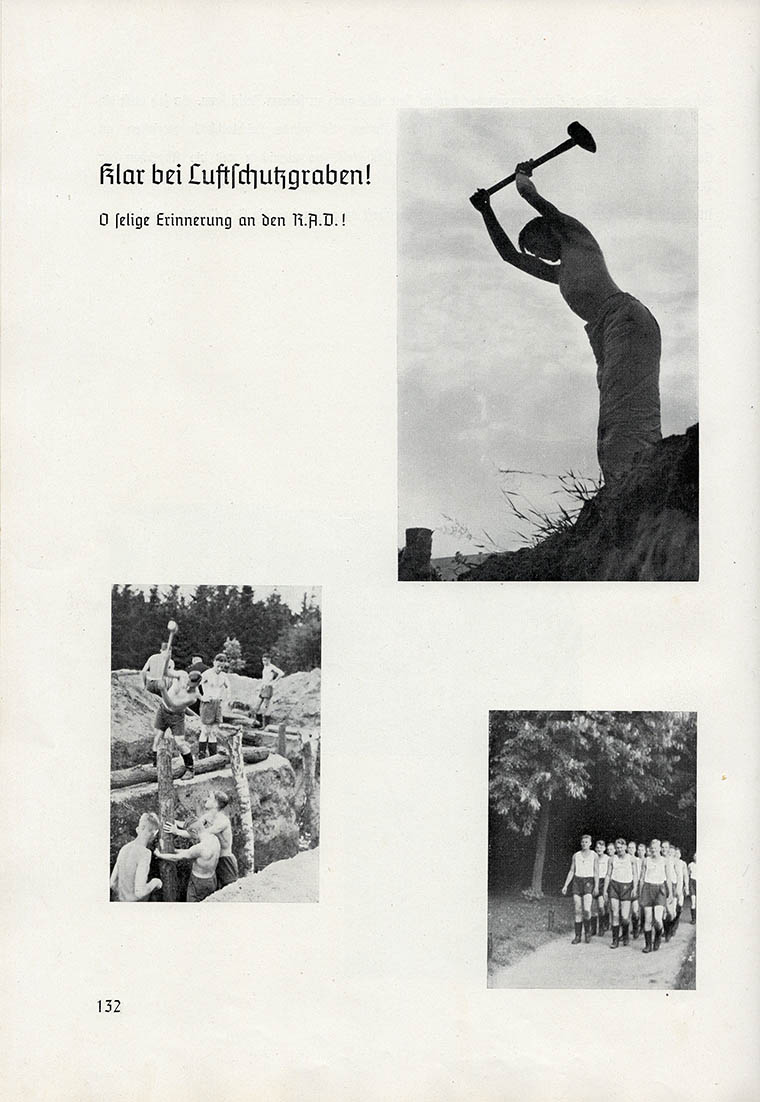
| Ready at air raid trench! | |||
| O blessed memory of the R.A.D. | |||
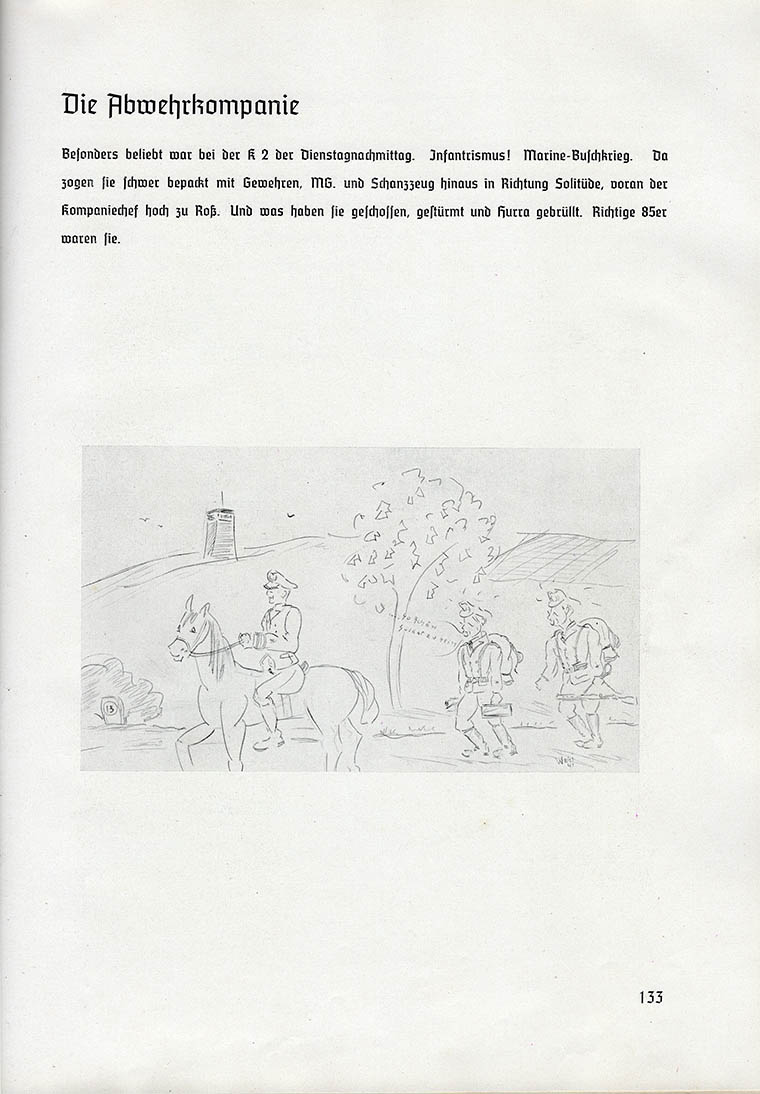
| The Defense Company | |||
| Tuesday afternoon was particularly popular with the K 2. Infantry! Naval bush war. There they went, loaded with guns, machine guns and entrenchment gear out in the direction of Solitude, led by the Company Commander on horseback. And what did they shoot, storm and yell hurray. They were real 85ers. | |||
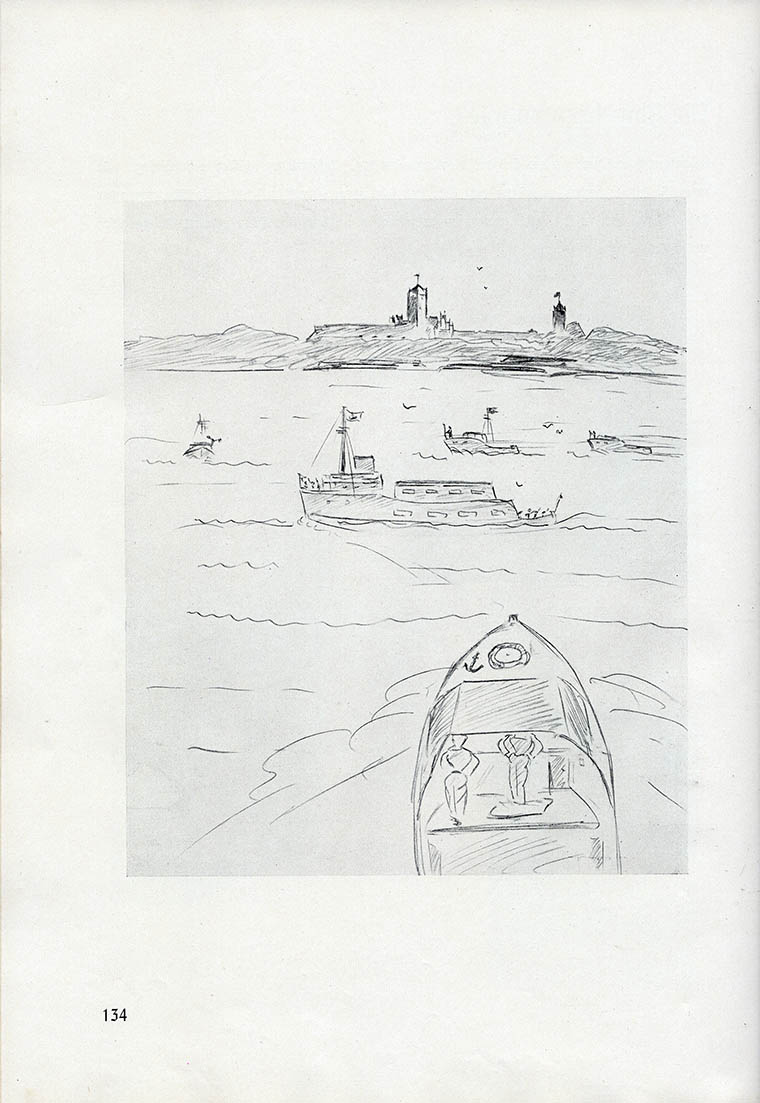
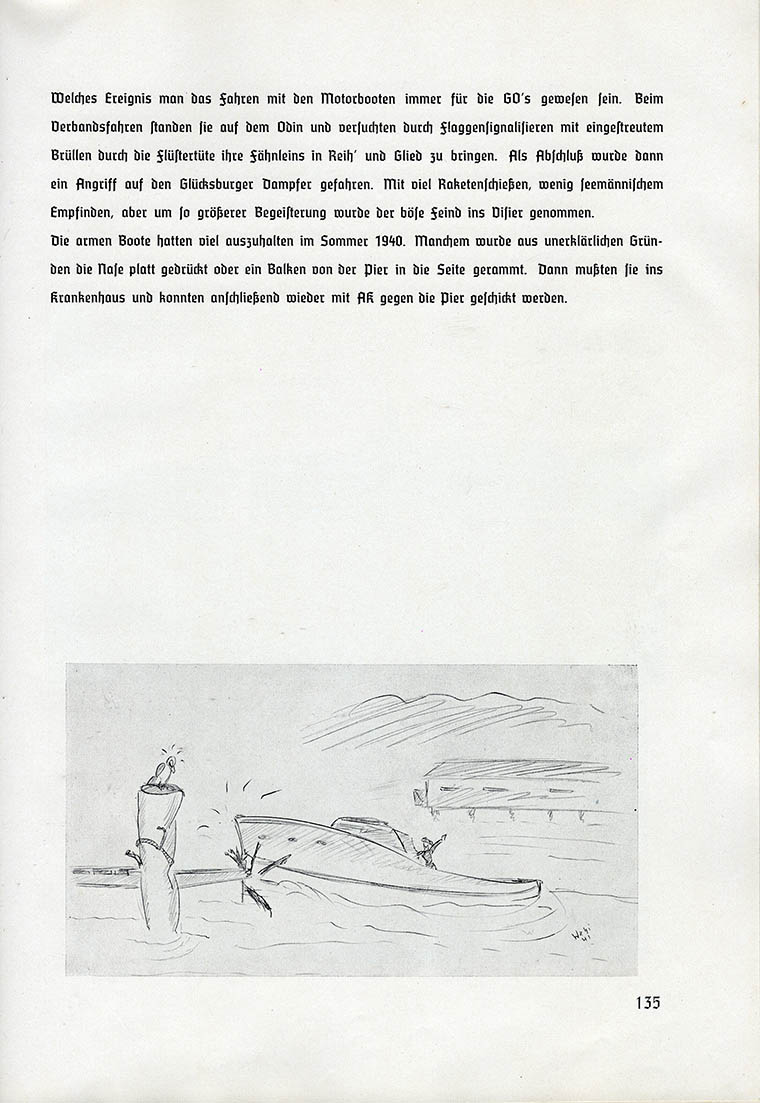
| What event motor boating has always been for the GO's. When driving in a formation, they stood on the ODIN and tried to bring their pennants in rank and file by flag signalers with interspersed roars through the megaphone. Finally, an attack was made on the Glücksburger steamer. With a lot of rocket shooting, little seamanship, but all the more enthusiasm, the evil enemy was targeted. | |||
| The poor boats had to endure a lot in the summer of 1940. Some inexplicably had their noses flattened or abeam from the pier rammed in the side. Then they had to go to the hospital and could then be sent back against the pier at AK. | |||
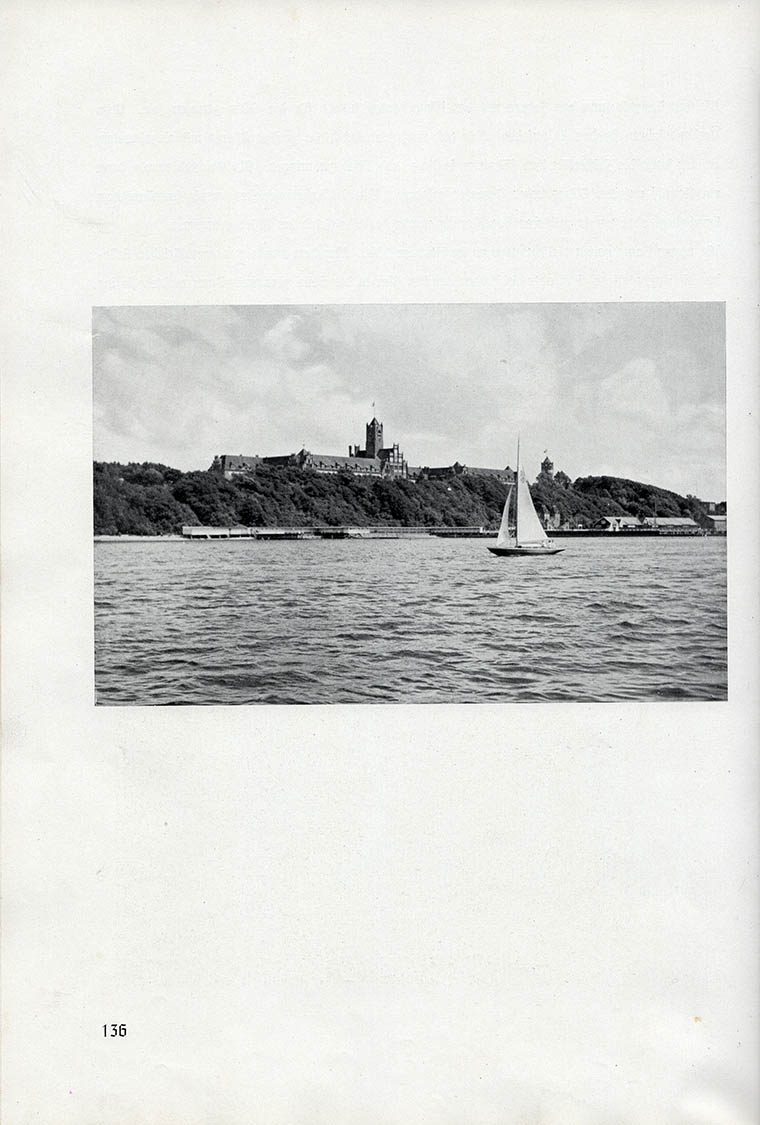
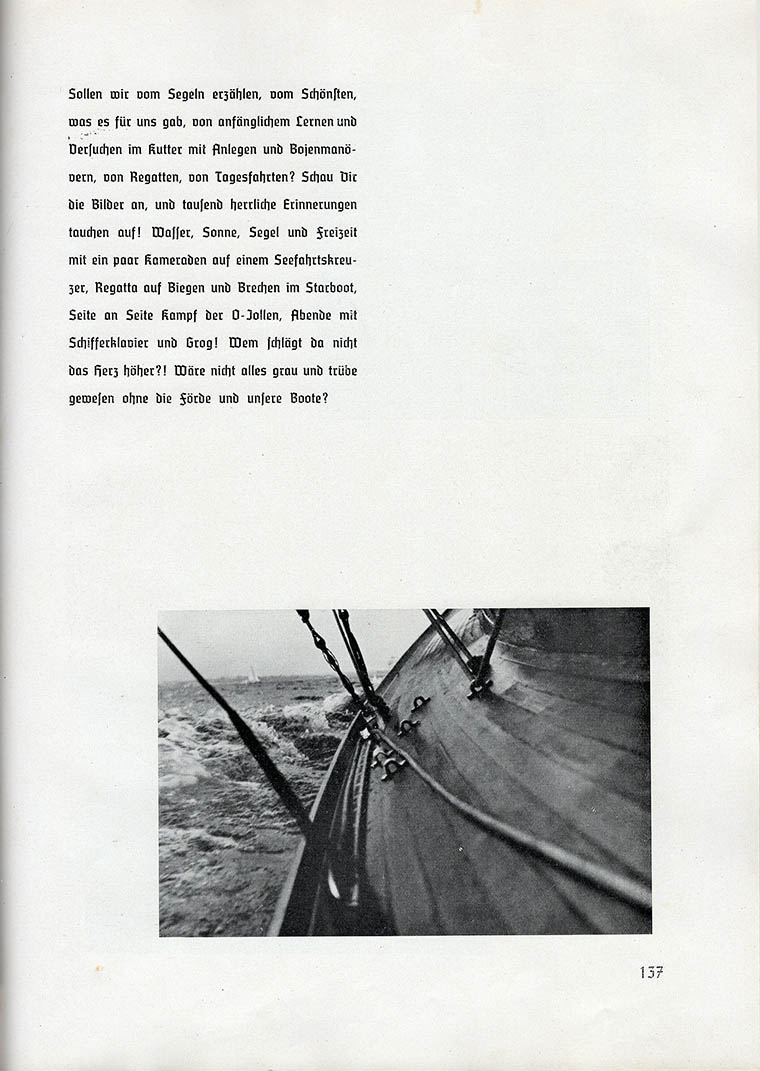
| Shall we talk about sailing, about the beautiful things that existed for us, about initial learning and trying things out in the cutter with casting off and buoy maneuvers, about regattas, about day trips? Look at the pictures and a thousand wonderful memories will emerge! Water, sun, sail and free time with a few comrades on a seafaring cruiser, regatta by hook or by crook in the Star boat, side-by-side battles in the O-dinghies, evenings with a piano and grog! Who's heart doesn't beat faster?! Wouldn't everything have been gray and murky without the fjord and our boats? | |||
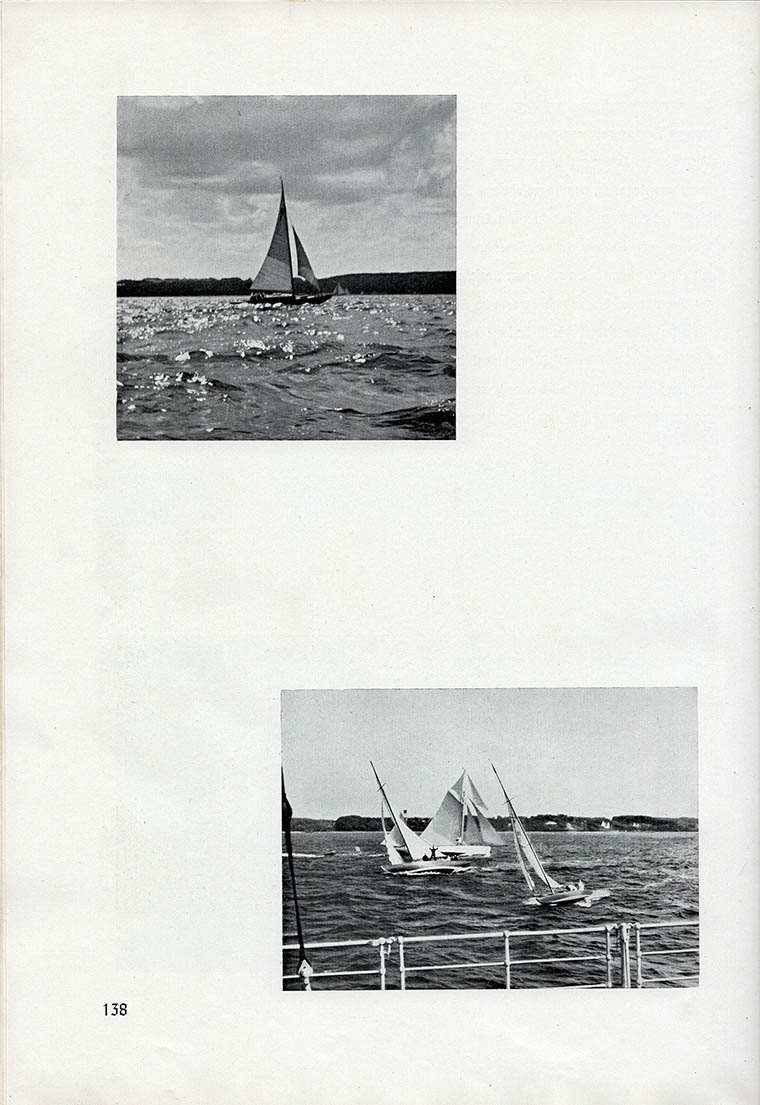
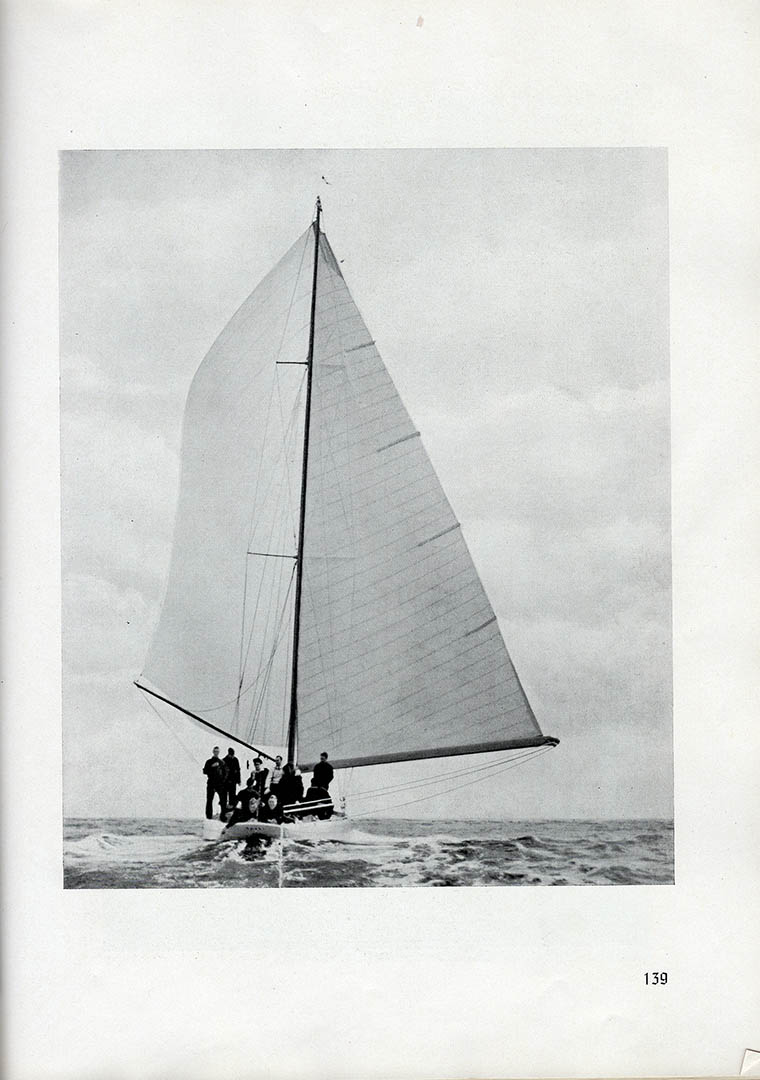
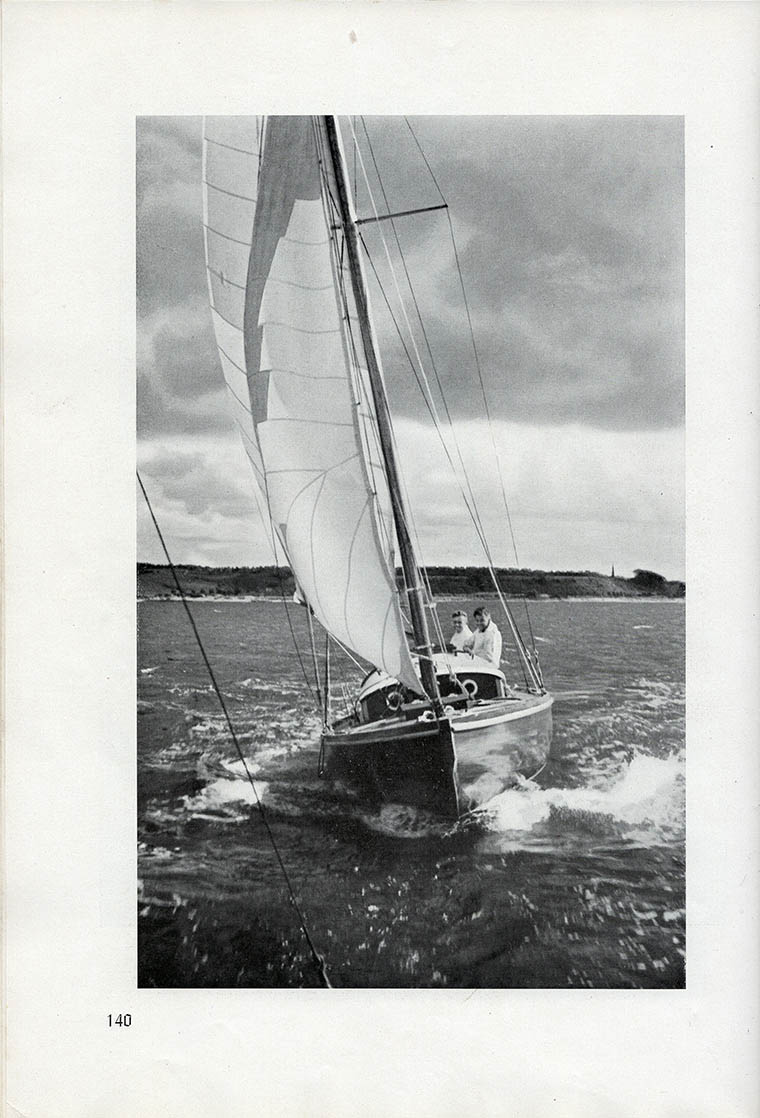
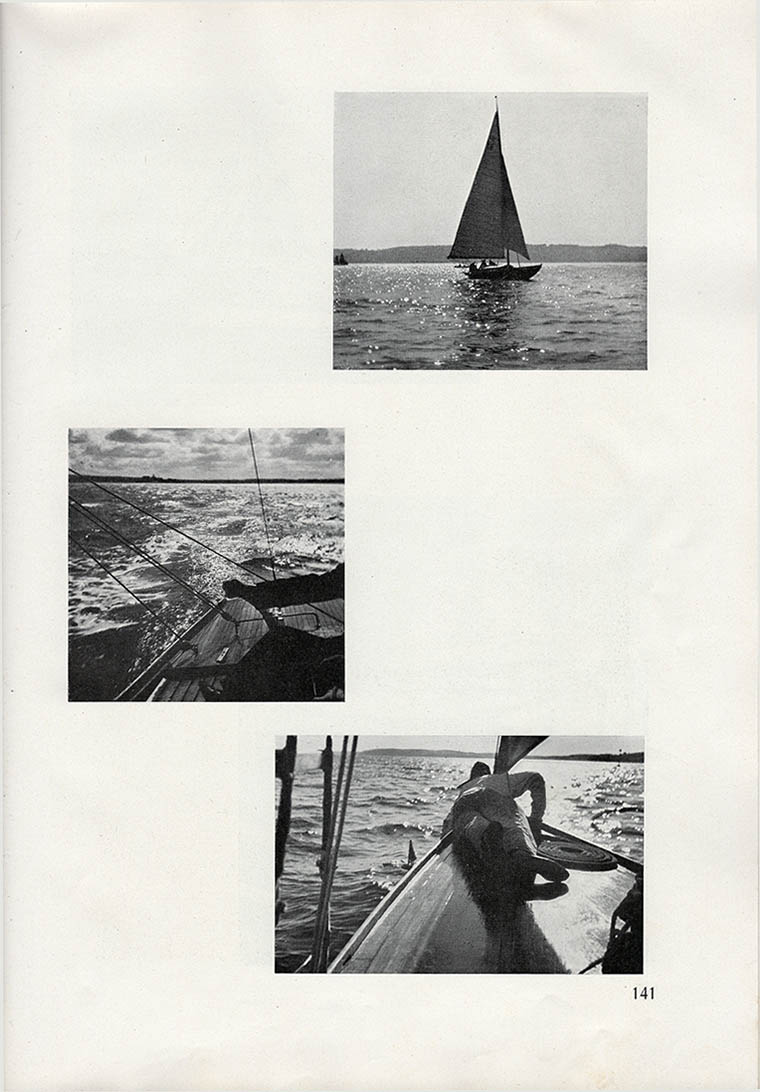
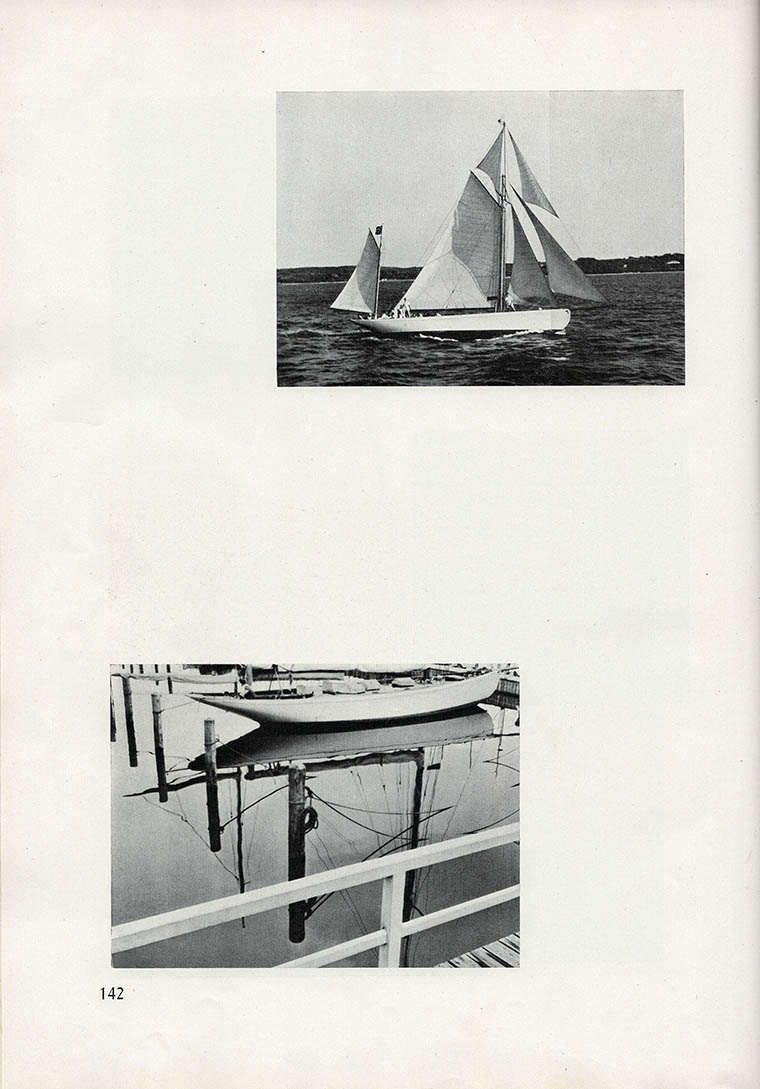
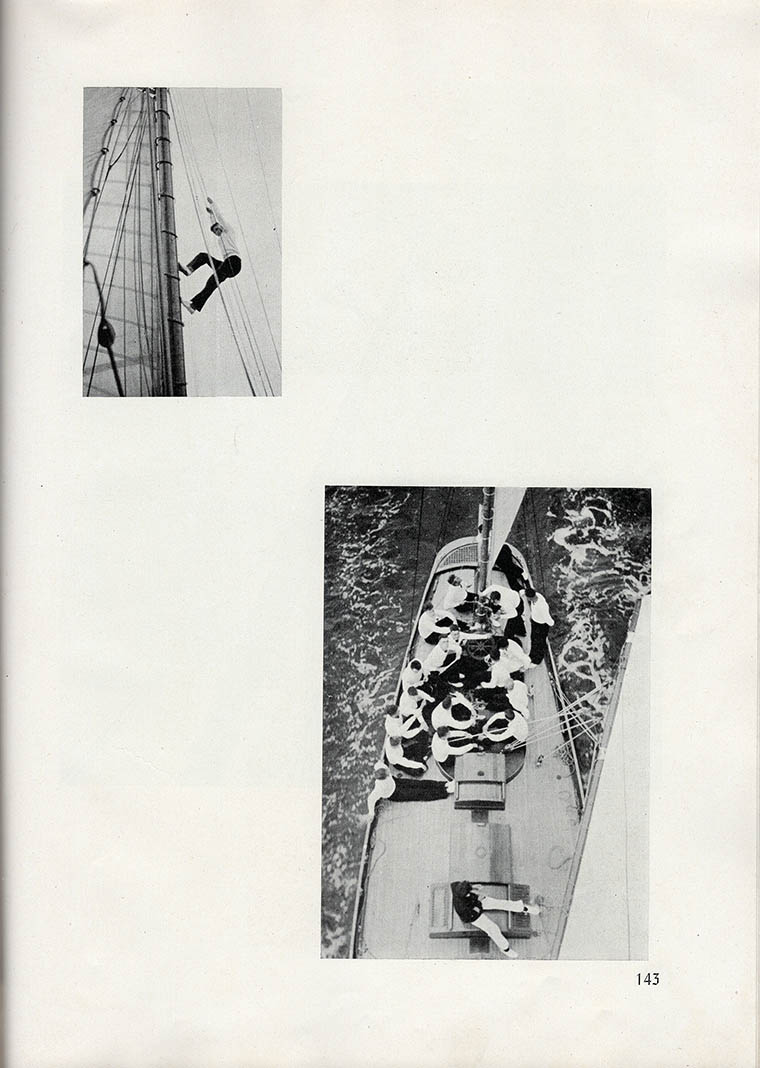
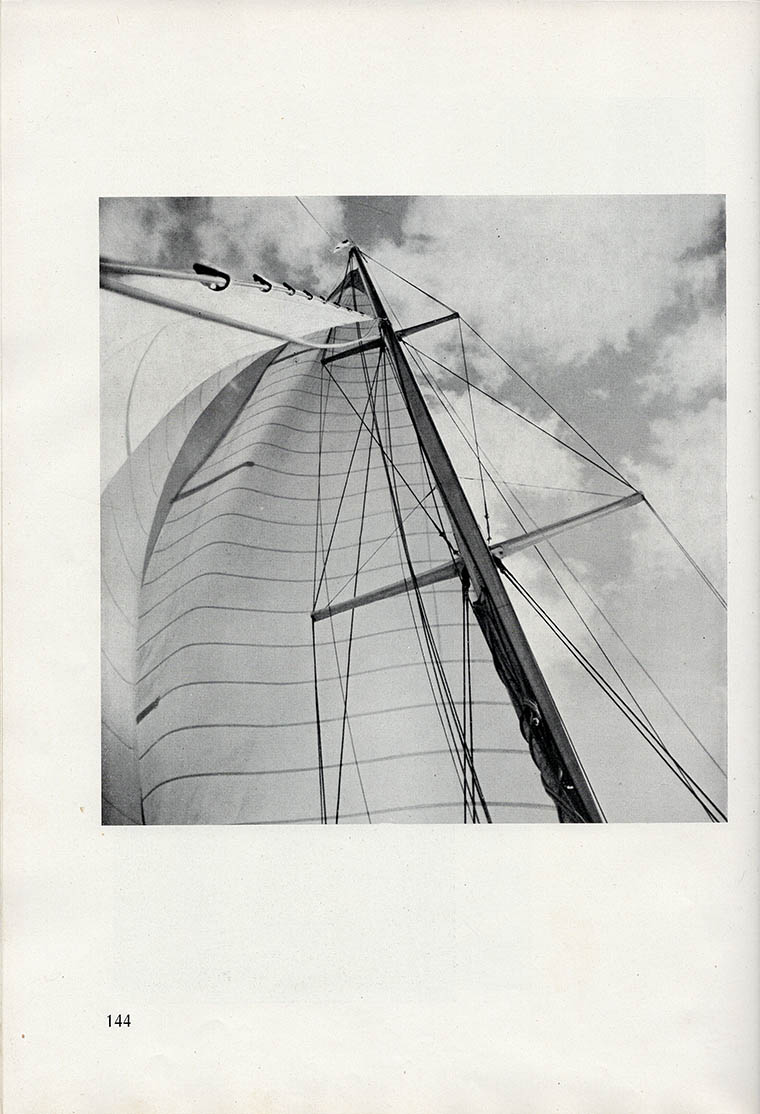
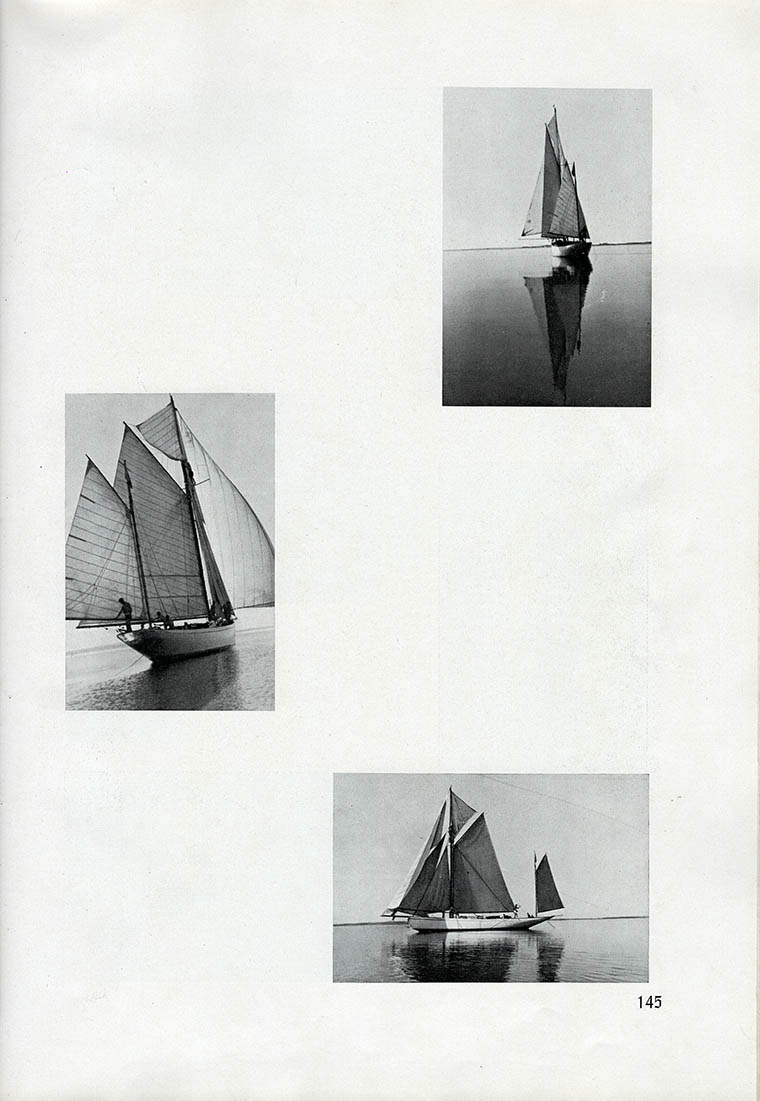
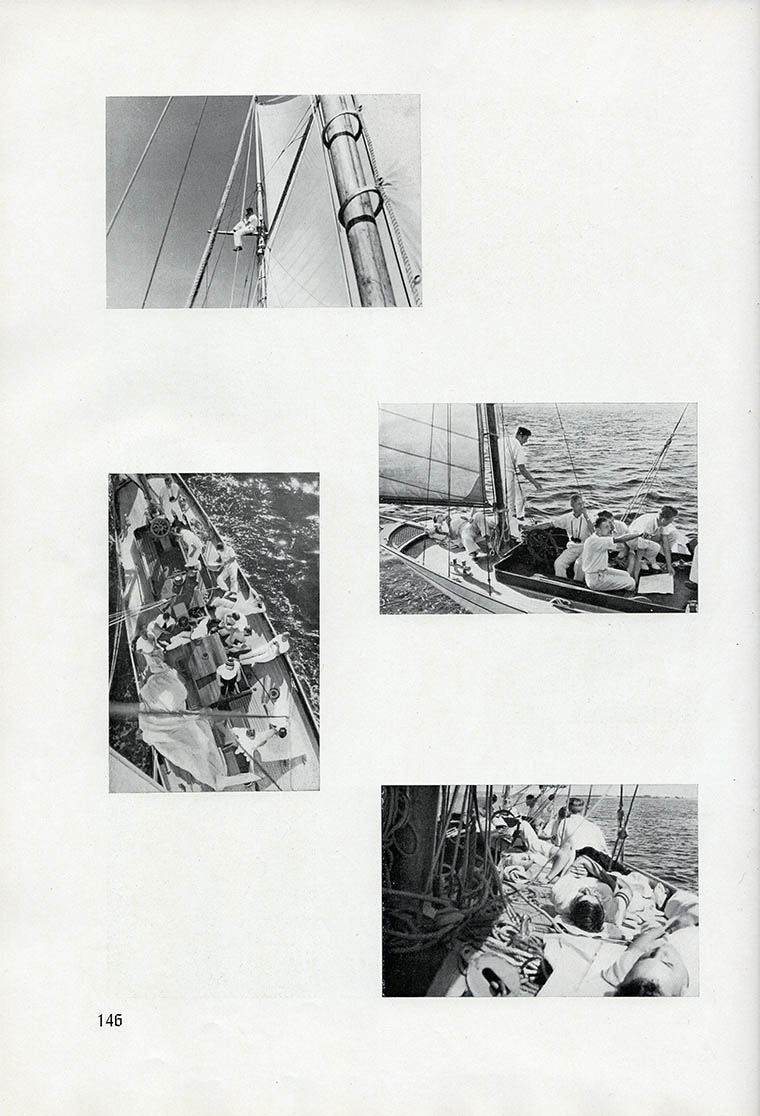
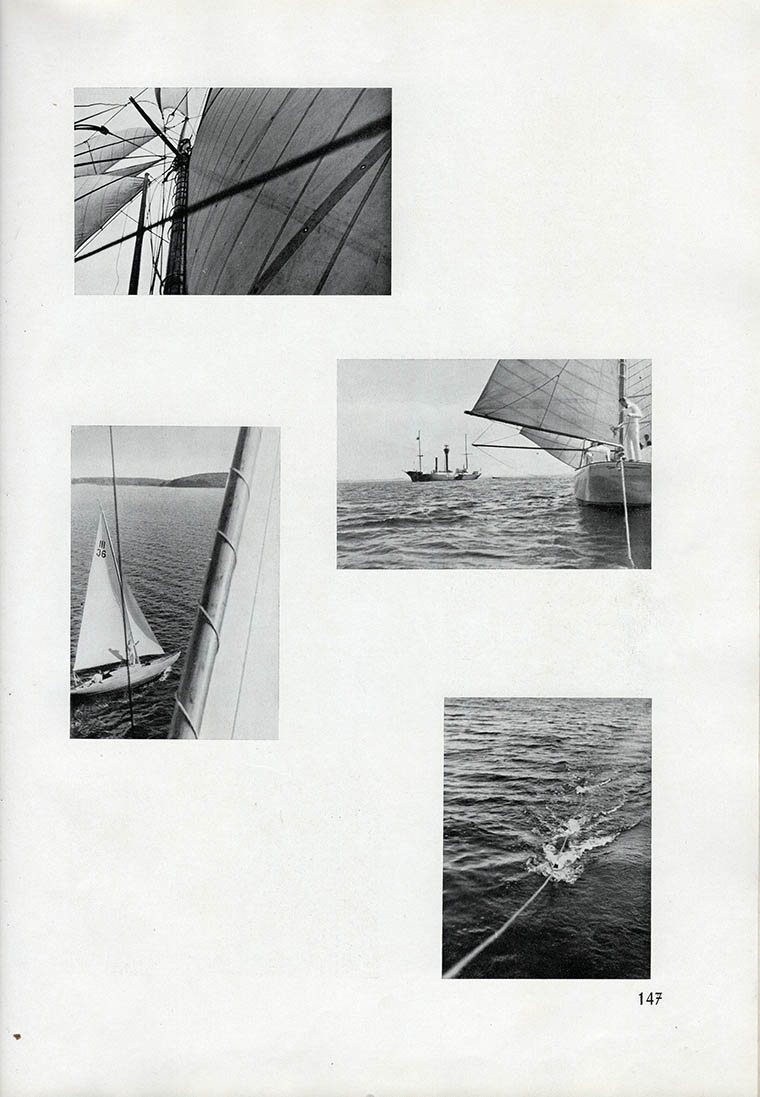
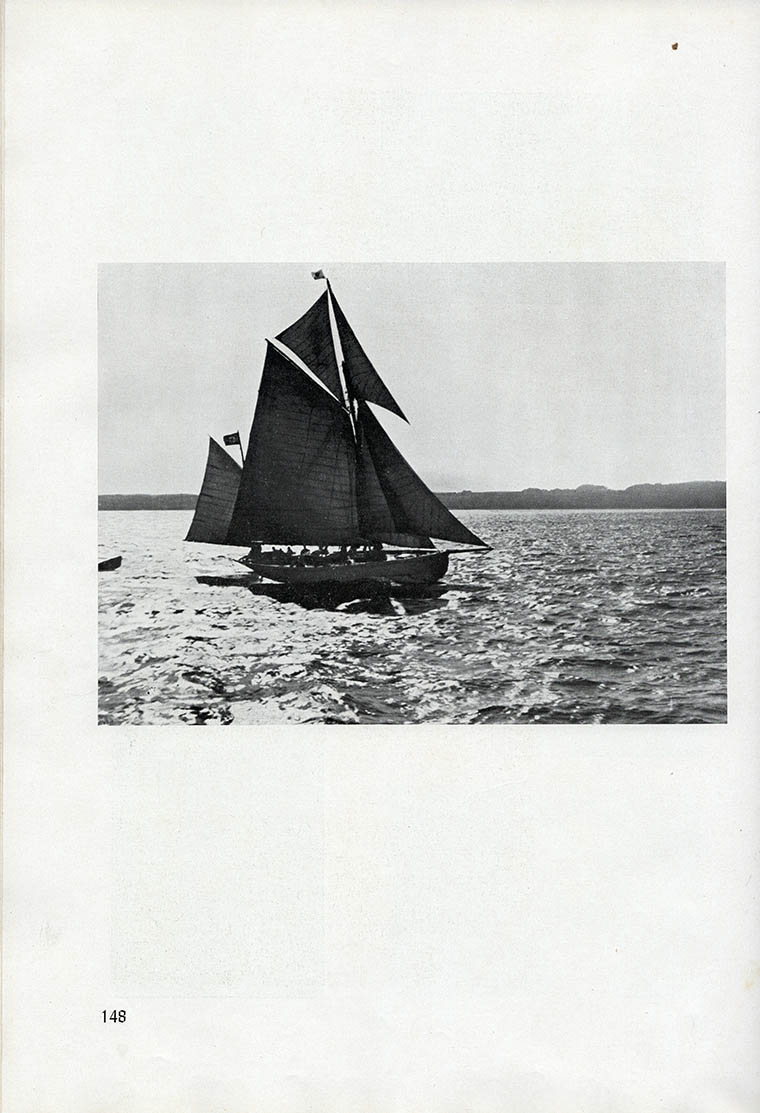
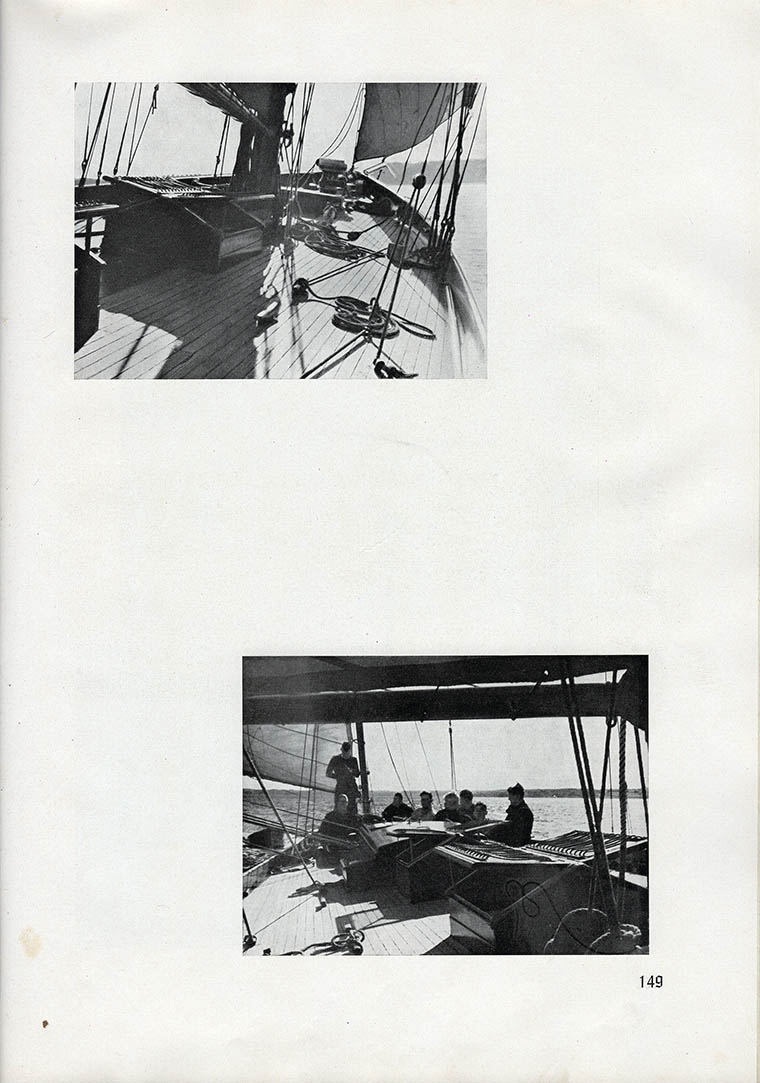
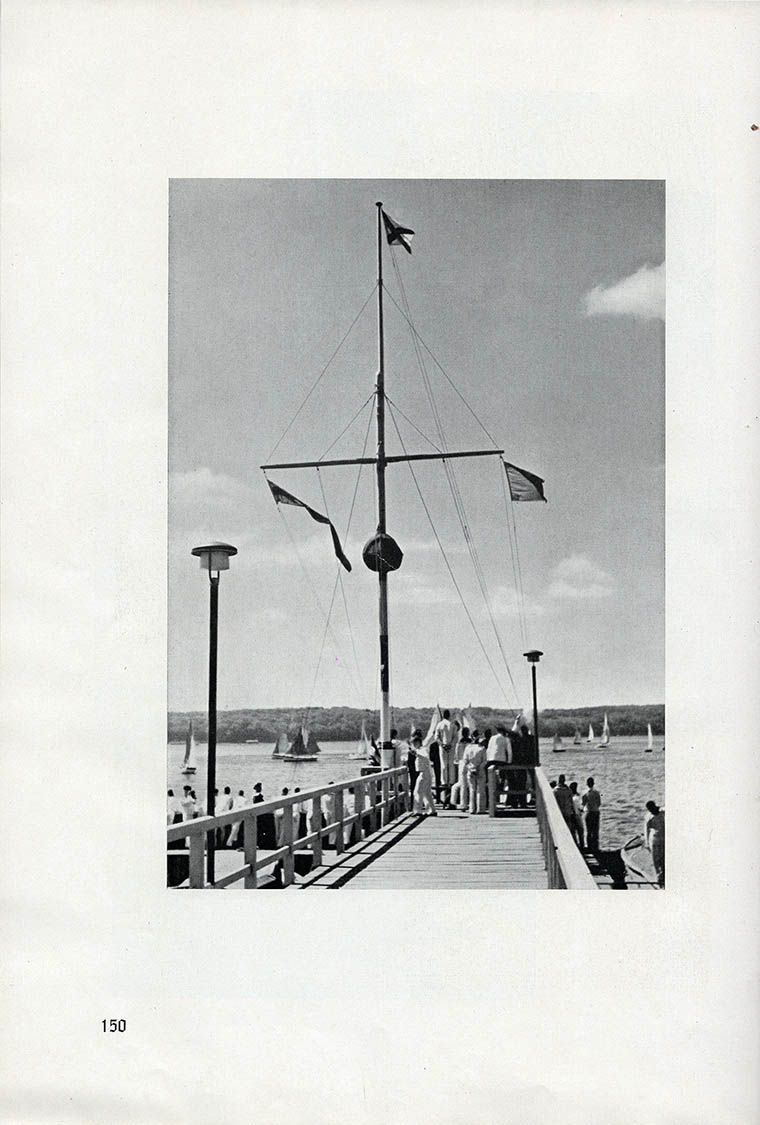
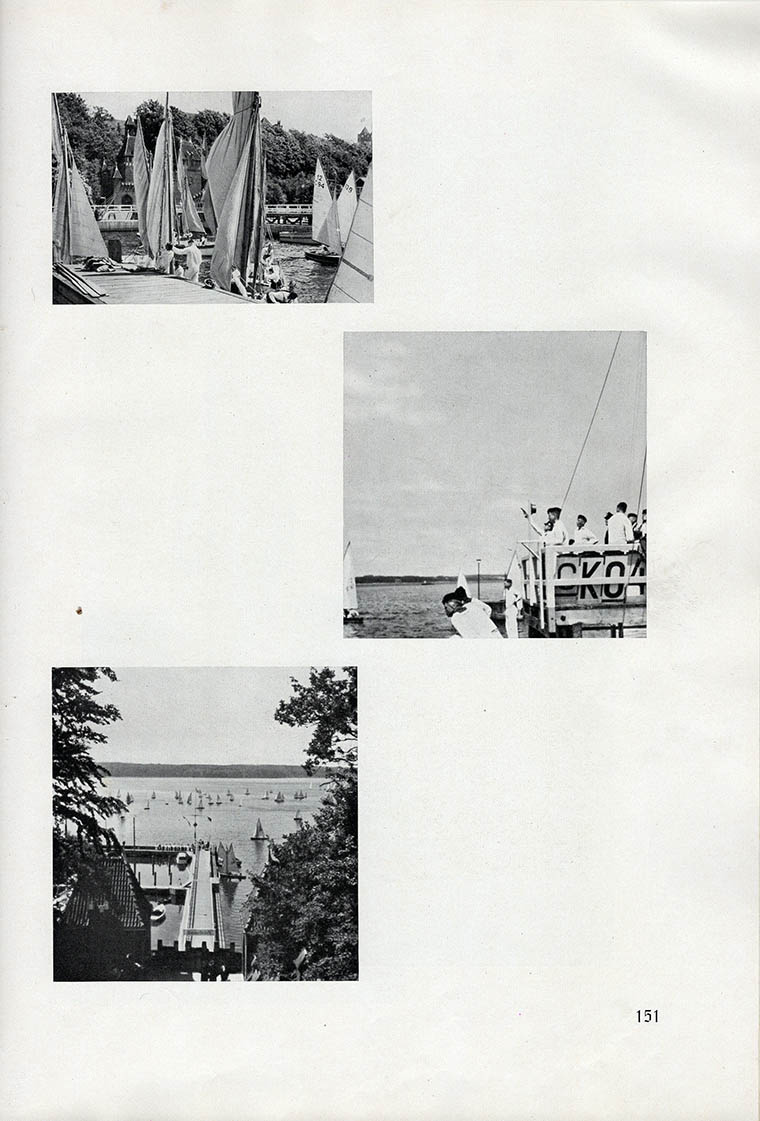
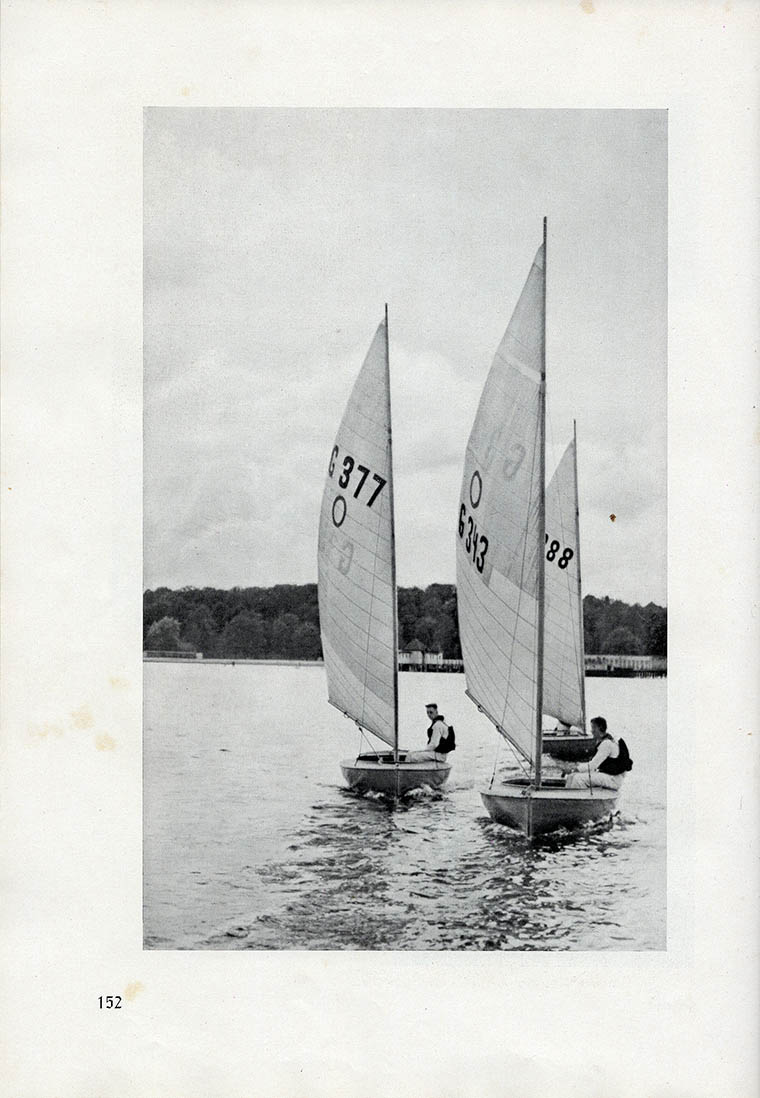
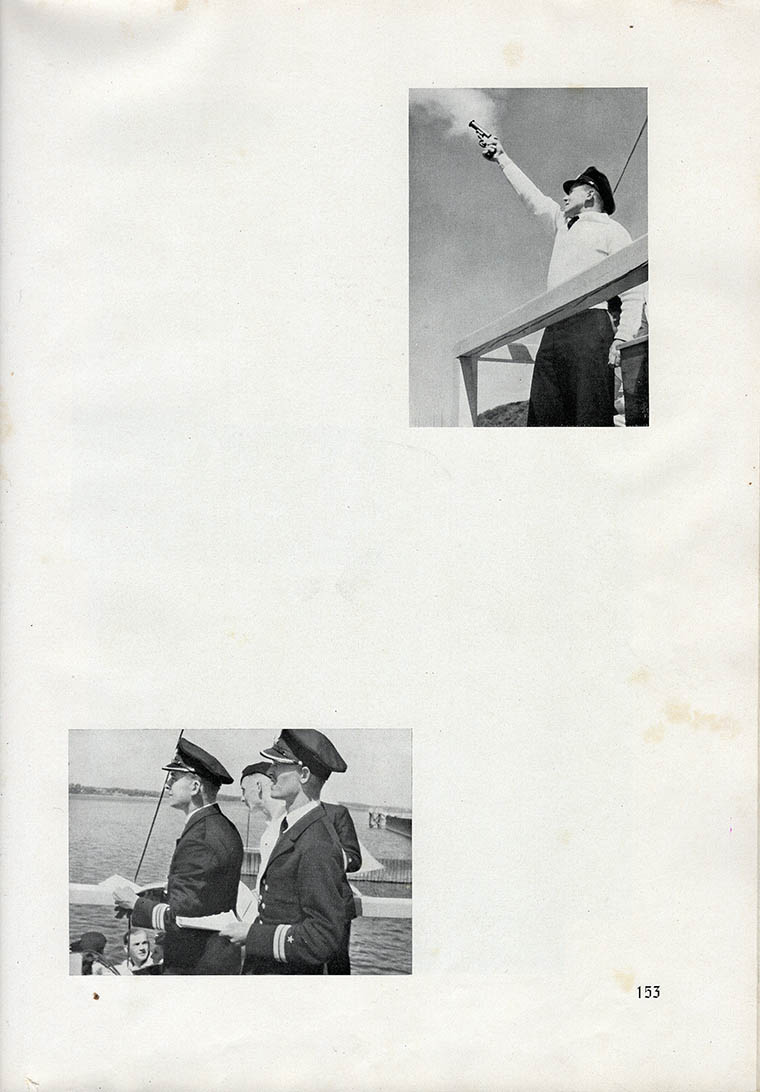
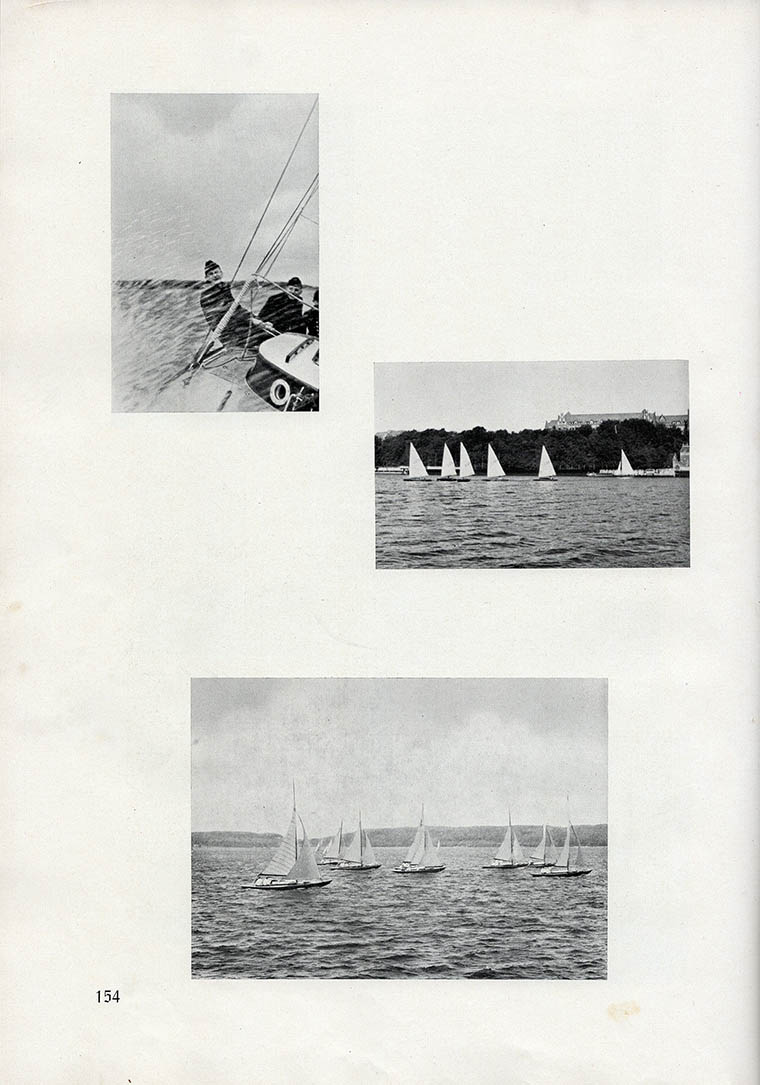
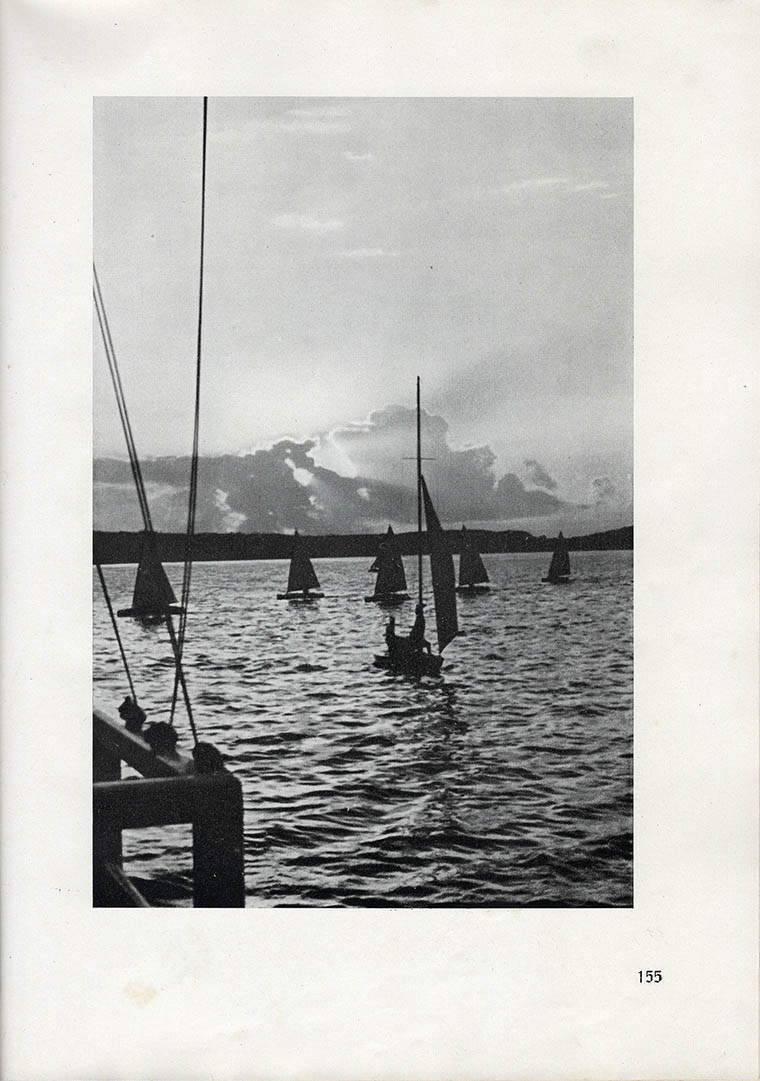
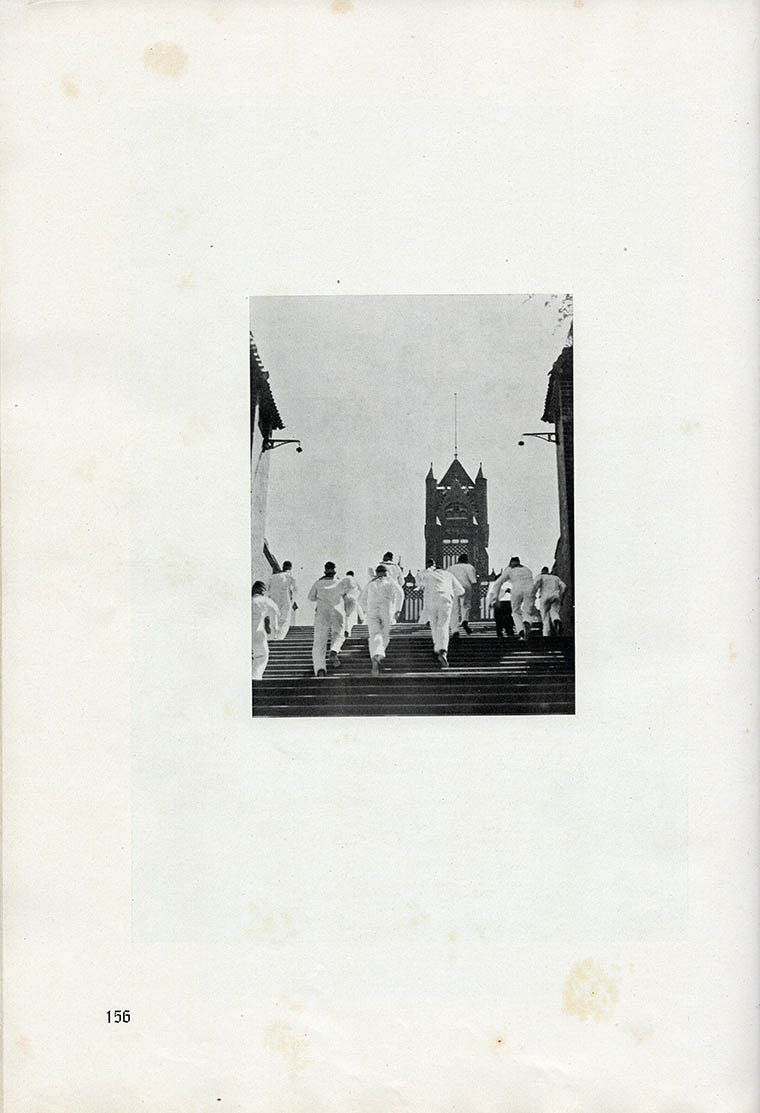
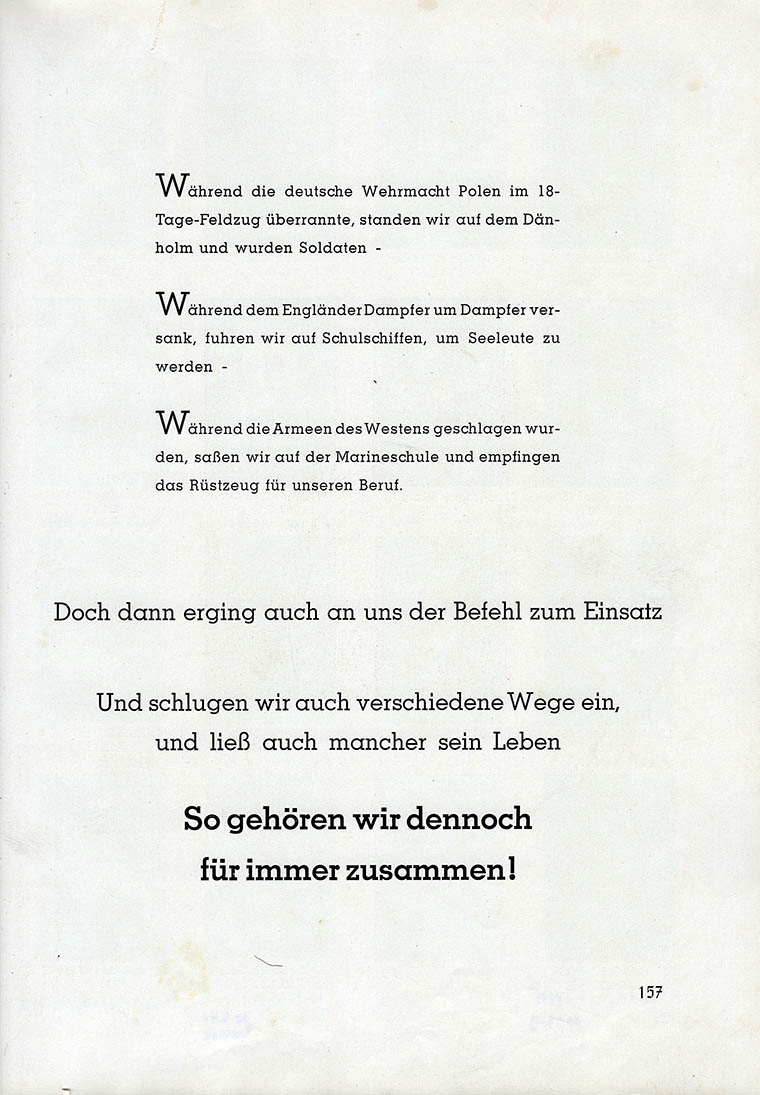
| While the German Wehrmacht! overran Poland in the 18-day campaign, we stood on the Dänholm and became soldiers - | ||||
| While the Englishman was sinking steamer after steamer, we went on training ships to become sailors - | ||||
| While the armies of the West were being defeated, we sat in the Naval Academy and received the tools of our trade. | ||||
But then we were also given the order to deploy. |
||||
And we also took different paths, |
||||
and some lost their lives |
||||
So we still belong |
||||
together forever! |
||||
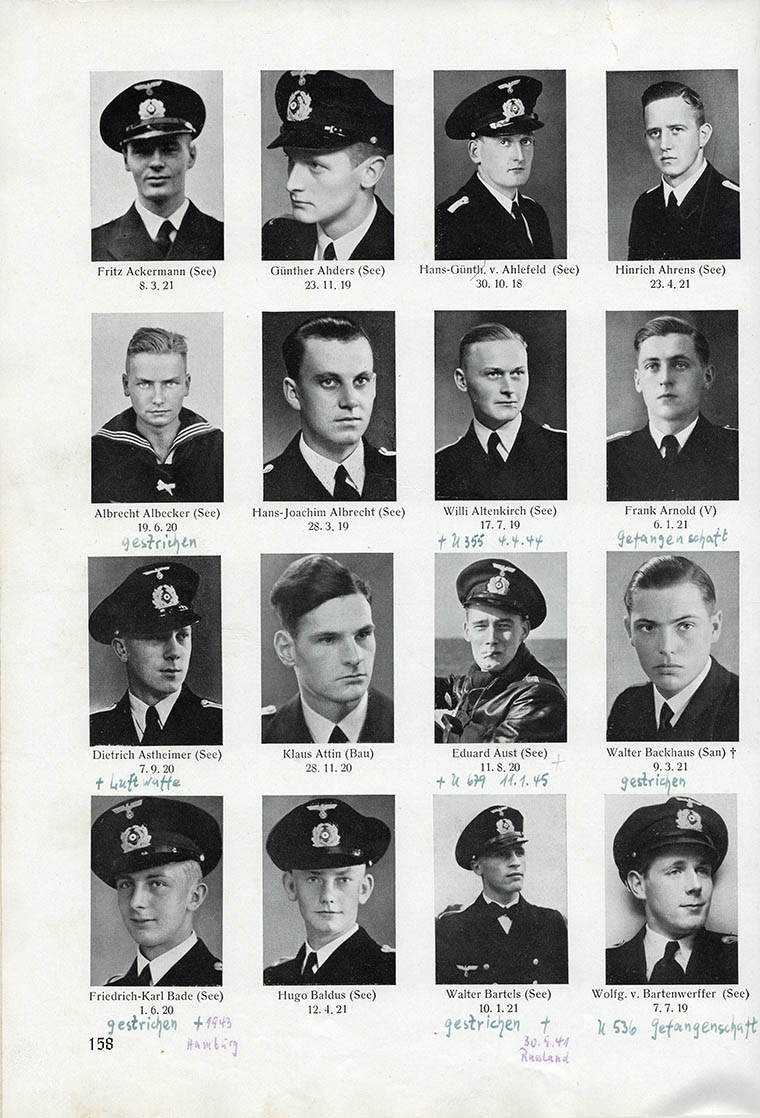
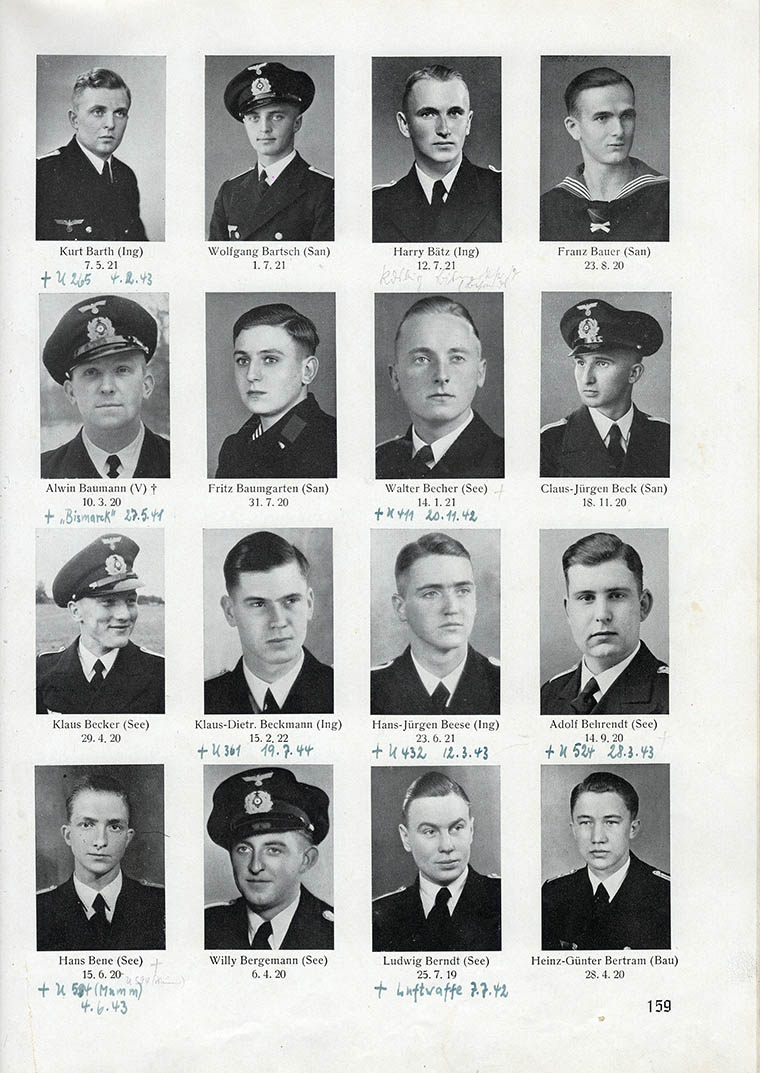
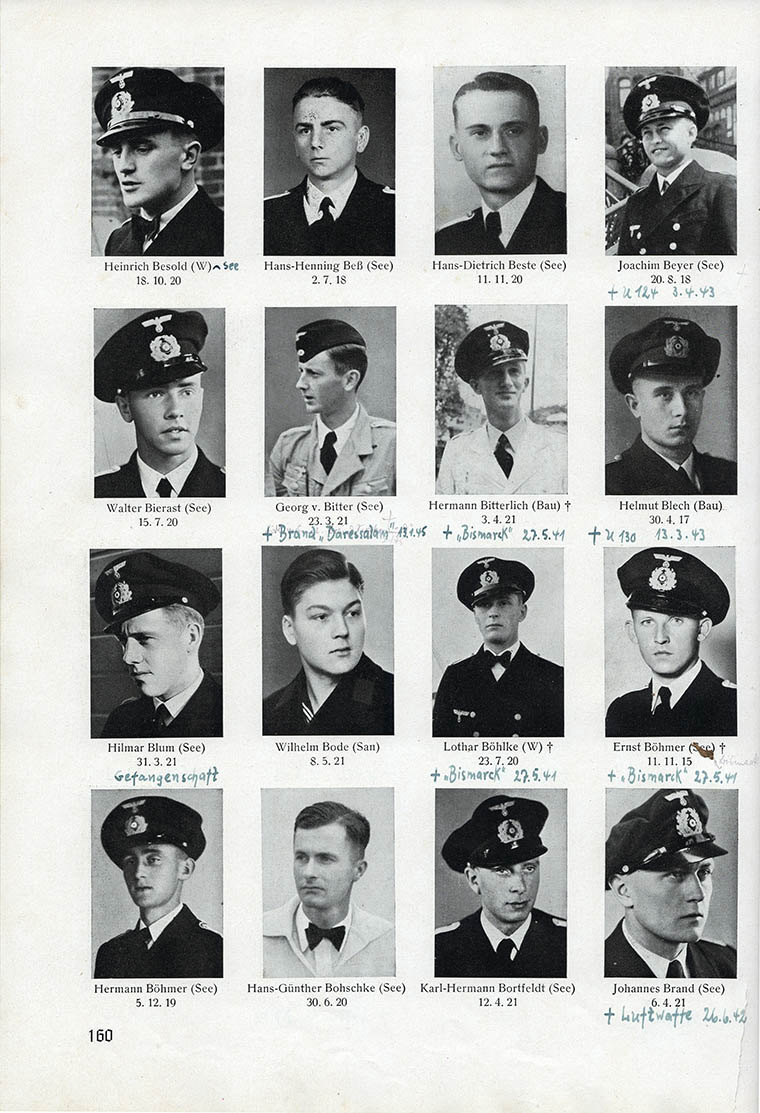
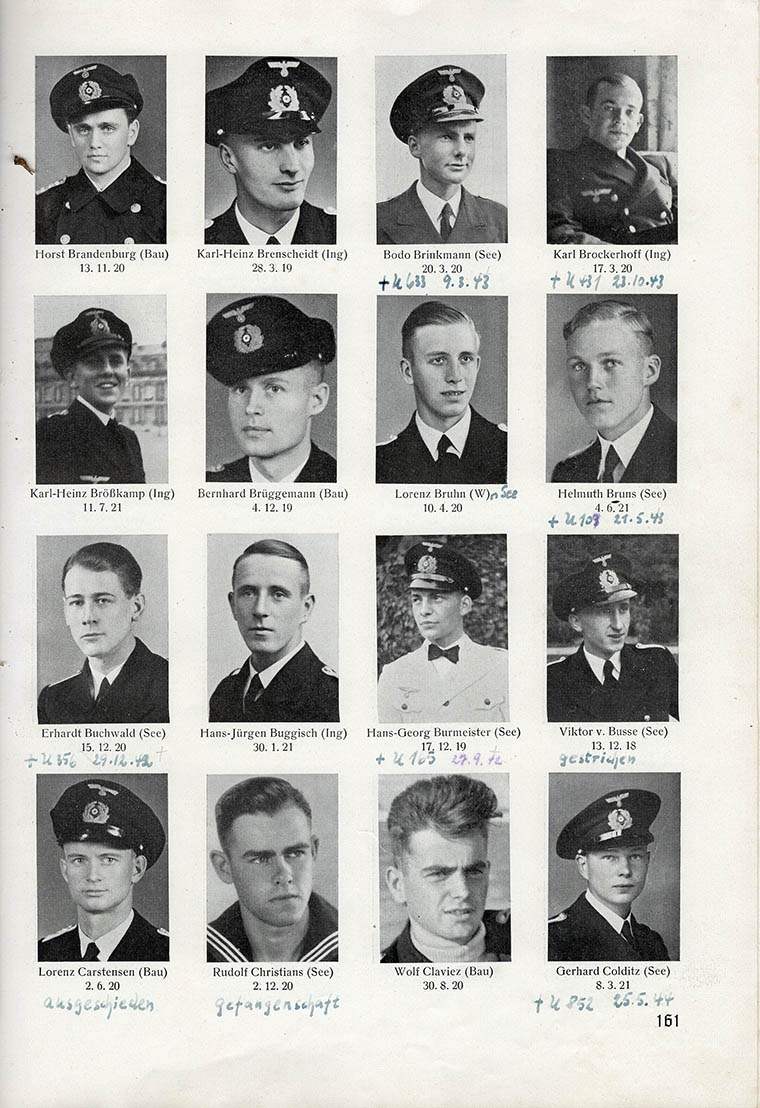
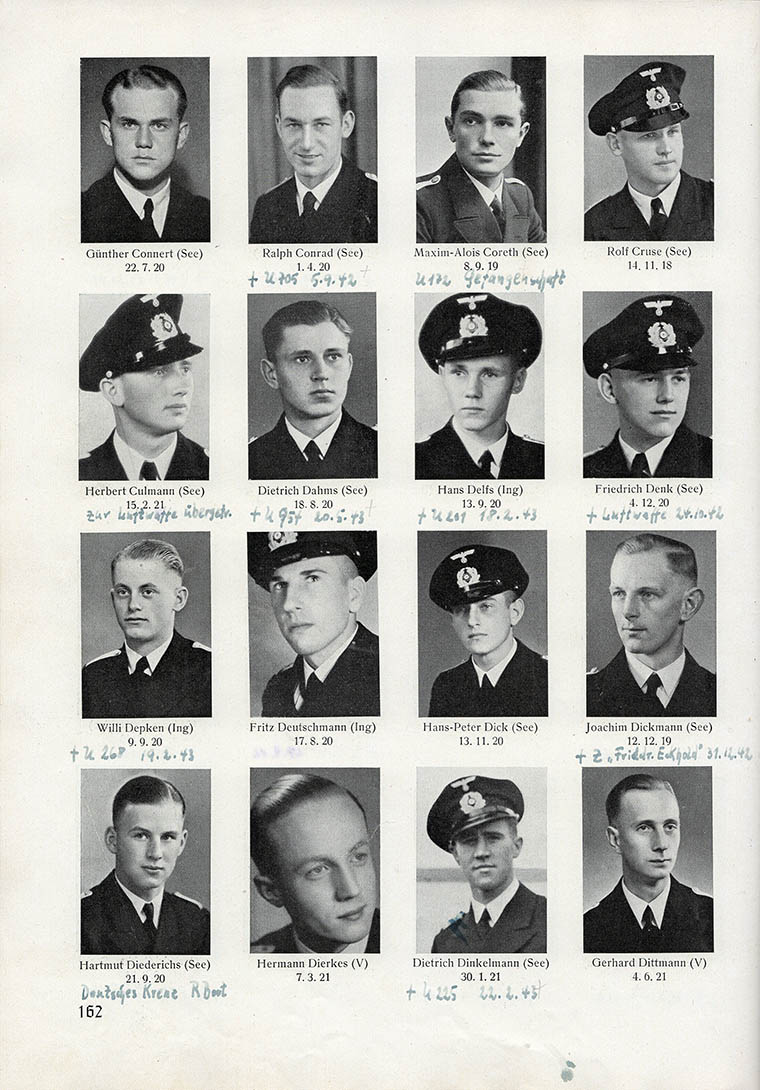
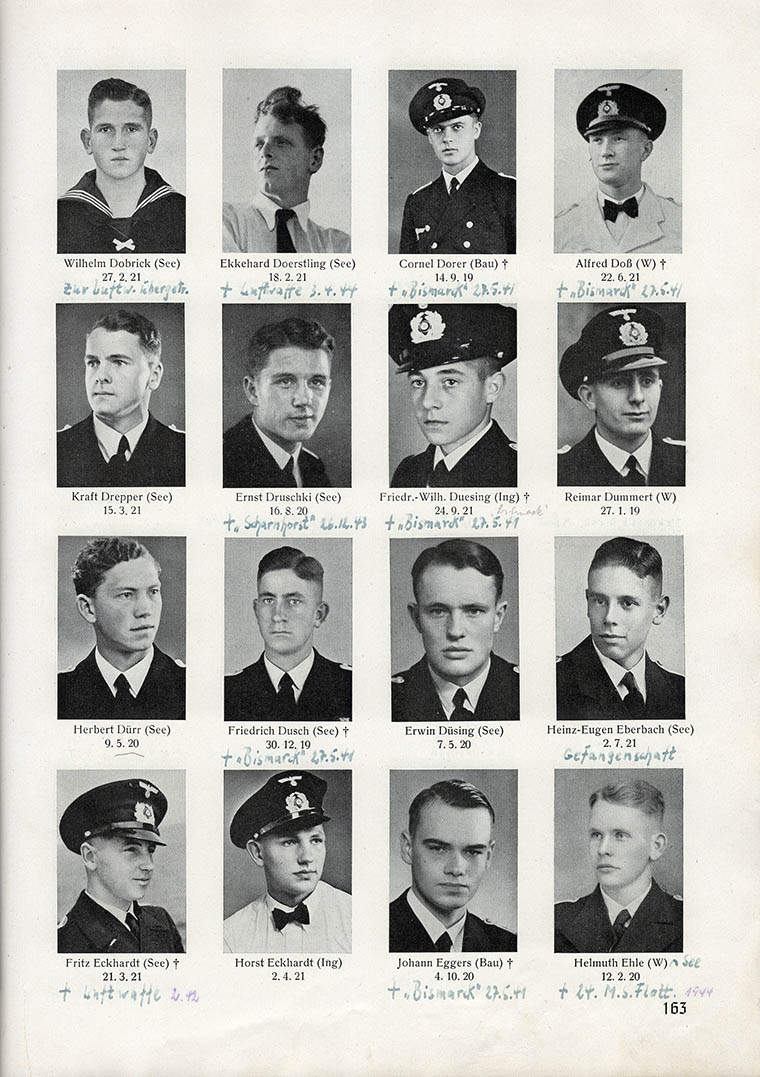
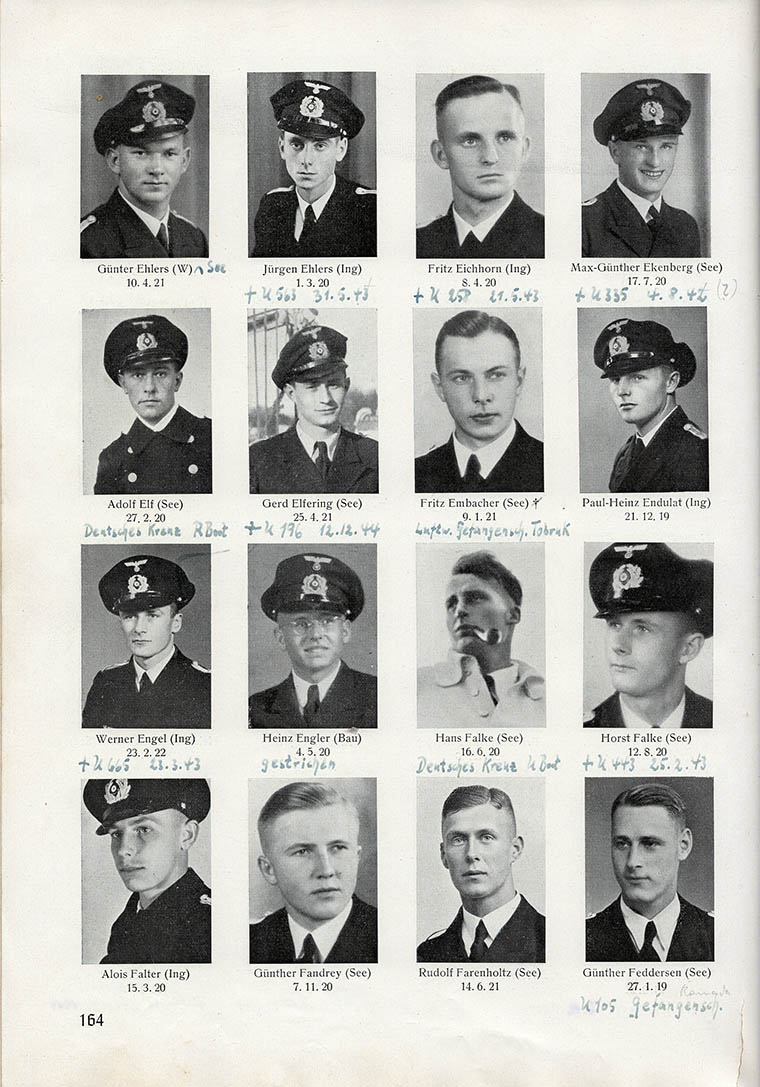
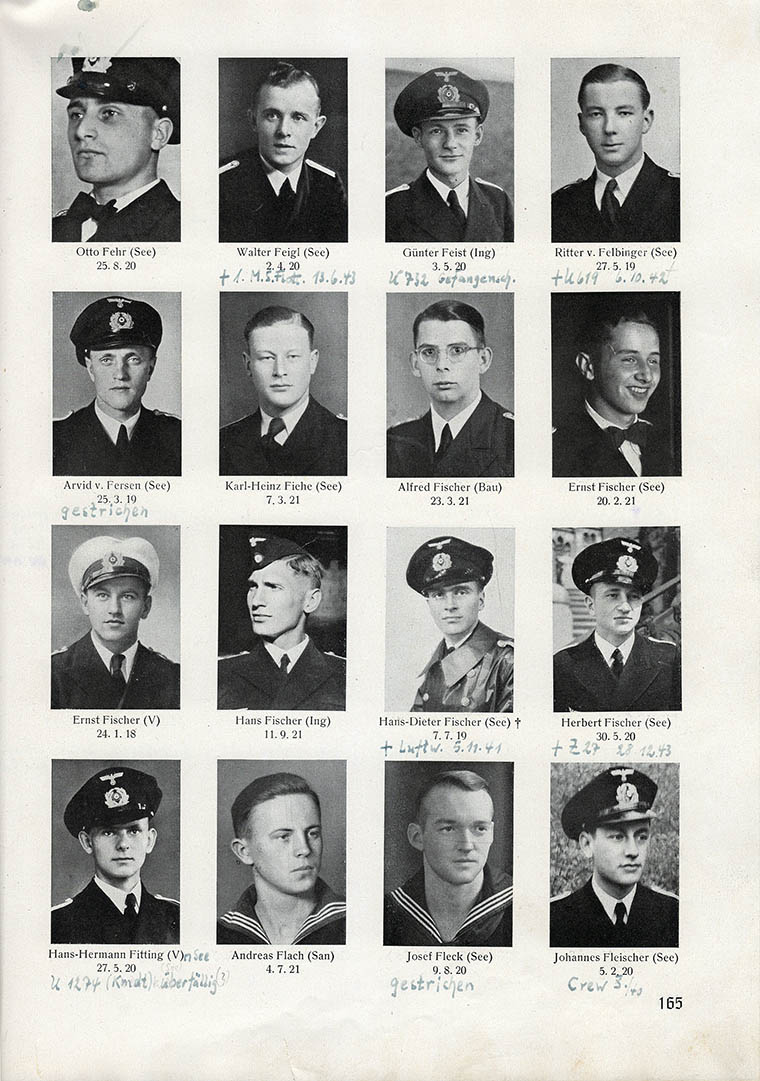
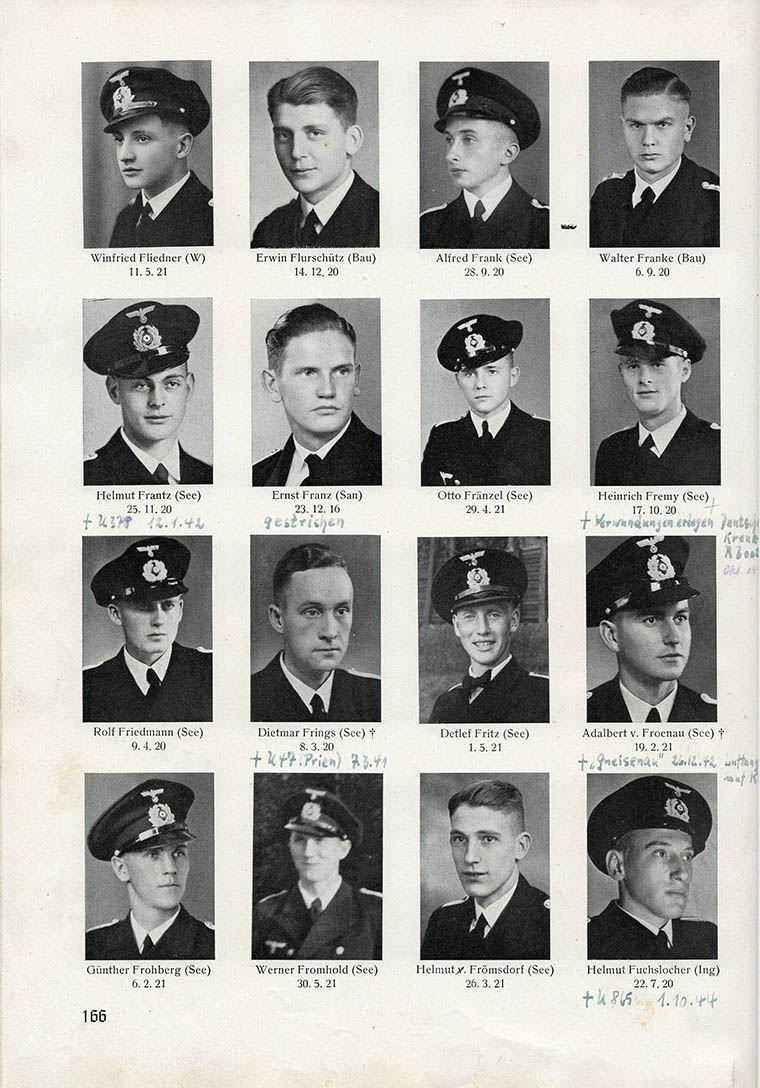
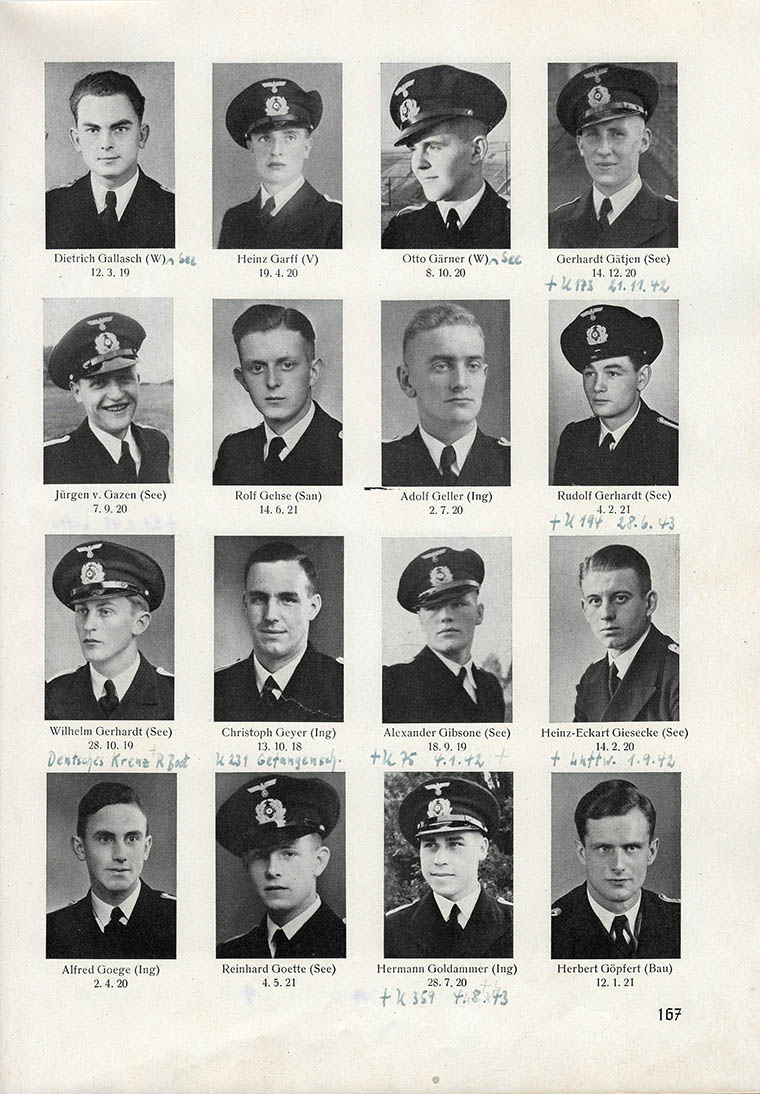
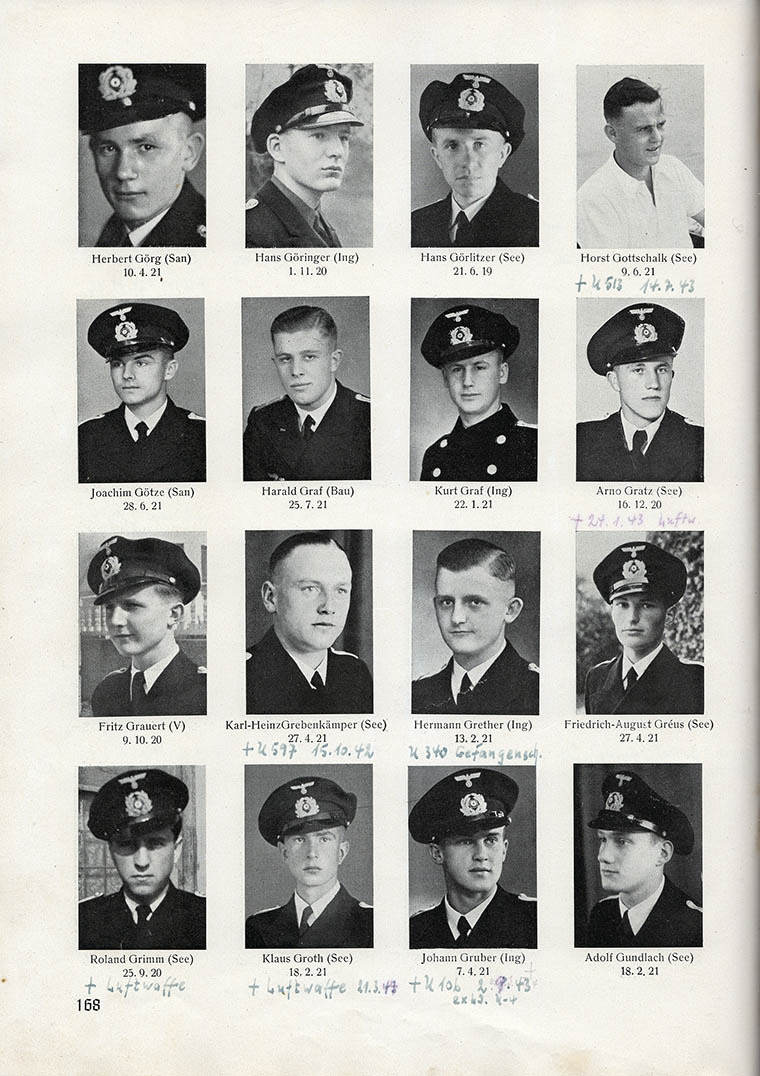
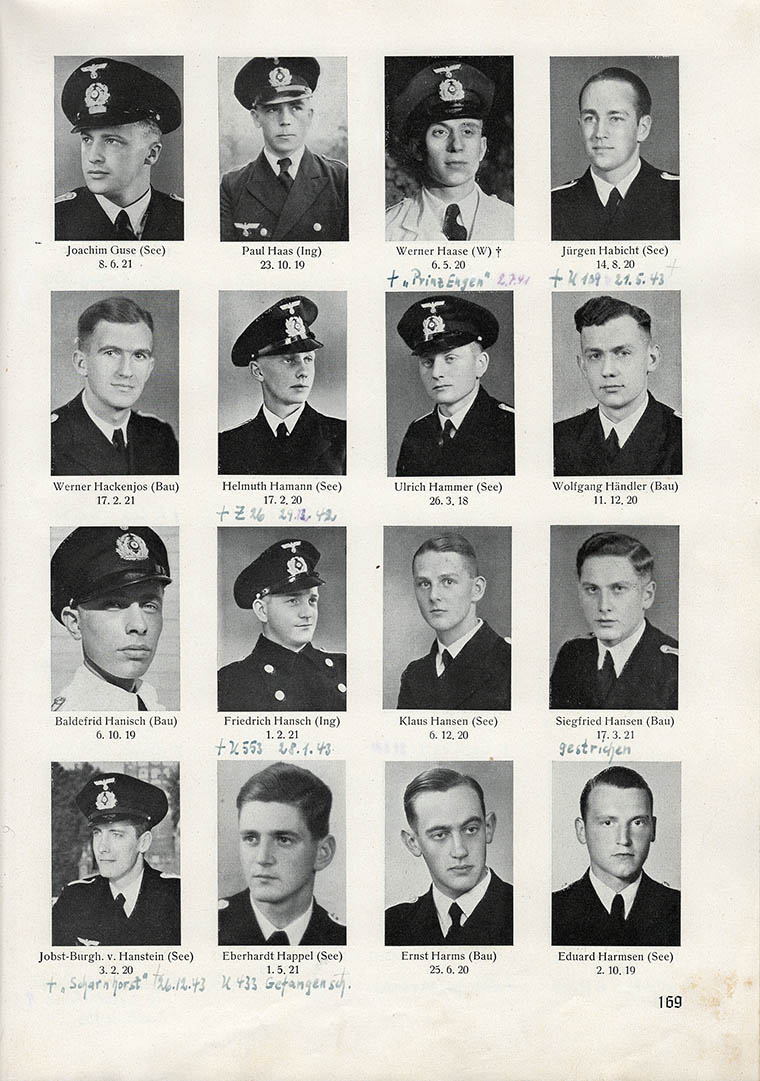
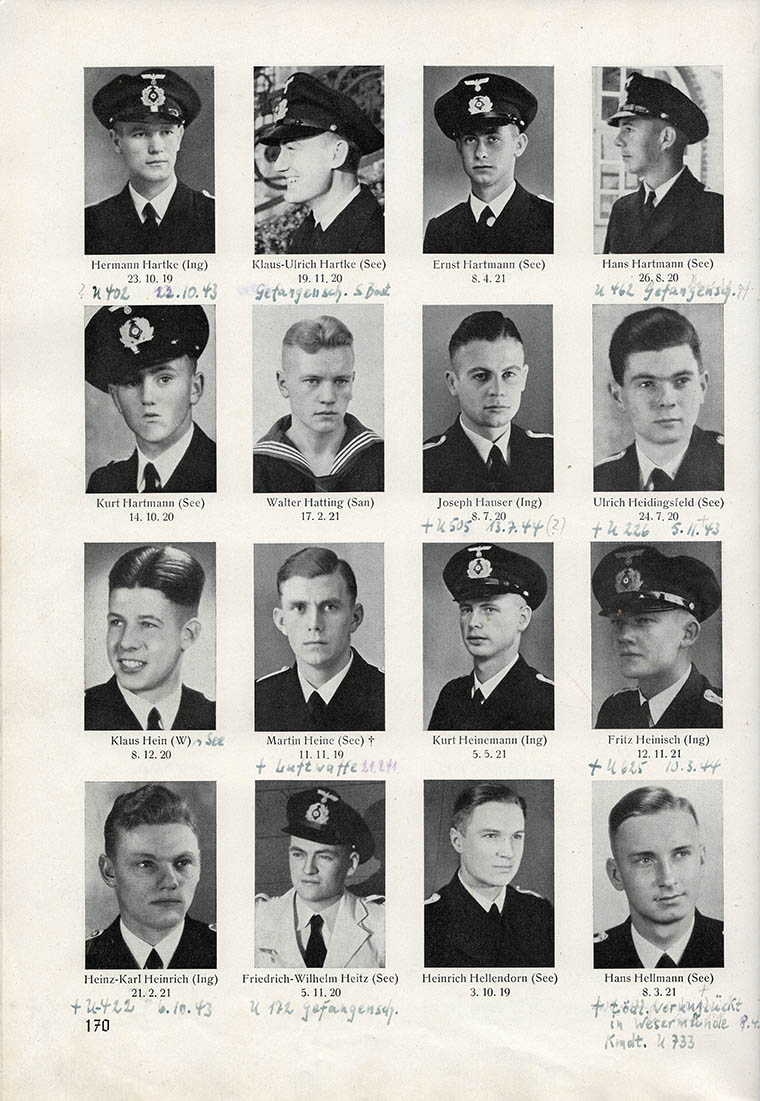
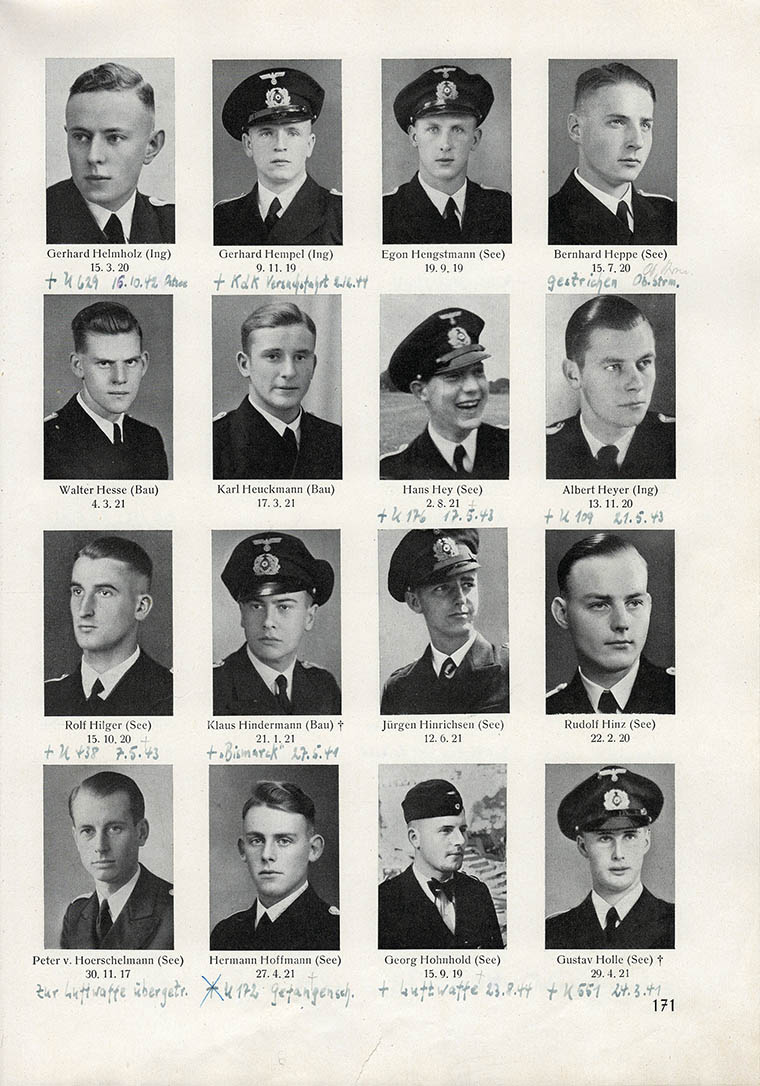
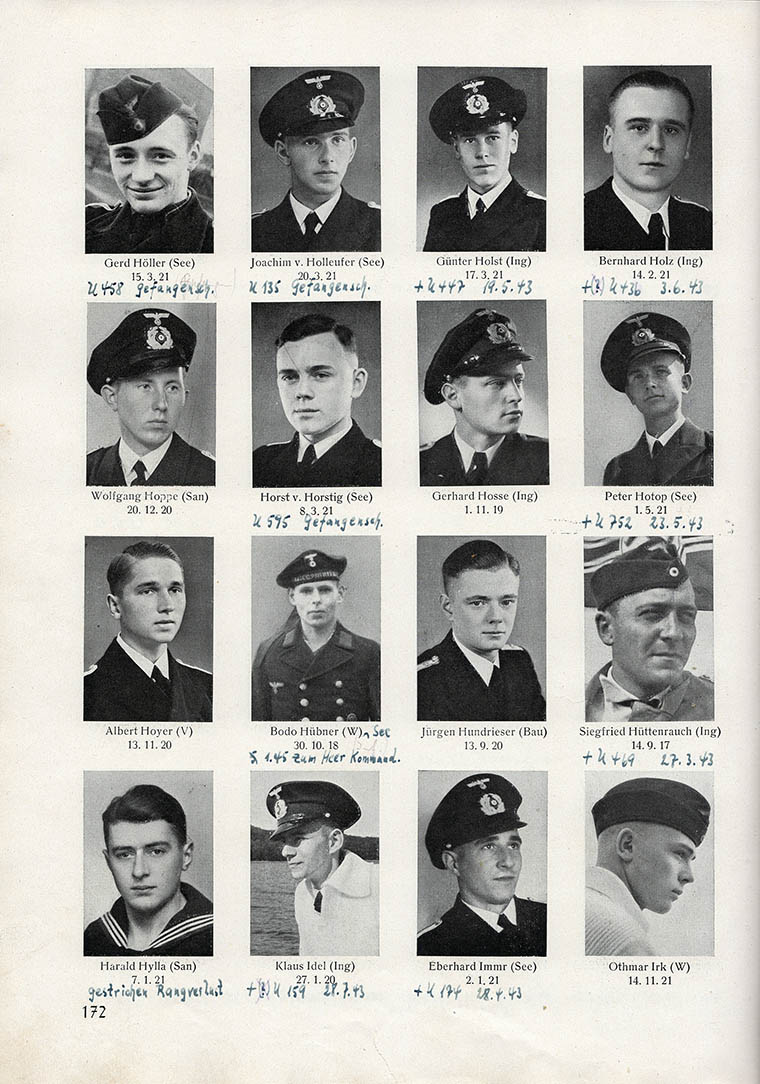
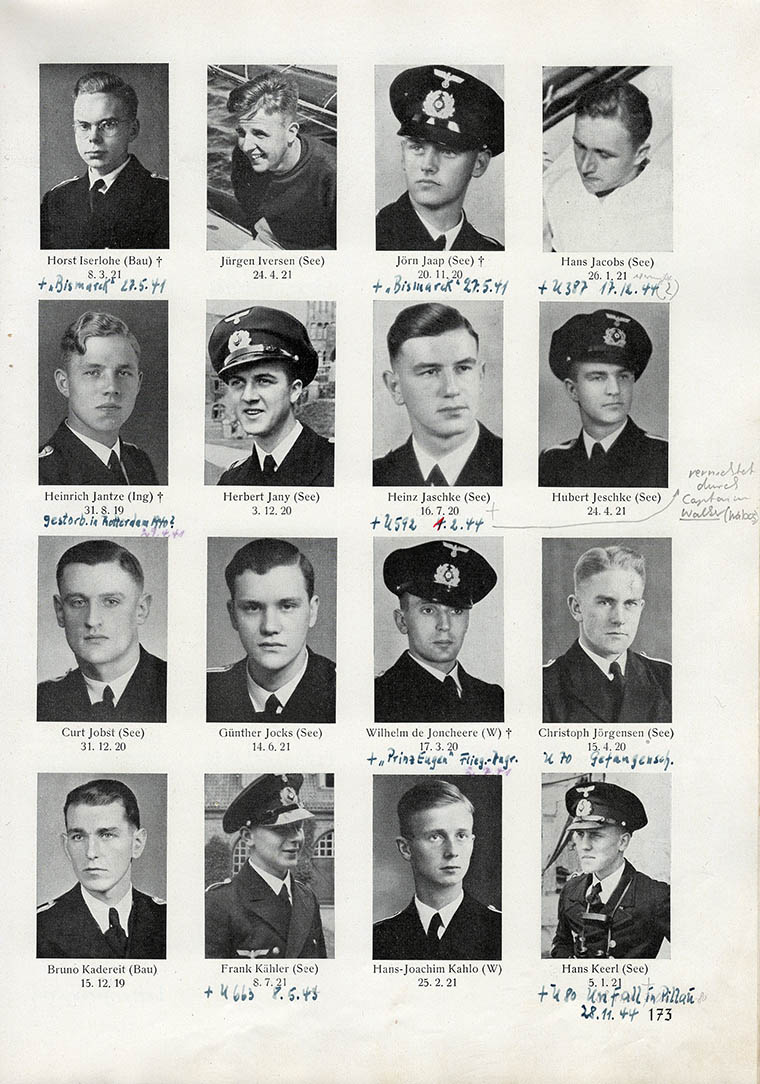
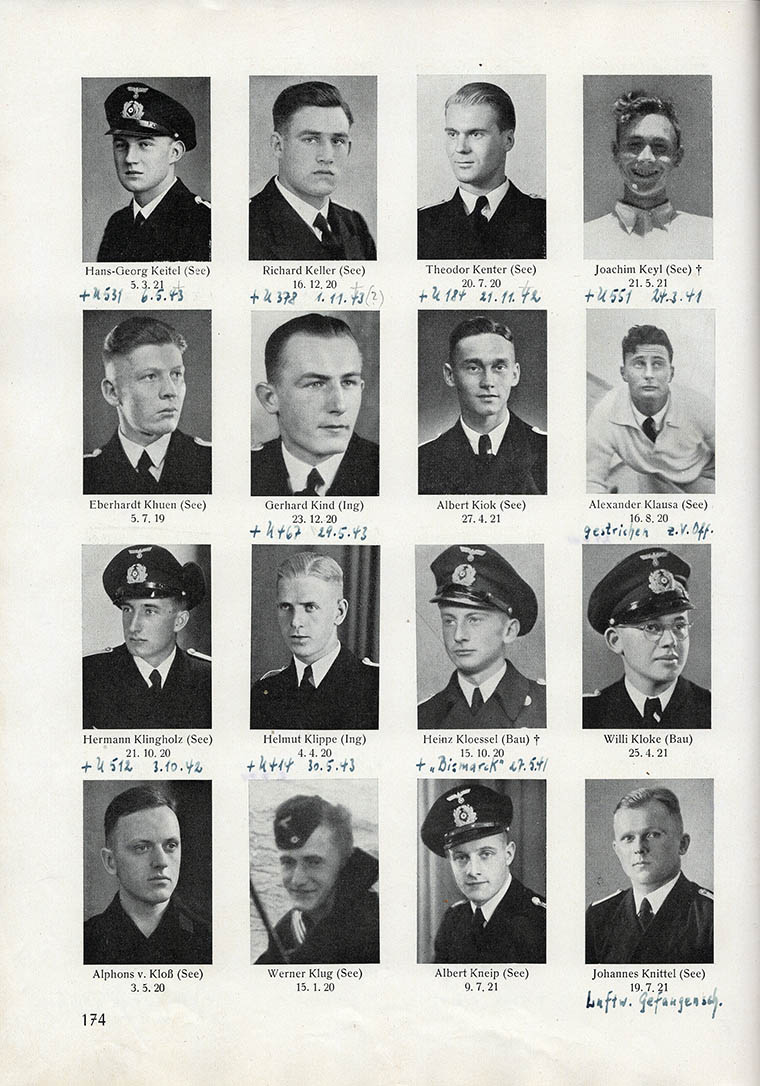
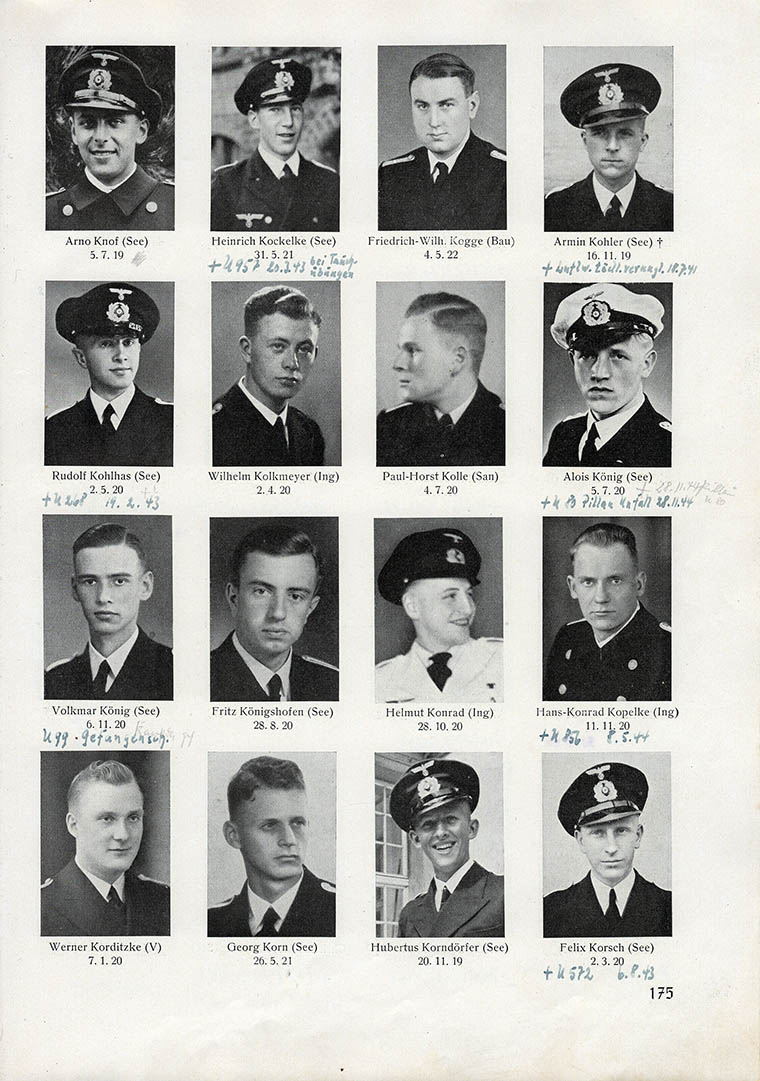
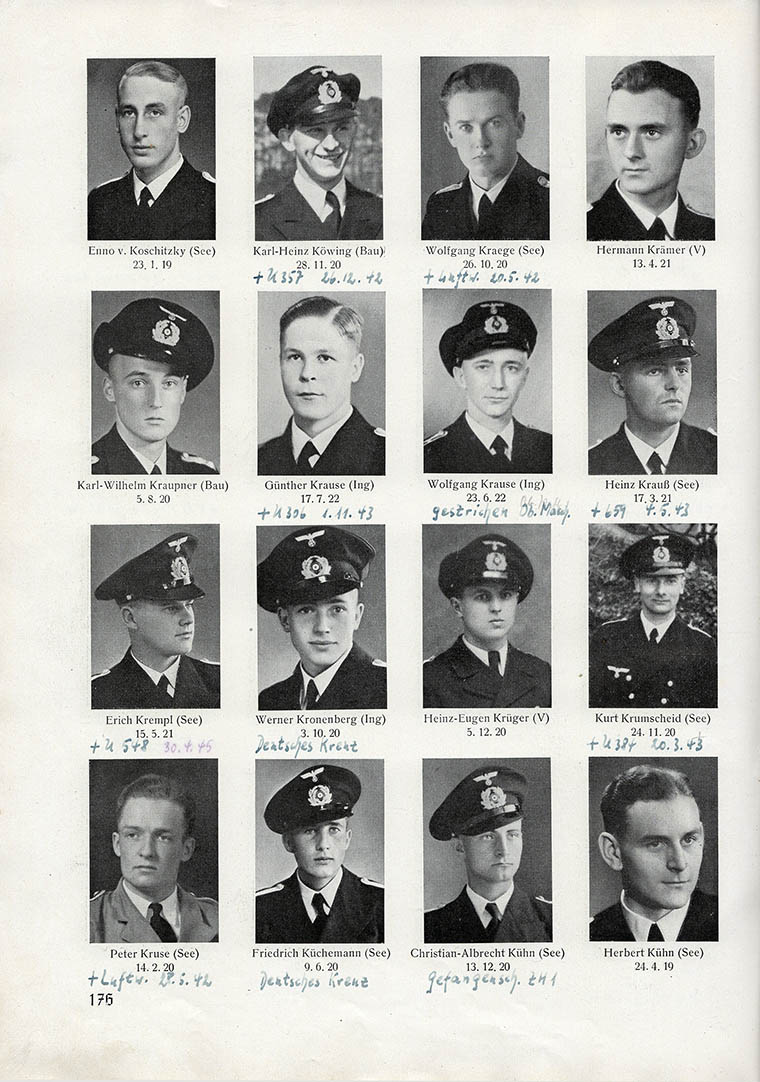
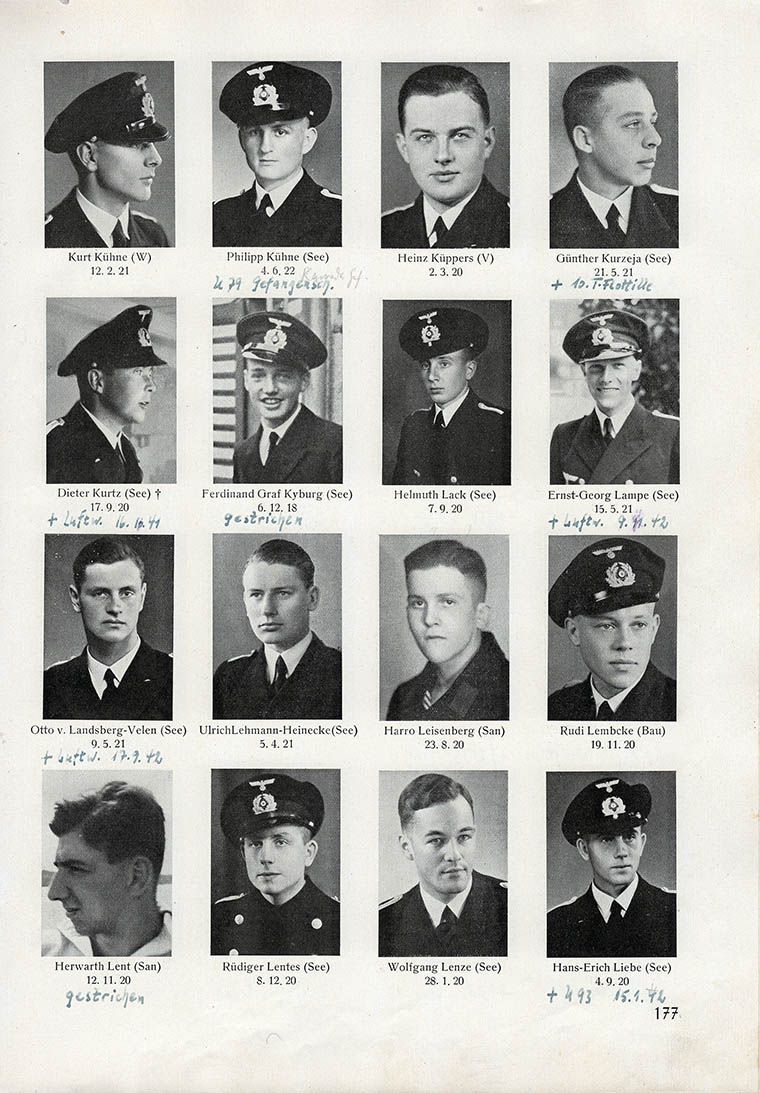
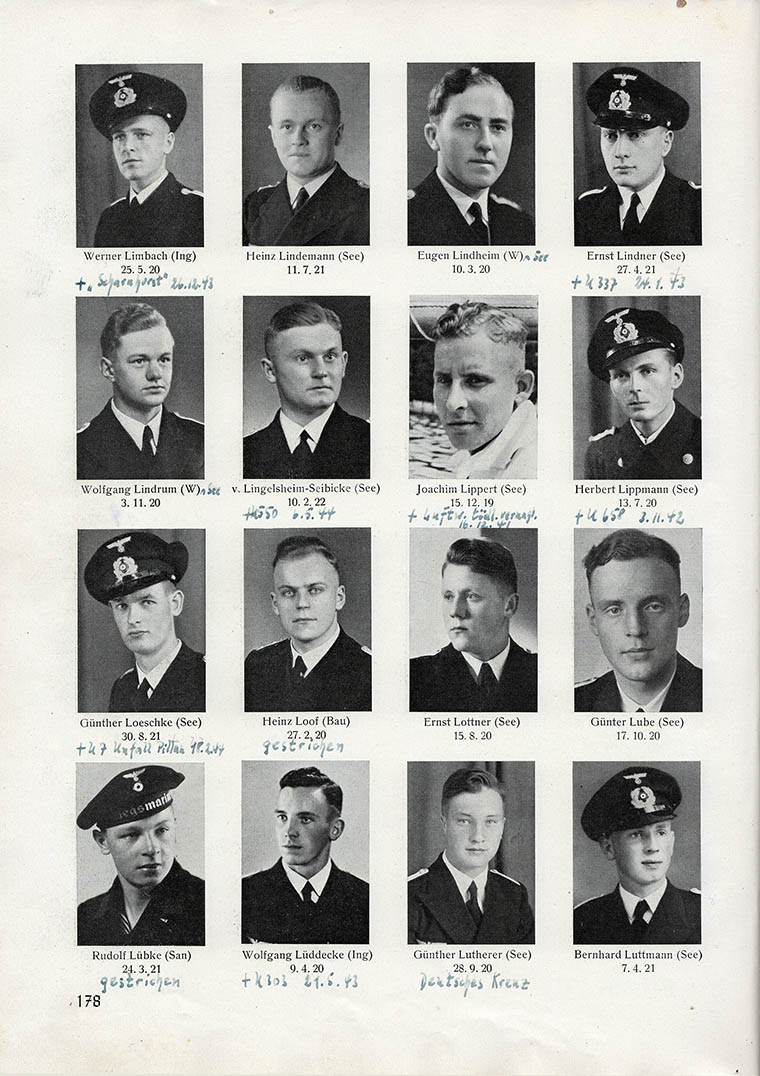
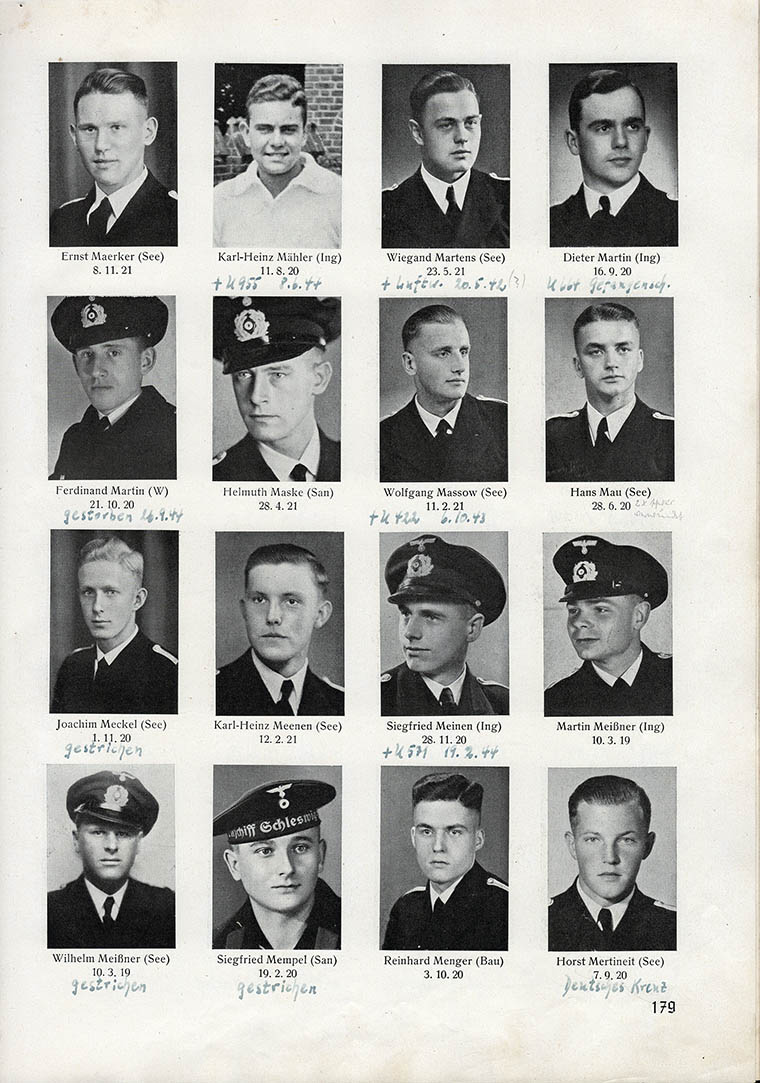
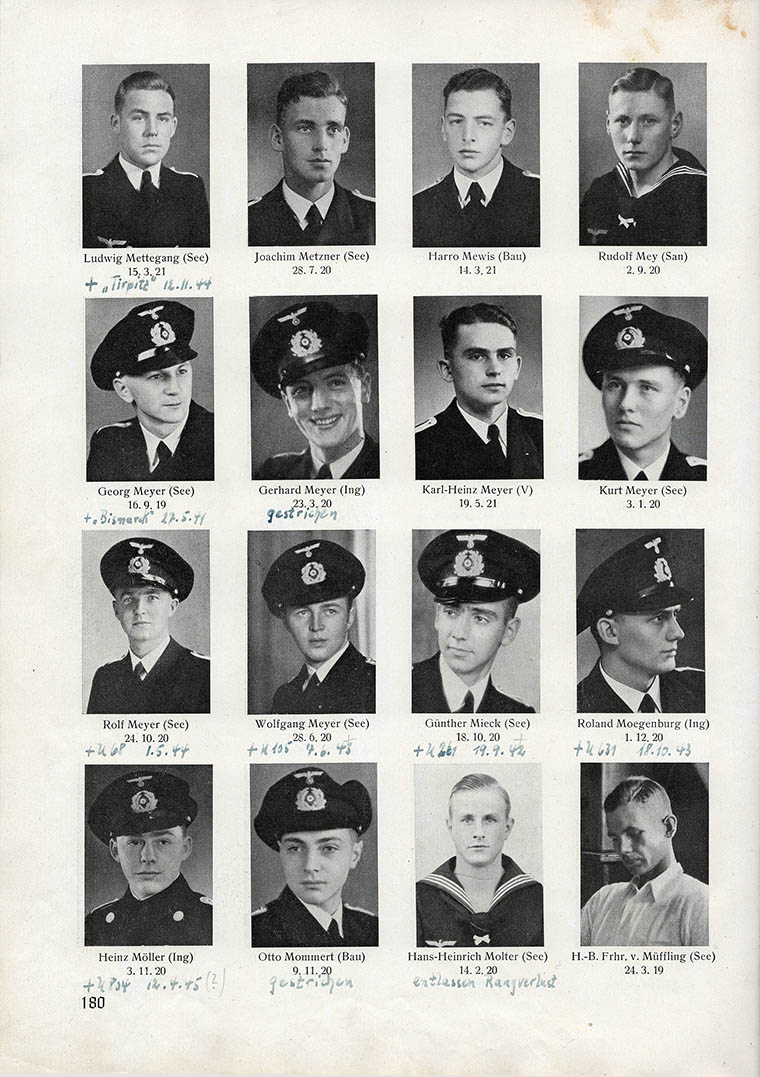
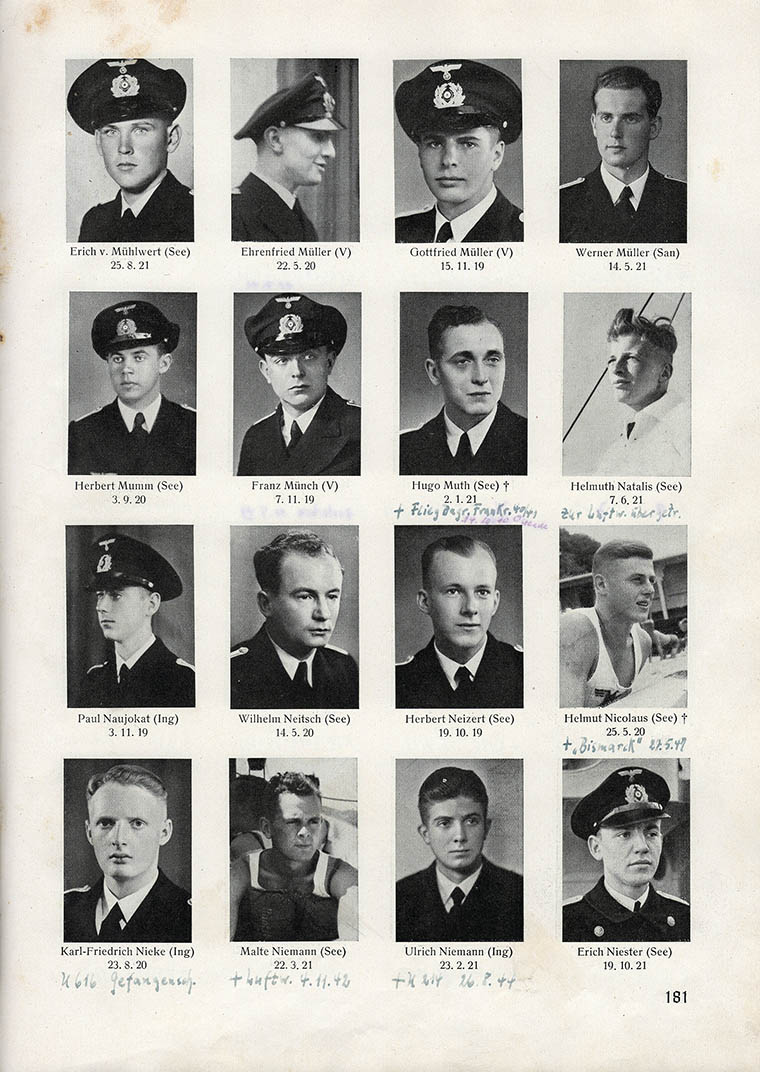
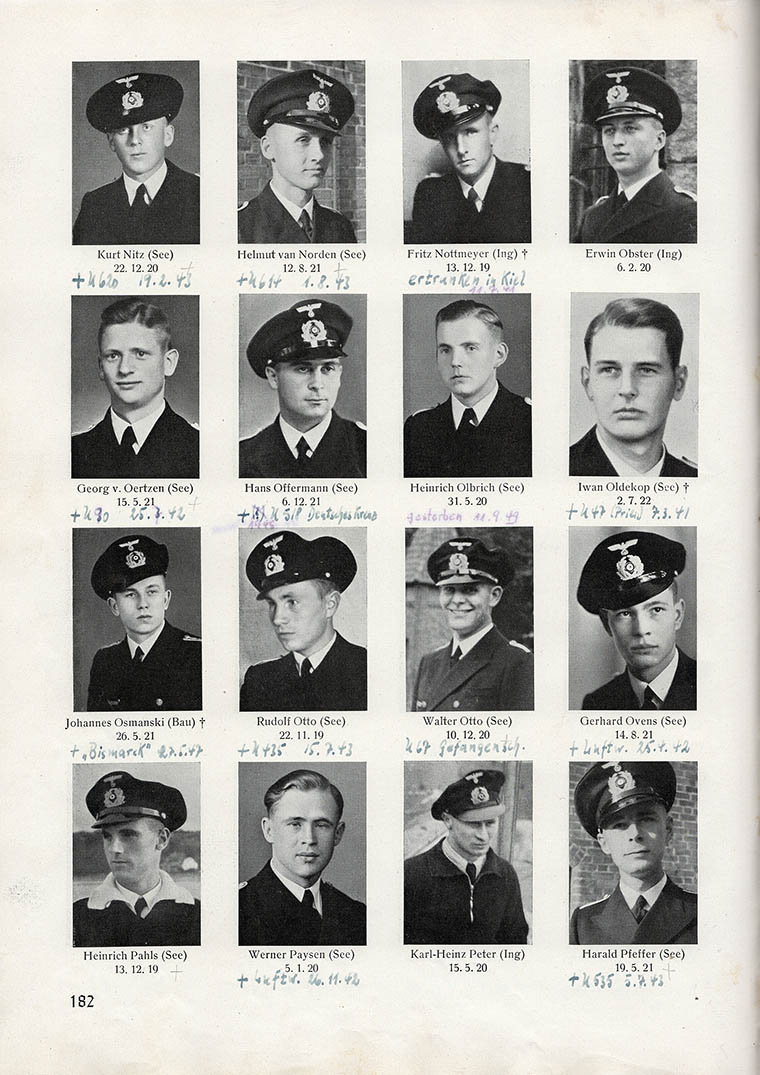
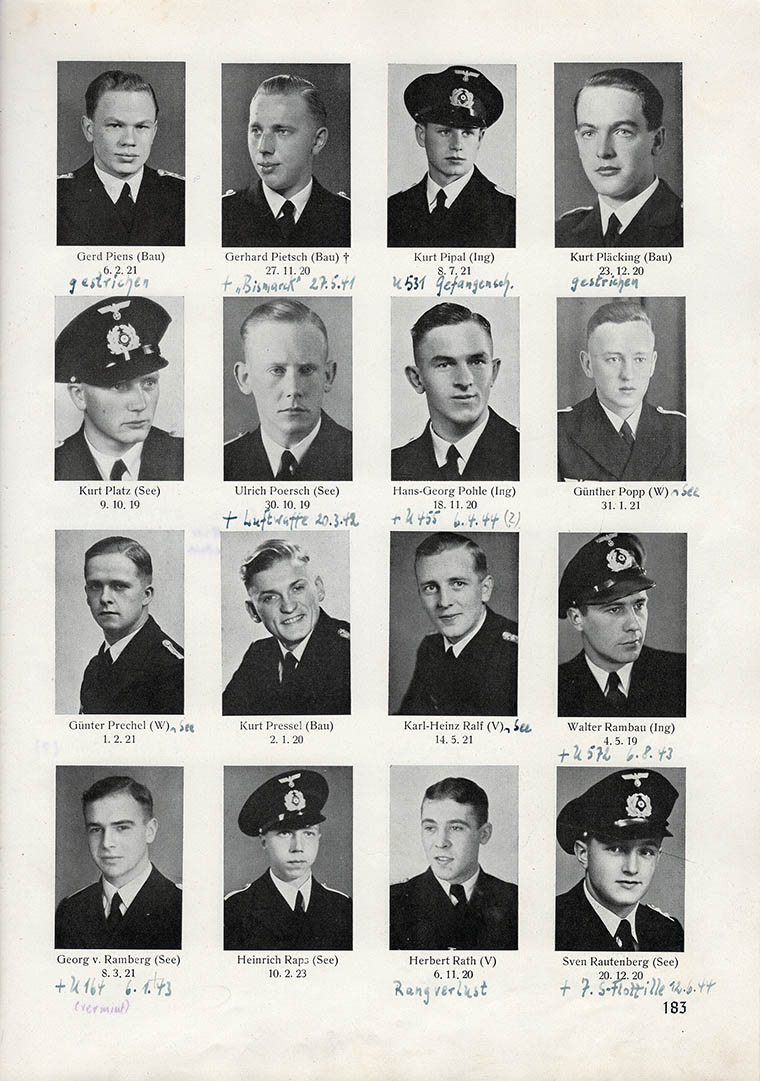
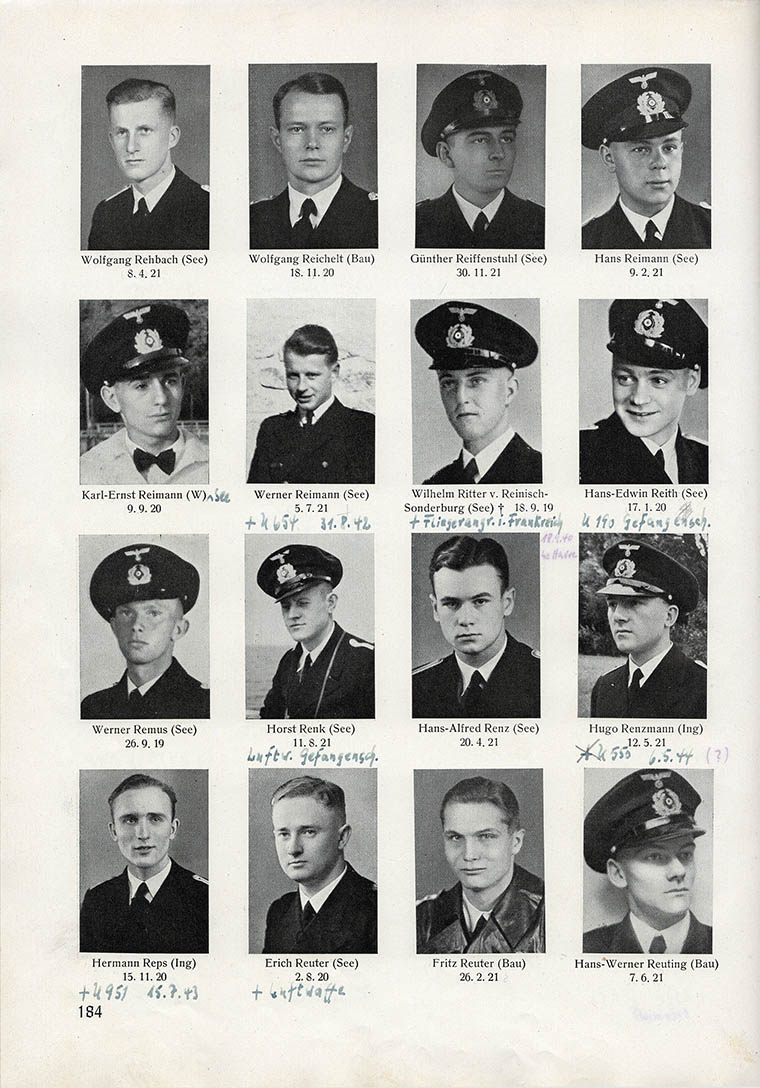
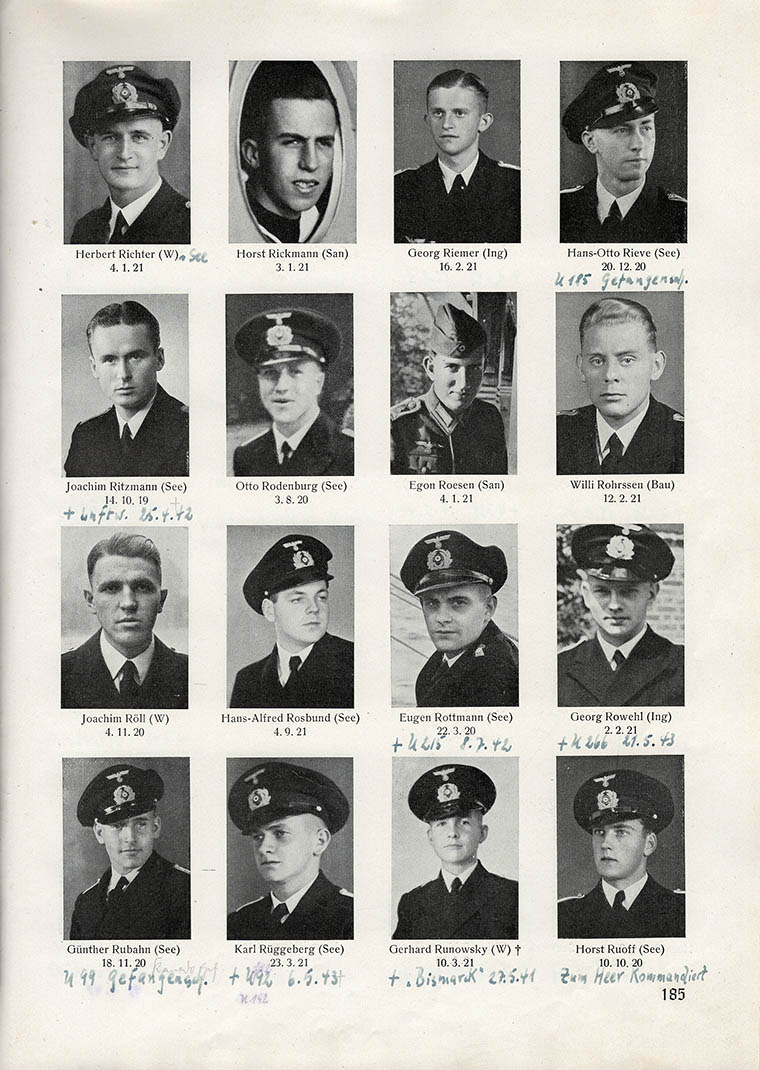
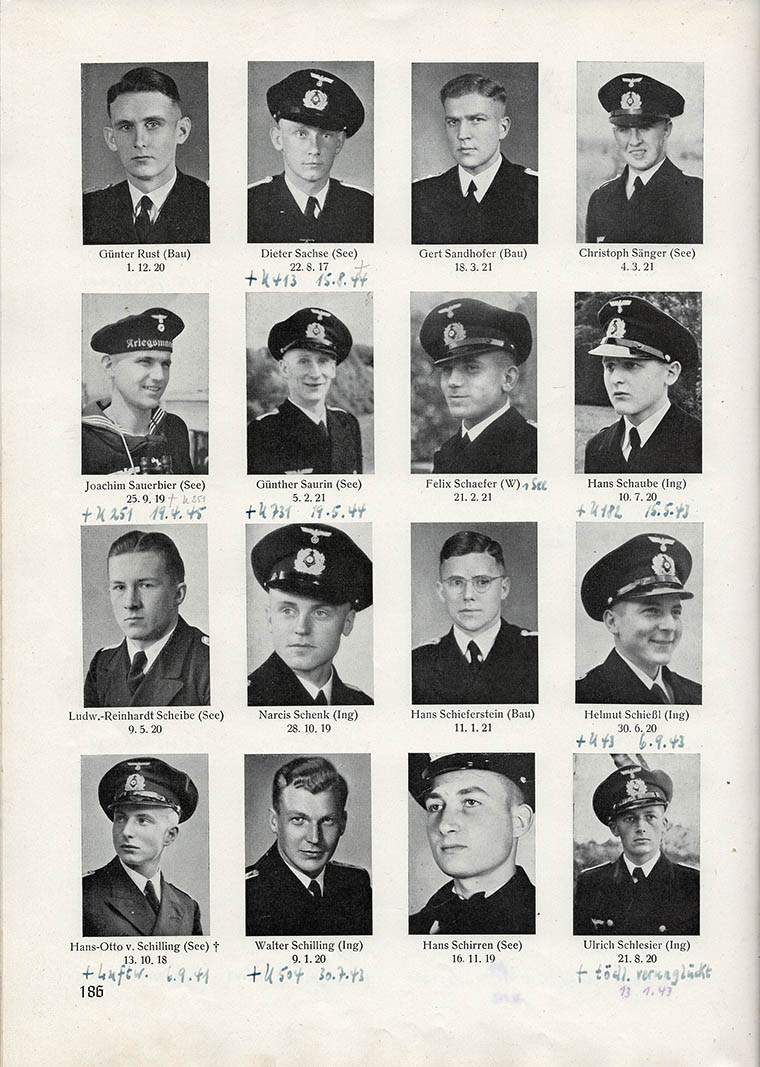
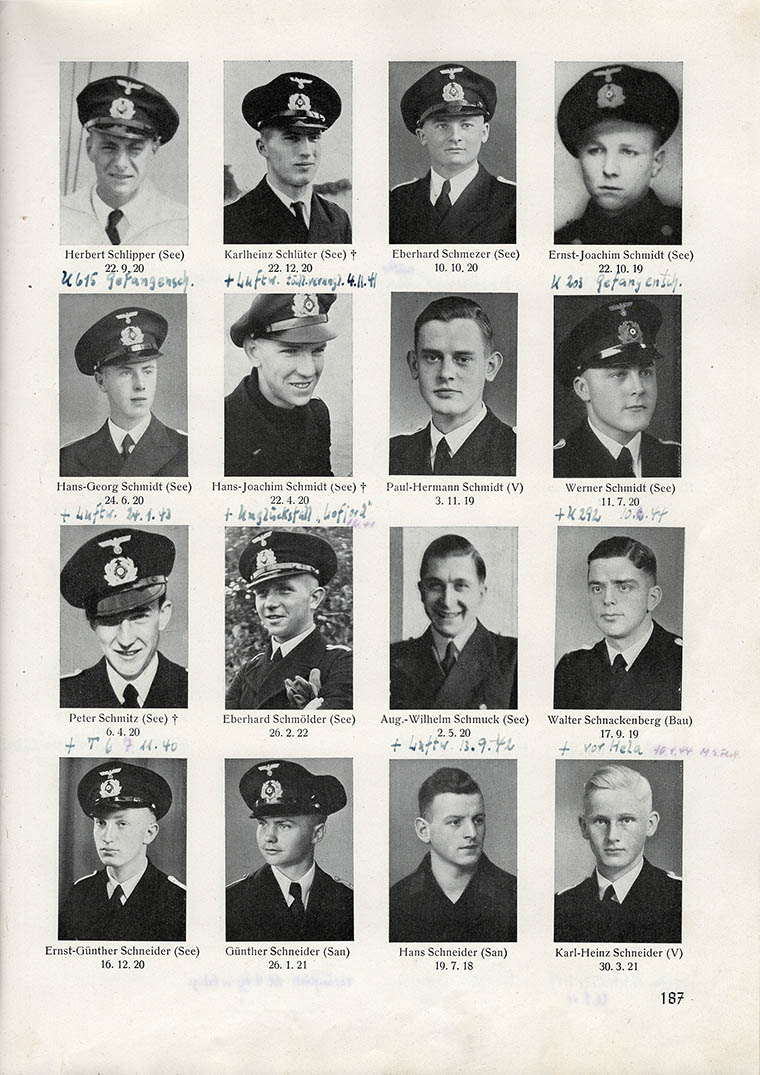
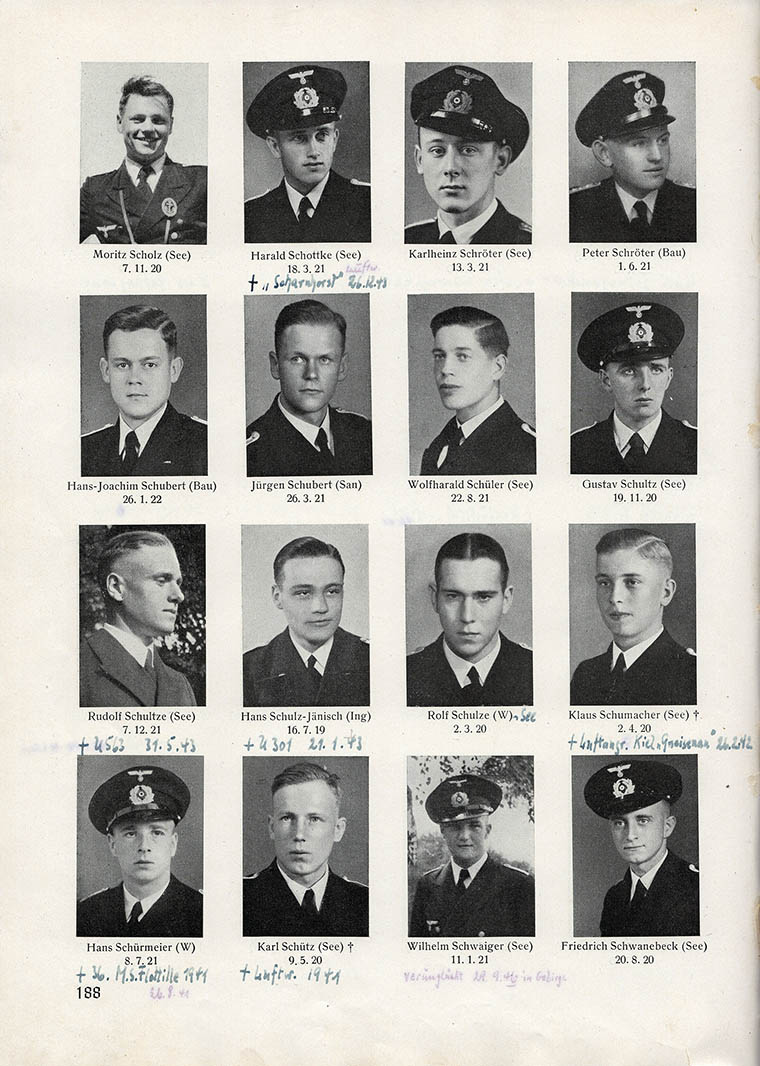
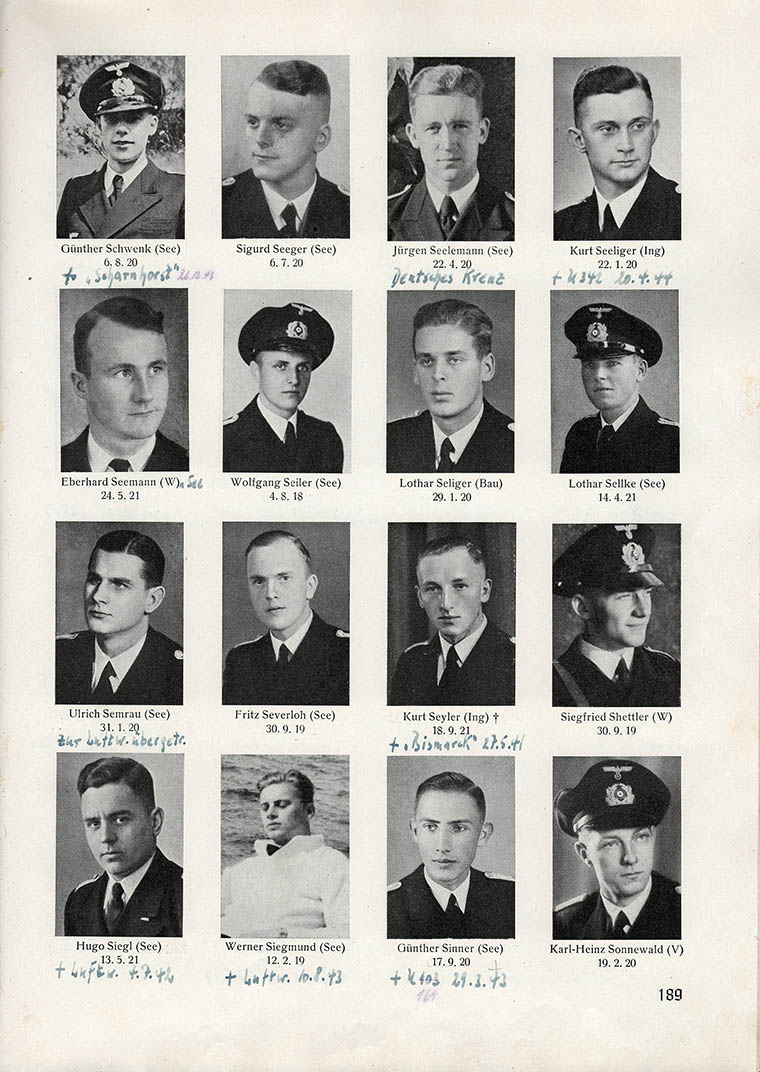
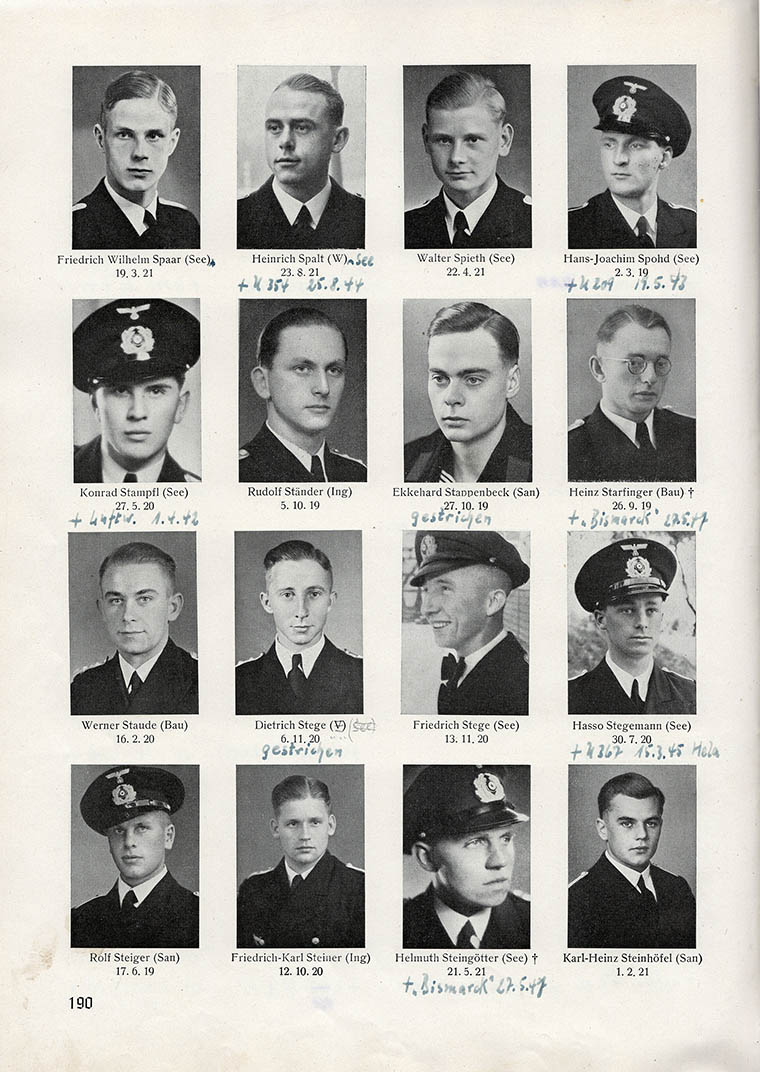
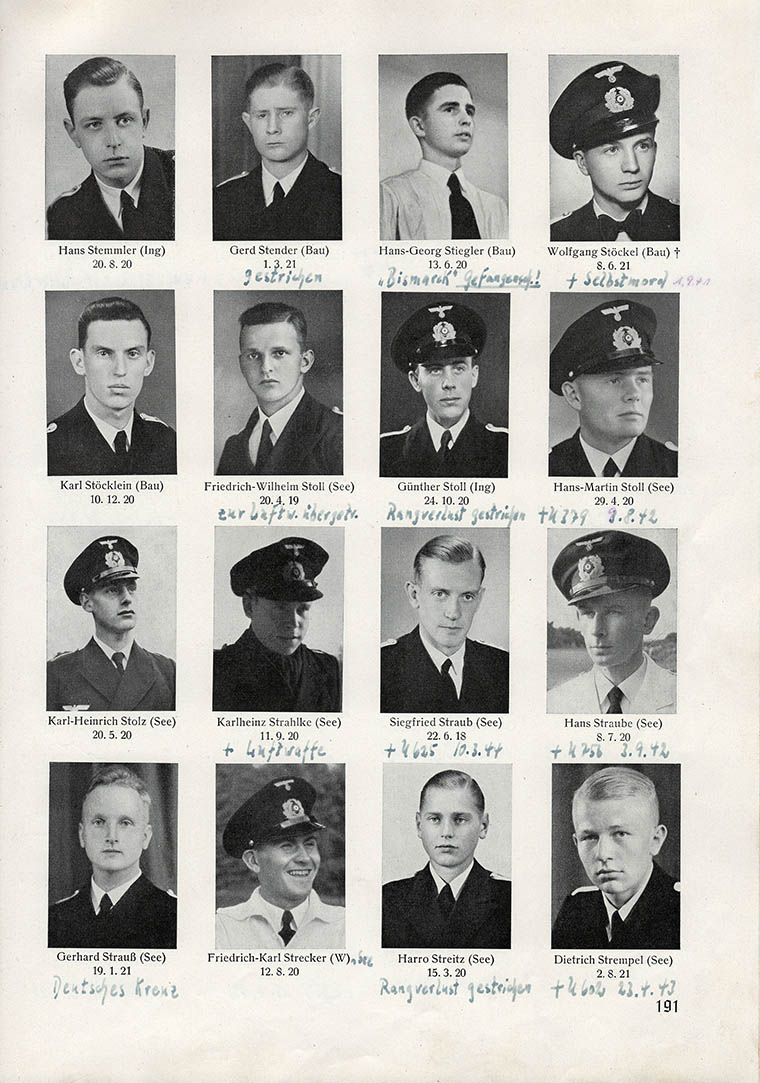
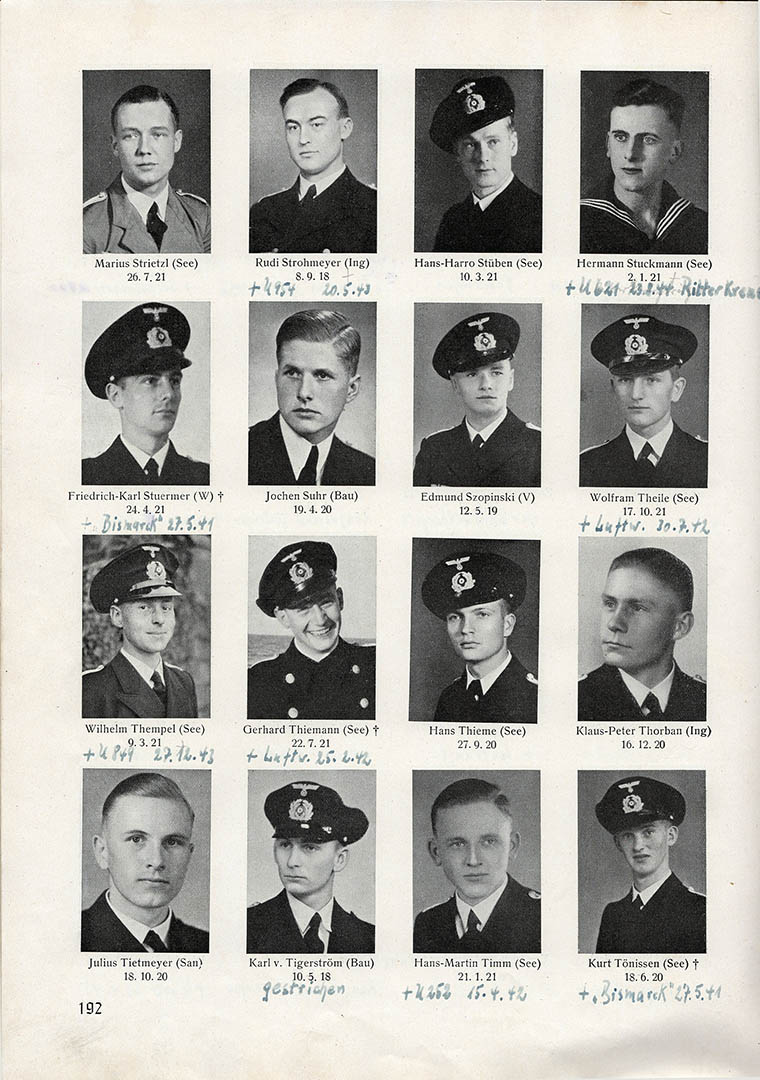
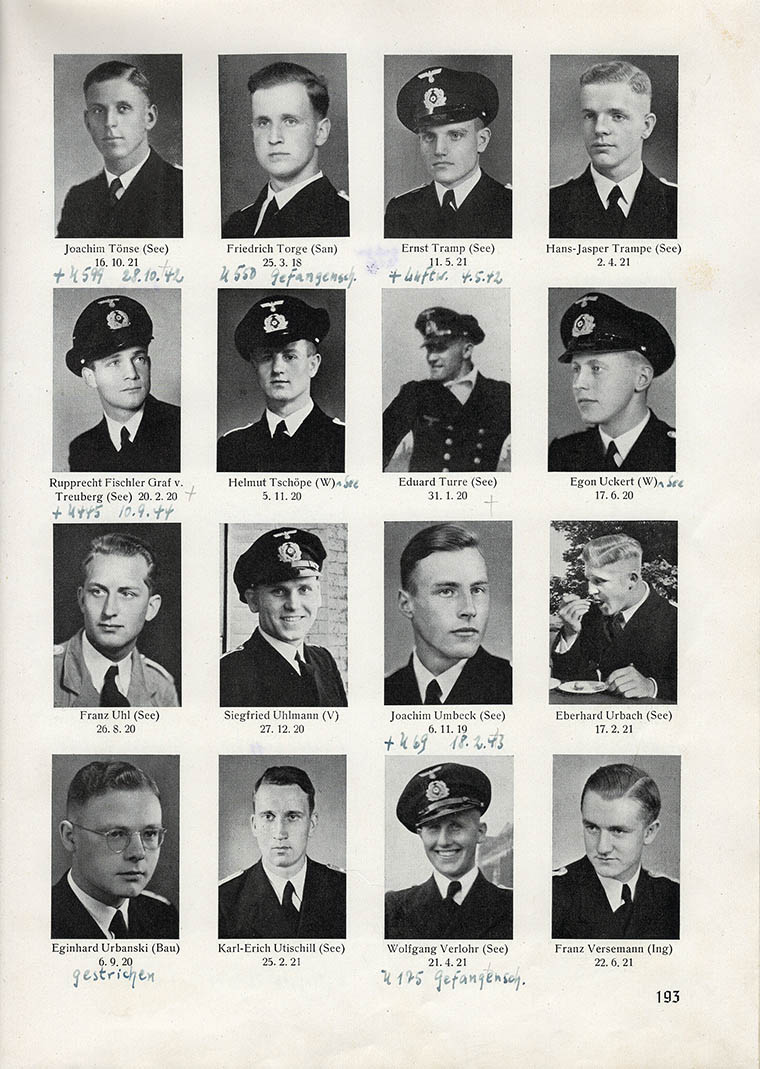
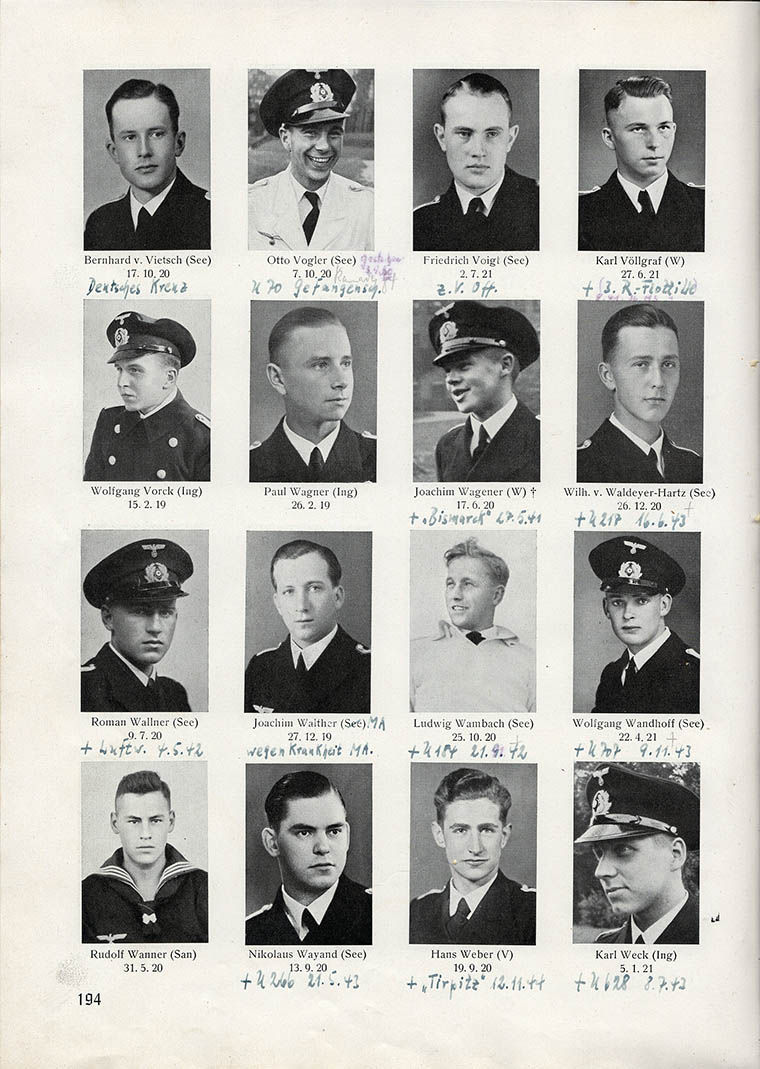
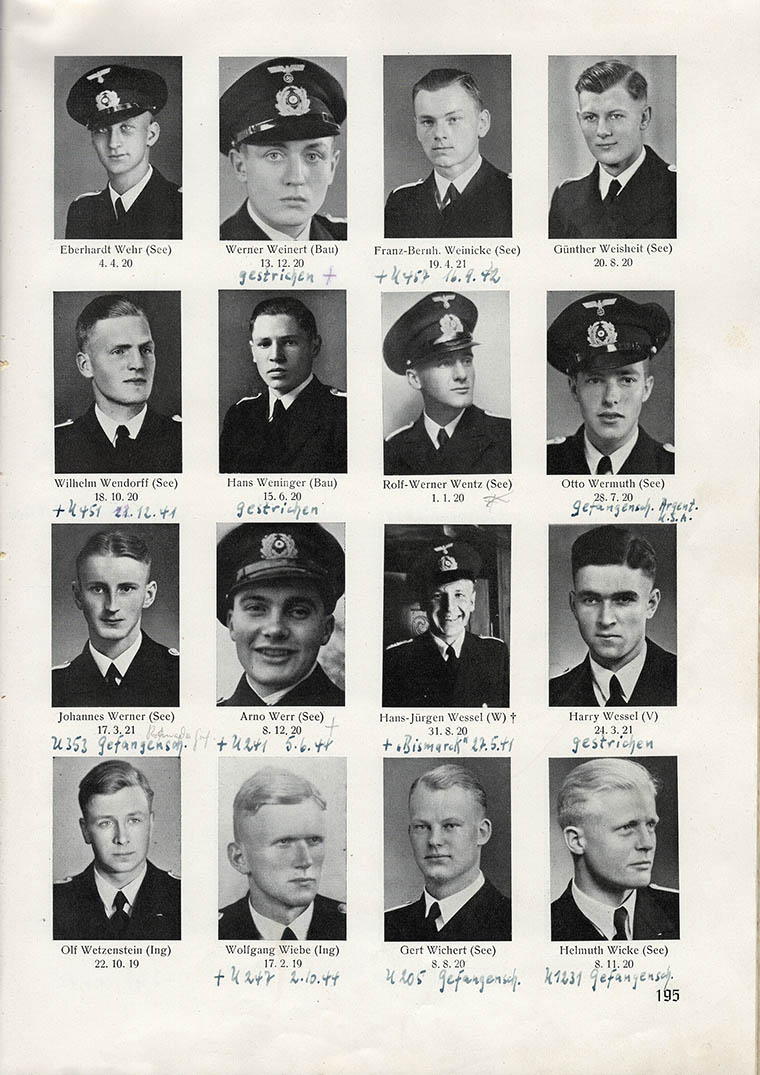
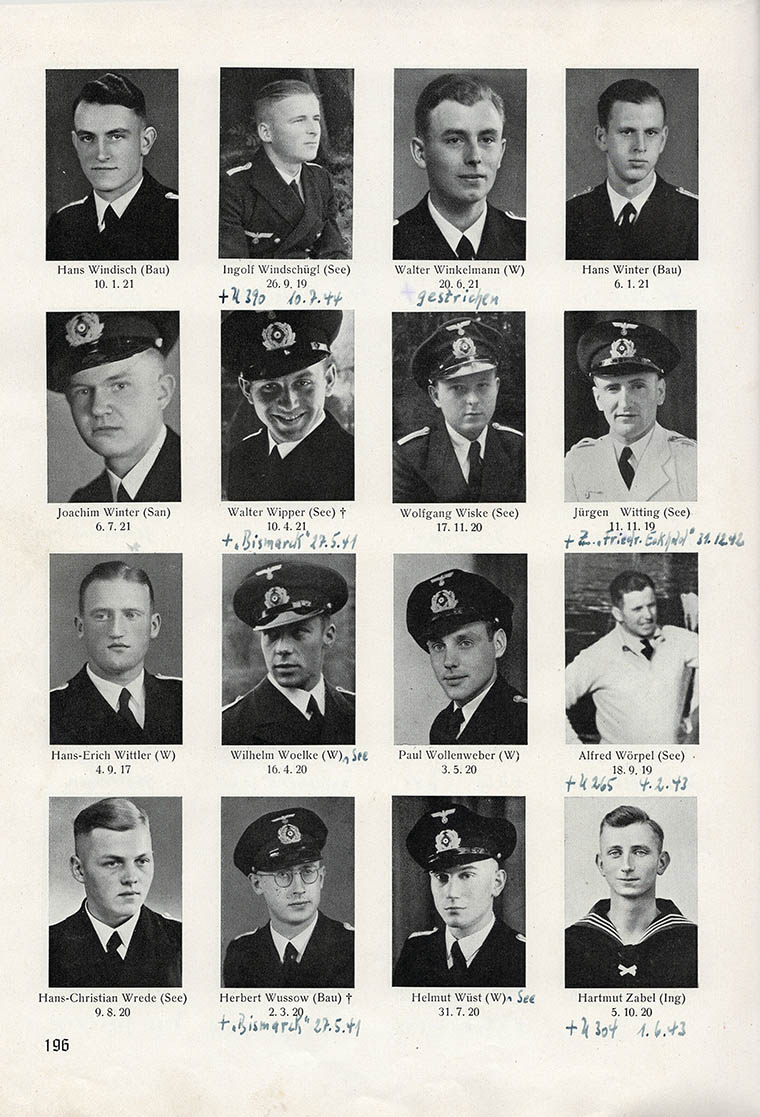
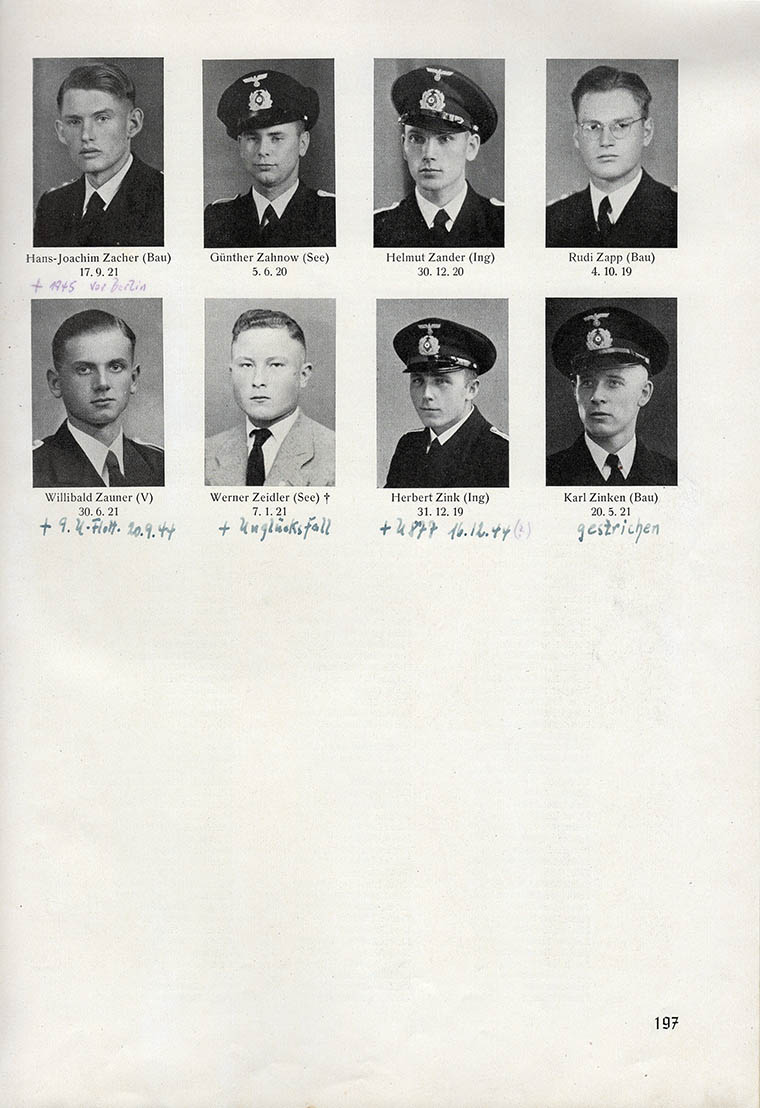
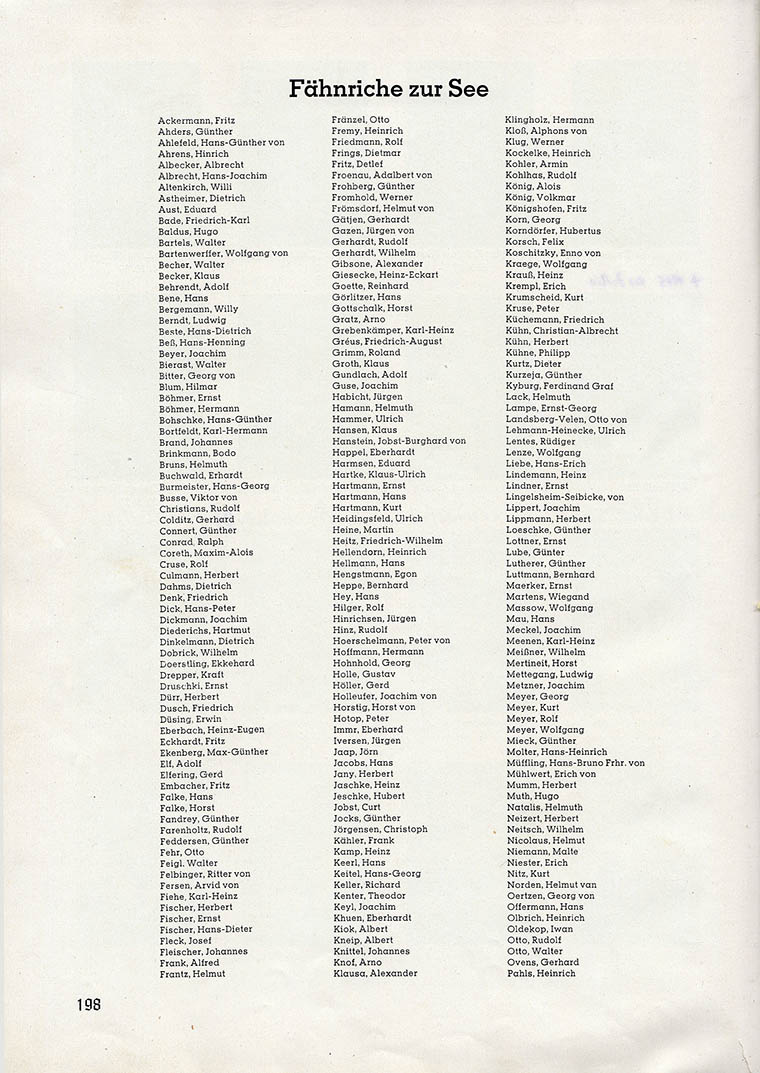
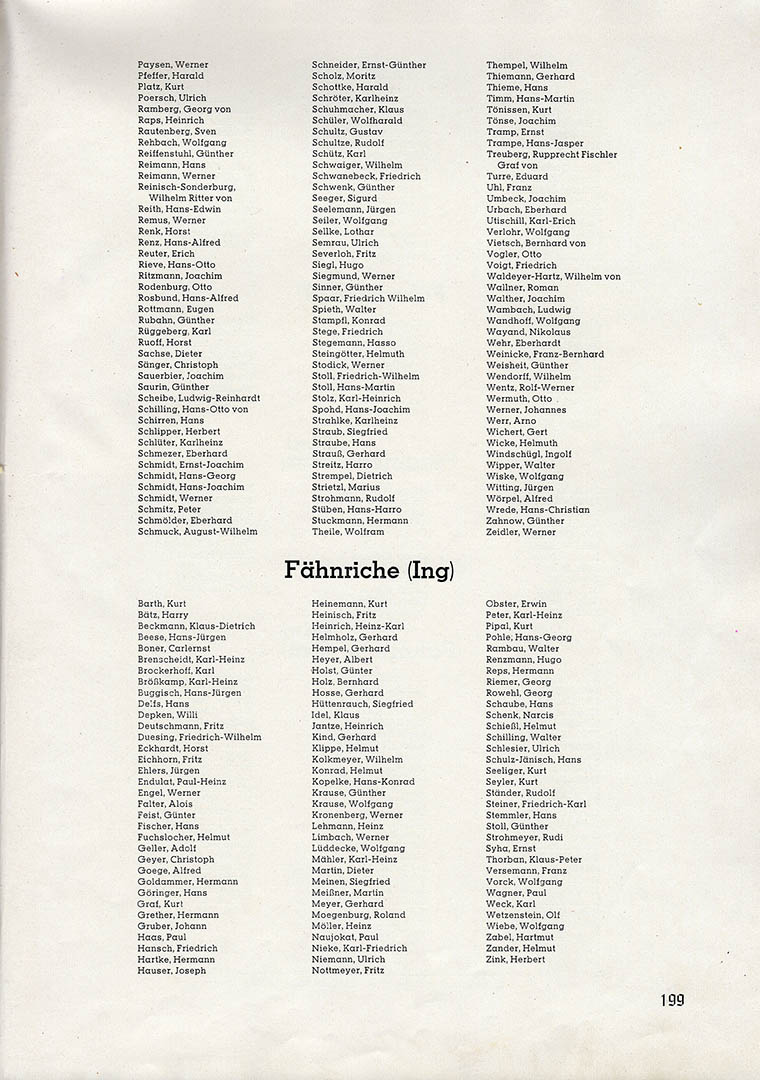
| Fähnrich zur See = Seeoffizier - Midshipman Executive Officer Branch (Line Officers) | |||
| Fähnrich (Ing) = Ingenieuroffiziere = Midshipman Engineering Officer Branch | |||
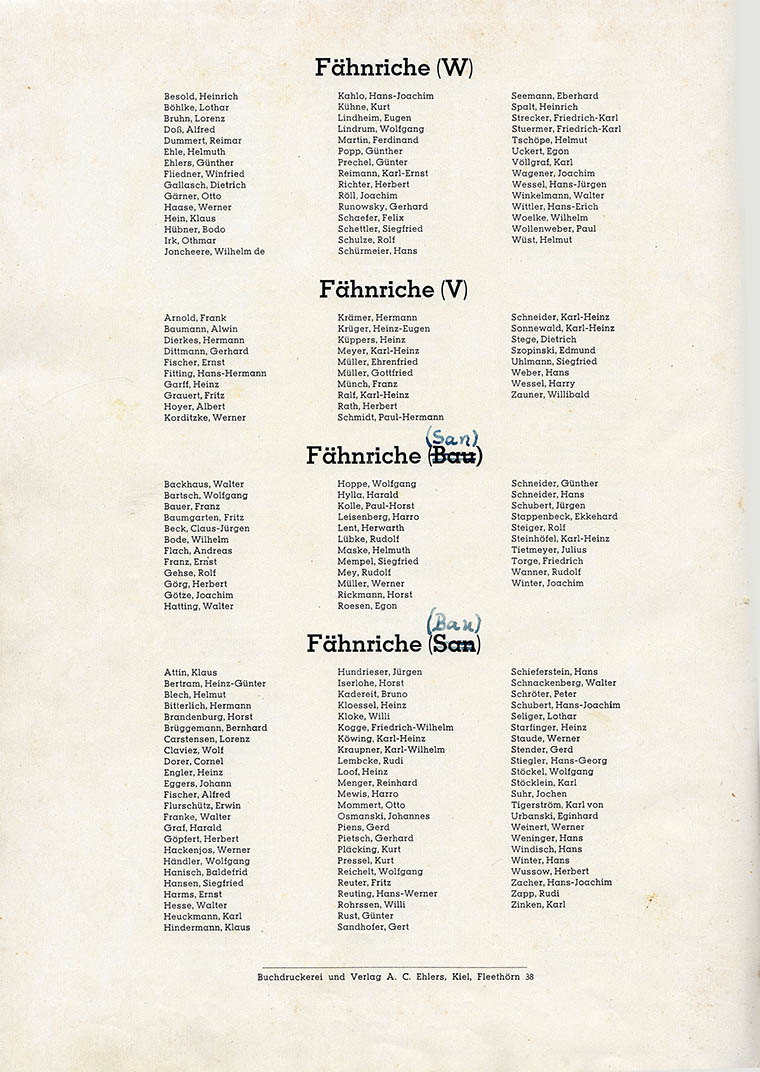
| Fähnrich (W) = Waffenoffizier = Midshipman Weapons Officer Branch | |||
| Fähnrich (V) = Verwaltungsoffizier = Midshipman Administrative Officer Branch | |||
| Fähnrich (San) = Sanitätsoffiziere = Midshipman Medical Officer Branch | |||
| Fähnrich (Bau) = Baubeamte = Midshipman Construction Officer Branch | |||
